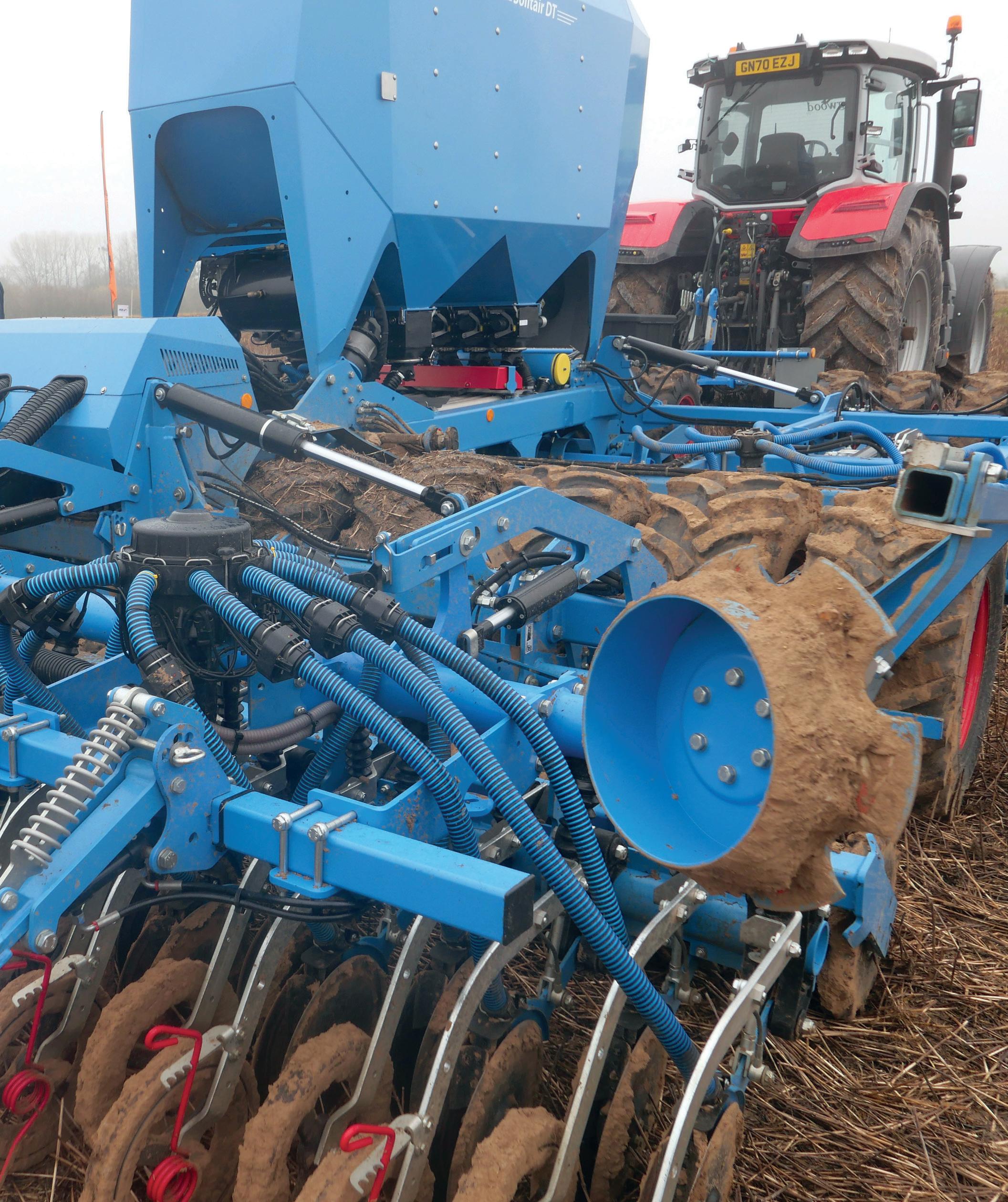

















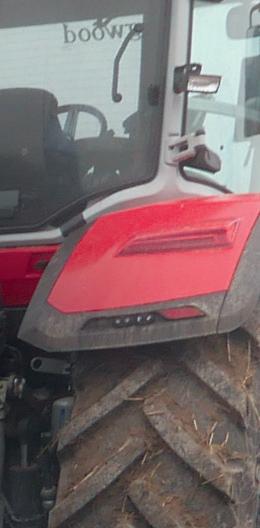

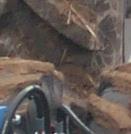




• Farm business & estate management • Planning & development • Subsidies & grants • Land sales & acquisitions • Viticulture • Succession • Biodiversity net gain • Ecology • Natural capital • Residential and commercial property letting and management 01892 770339 www.c-l-m.co.uk Farm business consultants with our roots in the South East ® May 2023 Est 1982 CONFERENCE The future of farming AGRII’S WELL-ATTENDED DRILL DEMO DAY A VIEW TO A DRILL A reliable ally Southern Farmers Ltd.










































































































































































































































































































































































































































































































































































































































































































































































































































































































































































































































































































































































































































































































































































































































































































































































































Kent’s only rural and land-based college PRE-REGISTER AT HADLOW.AC.UK/EVENTS HADLOW MAIN SITE & GREENWICH CAMPUS WEDNESDAY 24TH MAY 3:00 PM - 7:00 PM VISIT OUR 2023 MAY OPEN EVENT
SOUTH EAST FARMER
Kelsey Media, The Granary, Downs Court
Yalding Hill, Yalding, Maidstone, Kent, ME18 6AL 01959 541444
EDITORIAL
Editor: Malcolm Triggs
Email: sef.ed@kelsey.co.uk
Photography: Martin Apps, Countrywide Photographic
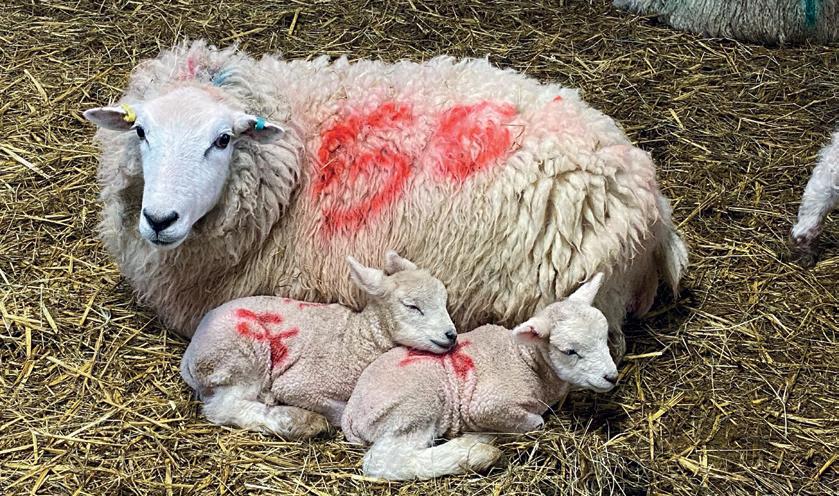
ADVERTISING & MARKETING
Jamie McGrorty 01303 233883 jamie.mcgrorty@kelsey.co.uk
GRAPHIC DESIGN
Jo Legg 07306 482166 jo.legg@flair-design.co.uk
MANAGEMENT
DIVISIONAL MANAGING DIRECTOR:


Steve Kendall
PUBLISHER: Jamie McGrorty
RETAIL DIRECTOR: Steve Brown
SUBSCRIPTION MARKETING MANAGER: Claire Aspinall
PRINT PRODUCTION MANAGER: Kelly Orriss
DISTRIBUTION
Distribution in Great Britain: Seymour Distribution Limited
2 East Poultry Avenue, London
EC1A 9PT
Tel: 020 7429 4000 www.seymour.co.uk
Distribution in Northern Ireland and the Republic of Ireland:
Newspread
Tel: +353 23 886 3850
Kelsey Media 2023 © all rights reserved. Kelsey Media is a trading name of Kelsey Publishing Ltd. Reproduction in whole or in part is forbidden except with permission in writing from the publishers. Note to contributors: articles submitted for consideration by the editor must be the original work of the author and not previously published. Where photographs are included, which are not the property of the contributor, permission to reproduce them must have been obtained from the owner of the copyright. The editor cannot guarantee a personal response to all letters and emails received. The views expressed in the magazine are not necessarily those of the Editor or the Publisher. Kelsey Publishing Ltd accepts no liability for products and services offered by third parties.
Kelsey Media takes your personal data very seriously. For more information of our privacy policy, please visit Kelsey Media takes your personal data very seriously. For more information of our privacy policy, please visit https://www.kelsey.co.uk/privacy-policy/ . If at any point you have any queries regarding Kelsey’s data policy you can email our Data Protection Officer at dpo@kelsey.co.uk.
www.kelsey.co.uk
Cover picture: Agrii's drill demo day
FEATURES
18 SOUTH EAST FUTURE OF FARMING
Plumpton College’s exciting new meetings and events facility was launched in fine style when the college hosted a farreaching conference.
21 ERNEST DOE
An impressive range of machinery greeted those who visited the impressive showrooms at Albourne in West Sussex.
27 KENT DRILLING DAY
The one thing that wasn’t lacking from Agrii’s fascinating drill day event was choice. The 220 farmers who flocked to look at the machinery on offer were treated to an impressive array of machinery with a remarkable range of capabilities.

37 SOUTHERN FARMERS
When prices are rising and the supply of many products is variable at best, farmers and landowners need a reliable ally as they try to buy what they need to keep their businesses running smoothly.
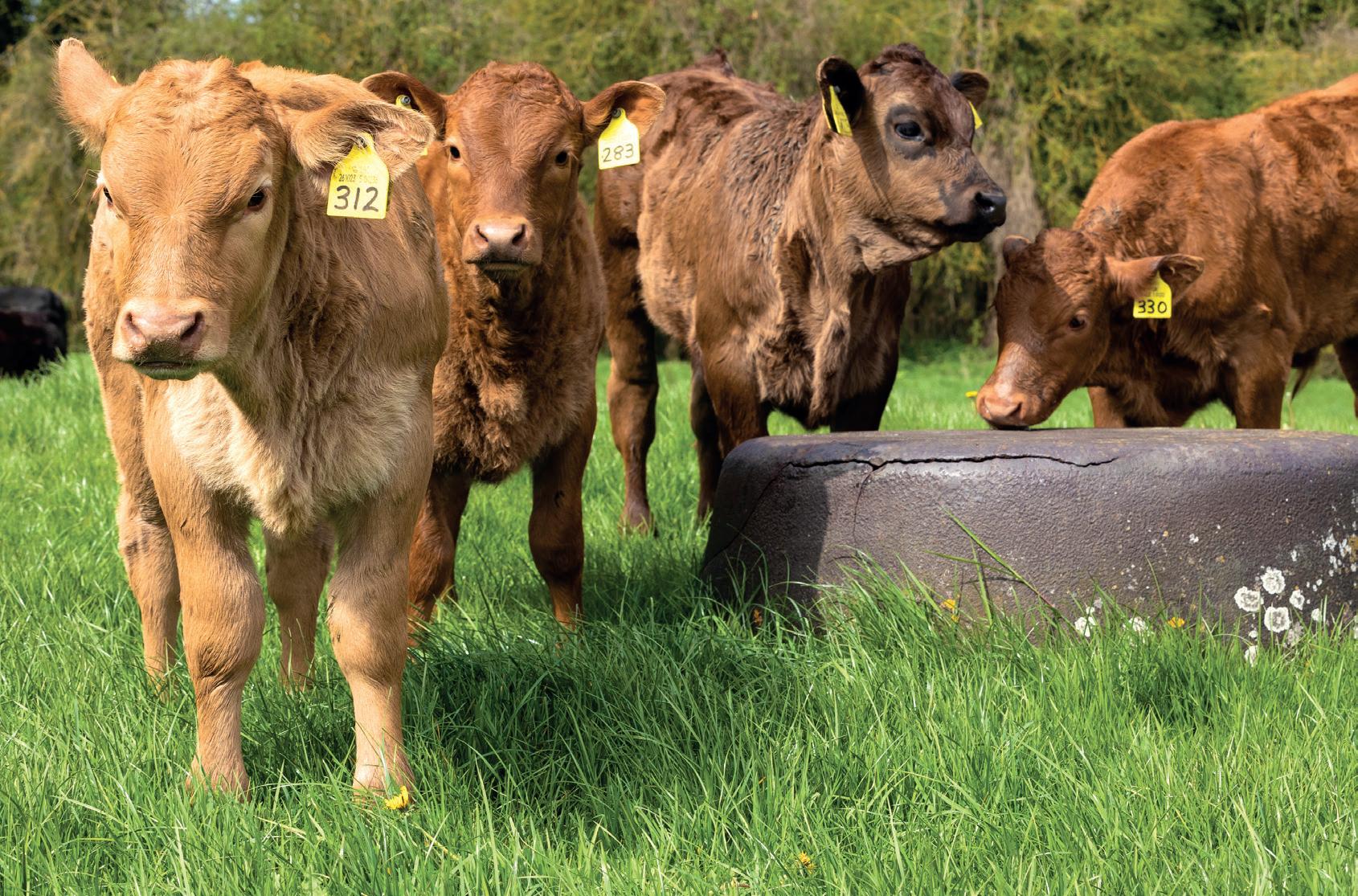
60 NEWS FROM THE VINEYARD
A behind-the-scenes look at life as a student at Plumpton College.
NEWS & REPORTS 04 Improve your water quality. 06 Loan a Lamb scheme benefits 4,000 school children. 07 A taste of farm life for young people. 11 Survey shows loyal readership. REGULARS 16 MONICA AKEHURST Monica demands better working conditions for herself and flock. 22 NIGEL AKEHURST VISITS... Nigel visits Chandler & Dunn Ltd, a large, mixed business that farms just over 600 hectares split across three main enterprises of top fruit, arable and grass for livestock. 52 ALAN WEST 54 ADVICE FROM THE VET 56 NICK ADAMES 59 STEPHEN CARR 67 SARAH CALCUTT 68 LEGAL 71 LAND AND FARMS MAY 2023 CONTENTS 22 37 www.southeastfarmer.net
®
21
Taking advantage of the different ways there are to protect water and the environment, many of which can be funded through private or government grants, can also boost farm efficiency.
That was the message from ADAS consultant John Gadsby as he outlined some of the most effective methods of improving quality that can be match-funded through South East Water and catchment sensitive farming capital grants schemes.
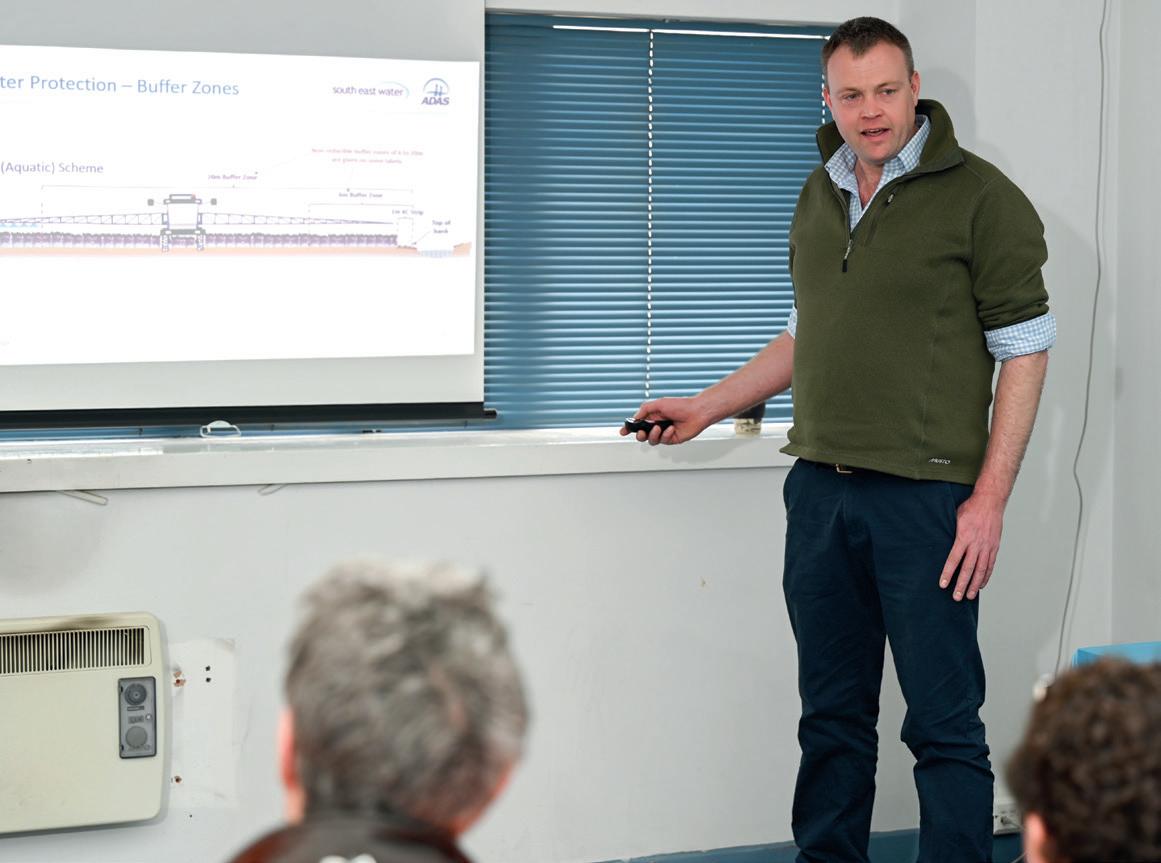
INFRASTRUCTURE –PESTICIDE HANDLING
“Sprayer washdown and filling areas are one of the most effective ways of reducing the risk of pesticides reaching watercourses, especially when teamed with a biobed or biofilter for treatment of contaminated washings,” said Mr Gadsby.
He said roofed and outdoor areas helped capture spillages and contaminated washings, but added that it was important to choose the right treatment system for the site.
Mr Gadsby advised that those with a roofed area who were looking to use it mainly for filling and the occasional washdown should opt for a biofilter. Those with outdoor sites or a demand for regular washing were advised to choose a biobed.
SOIL MANAGEMENT
Mr Gadsby went on to encourage farmers to prioritise soil health. “It’s well documented that getting soils in good order helps productivity, but this comes with the bonus of reducing run-off and therefore less risk of pesticides, nitrates and bacteria reaching water,” he said.
“A good soil structure will improve farm resilience to extreme weather, with roots
IMPROVE YOUR WATER QUALITY
having better access to soil water in times of drought and better absorption in times of excessive rain.”
He said soil sampling and analysis was a good starting point to give farmers a benchmark and help decision making on improving their soil. This sampling can be funded by South East Water, after which cropping and cultivation options can also be funded to help improve soil health.
Mr Gadsby said digging soil pits could help farmers assess soil structure and health. “This knowledge will help you develop a cultivation strategy and inform the depth of remedial cultivation required – compaction isn’t always as deep as you might think,” he commented.
INTEGRATED PEST MANAGEMENT
Another way of protecting water quality is by using integrated pest management (IPM), said Mr Gadsby.
“While many have already adopted some IPM principles, it’s important that as an industry, we make a switch in mindset when it comes to crop production, to focus on prevention rather than cure,” he added.
On developing an IPM plan, Mr Gadsby said: “I’d recommend looking at the range of IPM planning information sources available on the key weed, pest and disease issues on your farm and what techniques are appropriate for your system.
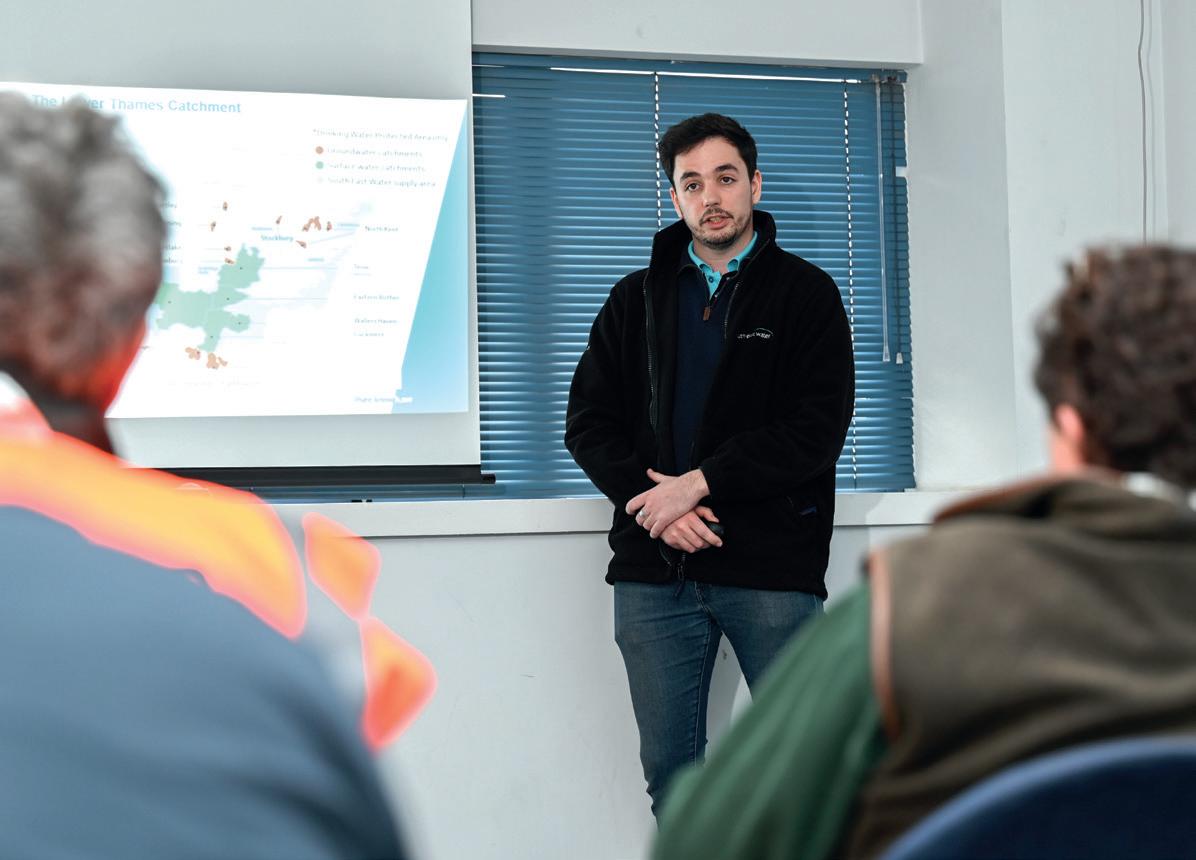
“Interventions should include wider rotational and planning elements, pre-establishment decisions and the selection of control methods within the growing crop.”
Mark Slater, South East Water catchment advisor, said it was imperative that the water company worked in partnership with land managers, offering bespoke advice that would best support their businesses and water quality.
“We’re therefore working with agricultural industry experts such as ADAS to provide advice alongside our capital grants acheme, to help facilitate more resilient, healthy water supplies,” he said.
For more advice or information about the availability of funding on these or other options, please speak to your South East Water catchment advisor or see www.southeastwater.co.uk/grants.
MAY 2023 | WWW.SOUTHEASTFARMER.NET 4 NEWS
John Gadsby
Mark Slater
At a recent South East Water farm event, ADAS consultant John Gadsby provided practical advice on how investing in infrastructure and updating management practices can protect water quality while supporting farm productivity.
LONG-TERM SOLUTION NEEDED




A major Kent egg producer has called for a long-term solution to tackling bird flu after mandatory housing measures were lifted in April.
While Keith Fordyce, who manages Woodlands Poultry Farm just outside Canterbury, welcomed DEFRA’s announcement that the requirement to keep poultry inside was being removed, he was concerned that restrictions would return at some point in the future.
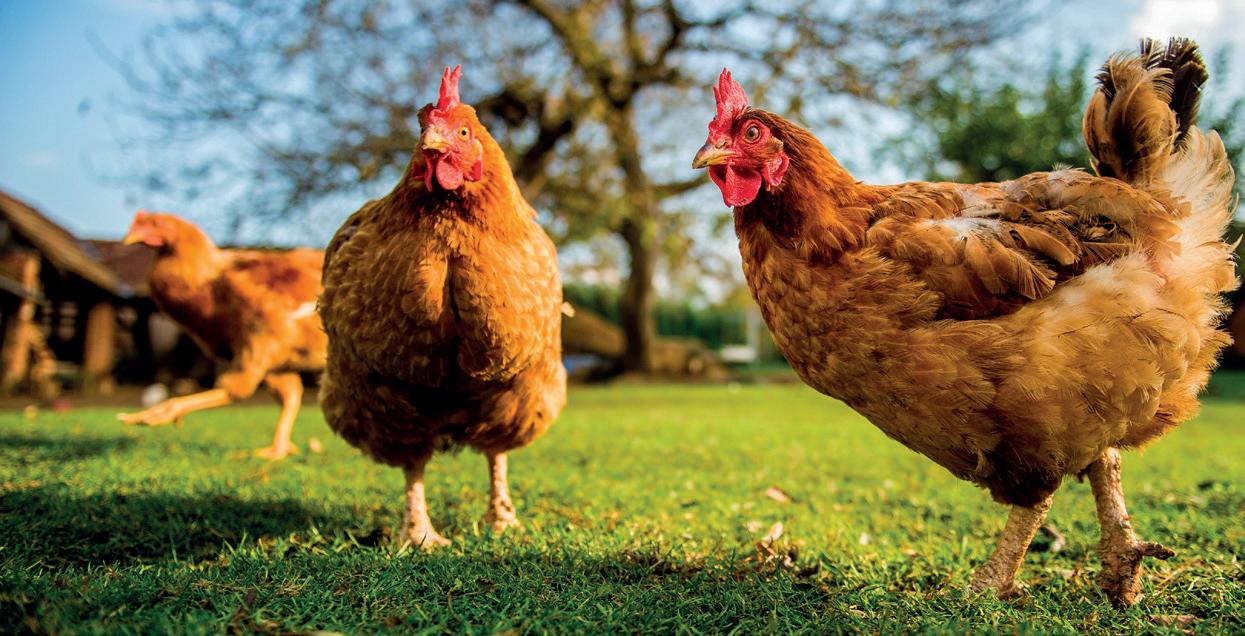
“Restrictions started in December the year before last and then November last year, so it just seems to be getting longer. It’s good that we can let the birds out again, but for how long? DEFRA really needs to be pushing for a longer-term solution like a vaccine.”
DEFRA said “scrupulous standards of biosecurity remain essential” as it lifted the housing measures that have applied across England and Wales following an updated assessment of the threat level “using the latest scientific evidence and a robust risk assessment”.


With bird flu risk levels reduced, “poultry and other captive birds will no longer need to be housed and can be kept outside, unless they are in a Protection Zone”, the department announced, confirming that “eggs laid by hens with access to outside range areas can return to being marketed as ‘FreeRange’ eggs”.
DEFRA added: “The scale of avian influenza outbreaks across the UK and Europe [has] been unprecedented, with over 330 cases confirmed across the country since late October 2021." It said enhanced biosecurity requirements brought in as part of the Avian Influenza Prevention Zone (AIPZ) would remain in force.
As he prepared to let a young flock out for the first time, Keith admitted that he was already concerned about the next lockdown. “It’s a real worry; we need to find a proper solution to the problem,” he said. “The birds get used to being outside and it’s not good for their welfare to be kept in.
“They go to the pop holes in the morning wanting to go out and, that means there’s lots of pushing and shoving. It can be a real headache for a few weeks after the lockdown takes effect. We do our best to create a bit of interest in the sheds, but they are happier outside, particularly when they are used to it.”
Woodlands Poultry Farm, which is owned by Keith’s wife Claire and her brother Craig Cooper, has around 12,000 birds on site when fully stocked, but sources eggs from other suppliers to meet increasing demand. The business supplies shops, restaurants and wholesalers across Kent and into London, with four vans making regular deliveries. It employs 14 people.
News travels fast OPINION
They say news travels fast, but bad news does seem to have considerably more traction than good.

While farmers, growers and other professionals at the launch of Plumpton College’s new AgriFood centre highlighted the amazing amount of good work being done by landowners in response to the climate challenge facing the country, it was the actions of one farmer which grabbed the national headlines.
The farmer in question was jailed for 12 months and told to pay more than £1.2m in court and restoration costs after he admitted damaging a stretch of river alongside his land, including failing to stop pollution entering the water. He said he had been trying to prevent flooding.
It’s not for me to judge his actions, but the sad reality is that one court case, reported nationwide, will do more to affect the public’s view of agriculture than all the good news contained in this magazine and elsewhere.
I confess I had to look up who Gloria Borger is, but she is quoted as having said: “For most folks, no news is good news; for the press, good news is not news.” It turns out that she is US broadcaster CNN’s senior political analyst, so she must know what she is talking about.
It would be naïve in the extreme to have expected national newspapers and broadcast media to have covered the Plumpton event, but the fact remains that it was packed full of good news. It highlighted the progress the industry is making towards ‘net zero’, using science, technology and innovative thinking to reshape farming for the 21st century.
No-one claims it will be an easy ride, and the road has been made bumpier by the cost pressures caused by external events such as Russia’s invasion of Ukraine, but a combination of smart science and the industry’s renowned resourcefulness will surely see farming succeed in resetting agriculture in a way that balances food production with an environmental renaissance.
The venue for the conference, meanwhile, was stunning. The college has certainly backed the industry, developing a superb facility not just for its own students but for the industry to use as a vital knowledge-sharing resource.
It’s all about collaboration, which leads me neatly to a quotation from Pelé (someone you will have heard of), who pointed out, perhaps too modestly: “No individual can win a game by himself.”
EMAIL YOUR VIEWS, LETTERS OR OPINIONS TO: sef.ed@kelsey.co.uk or write to the address on page 3

5 TO ADVERTISE CALL 01303 233883
® MALCOLM TRIGGS - EDITOR
LOAN A LAMB

Nearly 4,000 school children across Sussex and Surrey benefited this spring from the Loan a Lamb scheme run by the South of England Agricultural Society‘s (SEAS) Education Committee.


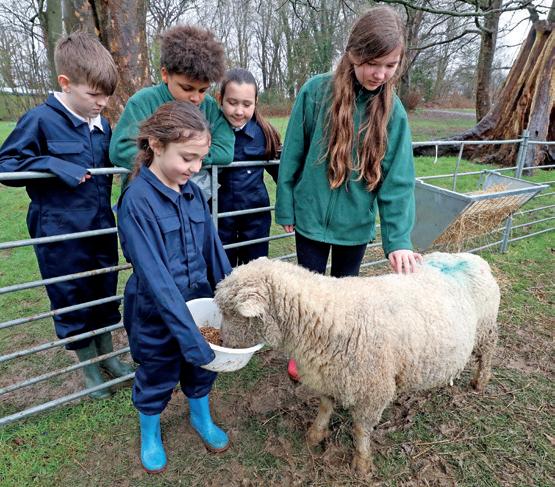

Five primary schools, Milton Mount Primary and The Mill Primary Academy in Crawley, St Lawrence Primary School in Hurstpierpoint and Plumpton Primary and Herons Dale School in Shoreham, took part earlier in the year, with six other schools, including a specialist school for children with autism, joining in the fun at the end of April.
The scheme, held in partnership with LEAF









(Linking Environment and Farming) with cash support from the East Sussex Proficiency Test Committee, sees school staff and children caring for a ewe and her lamb for a week.
“It is crucial to get children involved in agriculture at a young age,” said Alan Smith from SEAS’ Education Committee. “The Loan a Lamb scheme is an exciting and educational opportunity for school children in Surrey and Sussex. It provides a unique opportunity for students to learn about the importance of farming in producing our food and other products we use in day-to-day life. We are proud of this initiative and to be
making a positive impact within our local communities.”
A teacher briefing was held with representatives from all 11 schools to provide information and training, including details on sheep care, biosecurity and health and safety.
Milton Mount Primary teacher Yvonne Swinson said it was “a wonderful opportunity for everyone at our school”, adding: “Many of our children live in flats and don’t have gardens, and lots of them don’t have pets, so they’ve never had the responsibility of getting up, coming out and feeding an animal. They absolutely loved it.”
MAY 2023 | WWW.SOUTHEASTFARMER.NET 6 NEWS
A TASTE OF FARM LIFE
Young people from around the UK travelled to Writtle University College in Essex for a weekend of lambs, piglets, tractors and more.

The event offered 16 to 18-year olds with no farming experience an opportunity to learn about agricultural careers during an activitypacked schedule that included sheep herding and lamb handling at the university college’s working farm.
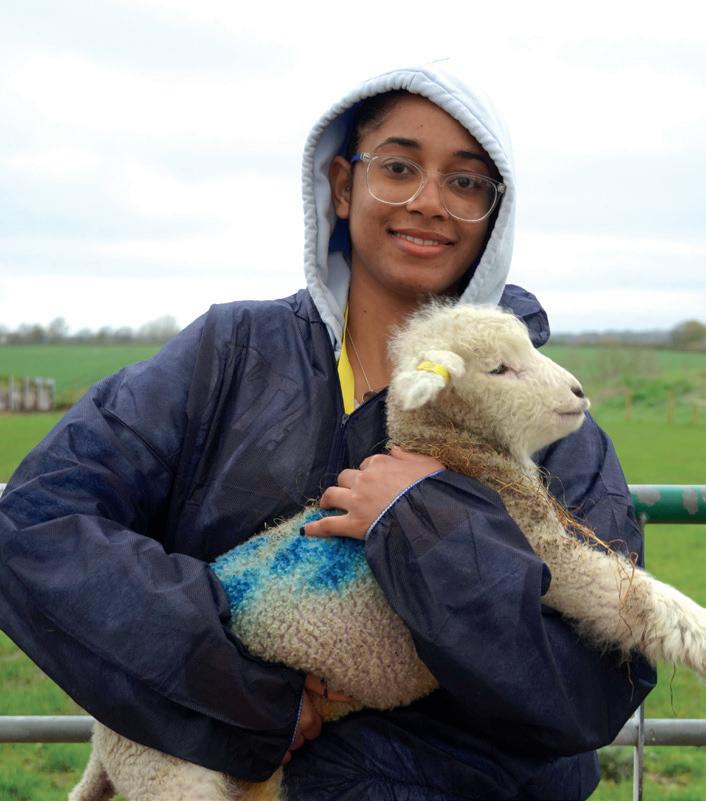
16-year-old Jordan said: “It was great to get out of my comfort zone and experience something that I wouldn’t have before. My favourite part was getting in the barn with the pigs and cuddling the piglets.”
The initiative is called New Faces For Farming and was launched by Wilfred EmmanuelJones, founder of The Black Farmer brand, in
partnership with the university college.
Wilfred, who was awarded an MBE for services to farming in 2020, said: “As a young boy growing up in an inner-city area, I found it impossible to find opportunities to develop my interest in farming. Fifty years on, many young people still do not know where to go to learn more. This weekend was the first step in bringing about much-needed change.
"It is my mission to encourage more youth and diversity into farming and agriculture, so to be able to work with Writtle University College on these initiatives is tremendously exciting."
New Faces For Farming offers young people from backgrounds that are under-represented within agriculture the chance to gain hands-on experience.
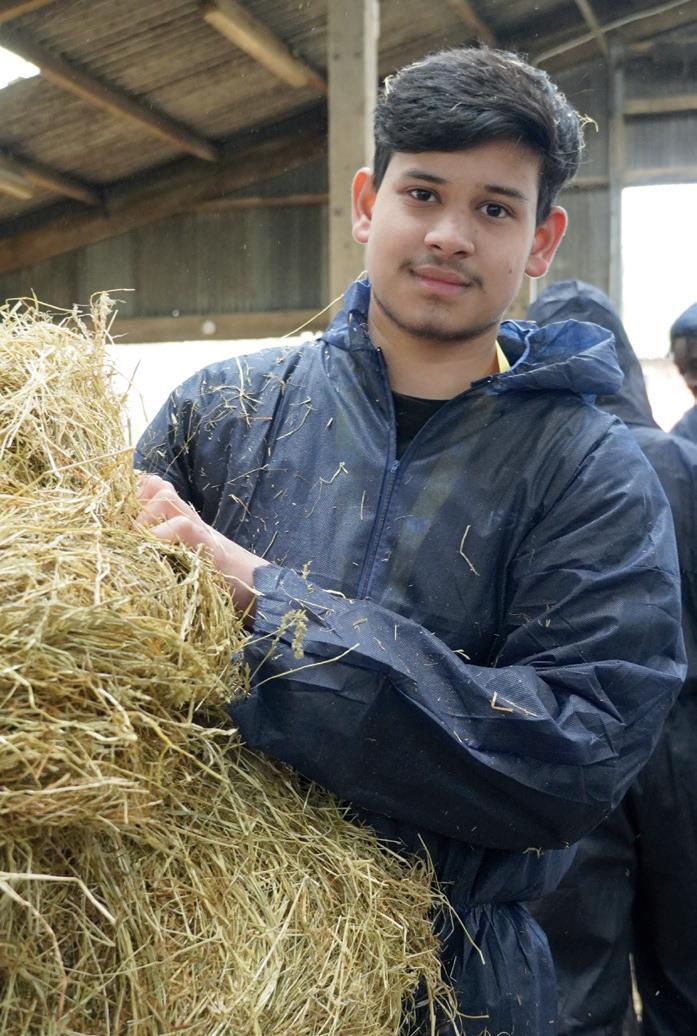
The weekend featured talks by industry experts, from academics to business owners. The young people also met Wilfred and learned how he fulfilled his dream to become a farmer.
“The experience on the farm and off the farm was just amazing,” said 17-year-old Majinder. “I developed quite a lot of skills such as communication, confidence and critical thinking.”
JORDAN, AGED 16
What did you enjoy about the New Faces For Farming Weekend?
It was good to get out of my comfort zone and experience something that I wouldn’t have before. My favourite part was getting in the barn with the pigs and cuddling the piglets.
Why did you become interested in farming?
I saw this opportunity online and I didn’t know about farming and agriculture but now since I’ve been here I’ve learnt so much about farming and the different opportunities agriculture can provide.
Professor Tim Middleton, Vice-Chancellor of Writtle University College, said: “Agriculture is facing a skills shortage. We need a new generation of highly trained professionals able to think across disciplines and apply fresh approaches. New Faces For Farming introduced young people to the industry and signposted the future courses they could undertake to equip them with the knowledge and professional networks they will need to pursue rewarding careers.”
The residential weekend was only the first stage of the New Faces For Farming programme, with the young people now looking forward to mentorship from sector experts.
Katy Warkup, group learning and development manager at Cranswick Plc. said: “Cranswick was delighted to be invited to support the New Faces for Farming initiative. As a proud British pig and poultry producer, we are passionate about ensuring that young people are aware of the varied careers that are available throughout the supply chain and encouraging more diverse talent into the food and farming industry.”
What did you enjoy about the New Faces For Farming weekend? Everything was new, refreshing and very educational for me, but most importantly fun.
What did you learn?
I enjoyed learning about how crops grow and the history of farming. Would you consider being a farmer?
I would consider being a farmer but not working with animals, rather working for the animals. Developing technology for them.
WWW.SOUTHEASTFARMER.NET | MAY 2023 7 TO ADVERTISE CALL 01303 233883 NEWS
SALAAM, AGED 16
PRAISE, AGED 17
Photos: Writtle University College
Bagshaws livestock market, Derbyshire, England, UK.
Bagshaws livestock auctioneer was established in 1871 and grew to occupy several auction sites across the UK, including this one at Bakewell in Derbyshire. Livestock auctions are big business – in 2017 alone, 1.4 million cattle and 10 million sheep were traded in auctions in England and Wales.
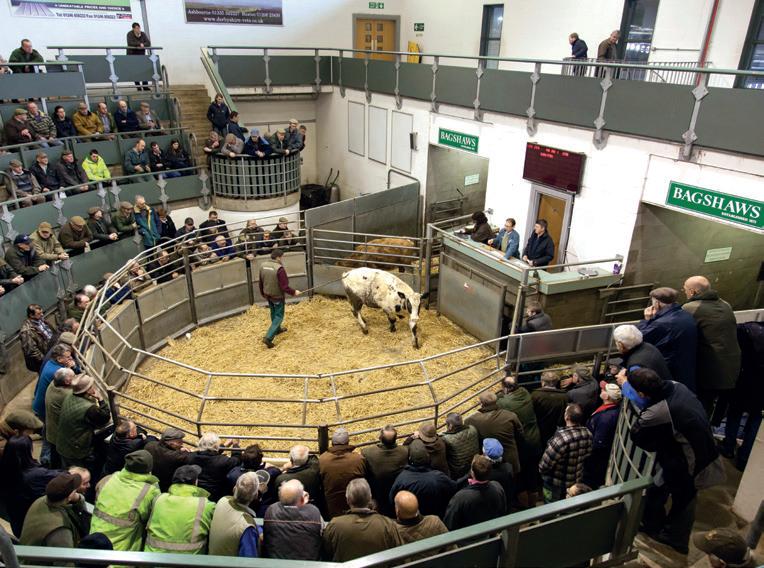
Credit: Alamy/Mark Richardson
I’m guessing farmers don’t generally have a lot of time for coffee breaks, but assuming most farm houses at least have a coffee table, Farming is an ideal book with which to grace it.
Round hay bales, Swinbrook, England, UK. Like pieces on a board game, neat round hay bales lie around this freshly cut field in the Cotswolds. Rolling hay results in the bale being more densely packed than it would be in a traditional square bale, meaning that it is more resistent to moisture penetration.
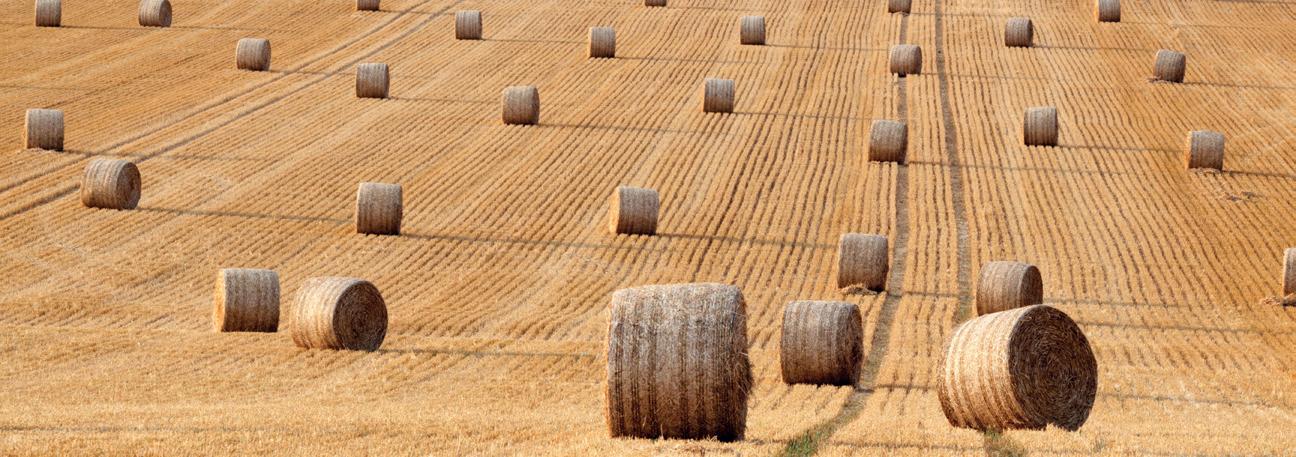
Credit: Alamy/Robert Harding
WORLD TOUR
Chris McNab’s splendid photographic round-up of farming practices from around the world – subtitled Growing the Food that Feeds Us – is a fascinating compilation that blends stunning imagery with bite-sized gems that introduce the reader, literally, to the world of farming. As McNab explains in his introduction: “The word farming … covers a vast catalogue of practices, crops animals and industries, from avocados to wheat, potatoes to pomegranates, cattle to llamas. Then there are the

differences of scale: today more than two billion people on the planet still work small plots of land intimately as subsistence farmers, often with tool types dating back millennia, but agriculture is also found in multi-million dollar industries, with farms covering tens of thousands of acres.”
This book takes the reader – or viewer for the most part – on a journey across Europe, through Asia and the Pacific to Africa, North America and then Central and South America, highlighting the challenges, the differences and the sheer scale of the task facing farmers around the world.

This country is represented by images of activities including grass harvesting in Shropshire and a livestock market in Derbyshire, while hops and Kentish apples, grapes and plums all feature. Each of the photographs is accompanied by a caption with just enough information, much of it fascinating.
 Malcolm Triggs
Malcolm Triggs
All images taken from the book Farming by Chris McNab (ISBN978 1 83886 255 8) published by Amber Books Ltd (www.amberbooks.co.uk) and available from bookshops and online booksellers (RRP £19.99/$29.99/CAN$38.99).
MAY 2023 | WWW.SOUTHEASTFARMER.NET 8 NEWS
Farm Waste Recycling Experts Providing waste solutions to Agriculture, Horticulture & Equestrian Collection & Recycling of... All types of Farm Plastics Workshop Wastes Veterinary Waste Waste Oil Waste Tyres Redundant Agri chemicals WasteTyresCardboard Tel 01264 736733 ian.kitson@kitsonrecycling.co.uk www.kitsonrecycling.co.uk No Membership fees
ALDI TOPS THE CHARTS

Aldi tops the latest chart in terms of the supermarket buying the most British apples, according to the data released by British Apples & Pears. There is a more detailed breakdown of the figures at www.britishapplesandpears.co.uk/supermarket-sales-data
HORTICULTURE CROP PROTECTION LAUNCHED


The formal launch of Horticulture Crop Protection Ltd (HCP) took place in mid-April, with five members of staff from the Agriculture and Horticulture Development Board (AHDB) moving over to the new organisation.

The transfer of the relevant information and residual levy funds has also been agreed with AHDB so that HCP will be able to continue the important Extension of Authorisation for Minor Uses (EAMU) and Emergency Authorisation (EA) work as seamlessly as possible for the horticulture sector.
Simon Conway, most recently managing director at Vitacress Salads
and Herbs, has been announced as the part-time CEO of the new organisation. He said he was “excited to be joining HCP and leading this new organisation at the start of its journey through the vital work it is going to do for the benefit of the UK horticultural sector.”
Ali Capper, chairman of the board of HCP, said Simon was “passionate about the future of the EAMU and EA service for UK Horticulture”. She went on: “Simon is joining us from mid-June and until then Jack Ward from British Growers Association has offered to continue to steer HCP. The industry is grateful to Jack for his efforts to make HCP happen and to help ensure it launches successfully.”
WWW.SOUTHEASTFARMER.NET | MAY 2023 9 TO ADVERTISE CALL 01303 233883 NEWS
Aldi Tesco Sainsburys Lidl Morrisons Waitrose Asda M&S Others Iceland Co-op Booths 0 900 1800 2700 3600 Tonnes sold Specialists in agricultural, deer and equestrian fencing and gates Top quality materials. Top quality service. T: 01622 831 781 | M: 07710 179 600 enquiries@woodchurchfencing.co.uk www.woodchurchfencing.co.uk SUPPLY & INSTALL with Auction & Trade Stands Rare & Traditional Breed Cattle, Sheep, Goats Early Sale of Breeding Sheep Livestock Equipment Contact: Thomas Baker James Cook-O’Connell 01233 502222 Ashford Market Ashford Kent TN25 0HB www.hobbsparker.co.uk SATURDAY 11am MAY 13
Tonnes of British apples sold to UK supermarkets by BAPL growers in March 2023



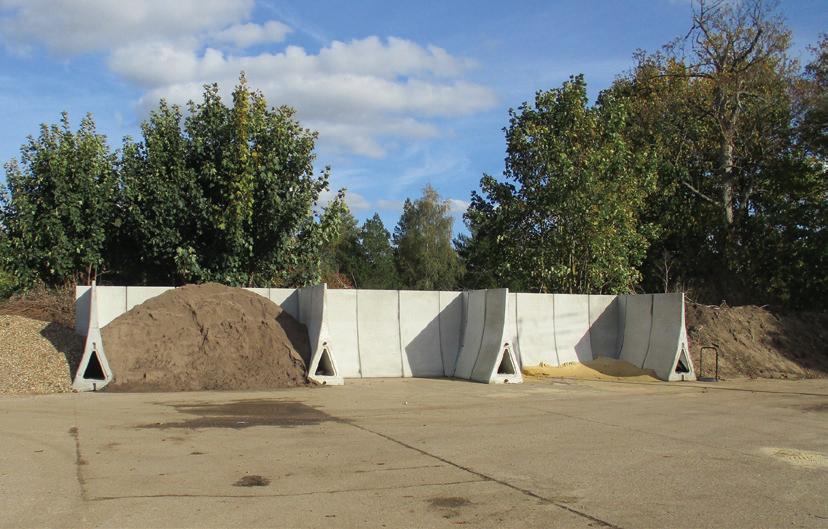




















MAY 2023 | WWW.SOUTHEASTFARMER.NET 10 Unit 6, Martells Quarry, Slough Lane, Ardleigh, Colchester, Essex CO7 7RU 01206 982260 www.npclimited.co.uk Retaining Walls
LOYAL READERSHIP
The results are in following our survey of readers in the October edition of South East Farmer – and they make for interesting reading.
We offered a case of wine donated by our sister magazine Vineyard to one lucky respondent, with prizewinner Andrew Highwood of The Cottage, Hawkhurst, having his name pulled out of the hat.
The survey questions were aimed at helping the South East Farmer team make sure the magazine continues to deliver what you want.
It revealed a loyal readership, with the vast majority (85%) subscribing to the magazine each month and a similar figure reading every issue. That figure rises to an impressive 97% who read it ‘every or most’ months. Most have been readers for more than ten years, while 90% have been reading it for at least six years.
We asked readers to rate our news stories and editorial features, with 97% replying that they found them ‘excellent’ or ‘good’.
When we asked why, answers included:
• “I am now retired and live in Devon. It is nice to keep up with what is happening in the South East, where I farmed.”
• “They are informative, varied and well written.”
• “Broad spectrum of different subjects covered with some entertaining articles by provocative authors.”
• “I enjoy the personal opinionated columns like Nick Adames highlighting the shortcomings of the EA and the water companies. Also technical sheep (Alan West) and property/legal issues.”
Unsurprisingly, most of our readers work in agriculture, with smaller percentages in related industries such as banking/finance and PR. Almost half (45%) work or worked with sheep or goats.
We asked if there were any additional subjects people would welcome reading about in South East Farmer.
Answers included:
• “More on horse livery topics and diversification.”
• “Reviews of new products and agricultural shows are good. Information on future events is useful.”
• “More for the younger farmer.”
Top of the poll when readers were asked to name their favourite section of the magazine was news, with market reports coming second and Monica Akehurst’s column a close third. Below that the voting was fairly evenly spread. Looking at a broader range of topics that could be included, “practical guides” and “machinery/technology features” scored highly, along with coverage of events and “land and property”. A farmer’s diary was also popular.
Asked “What single change to South East Farmer would increase your enjoyment of reading it?”, answers included:
• “More beef farming topics, relating to real life practices.”
• “News from smaller/smallholder farms.”
Of those who responded, 83% felt the £3.99 cost per issue represented very good or quite good value for money.
Few of the respondents use South East Farmer online (www.southeastfarmer.net), with most (60%) saying they used it ‘rarely’. Those who did though, overwhelmingly rated it positively or had no opinion either way.
Almost seven out of ten people had used the magazine to source information on a product or service and over half had bought something advertised in South East Farmer
Social media seems not to be a priority for our readers, with Facebook the only channel to appeal to our busy farmer respondents, with 13% having seen our page. Most of those used it for news or to hear about new products.
The survey revealed that most people buy their machinery from a local dealer or privately, with a reasonable proportion using auctions and sales.
Thank you to all those who helped shape the future of the magazine.
Do you currently work, or have you ever worked, in farming, and if so in what sector (s) do/ did you work? Tick all that apply...
Animal breeding
Beekeeping & honey
Crops
Dairy Horses
Horticulture
Organic farming
Plant health & trade
Poultry
Sheep & goats
Export/import
Wholesale/distribution
Banking/finance
Media/PR
Retired/former farmer
Member of farming family/community
If other
How do you rate the news stories/editorial features in South East Farmer?
WWW.SOUTHEASTFARMER.NET | MAY 2023 11 TO ADVERTISE CALL 01303 233883 SURVEY
Excellent Good Okay Poor
ELMS AND INHERITANCE TAX – INTO THE UNKNOWN?
Readers will be familiarising themselves with the new post-Brexit farming subsidies which are replacing the old EU Common Agricultural Policy.
Farmers may now apply for new government incentives under the Environmental Land Management scheme (ELMS). In essence, these will provide government funding for a myriad of actions undertaken by farmers which are designed to protect the environment.
Unlike previous schemes which sought to incentivise the scale of farming undertaken by pure acreage, the new scheme seeks to reward farmers who protect nature and improve the environment.
Many in the farming community will, no doubt, be wrestling with the measures (set out in a 101-page document) and unpicking the complicated rates of payment available for different activities. Farmers may benefit, for example, from anything from adding organic matter to soil (paid at £22 a hectare) through to maintaining land to produce fruit to organic standards (which will reap £1,920 a hectare).
The scheme is in its infancy and already has its critics. Time will tell, but this article seeks to draw attention to another facet of the overall
picture – that of Inheritance Tax (IHT). How far will ELMS change the use of land and farming practices to the extent that Agricultural Property Relief (APR) and Business Property Relief (BPR) will be put in jeopardy?
Although it may not always seem like it, farms can currently benefit from generous IHT reliefs, worth up to 100% of asset values. Very broadly, APR offers relief on assets used for agricultural purposes and BPR assists with other assets used for trading purposes.

Historically these reliefs have been critical in allowing farmers to pass on their farms and businesses to the next generation against a backdrop of ever-tougher trading conditions.
Given that agricultural activity is fairly poorly defined within IHT legislation, there are concerns as to whether certain environmental activities under ELMS will qualify as “agricultural” in the eyes of HMRC - either in their own right or as ancillary practices alongside more traditional activities.
but further confusion was not to be welcomed! For this reason, it was a relief to hear that one of the less well trailed aspects of the Government’s recent Budget Statement was to announce a consultation on whether or not APR will continue to apply where farmers adopt long-term changes to their businesses to incorporate environmental schemes under ELMS. Indeed, the decision seems to have been brought about by the recognition that farmers are currently unable to commit to changes at least partly because of the uncertainty in this area.
RICHARD HEARNE Associate Director (Legal Executive)

T: 01580 767532
E: richardhearne@wmlaw.uk
www.whitehead-monckton.co.uk
It raises the spectre of farmers taking a leap into the unknown – potentially trading commercial sustainability against the longerterm ambition to pass assets down the generations in a tax-efficient way. Of course, farmers will be well used to this dichotomy –
It is to be hoped that the consultation will not only produce a favourable outcome for the continuation and flexibility of APR but, perhaps more importantly, that legislation can be framed in a clear way that provides farmers with certainty. That means precise guidance that tells a farmer how he or she may develop their business without compromising the tax reliefs that allow them to pass on those businesses to the next generation.
In the absence of clear guidance, the farmer faces a potentially uncertain position and will need to carefully weigh up any changes to their business to take into account a number of competing factors.
MAY 2023 | WWW.SOUTHEASTFARMER.NET 12 LEGAL
UK farmers are doubling their original target of providing 100 four-wheel drive vehicles to support Ukrainian soldiers.
Announcing the decision to increase the target to 200, the charity Pick-ups for Peace said it had “become clear that limitless numbers are needed” and added that “the huge generosity of the British farming community and, increasingly, other sectors” had made the group confident it would succeed in its goal.

Forty-five vehicles have now been delivered over two trips and another 50 pledged. The original fundraising target of £100,000 has almost been reached but will also be doubled to cover the cost of transporting the vehicles and bringing volunteer drivers back home.
Alongside private individuals and groups providing vehicles, donating funds and volunteering to drive the trucks to Ukraine, corporate donations have included a quad bike and 10 generators from Springfield Properties and four vehicles from Trinity Grain.

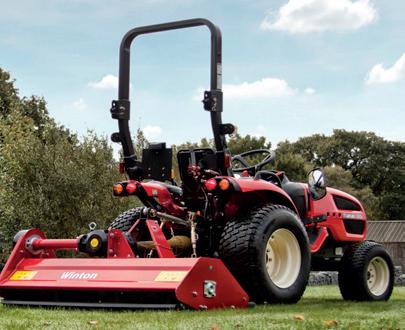
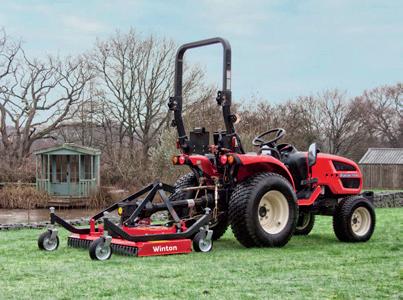

Trips are planned monthly until at least June, with around 30 vehicles in each convoy.

Co-founder Vince Gillingham said the pick-ups already delivered “continue to save countless lives as they transport injured troops from the frontline and ferry generators and food to those who need them, including hospitals”.
TRIBUTES PAID TO DAIRY INDUSTRY STALWART
Tributes have been paid to dairy industry stalwart Ian Potter, who died at the end of February aged 62 following a short illness.
The founder of Ashbourne, Derbyshire-based Ian Potter Marketing Services, Ian was well known as a quota broker, columnist and commentator as well as as a farmer. He was also instrumental in the smooth running of the National Fallen Stock Scheme.
Ian was rewarded for his outstanding service to the dairy industry in 2010 when he was presented with the Royal Association of British Dairy Farmers (RABDF) Princess Royal Award at Buckingham Palace.
That organisation said it was “shocked and saddened” to hear of the death of the man it described as “a giant of the dairy industry for three decades”, adding that he “always had the interests of dairy farmers at heart”.
RABDF Chairman Di Wastenage said: “Ian has been synonymous with the dairy industry for as long as I can remember and was a massive asset. He loved what he did and the industry he worked in, and his passing will leave an enormous void in the sector.
“Over the past three decades, he has kept us updated on market conditions with his weekly bulletins or comment pieces in farming publications, building respect across the industry and beyond. His voice and presence in the dairy industry will be missed by al."
Ian is survived by his wife Carole and children Harriet, Jack and Lydia.
WWW.SOUTHEASTFARMER.NET | MAY 2023 13 TO ADVERTISE CALL 01303 233883 NEWS
INCREASED SALES AND SERVICE M A BROWN & SONS LTD & M&A Brown & Sons Ltd, Iden Green Farm, Cranbrook Road, Goudhurst, Kent TN17 2PA info@mabg.co.uk 01580 211599 www.mabg.co.uk Comprehensive range of professional tractors from 19hp to 75hp WORLD CLASS POWER TOOLS LANDRAIS E Do you need... › A new building? › To build a noise bund? › To create a hardstanding to store silage or straw? › To build up an area to prevent flooding › To fill in an old lagoon? We may be able to help We can subsidise your costs by building up areas with subsoils classed as non-hazardous inert waste. We can gain all planning permissions needed so give us an opportunity to reduce some or all of your costs on your next project or improvement. East Sussex area preferred. RAISE THE LEVEL OF YOUR LAND Robins of Herstmonceux (Est 1962) 01323 833181 Email: helen@robinsofherstmonceux.co.uk
TARGET
ZERO FOR FARMERS IN RECENT NET ZERO POLICIES
Dear Sir,
Farmers were failed yet again on what was dubbed ‘Green Day’ as the Government revealed its plans to reach net zero.
It was shocking that the Government’s policies brought nothing in the way of new policies to transform 70% of the UK – its farmland.
This was even more concerning, coming as it did the day after the Climate Change Committee revealed that the UK has failed to prepare the country for climate change.
Farmers are on the front line dealing with increasingly volatile weather, and they hold so many answers through agroecological, nature-friendly farming methods such as organic.
Soil contains more carbon than the atmosphere, yet the Government’s own data reveals that intensive agriculture has caused arable soils to lose about 40% to 60% of their organic carbon. Leaking this back into the atmosphere threatens any moves towards net zero.
With 44% more soil carbon on organic farms, agroecological and regenerative farming methods such as organic must be prioritised.
The solutions are there for the taking. A key example is combining trees with crops and livestock in agroforestry. More trees on farms would capture carbon and provide a habitat for our depleted wildlife.
Agroforestry boosts farm resilience through shade, shelter and healthy soils that capture carbon and protect against floods and drought.
The Government must incentivise a farmer-led tree revolution and a whole-farm focus on restoring soil to absorb rather than release
carbon, using the example already being set by agroecological and organic farmers across the country.
Why is the Government failing to listen to the needs and priorities of farmers and implement the best solutions for reaching net zero?
Gareth Morgan, Soil Association Head of Farming Policy
ALARMED BUT NOT SURPRISED
Dear Sir,
Organic Farmers & Growers (OF&G) is alarmed but not surprised by the latest Climate Change Committee (CCC) report. The ‘lost decade’ is the tip of the iceberg. Agricultural intensification has escalated over the past 70 years and has undoubtedly contributed to many adverse impacts on the environment.
As an organisation we have been advocating for the joined up and transformative approach that is necessary to resolve these complex issues, and within that we have been emphasising the scientifically proven benefits that organic delivers within that context.
The goal of climate neutrality should provide sufficient motivation for government to back proven, environmentally favourable farming practices like organic without the need for re-invention.
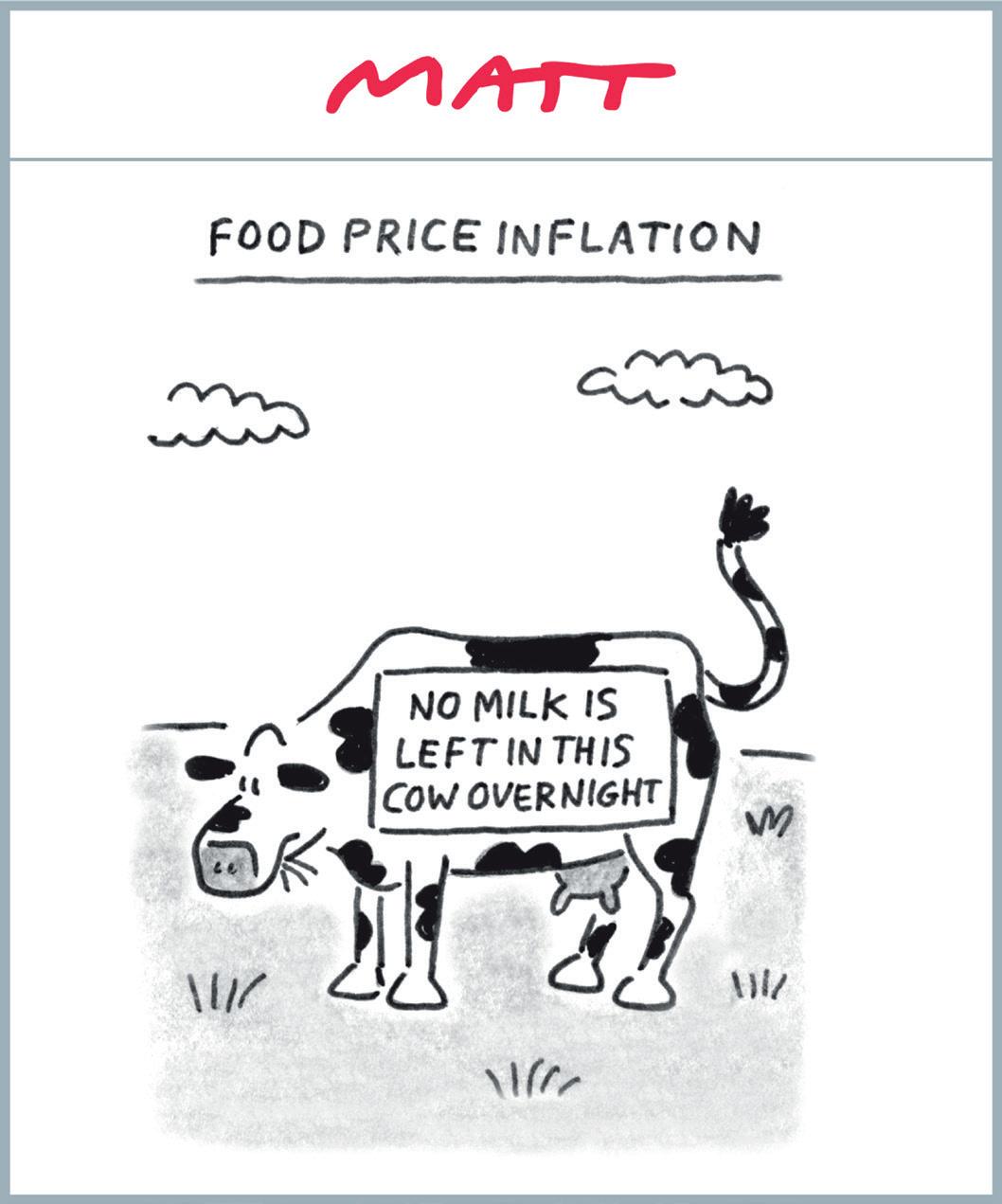
The climate crisis is the single biggest threat we face. To mitigate the risks, a much bolder, cohesive legislative framework is now desperately needed. If the CCC report tells us anything, it is that government now needs to step up and take real leadership, as evidenced by our near neighbours, to ensure that the necessary transformation to a more environmentally benign food production systems is undertaken in a structured and managed way.
Roger Kerr, chief executive, Organic Farmers & Growers
twitter NATIONAL WORK EXPERIENCE WEEK
National Work Experience Week is all about celebrating the power of work experience in agriculture and horticulture. We'd love to hear your stories, positive examples and resources.
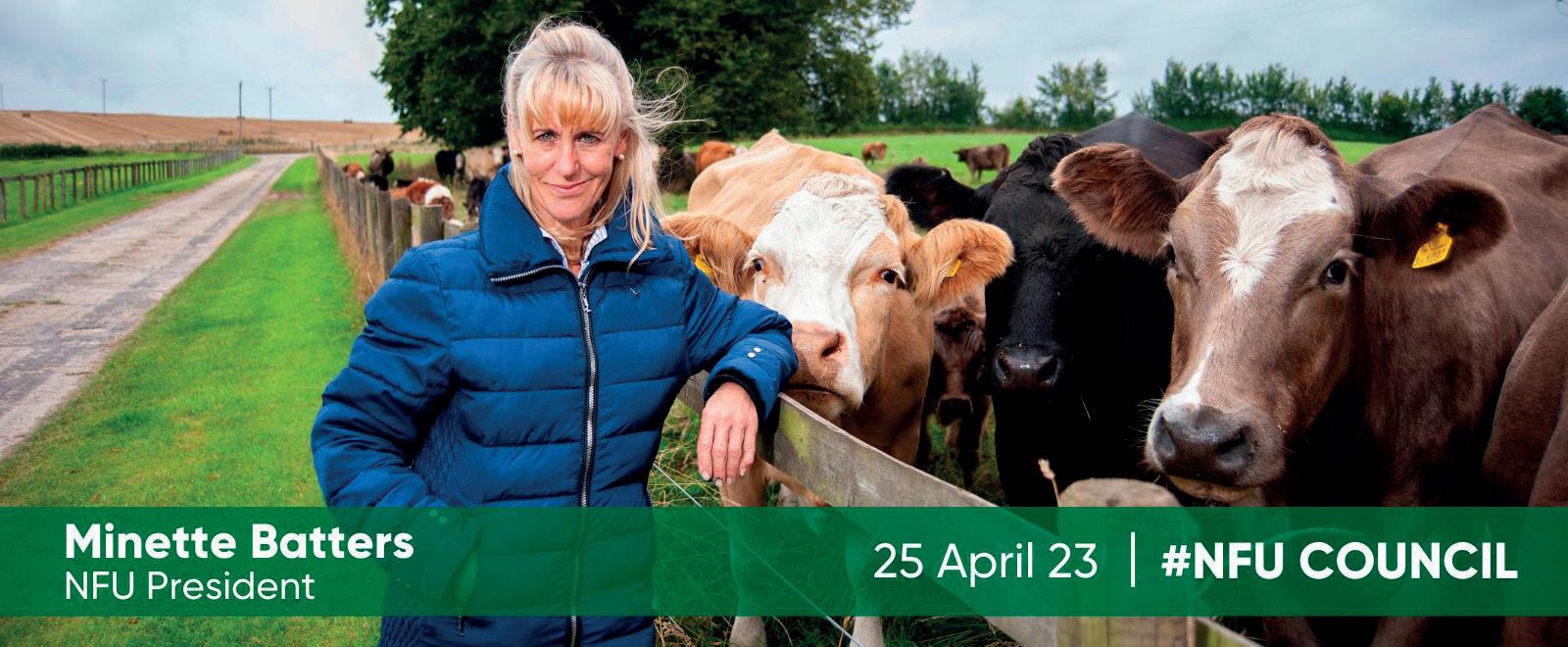
How has work experience shaped your career?
Use the hashtag #NWEXW2023 and join the conversation!
The Institute for Agriculture and Horticulture @TIAHnews
twitter CHAMPIONING WORK TO PUBLIC
MAY 2023 | WWW.SOUTHEASTFARMER.NET 14 SEND YOUR VIEWS OR COMMENTS: SEF.ED@KELSEY.CO.UK twitter @SOUTHEASTFARMER facebook-square SOUTH EAST FARMER
© Telegraph Media Group Limited 2023 LETTERS
NFU President @Minette_Batters closes #NFUCouncil by reiterating what a crucial time this is for British food and farming and said what an important role delegates had in championing their work to the public National Farmers' Union @NFUtweets
SIMPLER IN THE OLD DAYS?
Fruit picking is rarely off the agenda these days, with growers struggling to find enough labour and manufacturers continuing to look for ways to mechanise the process in order to reduce costs.
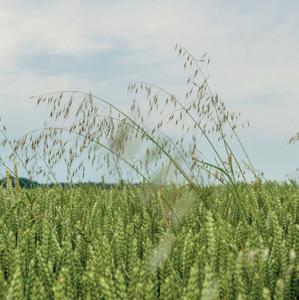
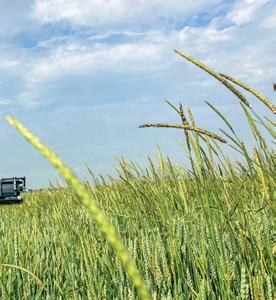

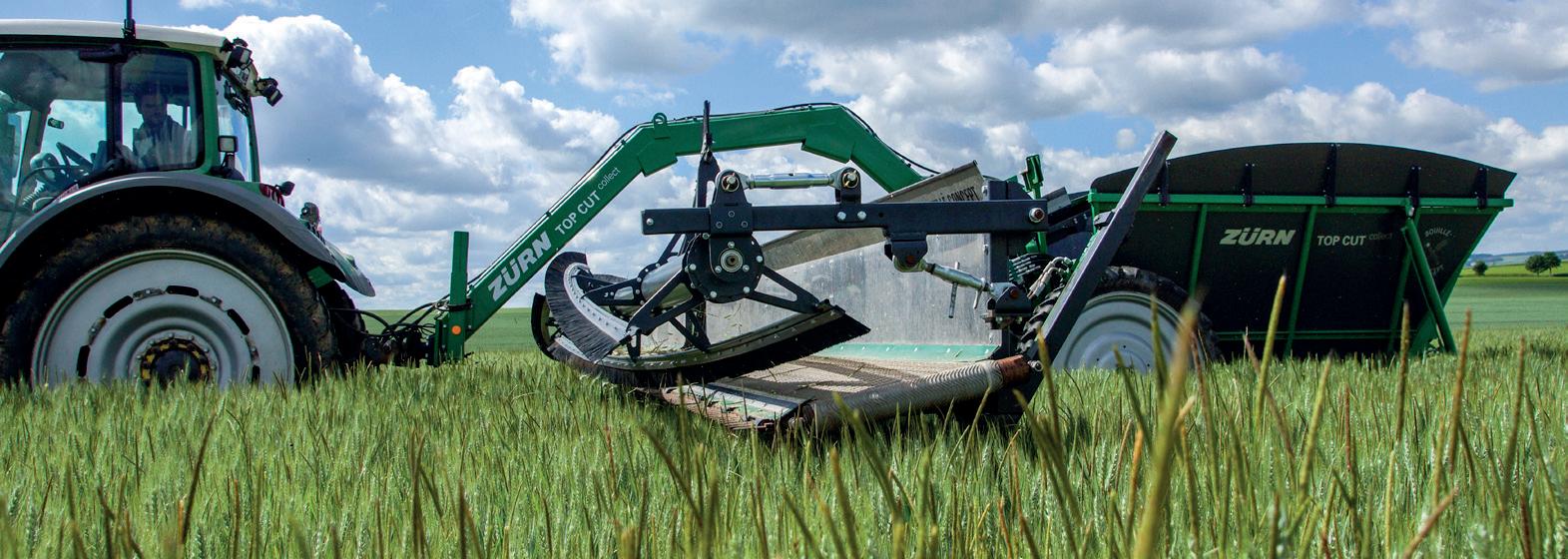

Back in 1949, as the photograph below shows, times were simpler, with the summer’s harvest gathered in by families from Essex and the East End of London who treated the trip down to Kent and Sussex almost as a holiday.
The photograph was sent to South East Farmer by Ted Sclater, whose father G E Sclater owned Coneyhall and Sharpes Farms at Newick in mid-Sussex and welcomed families to pick his produce during the season. Ted, now 81, suspects he is somewhere in the picture.
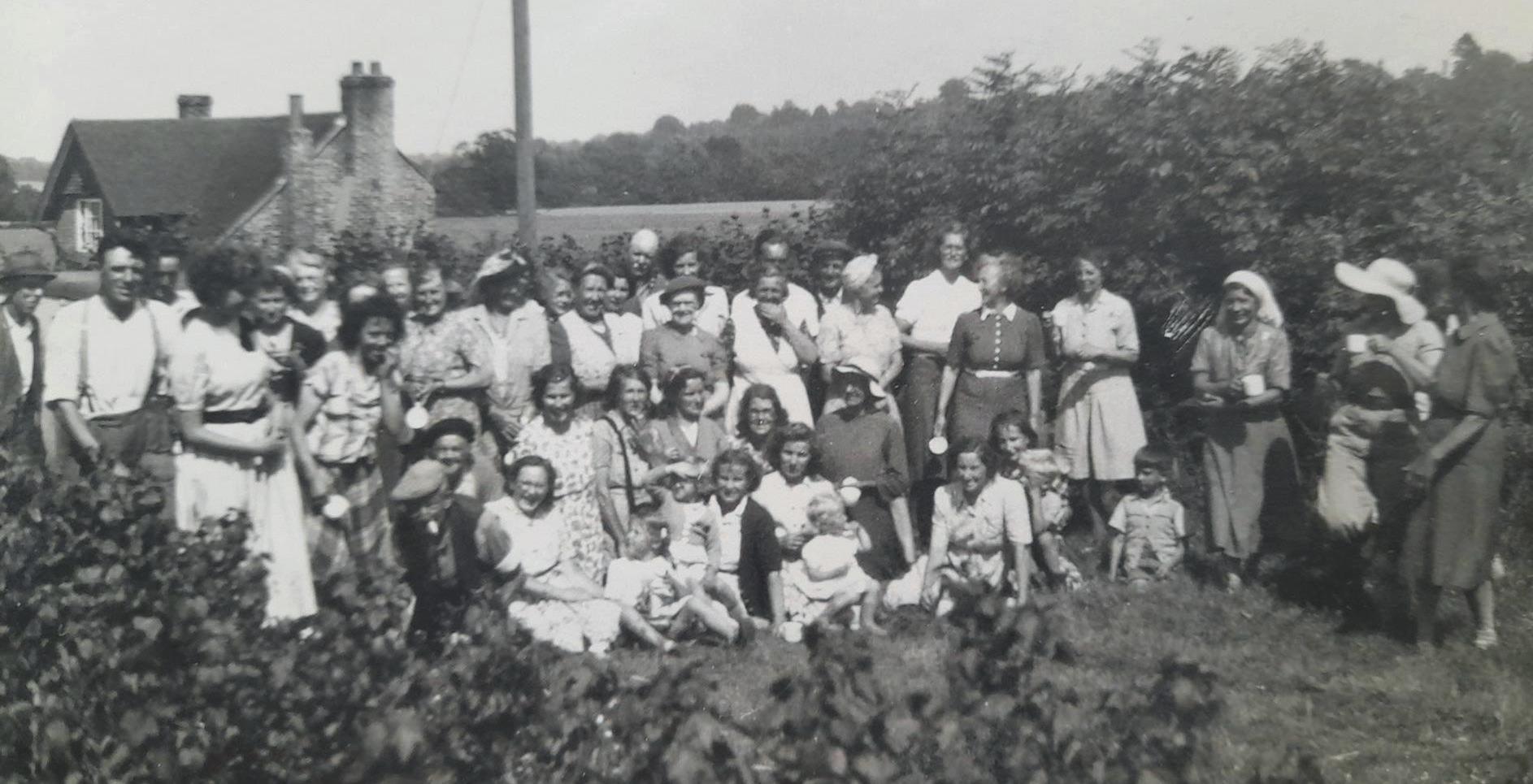
“The families were mostly from the East End and took their summer breaks in sequence so that they could harvest strawberries, raspberries and blackcurrants and then move on to Kent for the hops,” he
recalled. “The fruit was then sent by train each evening from Newick Station to London for sale. Blackcurrants went either to the London market or into large wooden barrels to be sent to Ribena.
“We had regulars at the farm, mostly women and often with children. It was a working holiday for many people at that time.”
Ted, who recalled that his father’s farms
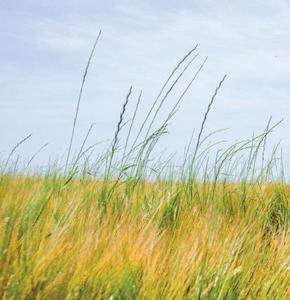
grew the high-yielding Newick Leveller gooseberry, now lives in Hampshire, worked in agriculture himself and only retired two years ago.
If you have an interesting old farming photograph you would be happy for us to publish, please send a scanned copy to sef.ed@kelsey.co.uk
WWW.SOUTHEASTFARMER.NET | MAY 2023 15 TO ADVERTISE CALL 01303 233883 NEWS
RETHINK WEED CONTROL NEW TOOLS FOR KEEPING YOUR FIELDS CLEAN The TOP
removes weed
grow higher
your
Benefit from our new technology for mechanical weed control and reduce weed pressure in the field. Pasture Care We are pleased to announce a new contracting service to help the removal of: BLACK GRASS RYE GRASS WILD OATS Pasture Care t. 01844 217771 m. 07768 020607 www.pasturecare.com or any other weed that sticks its head above the canopy. ZURN UK 01844 275275 sales@zurnuk.co.uk www.zurnuk.co.uk
CUT collect
seeds that
than
crop.
STRIKE ACTION THREATENED



Better working conditions demanded for myself and flock.
Lambing in April doesn’t necessarily guarantee good weather. This year, February lambers probably had the better deal, with a combination of persistent rain and cold winds making later lambing tougher than usual.

The newborn lambs landing on waterlogged ground soon need to get going and fill their bellies with colostrum; otherwise they’re in trouble. The fallen stock collectors have been busy and predators are looking very content. We somehow started lambing before we got the ewes crutched out, a big mistake as we’re now doing it as they lamb. The crows appear to be delighted and have been swooping down and flying off with the daggings, presumably to use in their nests.
I’m sure there are easier ways of making a living than shepherding. When I’m tired, wet, cold, hungry, covered in paint spray and iodine and wearing waterproofs that are liberally plastered in meconium, cleansings etc, I do slightly question my sanity.
Lambing time is enjoyable, right? Luckily my assistant Brie the sheepdog shares my enthusiasm. Family members have all pitched in and their help has been invaluable, although they say I fuss too much. I can’t remember them complaining about that when they were younger. Everyone has enjoyed scoffing the box of broken biscuits and beer to boost flagging energy levels.
Eight years ago we switched to all outdoor lambing, which is more natural and works
well when all goes to plan and fine weather predominates. However, having endured one week of dismal weather conditions and with Shrek (our Kawasaki mule) currently lacking the vital four-wheel drive facility for getting around in mud, I felt a change was needed.
As the person who does early and late checks, I threatened strike action, demanding better working conditions for myself and flock. Consequently, we reshuffled the cattle accommodation and created a space to get the expectant flock in overnight. Out days on grass, in at nights with access to hay and hi-energy blocks gives you the best of both systems. It makes it a lot easier sorting out any lambing problems.
While outside overnight, our very first triplet ewe to lamb managed to get on her back. Instead of being out there at first light I stopped to tube two calves who needed to be rehydrated because they were scouring. This delay proved costly for my cast ewe. When I spotted her, I righted her and immediately lambed her. She had three good lambs, all dead.
The mother lasted five minutes and promptly died herself. All my lambing equipment, treatments etc, were on Shrek, which I hadn’t used in order to avoid muddying up the pasture. I was distraught; sometimes you just can’t win. The calves made a good recovery, but they could have waited.
Our second triplet ewe produced three fine lambs herself; I was delighted. I left
her out as it was a rare moment when the sun was shining, until I was alerted by the hungry bleating of her off spring. On investigation the mother turned out to only have milk in one side.
It’s not all problematic, and on the whole we’ve had a lot of good strong lambs that haven’t needed any input from us other than iodine on navels, marking up, recording and ringing. They are the ones that are on the keepers list. The cull list is quite long, consisting of any who give me grief, as I’m aiming for carefree future lambings.
As usual, I’ve fostered spare lambs whenever possible, wet fostering and skinned lamb coats being the most successful method. Ewes in the headstock system has not worked so well. One single-bearing ewe with a good milk supply who was mothering up fine was not at all impressed when we tried to use her as a foster mum. When she was released from the headstocks she rejected both lambs. We removed the foster but then she refused her own lamb. It’s been a battle of wills; 14 days later, hoorah... she has finally come around to my way of thinking and agreed to care for her own lamb again.
Youngest daughter retrieved a poorly seven-day old lamb from the field. It looked very tucked up, its mouth was cold and it was flailing around, which didn’t bode well. Its rescuer announced that she didn’t know why she had carried it in because it looked like a ‘no hoper’. I told her to “have
MAY 2023 | WWW.SOUTHEASTFARMER.NET 16 MONICA AKEHURST AT THE KITCHEN TABLE Early morning check round
faith” while eldest daughter helped me administer its revival therapy. We gave it a warm 10% glucose injection into the peritoneal cavity, tucked it up in a bed of straw and put some lamb boost on its tongue.
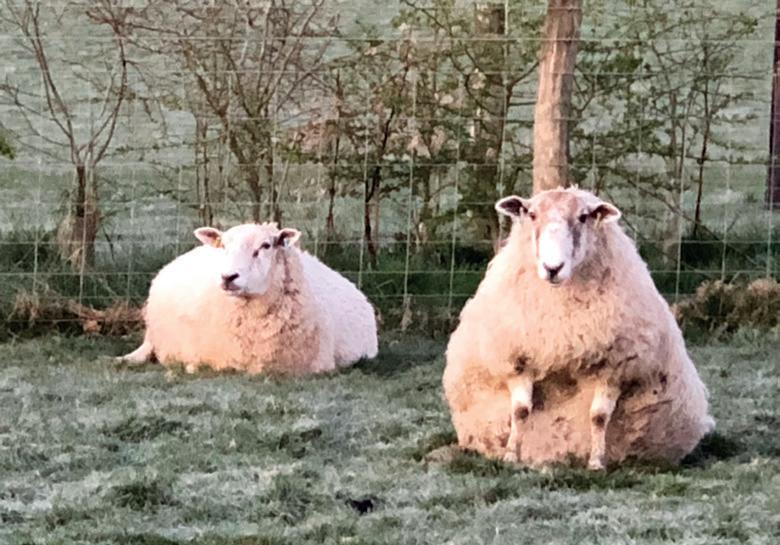
I gave it some Metacam pain relief and antibiotic cover for infection, left it for an hour and then tubed some warm milk. I actually then forgot about it until I went to the shed to do a check before bed and met a lamb tottering around. He might be one of the ugliest lambs around, but he sure is a character with a strong survival instinct. He’s called Dobby.
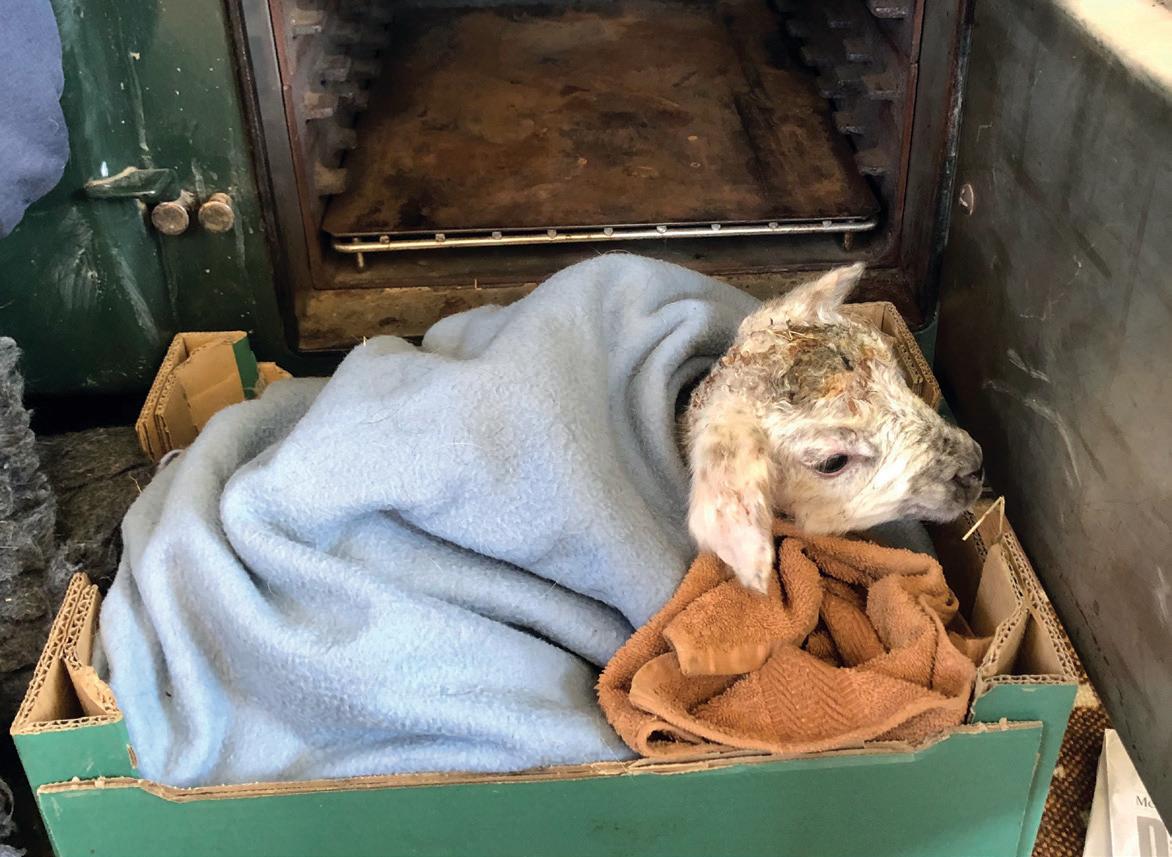
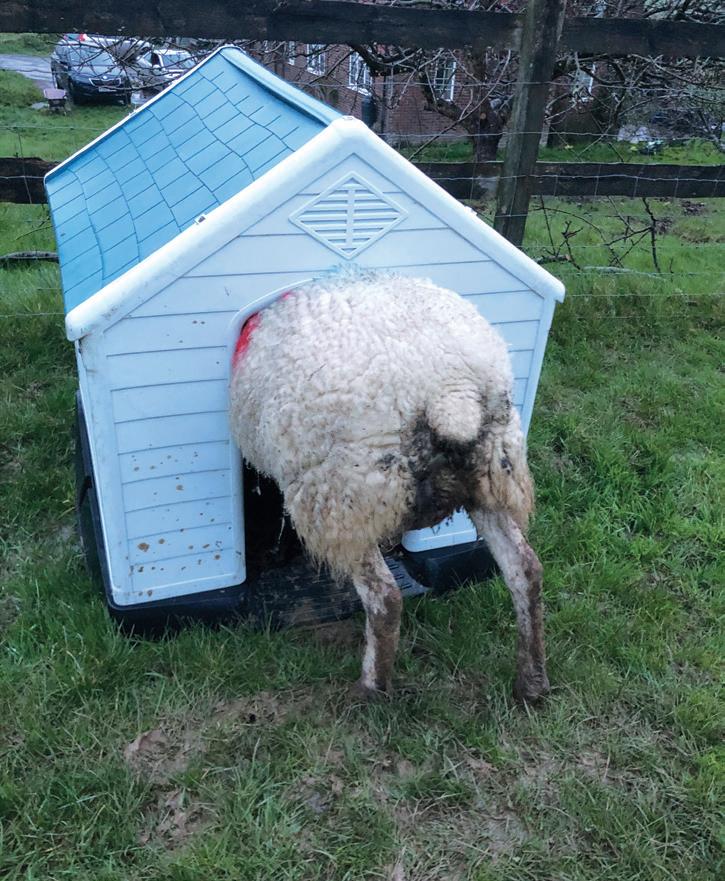
This year I’m trying a different tactic with any problem cases and triplets. They’re all going in a field together; I’m trough feeding the ewes and providing creep feed for the lambs. All spare lambs are joining this group and being topped up with milk feed as required.
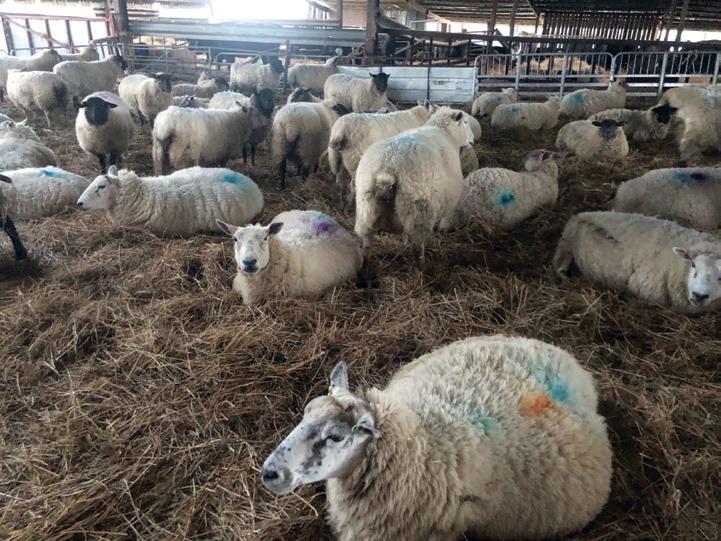
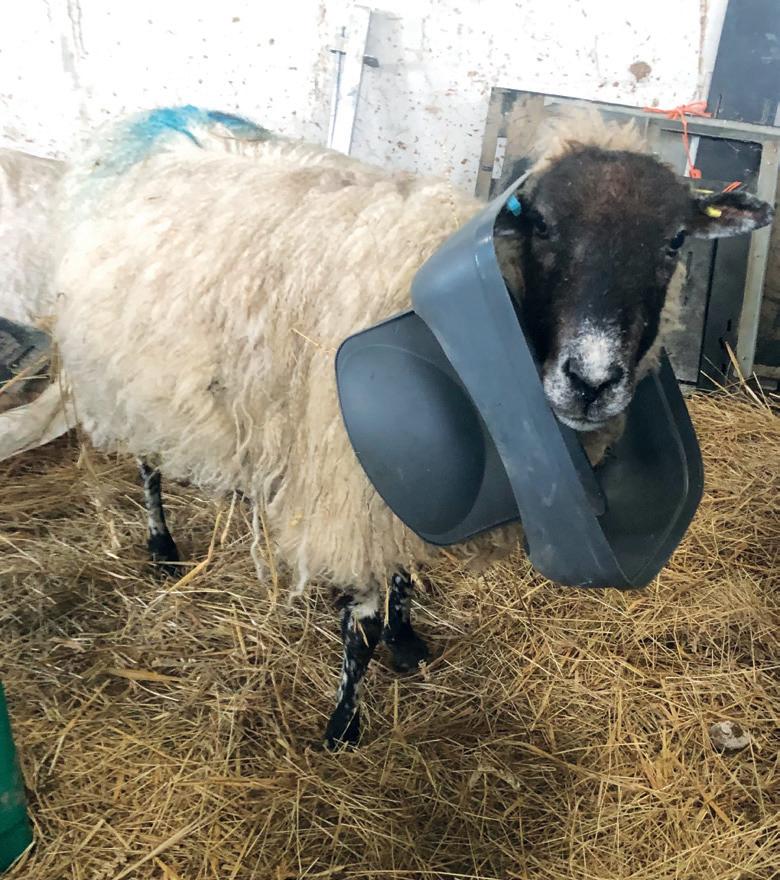
Although feed is expensive, it’s worth it because the lambs are still receiving care from ewes. A shared care system, it frees up my time and it’s better for the lambs not having to be cooped up in a shed. A footpath crosses this field and any walkers get besieged by an ever-hopeful posse of lambs looking for milk.
Our grandchildren have all spent time with us during lambing and naturally we’ve delegated a few jobs to them. It’s fun to have little helpers around. I’ve been asked to talk to George’s class (4/5 year-olds) about farming and this could be an interesting experience for us all. I feel strongly that educating children about where their food comes from is important and plays a vital role in securing the future of our industry.
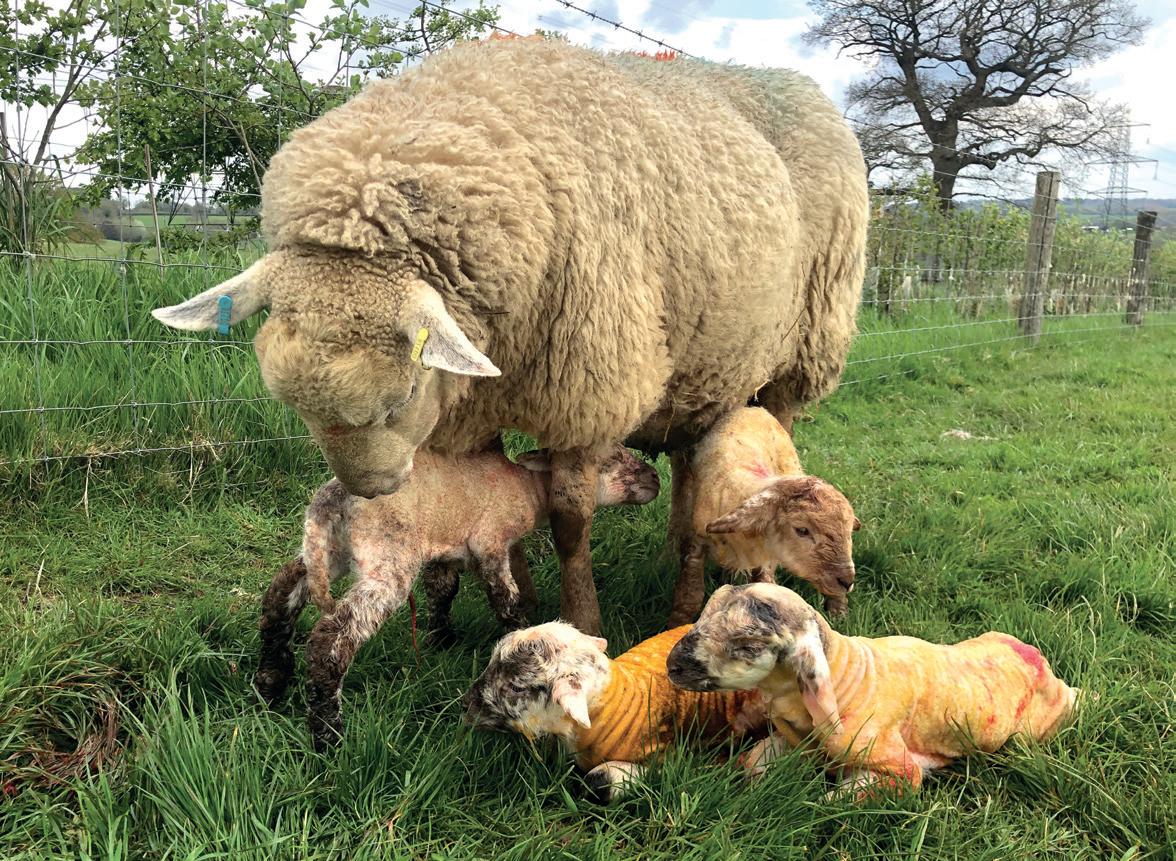
Getting warm and cosy
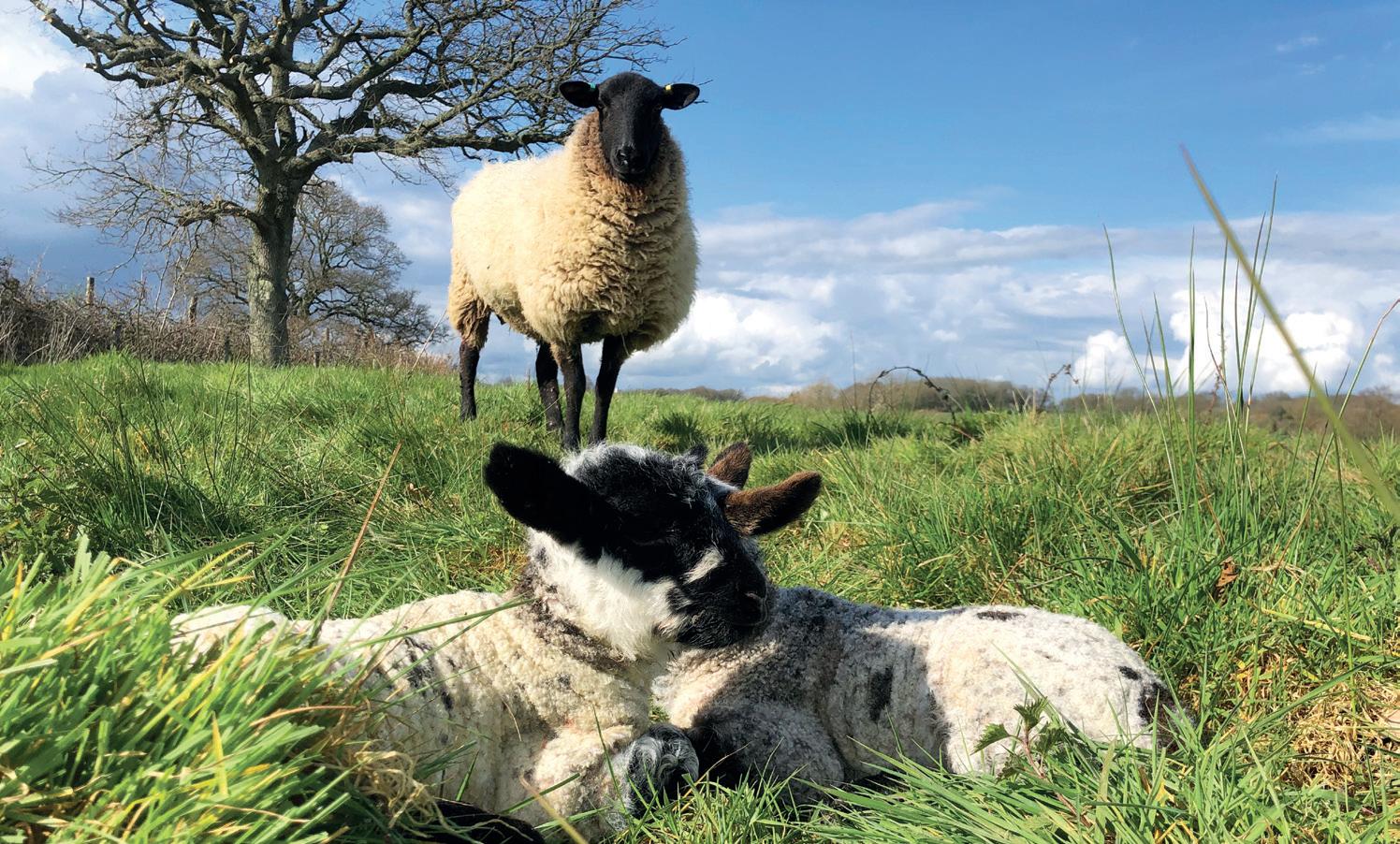
WWW.SOUTHEASTFARMER.NET | MAY 2023 17 TO ADVERTISE CALL 01303 233883
It’s
wet, guess where her lambs are? Unfortunately it’s a bit of a squeeze for mum
It’s hard to keep track of four
Having the bin lid around your neck is a give away that you’ve been raiding the food bin
Siblings bonding with an anxious mum watching over them
We found some space in the shed
It’s so difficult to find a comfortable position
SOUTH EAST FUTURE OF FARMING
FAR-REACHING CONFERENCE ON THE FUTURE OF FARMING
Plumpton College’s exciting new meetings and events facility was launched in fine style to an appreciative audience when the college hosted a far-reaching conference on the future of farming.
The inaugural South East Future of Farming event, entitled Driving Productivity and Profitability in a Sustainable Way, was a fitting choice for a venue which itself represents a bold step into the future for the college.
The striking Agrifood Centre, built by Sunninghill Construction Co Ltd, has been designed as a ‘hub’ that College Principal and CEO Jeremy Kerswell hopes the agricultural industry will make good use of as it tackles the challenges and grasps the opportunities presented by farming in the 21st century.
On the eve of the opening of the impressive modern building, he described it as “a place where people can come together, share, learn and take away practical solutions for their own businesses”.
The inaugural event, sponsored by Virgin Money and the Country Land and Business Association (CLA) was well supported by
farmers, landowners and representatives from a broad range of agricultural interests who were keen to hear from an impressive line-up of speakers and join an exciting range of workshops.
Opening the event, Jeremy said the building was part of an £11m investment in the college farm, facilities and infrastructure that represented a “new chapter” and would give Plumpton “an even more pivotal role in the future of agriculture”.
Chair Emily Norton stressed that the event was designed to offer practical solutions to farmers looking to move towards ‘net zero’ and who were facing new expectations from links in the corporate supply chain.

The first speaker, Martin Lines, an arable farmer and contractor and chair of the Nature Friendly Farming Network’s UK steering group, delivered a fascinating talk on working with nature while also improving the farm’s bottom line.
He said the decline in species meant there had to be a new approach to farming and said the emphasis could no longer be on simply producing as much food as possible.
There had to be a balance, he stressed. His advice to farmers in the audience included using technology to map fields and avoid buying inputs that weren’t needed, understanding their own carbon footprint before thinking about selling carbon credits, thinking about direct drilling and planting cover crops and joining forces with other landowners to benefit from biodiversity net gain opportunities.
Susan Twinning, chief land use policy adviser at the CLA, posed the question: “Is farming under threat?”, pointing out the impacts of Brexit, the pandemic, policy changes and supply chain issues.
She said that the past 12 months had seen a “welcome repositioning” by DEFRA from a focus purely on environmental issues to one that also recognised the need for food and energy security, in part because of the Russian invasion of Ukraine – but she said the environment remained a major focus.
Although she reminded the audience that under Basic Payments only 25% of farming enterprises would have been profitable without that subsidy, she pointed out that
MAY 2023 | WWW.SOUTHEASTFARMER.NET 18
Amelia McLean, Brian Richardson, Susan Twining, Martin Lines and Emily Norton
there were now “schemes for everything” before listing the opportunities now coming on line.
“There’s not much missing,” she said, adding: “But how it’s implemented will be the important bit.” On that topic, she said lighter touch inspections, faster payments and rolling programmes – “a lot of the things farmers had been asking for” – should help.
Brian Richardson, a former Nuffield Scholar who joined Virgin Money in 2018 as UK head of agriculture, also highlighted the challenges facing farmers, from supermarkets squeezing prices to keep the cost of living down for their customers to the loss of Basic Payments, policy changes and interest rates.
On a more optimistic note, though, he moved on to highlight the opportunities of
making better use of data, robotics, changing consumer tastes and the grants available for helping the country move towards ‘net zero’.
He also said that a carbon audit was “a great investment” for farmers as they needed to know their own baseline to take advantage of future carbon trading schemes. “I am positive about the future because farming can adapt, but it’s all going to look different,” he concluded.
As an example of what is possible, the final speaker, Hugh Lowe Farms director Amelia McLean, was a superb choice. The fifth generation, family-run soft fruit business grows 5,000 tonnes of strawberries and 1,000 tonnes of cane fruits a year using polytunnels and peat-free substrate.
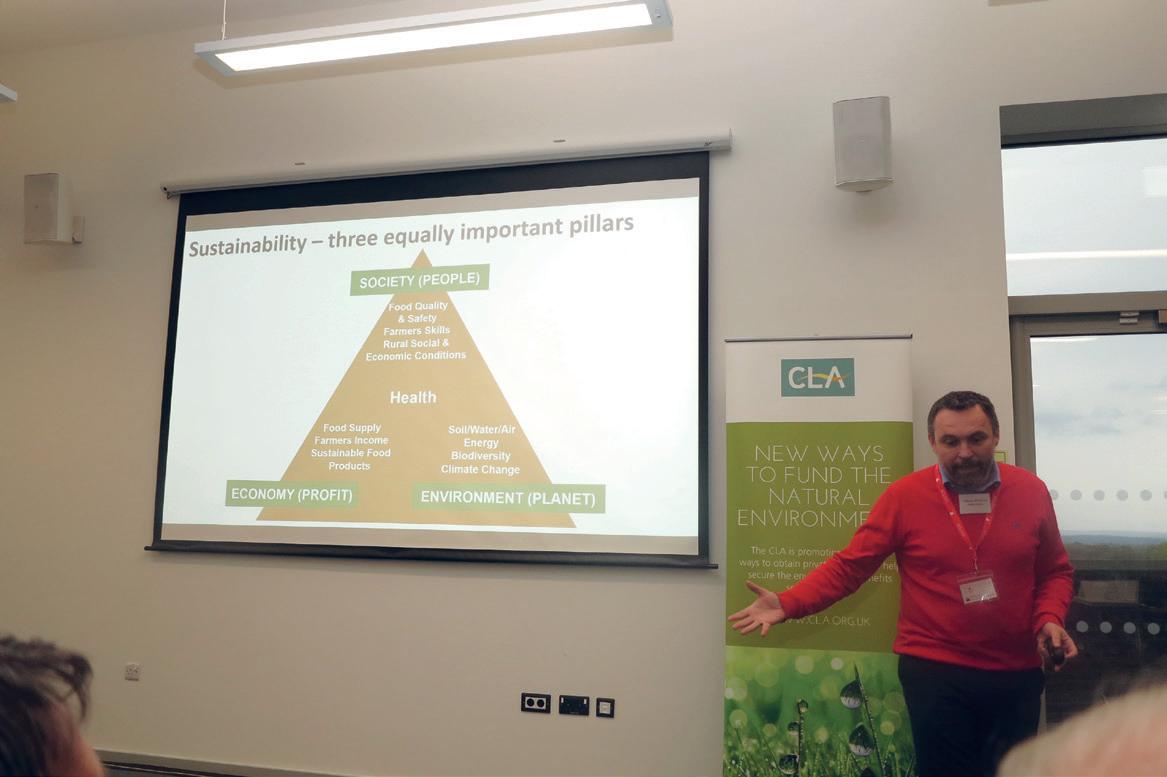
Amelia explained that Hugh Lowe Farms
Progressing towards authorisation as zootechnical feed additive (for dairy) Positive EFSA opinion 19 Nov 21
Active ingredients are feed materials
Progressing towards authorisation as zootechnical feed additive (for dairy)
was making positive progress towards being net zero by 2035 and focused on reducing carbon emissions. She admitted to being “obsessed with data” and explained how the business made full use of technology and robotics and relied on genetics and a carefully controlled environment to enhance efficiency. On the polytunnel technology, she pointed out: “When it rained in the summer, we had our strawberries under cover faster than Wimbledon covered centre court.”
Following the fascinating talks – and before an equally impressive buffet – delegates chose from a number of interesting workshops delivered by representatives from Nonington Farms, Plumpton College, Harper Adams University and Loddington Farm.

WWW.SOUTHEASTFARMER.NET | MAY 2023 19 TO ADVERTISE CALL 01303 233883
The striking Agrifood Centre, built by Sunninghill Construction Co Ltd
Professor Michael Lee of Harper Adams
(reality):
Intellectual property Sufficient data Regulatory pathway Supply chain to farm Supply chain to animal Means of verification Market acceptance Incentive
(3-NOP)
One of Michael Lee's fascinating slides: Feed supplement development
simplistic personal opinion – many shades of grey
Boavaer
Mootral (garlic)
Agolin Ruminant (plant extracts)
SilvAir (nitrate)
Asparagopsis seaweed
available in commercial
More acceptable than 'synthetic' products? In NL,
an approved
ANCA nutrient managment
Initially, dairy cow only Being explored as a method approved in a voluntary carbon trading scheme
Not
quantities
will be
technology within the
system









A27 M23 A23 A22 A3 A31 M3 M4 A259 A2 M20 M2 M25 M40 M25 M1 M11 A1 A928 A12 A14 A14 A1 A47 A10 A17 A47 A12 A1 Eastbourne Portsmouth Cowes ington Eastleigh Crawley Uckfield Tunbridge Wells Dover Maidstone Guildford Staines Croydon Rochester Dartford Slough LONDON Watford High Wycombe Stevenage Luton Royston Hertford Harlow Chelmsford Bicester Milton Keynes Bedford Ipswich Bury St Edmunds Cambridge Northampton Kettering Peterborough King’s Lynn Ely Norwich BENINGTON COLCHESTER FULBOURN LITTLEPORT MARLESFORD FRAMLINGHAM SUDBURY FYFIELD ESHER DARTFORD RINGMER ALBOURNE NORTH WALSHAM ROCHFORD WYMONDHAM BRAINTREE ASHFORD ULTING ernestdoepower.com AGRICULTURE SPEAK TO YOUR LOCAL AREA SALES MANAGER OR CONTACT YOUR NEAREST ERNEST DOE POWER BRANCH FOR MORE DETAILS. • ALBOURNE Sovereign House, London Road, Albourne BN6 9BN Tel: 01273 834689 • ASHFORD Hendon Barn, Woodchurch Ashford, Kent TN26 3QP Tel: 01233 224860 • DARTFORD 83 Main Road, Sutton-at-Hone, Dartford DA4 9HQ Tel: 01322 863 285 • ESHER Portsmouth Road, Esher KT10 9AD Tel: 01372 471009 • FAKENHAM 66 Holt Road, Fakenham NR21 8DY Tel: 01328 855611 • FRAMLINGHAM Broadwater Road, Framlingham IP13 9LL Tel: 01728 723963 • FYFIELD Fyeld, Ongar CM5 0NS Tel: 01277 899464 • RINGMER Broyle House, Ringmer BN8 5NN Tel: 01273 812707 • SUDBURY Cornard Road, Sudbury CO10 2XB Tel: 01787 375621 ERNEST DOE POWER | YOUR LOCAL CASE IH DEALER NEW CASE IH PUMA 260 AFS CONNECT BOOK YOUR DEMO TODAY
IMPRESSIVE SHOWROOMS
An impressive range of machinery greeted the crowds of customers and invited guests who visited the impressive Ernest Doe showrooms at Albourne in West Sussex in early April.
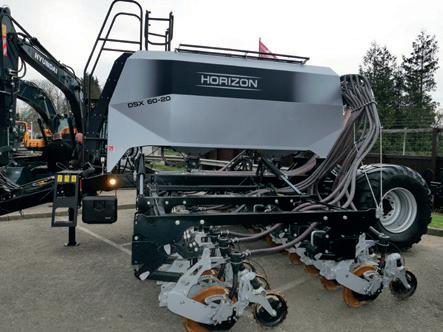

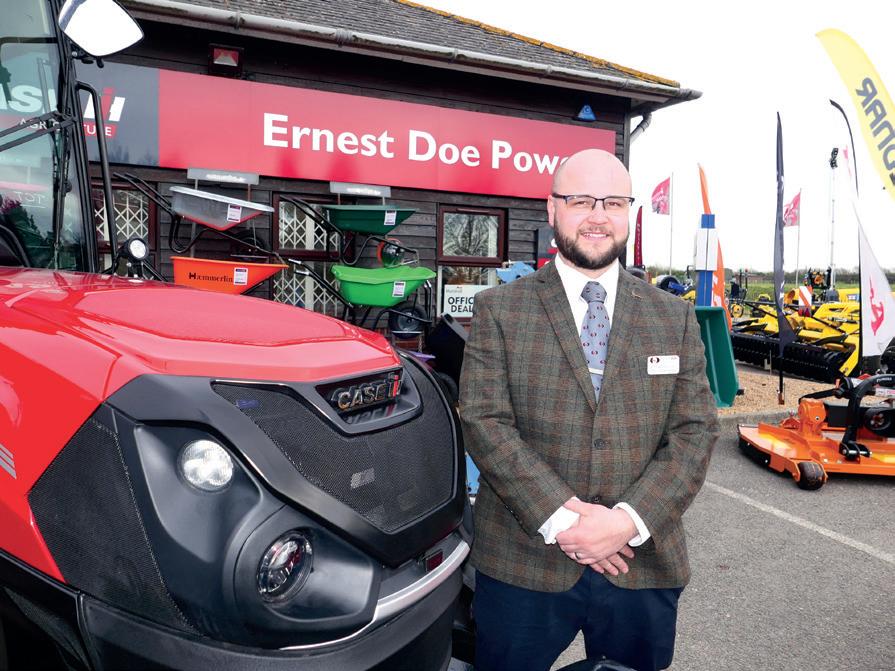
The event was the first to have been held at the spacious, well-located site for almost ten years and reflected the ambitions of the dynamic new team to put the depot on the map.
“We are keen to highlight the enormous range of equipment from leading manufacturers on offer here at Albourne,” explained branch and sales manager Michael Bridges during a break from chatting to visitors.
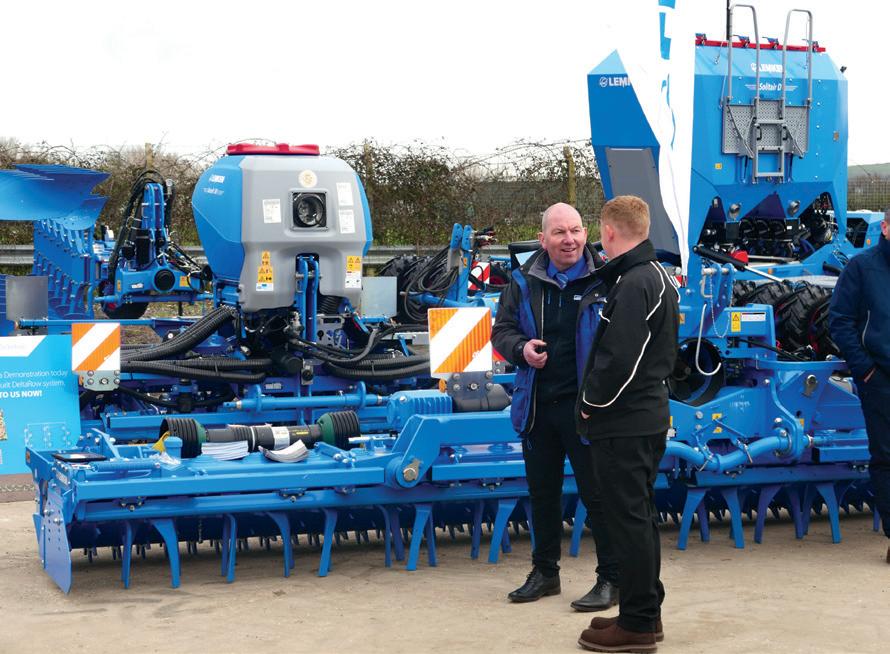

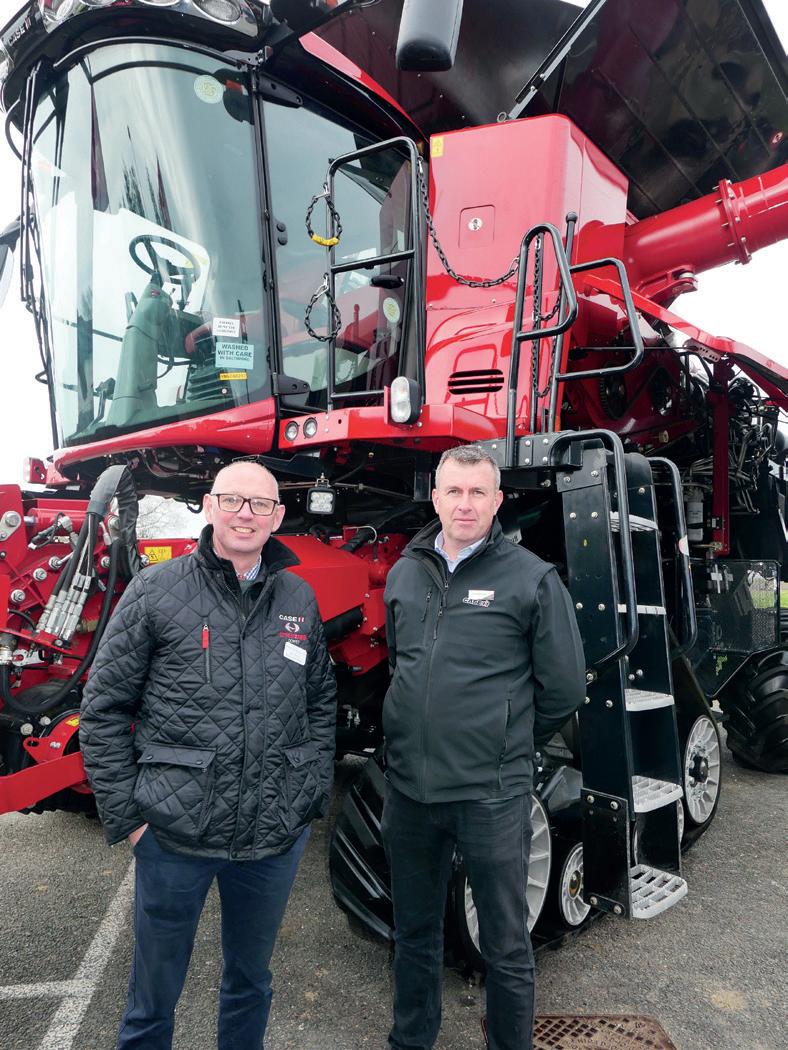

“This is a full-service depot which specialises in quality equipment for farmers, growers and vineyard owners, with a dedicated service team, well-stocked parts department and a

large country store all supporting the broad range of machinery on offer.”
Alongside the Case IH range of tractors and combine harvesters of which Ernest Doe is rightly proud, the Albourne depot stocks drills and cultivation equipment from Lemken and has also seen a great deal of interest in the new Horizon drill.
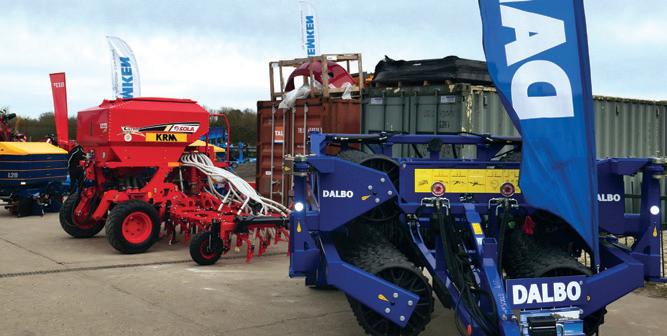
Rollers from Dalbo, hedge cutters and feeder wagons from Shelbourne Reynolds, Marshall trailers and fertiliser spreaders from KRM are amongst the equipment stocked, while the renowned SIP range of grass harvesting equipment is Ernest Doe’s top choice for quality.
“We are committed to delivering first class support for our entire product range, so we only work with quality manufacturers that we know will give reliable, long-term service,” explained Michael. “That’s why we stock the
brands we choose, alongside the excellent Case IH tractors and combines."

The South East’s increasing interest in viticulture is reflected in Ernest Doe’s focus on supplying vineyard equipment, with fruit and viticulture machinery manager Tom Wheatley on hand to support this growing sector.
Sprayers from Ideal and Berthoud, Dondi inter-row weeders and cultivators, and trimmers from Provitis, all new franchises for the Albourne branch, have given Ernest Doe a well-earned reputation amongst growers, while the Case IH Quantum F, N, V range of specialist tractors can provide the appropriate motive power.
“With a full product offering, Ernest Doe Power Albourne is well suited to supplying everything needed to provide a ‘start up’ package or additional requirements for wellestablished sites,” Michael commented.
WWW.SOUTHEASTFARMER.NET | MAY 2023 21 TO ADVERTISE CALL 01303 233883
OPEN DAY
Ed Perry, Ernest Doe Power general manager and John McAuley, Case IH territory manager (East and South East England)
Michael Bridges, Albourne branch and sales manager
Tom Wheatley, fruit and viticulture sales manager
IT'S A BANGER
Thismonth Nigel Akehurst visits Chandler & Dunn Ltd, a large, mixed family-run business that farms just over 600 hectares on two farms in east Kent split across three main enterprises of top fruit, arable and grass for livestock. Nigel met two family members from the livestock team and one from the fruit team to find out more about their business and the newly-acquired Sausage Shop in Sandwich.
The origins of the business can be traced back five generations to 1809, when Peter Chandler bought 28 acres at Lower Goldstone, Ash, in Kent. Today’s business began as a partnership after George Dunn married Winifred Chandler in 1922 and the limited company was established in 1954. The seven working directors are the seventh and eighth generations of the family to farm here.



Arriving down a small country lane past several orchards and a large farmyard, I arrive at the farm butchery (Goldstone Butchers) and farm offices, where I meet father and daughter Roger and Alice Dunn, two of the seven family directors.
Roger heads up the livestock enterprise which is run on about 200 hectares of marshland on the Ash Levels, all of which is in environmental schemes.
He took over from his father John, who registered the first pedigree Sussex on the farm in 1942 as the Goldstone Herd. Roger has
continued what his father started, breeding polled Sussex for today’s market, and has built up one of the largest herds in the UK, with 155 cows. This prize-winning herd supplies animals to the butchery enterprise as well supplying bulls, heifers and cows to other livestock farmers.

The business also runs a flock of 600 Romney ewes, some of which are crossed with Charolais to produce fat lambs, the majority of which are sold through the butcher’s shop. For many years the flock was lambed in April as the marshland grass can be slower to get going in the spring. With the addition of the butchery, it was decided to lamb 200 ewes at the beginning of March and the rest as usual in April, giving a steady supply of lamb to the butchery.
BUTCHERY BUSINESS
Following BSE and foot and mouth, both of which put considerable pressure on the livestock enterprise, the company decided
to try selling direct as livestock prices were under considerable pressure. There was also a demand for locally produced food with a known traceability. Selling meat packs to friends and family proved a success, so they purchased a specialist butchery portacabin in 2000.
Fortuitously, at the same time a small family abattoir was opened six miles away by J R Farm Meats. Today the carcasses are brought back to the shop, where the beef is hung for 21 days before being butchered, keeping the whole process local.
Over the years the demand has grown and they now butcher and sell two bodies of beef and at least 10 lambs a week through the shop. Alongside the traditional cuts of beef and lamb, the butchery also sells homemade pies and uses locally sourced pork to make sausages.
Daughter Alice joined the business in 2000 on a gap year after school just as the butchery was building up and decided the business gave her an exciting future. Twenty-three years later
MAY 2023 | WWW.SOUTHEASTFARMER.NET 22 NIGEL AKEHURST VISITS: CHANDLER & DUNN LTD
it is still providing new challenges with a new retail outlet.
In 2004 the business moved out of the specialist butchery portacabin into a converted granary with a sales area, cutting area and a large walk-in fridge. Being “off the beaten track” they rely mainly on loyal customers who value traceability and local production, Alice explained.
The butchery also offers a click and collect service via their website which allows customers to collect from the butchery on the farm or the recently acquired Sausage Shop in Sandwich.
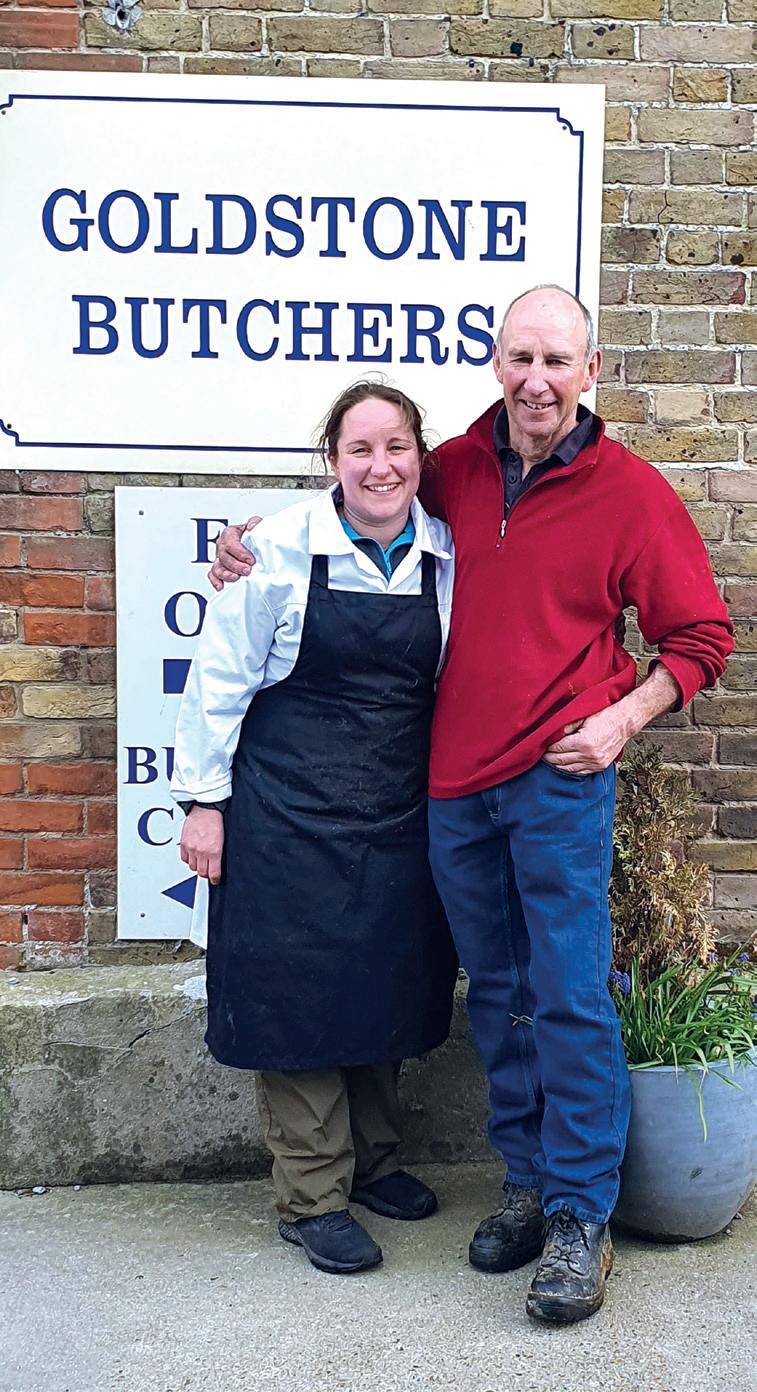
SANDWICH SAUSAGE SHOP
When the owner of the Sausage Shop in nearby Sandwich, Les Kinnear, decided to retire in March, Chandler & Dunn jumped at the chance to take it on. Having supported a weekly farmers’ market in the historic town, it made sense to expand their retail offering and it allows them to tap into the passing trade they don’t get at the farm butchery. They officially reopened for the Easter weekend and have been thrilled with the support in their first weeks of trading, said Alice.
SUSSEX BREED
The Sussex breed is well suited to the extensive rearing system and land types Chandler & Dunn use for the livestock enterprise. Eager to learn more about their Sussex herd, I asked Roger what age they finished their cattle.
“Over the years we have come to realise that the ideal age for us to finish is around 20 months,” said Roger. Typical carcass deadweights are around 330kg to 350kg, added Alice.
To do this they bring them inside for their final 90 days, feeding them a diet of homeproduced silage and a mix of barley, wheat and beans (also home produced) which is ground onsite by a specialist milling wagon. They also feed brewers’ grains from several local breweries and waste apples and potatoes when available.
At the time of visiting, the cows were still in yards due to recent wet weather. Turning out too soon could result in poaching of the heavy marshland soils. He hoped to get them out as soon as conditions allowed, said Roger, who was in the process of moving some of their cows back to the main farm to PD the following day.
Once out on grass they split the cows into three or four bulling groups. They calve twice a year, 90 in the autumn and 60 in the spring. When showing me a group of his spring calvers, he stopped to give one of his favorites a back scratch. "They are lovely cows to work with and easy calving,” he said, though he admitted they do have a challenging calving every so often.
Both Roger and his stockman Chris Reed take animals to agricultural shows in the South East, where over the years they have been successful. This success has helped the sales of breeding stock; most years Roger will sell between 10 and 15 breeding heifers privately, along with some prized bulls.
A key driver behind the growing popularity of the breed is its ability to do well on minimal forage. With the summers becoming increasingly dry in the South East, it’s a trait that is becoming more sought after, Roger said.
ROMNEY SHEEP
At the time of my visit, the team had nearly finished lambing their 600 Romney ewes. Lambing of 200 ewes starts in early March, with the remainder of the flock lambing in early April. Lambing percentages are around the 135% mark. Roger likes the Romney as it suits the marshland, but is tempted to try some easy care sheep in the future.
Most of the lambs are finished on a homegrown ration (they bring them inside for the last six weeks) and sold through the shop.
FRUIT
Chandler & Dunn grows around 200 hectares of apples and has around 3,500 tonnes of specialist storage on site. Fruit is stored on the farm before being sent on to packers and on to supermarkets. They grow on two sites, Goldstone and Perry farms.
Fruit brings in most of the farm income but also accounts for a large share of its costs, said Richard Chandler, one of the family directors managing the fruit enterprise.
Chandler & Dunn specialises in growing top-tier dessert apples, he said. Varieties grown on site include Gala, Egremont Russet, Jazz and Braeburn, and the business is introducing new varieties such as Crimson Crisp, Daliclass, Smitten, Kissabel and Ladina. As many orchards as possible have trickle irrigation and the company has water abstraction licences for both farms.
FARM FACTS
• Strong brickearth on the upland with heavier soils on the marshland
• 155 pedigree suckler cows (430 head of cattle)
• Keep 25 to 30 replacements each year and sell 10 to 15 breeding heifers and a few bulls through private sales
• 100 finished cattle sold through the butchery annually
• Finished cattle average 330kg to 350kg deadweight
• 600 Romney ewes with a lambing percentage of around 135%
• Majority of lambs sold through the shop, with remainder sold via Ashford livestock market
• Open Farm Sunday every other year –last event 1,200 attendees
• Some properties originally used by regular staff now rented out as the number of full-time employees has reduced
• Farm campsite – operated 28 days last year and now has planning permission for a permanent site that will be operated by Nethergong camping
• LEAF, GRASP and Red Tractor Accredited
WWW.SOUTHEASTFARMER.NET | MAY 2023 23 TO ADVERTISE CALL 01303 233883 >>
Roger and Alice Dunn
The business is a member of Fruition Producer Organisation (a grower group) with fruit going to two large local packers which supply the majority of UK supermarkets. Having a range of outlets allows better crop use, with fruit not suitable for the fresh market normally sold for juice or fed to the cattle.
At the end of the picking season there is still some fruit left on the trees which is picked for a food charity called The Bread and Butter Thing. Last year approximately 30 tonnes was harvested for the charity, with the apples going to food banks.
Richard explained that as soon as the apple passes its optimum pick date it starts to take goodness from the trees. “If you leave the fruit on the tree, it ruins the return bud for the following year, so our options are either to pick them or shake the trees to get them off,” he said.
COLD STORAGE AND ENERGY PRICE RISES
Last year the UK market was flooded with small fruit from Europe because Europeans don’t like small apples and we do, said Richard.

As a result, the company still has a lot of apples in storage, which is expensive. Like many businesses they have faced huge increases in energy costs. The farm has invested significantly in solar panels and is installing more this year.
Richard said they hoped to sell all the crop by the end of June. Labour costs have also increased quite dramatically; they are finding it more difficult to source labour and are having to look further afield. A caravan site for the multi-national seasonal workforce has selfcontained units.
Alongside Red Tractor and LEAF audits, the company has undertaken an independent ethical audit (GRASP) and is also audited by the labour provider that supplies most of the labour via the seasonal agricultural workers scheme.

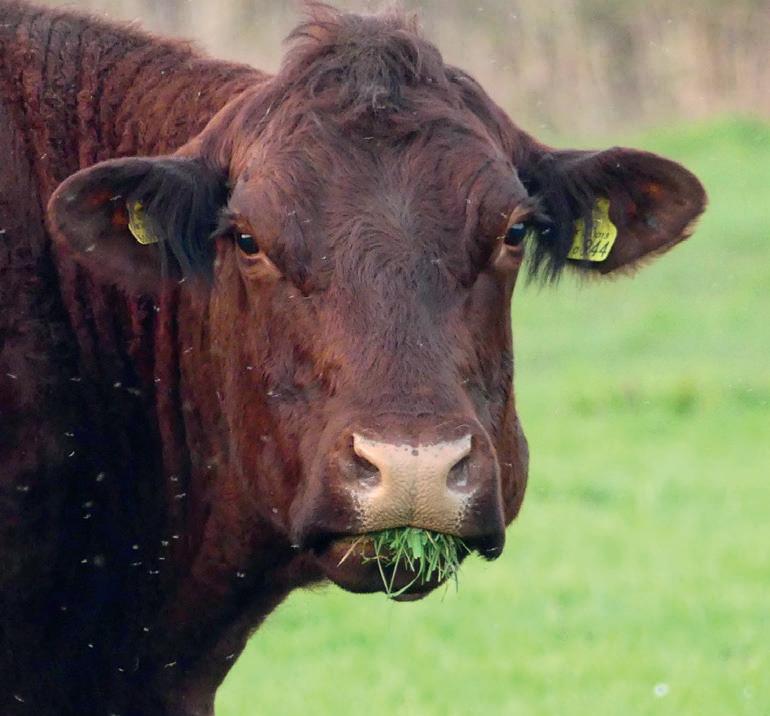
Most orchard operations are carried out on a piecework basis which Richard said pickers preferred because the more they picked the more they were paid, though they still have to earn the minimum wage.
“We’ve all picked apples on the management side and we know what is achievable and what
isn’t. We would expect a competent picker to be able to produce four bins of fruit a day. A really good picker can pick a bin in an hour. We have to make sure the slowest picker earns his or her basic minimum rate,” he said.
“Apple picking is not for everybody - they are carrying a picking bag of apples all day long. It’s tiring work and some people find they just can’t do it. We train them as much as possible but sometimes it doesn’t work out,” he added. Quality is of paramount importance and they try to encourage back people who have worked with them before.
It’s easy to bruise apples and so there is good supervision and roving quality control within the orchard to ensure good quality in the bin. With good quality crucial to the success of the business, the company is continually looking at ways to improve the picking operation.
Are robot pickers the future? I asked Richard. He thinks they are still some way off, simply because the robots he’s seen work on a suction process and don’t have the dexterity of a human hand (which is able to twist and lift the apple).
The next logical step, he thinks, are moving platforms, already being used by some growers, which enable small teams of pickers to pick directly onto conveyor belts. "At present these machines are still too expensive to be economically viable for them," he said.
With annual food inflation running at around 10%, I was interested to learn that the price of apples in the UK only went up 0.8%. Richard pointed to international growers in South Africa and South America “who are able to grow, harvest and ship their product half way around the world and still do it cheaper than we can because of their lower costs of production and our higher wages.”
With double digit inflation on many of their input costs, he thinks a lot of smaller growers will struggle to survive unless prices improve.
MAY 2023 | WWW.SOUTHEASTFARMER.NET 24 NIGEL AKEHURST VISITS: CHANDLER & DUNN LTD <<
As for their own operation, Richard couldn’t imagine doing anything else and said Chandler and Dunn were in business for the long haul and aimed to manage the peaks and troughs.
ARABLE AND ENVIRONMENTAL SCHEMES
The business has 214 hectares of arable land with a range of combinable crops including winter wheat, barley, oilseed rape, beans and linseed and 22 hectares of potatoes, with the remainder in environmental areas.
Most of the arable crops are grown on the tile-drained marshland, with the barley, beans and wheat stored on farm. The potatoes are grown on the upland brickearth and are irrigated with water from the Richborough Stream (the main drainage dyke on the Ash Levels).
Potatoes are stored, graded and packed on farm in 25kg bags and sold to local merchants. The grain is sold to a range of grain traders. The company is looking at the new Environmental Land Management scheme and already has quite an area in Countryside Stewardship.
OPEN FARM SUNDAY
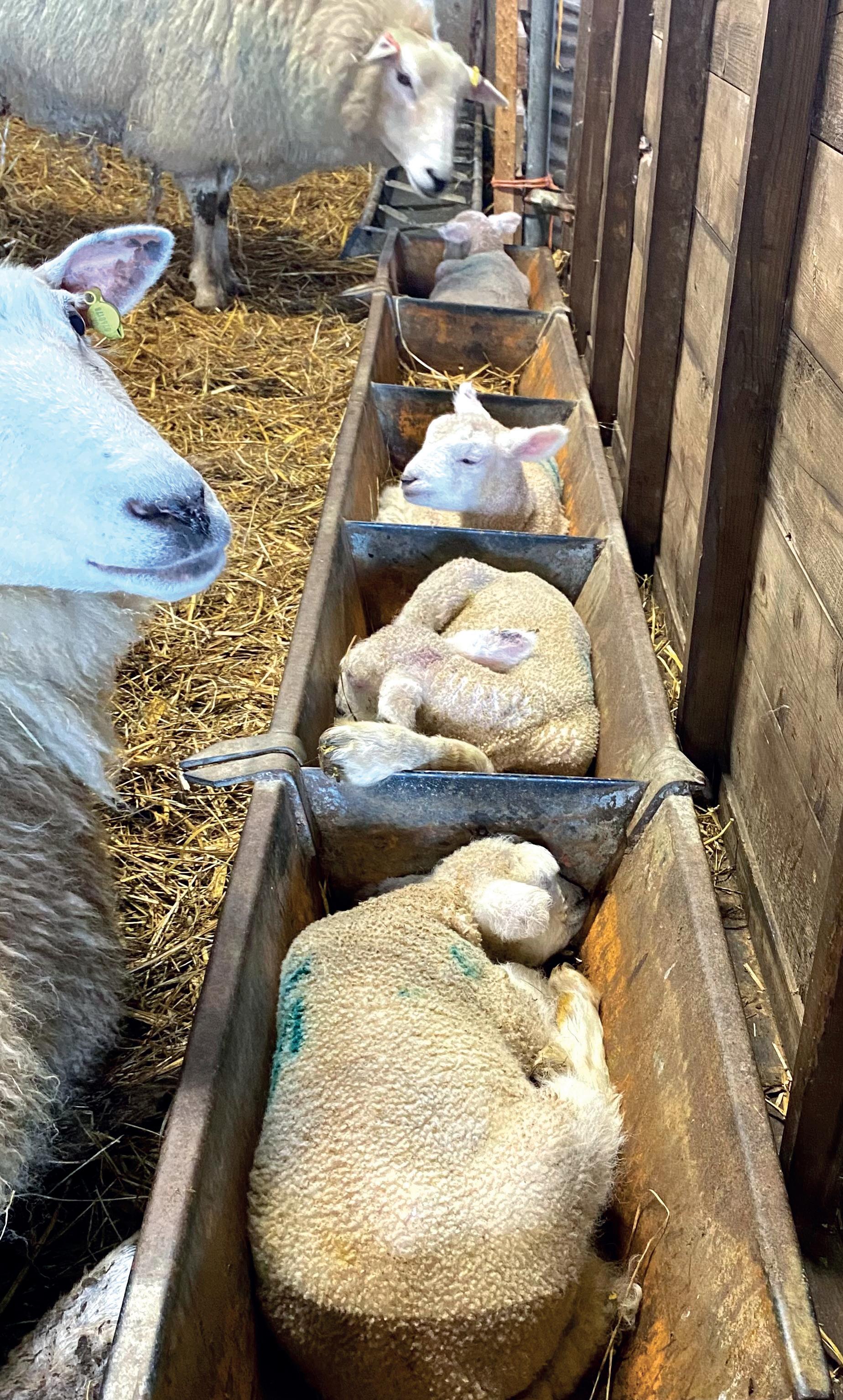
Chandler & Dunn has been taking part in Open Farm Sunday, a national event which encourages people on to farms, since 2013. In their first year they estimated 100 people would come, but almost 600 arrived.
In their second year, they expected between 500 and 700 and just over 1,000 turned up. They now run the event every other year and in 2022 welcomed more than 1,200 people.
The company believes educating the consumer about production methods is important, and Chandler & Dunn allows the public to see top fruit, arable and livestock enterprises on one site.
CAMPSITE
Before heading off, Alice shows me the other new enterprise, a campsite located next to the offices. They have planning permission for 30 tent pitches and five bell tents from 1 May to 1 October after successfully trialing the idea last year under the 28-day rule.
They had a lot of campers from the London area, mainly families who loved being away from the hustle and bustle, said Alice. One of their commercial tenants, who makes charcuterie in a converted building next to the
campsite, ran a few supper clubs in a marquee, which proved popular.
To run the site this year they have partnered with a local family business, Nethergong Camping, which already operates a number of local campsites in the area.
FARMING FOR THE FUTURE
Opening the new campsite and taking on the sausage shop are just the latest in
a long line of farm diversifications that have made Chandler & Dunn the successful family-run mixed farming business it is today. By focusing on quality, diversifying and farming for the long haul they aim to achieve the sustainability that is crucial for farming businesses in today’s tough economic climate. With the next generation taking on the reins, this is a family which really does live and breathe farming.
WWW.SOUTHEASTFARMER.NET | MAY 2023 25 TO ADVERTISE CALL 01303 233883
>>
STEALTH
Medium depth, low disturbance subsoiler

Alleviate compaction, minimise soil burst and in turn grass weed germination with HE-VA’s Stealth.
• Scalloped, straight, front cutting discs
• Two rows of staggered ‘Hardox’ legs
• Discs and legs hydraulically controlled from the tractor seat




• Tungsten hardened cast steel points
• Working depth of up to 300mm (12”)
• Adjustable leg spacing

• Range of seeders and fitting kits available
Stealth (leg and point) kits are available to retro-fit to existing HE-VA Subsoilers, Combi-Discs and come as standard on the Evolution OSR seeder.
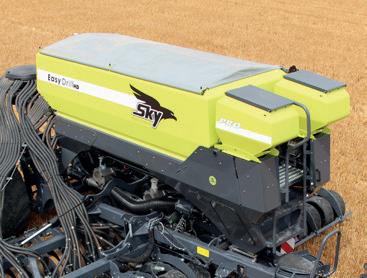


Easy Drill
Designed for perfect seeding in no-till, min-till & conventional establishment systems making it the most versatile drill on the market.
• Up to 4 separately metered hoppers











• Unique tandem seeding line

• Separate air circuit for grain and fertiliser

• Optional blockage sensors for both air circuits

• Up to 250kg coulter pressure to ensure correct seed placement in any system


• Fully adjustable press wheel pressure to suit soil / weather conditions
• Low hp requirement (from 35hp/m)


• ISOBUS ready
www.agwood.co.uk
They say size isn’t everything, but the Condor direct tine seeder, in 12 and 15 metres, ticks both the size and the flexibility boxes. The 8,000 litre seed hopper, which is carried on the tractor link arms to ensure plenty of traction, is split into 3 - enabling up to three different seed varieties or a mixture of seed and fertiliser to be drilled simultaneously - and all from vari-rate maps.
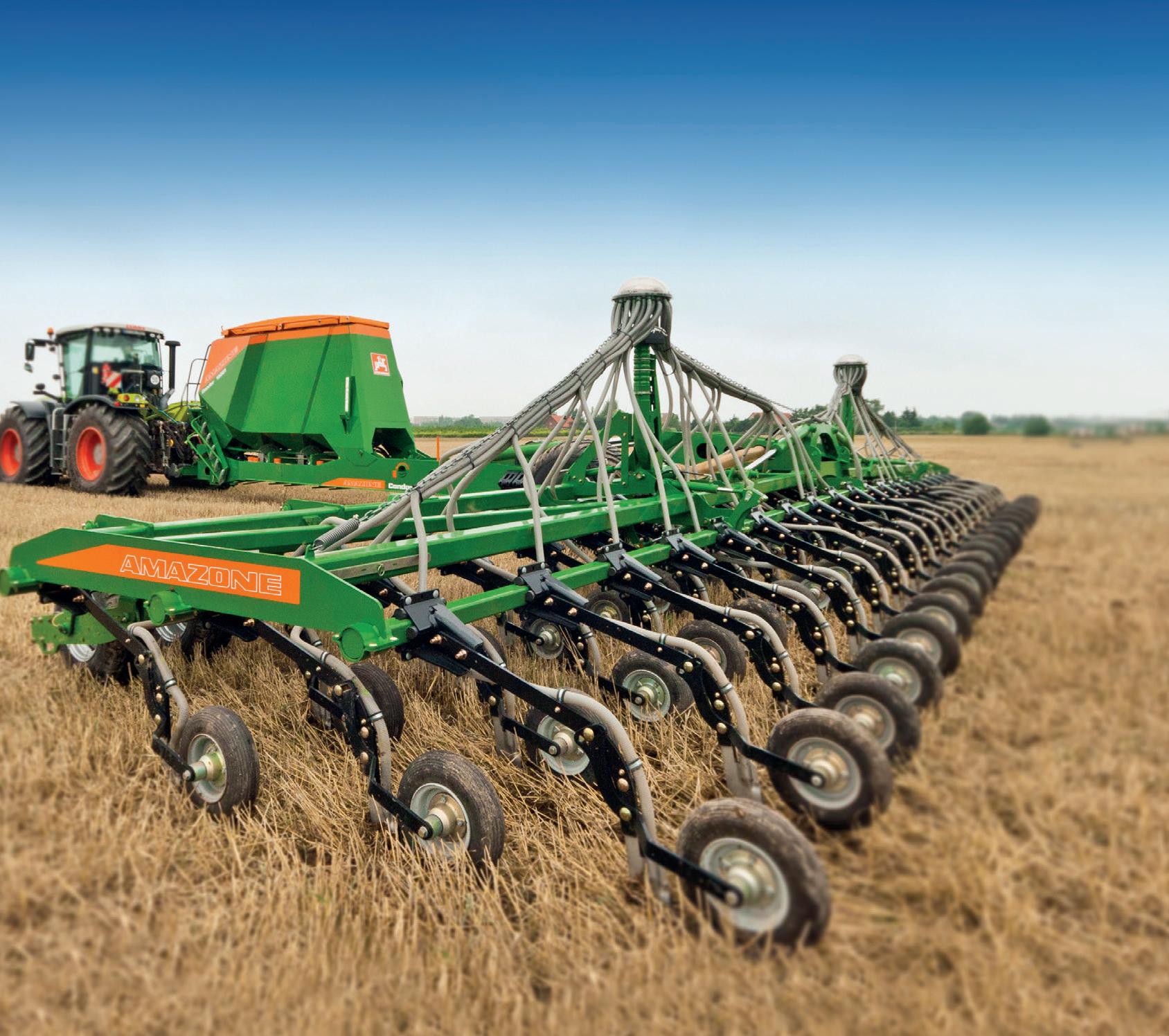
With up to 200 kg of coulter pressure, the ConTeC pro chisel opener ensures a residue-free seed groove with the seed being embedded into the furrow by the following press wheel on each coulter. It couldn’t be simpler, it couldn’t be more effective and above all it helps you love your soil.
Contact
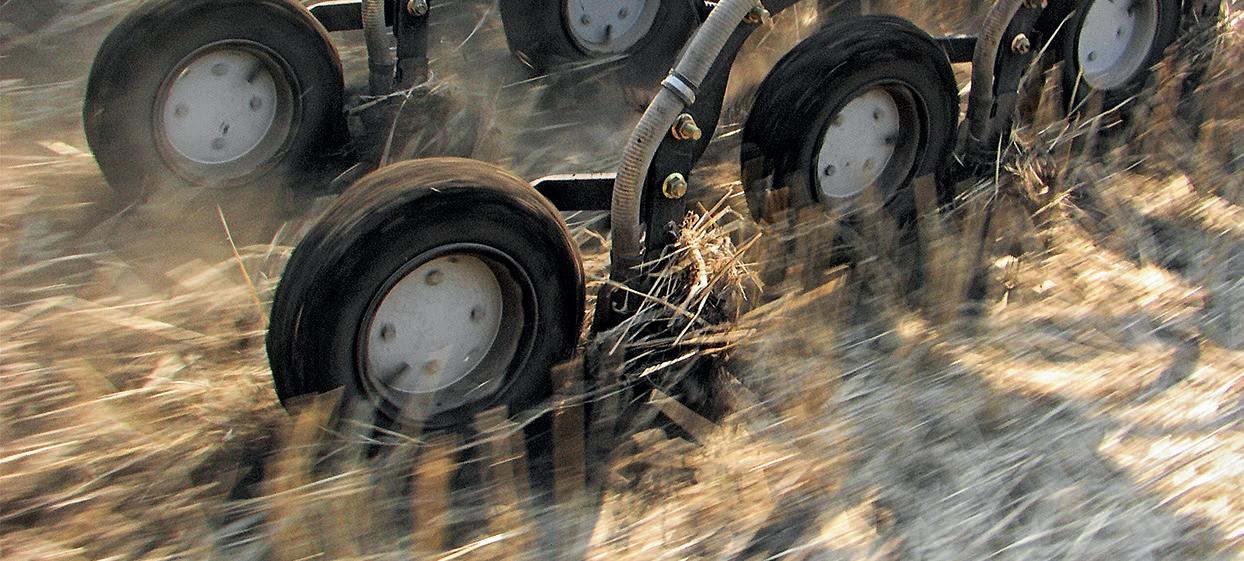
26 MAY 2023 | WWW.SOUTHEASTFARMER.NET Love your Soil Contact your local dealer or phone us on 01302 755 725 www.amazone.co.uk
The
ConTeC pro opener ensures
the perfect seed placement. For the perfect seed placement - let’s get straight to the point
he-va.co.uk sky-agriculture.co.uk
Crawfords for more info: www.rwcrawford.co.uk
Distributed by Distributed by
Stealth Leg & Point
Agricultural Dealers in Kent, Sussex & Surrey
1 2 3 4
hoppers / 2 depths
4
Kent, Sussex, Surrey & Hampshire
‘IMPROVE SOIL HEALTH BY STEALTH’
2 separate air circuits Essex,
www.rwcrawford.co.uk THE FUTURE OF ESTABLISHMENT
REMARKABLE RANGE OF CAPABILITIES
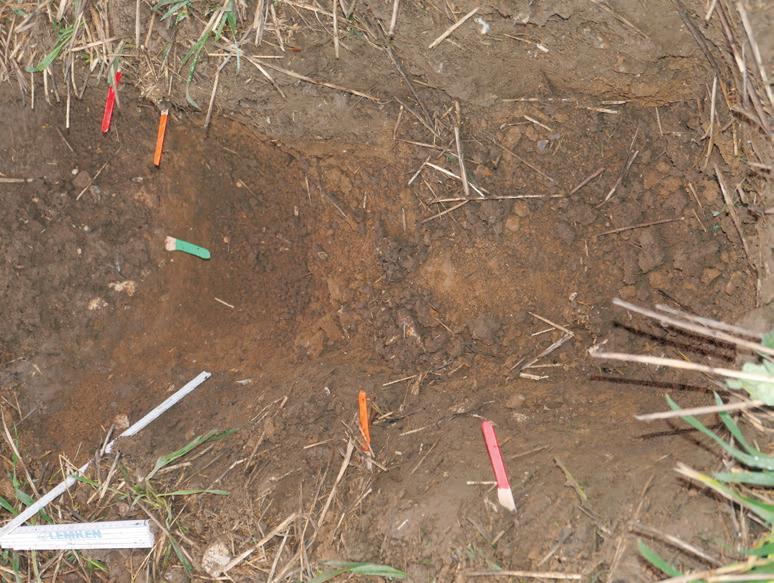
The one thing that wasn’t lacking from Agrii’s fascinating drill day event at the end of March was choice. The 220 farmers who flocked from across the South East and East Anglia to look at the machinery on offer were treated to an impressive array of machinery with a
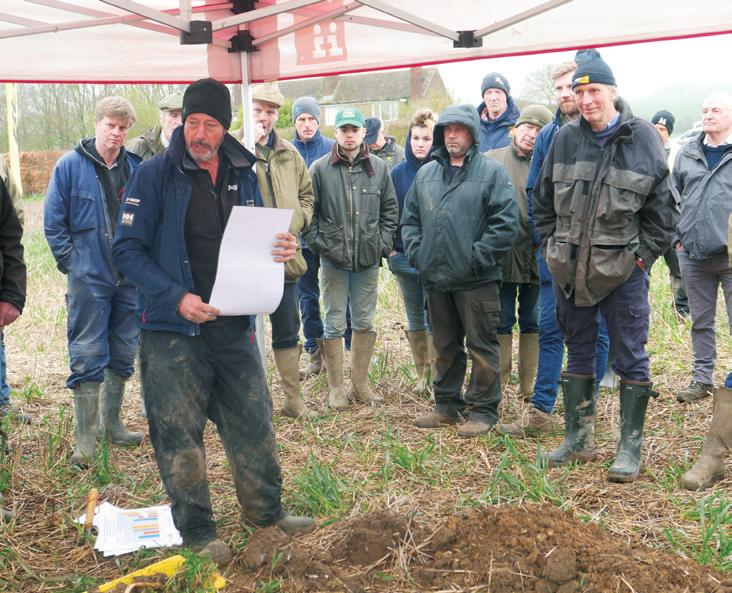

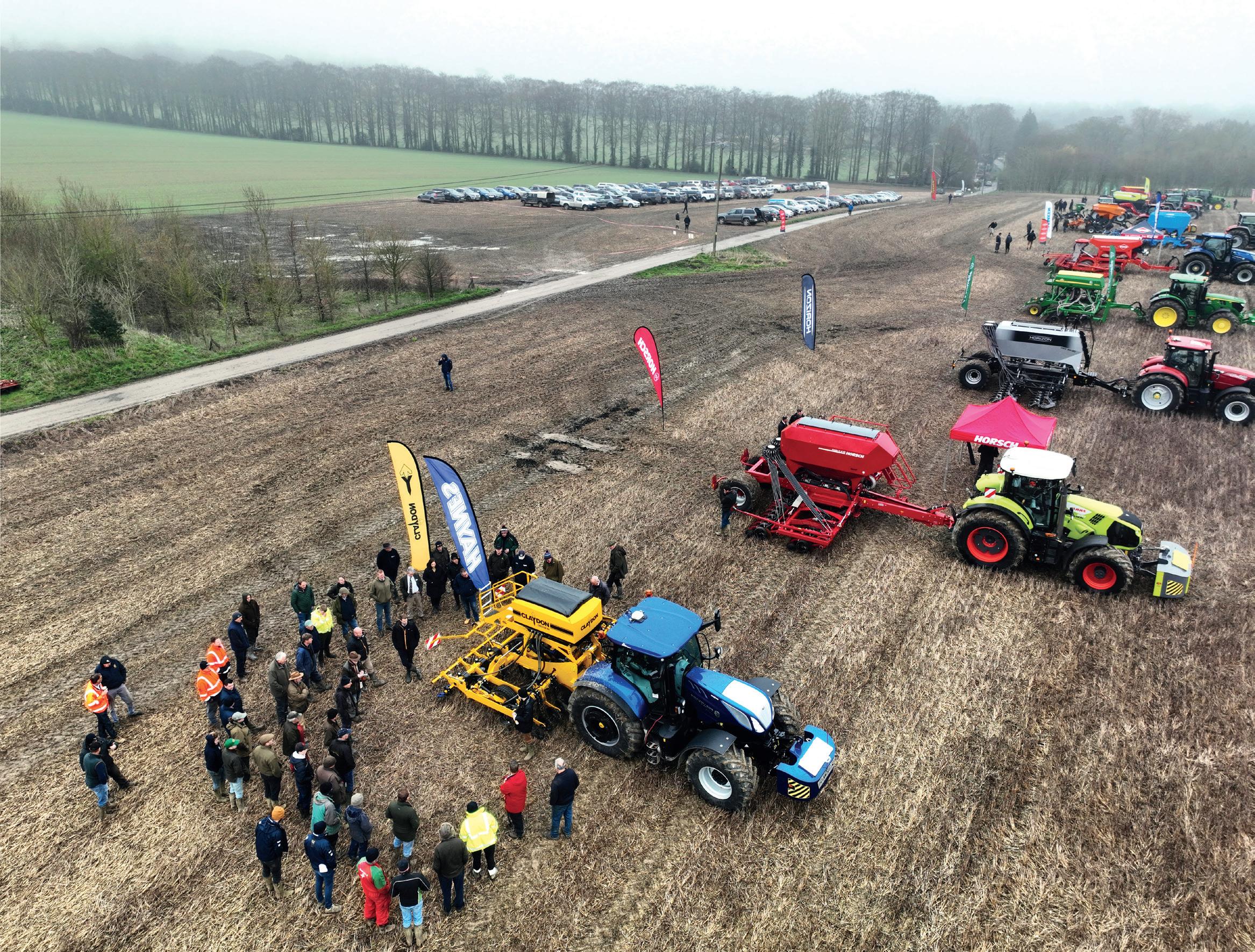
remarkable range of capabilities.


The contrast was perhaps best summed up by two machines that were almost alongside each other in the 17-drill line-up at Courtlodge Farm, Harrietsham, just outside Maidstone in Kent.
Proudly standing atop his Aitchison

Simtech, George Simon outlined the benefits of his simple yet effective drill with a New Zealand-based pedigree, while two machines along from him, Ludovic Knab was promising to “change the way people drill” with the remarkable pre-production Vaderstad ProSeed.

WWW.SOUTHEASTFARMER.NET | MAY 2023 27 TO ADVERTISE CALL 01303 233883 DRILLING DAY
>>
Photo: Andrew Watts/Agrii

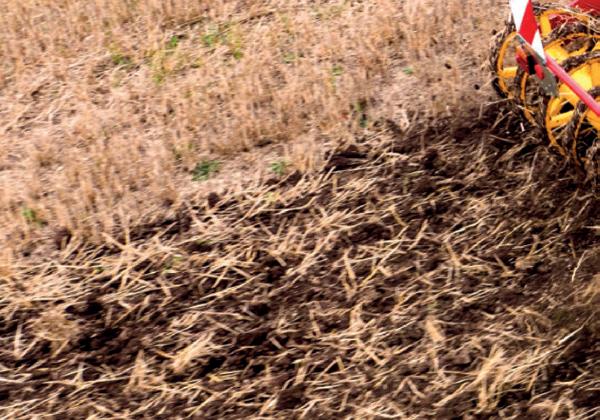
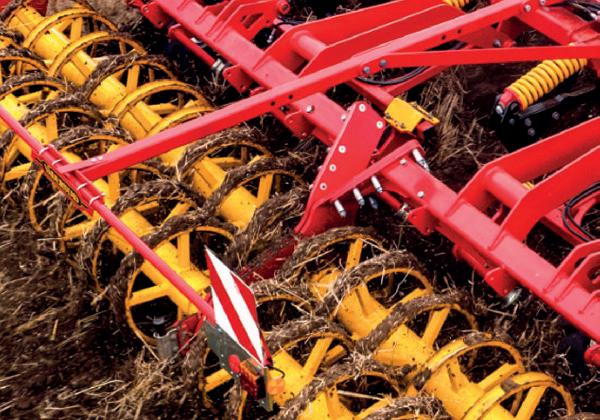
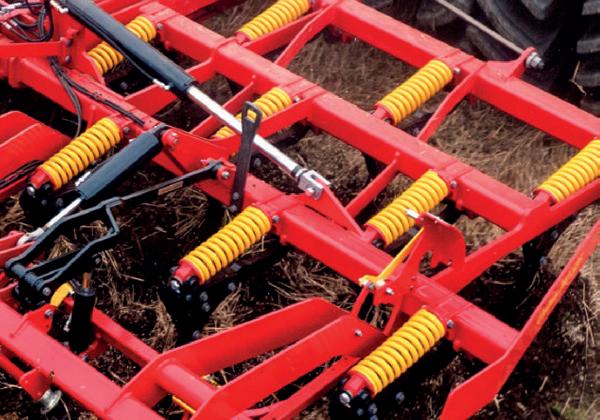
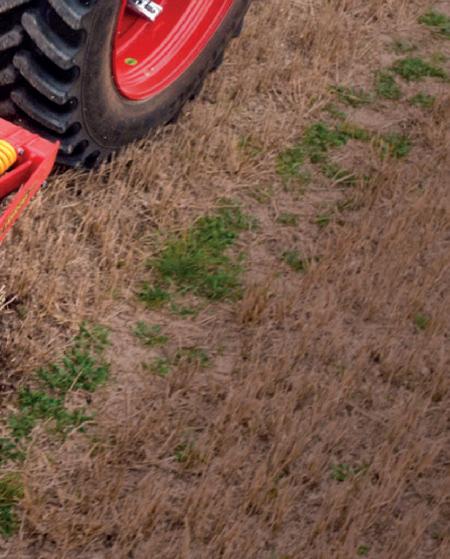
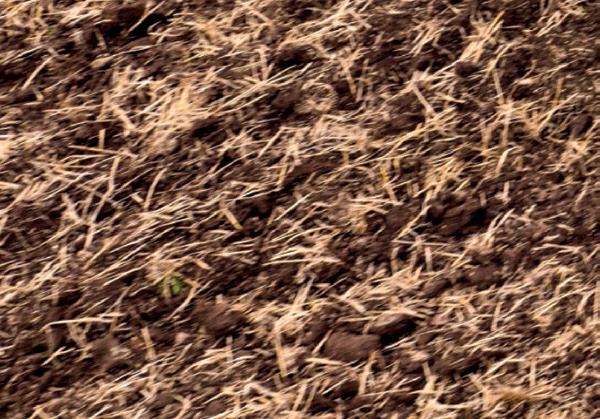
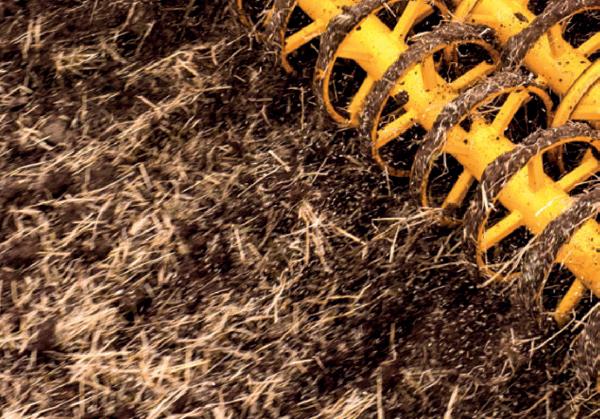

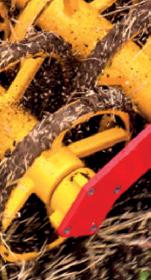




MAY 2023 | WWW.SOUTHEASTFARMER.NET
Maximum
OUR DRIVING FORCE: YOUR SUCCESS! Find out more on lemken.com/en/solitair-dt Keepingthedepth.Always. Wherefarmingstarts Learnmoreatvaderstad.com CultusHDsetsanewstandardinthe mountedtinecultivatorsegment. Itisdesignedtonevercompromise onitsexactdepthprecisionand highfieldperformance. Theheartofthemachineisthenew heavy-dutyCultusHDtines.Witha releaseforceofupto680kg,Cultus HDwillkeepitsdepthinafullrange ofconditions. CultusHD Thenew CultusHD425-525
SEEDING COMBINATION SOLITAIR DT EFFICIENT LIGHTWEIGHT.
efficiency combined with highest precision – the new Solitair DT was designed according to these standards. The result is a seeding combination that is convincing in practice and saves diesel with ease.
<< Between the two, and further highlighting the mind-boggling choice of drills being displayed on a dull and chilly but essentially dry day, was Sky Agriculture’s EasyDrill, a flexible machine suitable for min-till or direct drill applications as well as for drilling into prepared ground.

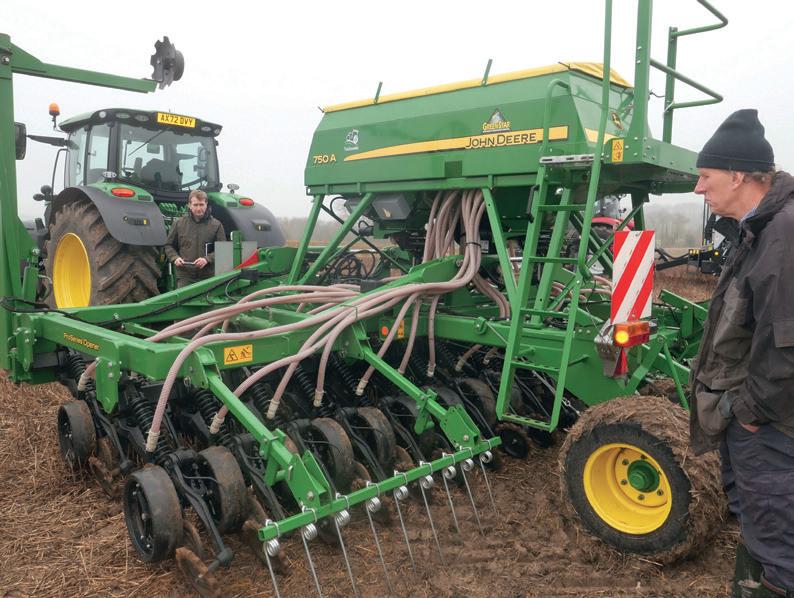
While the event gave farmers, contractors and the merely interested a chance to get up close and personal to a record-book challenging line up of heavy metal, the event wasn’t exactly what Agrii had in mind.
The original aim had been to put the drills through their paces on the land at Courtlodge Farm, but the wettest March for 40 years made the soil pretty much undrillable, and the plans were rapidly changed.
While Agrii is still hoping to get at least some of the drills back later in the season to pursue the challenge and compare and contrast the results achieved by the various machines, the emphasis of the day itself shifted.
Instead of watching the drills in action, those present enjoyed a detailed in-field presentation and Q&A session with the representatives from a line-up of manufacturers that included Horsch, Lemken, Virkar, Kuhn and Claydon, as well as Amazone, Horizon and Mzuri.
Growers were able to question every aspect of the machines, including whether or not they could be configured to qualify for grants under the Farming Equipment and Technology Fund (FETF) 2023. In most cases the answer was ‘yes’.
“It’s not often that you get so many brands of seed drill in the same field at the same time.
To be too-wet-to-go was a great shame,” said Steve Corbett, Agrii trials manager, who helped arrange the day.
Ironically, the soil would have been ideal for drilling had it not been for the rain. Agrii agronomist Neil Harper, who welcomed a large crowd for both morning and afternoon
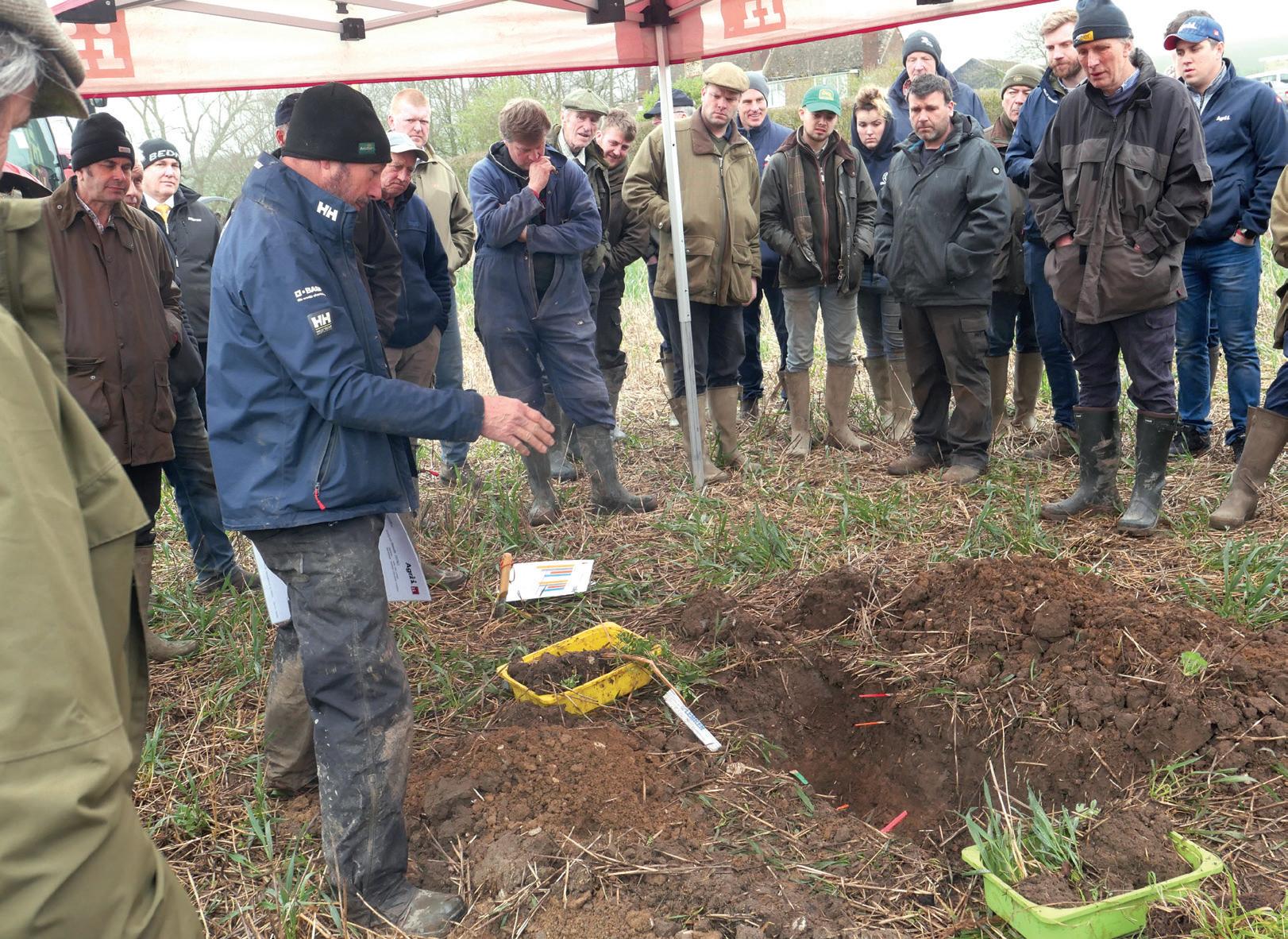

sessions, explained that the site, loaned for the occasion by M C Attwood and Partners, had been planted with a cover crop in August.
“In December it was knee high, but 10 degrees of freezing weather killed it off nicely in the spring,” he commented.
While the weather couldn’t have done a better job getting rid of the cover crop without chemical help, it sadly didn’t play ball for the event itself, although the good news was the manufacturers’ keenness to show off their machinery and support the event. “We had originally planned for six drills but we have 17 to show you,” a delighted Neil commented.
Each session began or ended – depending on which end of the line the visitors started – with a look at the soil structure on the site, courtesy of a trial pit dug and explained by Agrii regional technical adviser David Felce, who stressed the importance of organic matter to glue the structure together and add “good biology”. >>
WWW.SOUTHEASTFARMER.NET | MAY 2023 29 TO ADVERTISE CALL 01303 233883 DRILLING DAY
Dynamic Range





C-Coulter
D-Disc
DC-Disc & Coulter
The High Precision Direct Drill




High quality, low disturbance no tillage system
Easy maintenance and low running cost


One chassis three coulter options for ultimate drill flexibility
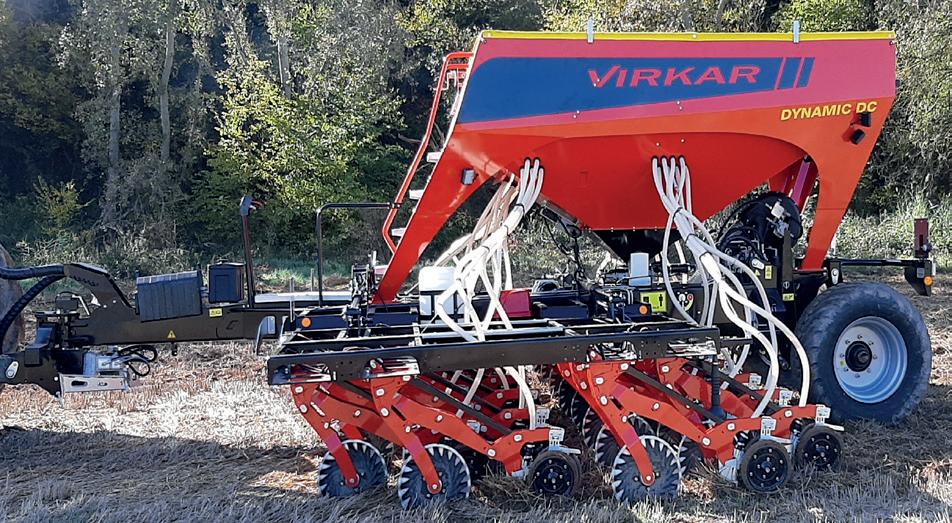

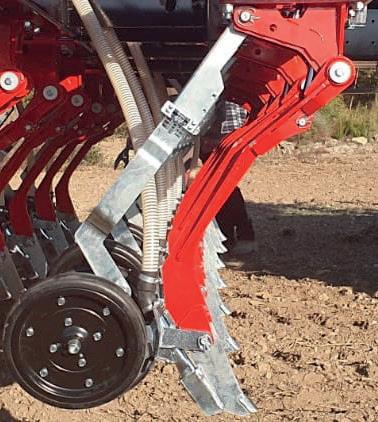

35cm of coulter travel with on the move pressure control
Steering rear axle for unrivaled Maneuverability and hill side tracking
25cm and 19cm row spacing
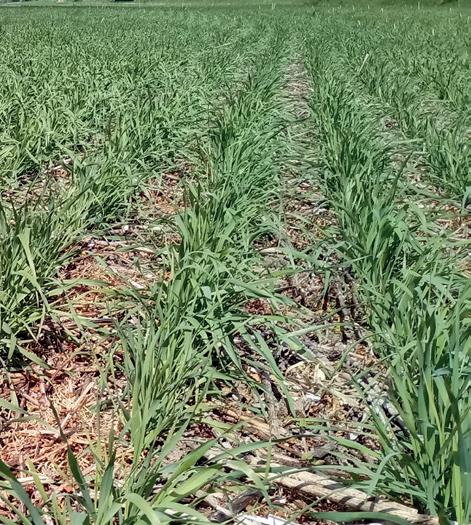
Modular design 4.5m, 5m, 6m & 7m

MECHANICAL
easy to operate • simple to set up & maintain PNEUMATIC • drill widths from 3 to 6m • suitable for no-mill, min-till GRASS • best for Livestock, mixed & small arable farms THE IDEAL DIRECT DRILL FOR GRASSLAND AND ARABLE T: 01775 513 112 E: info@simtechuk.com www.samagri.co.uk Samagri Ltd - Manor Court Store, Scratchface Lane, Herriard, Basingstoke, RG25 2TX - 01256 384208 - samagri@btconnect.com
•
the way we go Seeding C D DC
Redesigning
<<
The Amazone Cayena 6001-C is, in the words of Crawfords demonstrator Ben Marsh, “a good, all-round machine that can be used for direct drilling and in ploughed soil”. He went on: “It’s a simple design and easy to adjust, and it holds 60% of the trailed tine drilled market, which proves it’s a tried and tested design that’s earned its popularity with growers.”
The Cayena has front disc and twin tank options and can be fitted with Isobus with section control. With 36 narrow point tines at 16cm spacings, the drill can be towed by as little as 136hp but is flexible enough to drill everything from beans to cover crops, alongside fertiliser from a second hopper.
Crawfords supplies both the Cayena and the flagship Condor 12001-C direct drill across a large part of the South East from dealerships in Ropley in Hampshire, Billingshurst in West Sussex, Charing in Kent and Writtle College in Essex.
The Condor, “an out and out direct drill”, is available in 12 and 15 metre widths but folds down to an impressive three metres for transporting. It has three hoppers for
additional seeding flexibility, 25cm row spacings and Isobus control of two, six metre sections. Despite its size it still only needs 240hp to tow at a steady 8kph to 10kph.
After checking out the Amazone offering the group moved on to the Claydon area, where Mike Bywater was demonstrating the impressive Evolution M4 drill, one of an exciting new range that has replaced Claydon’s popular Hybrid series.
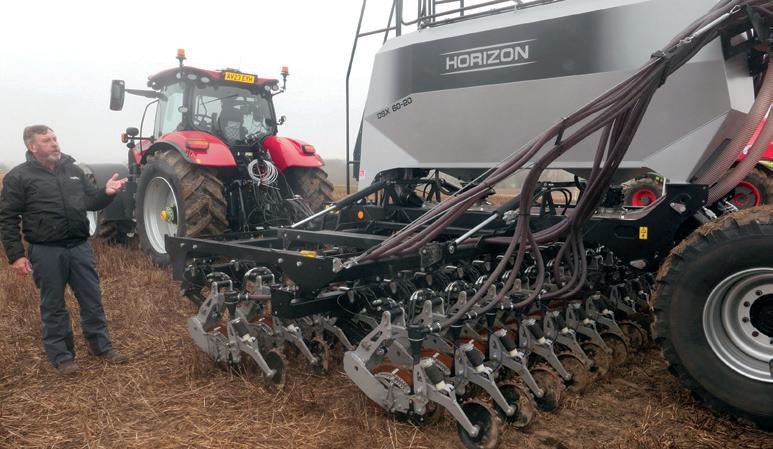
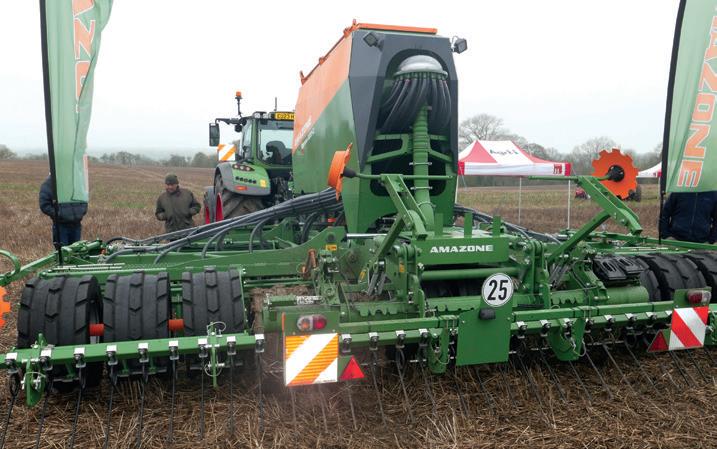

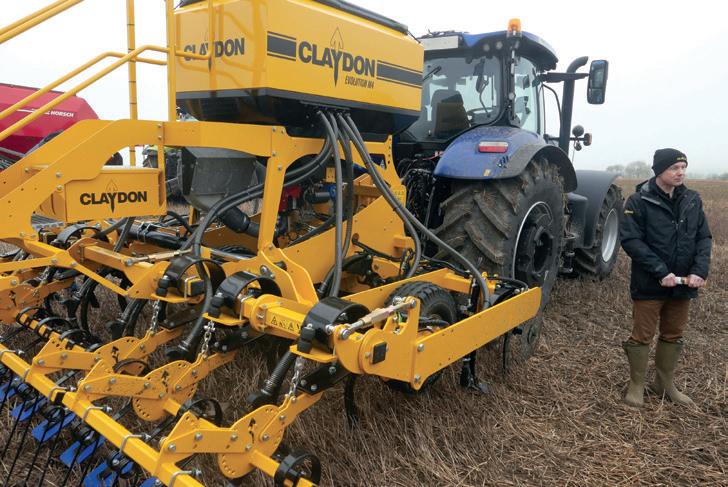
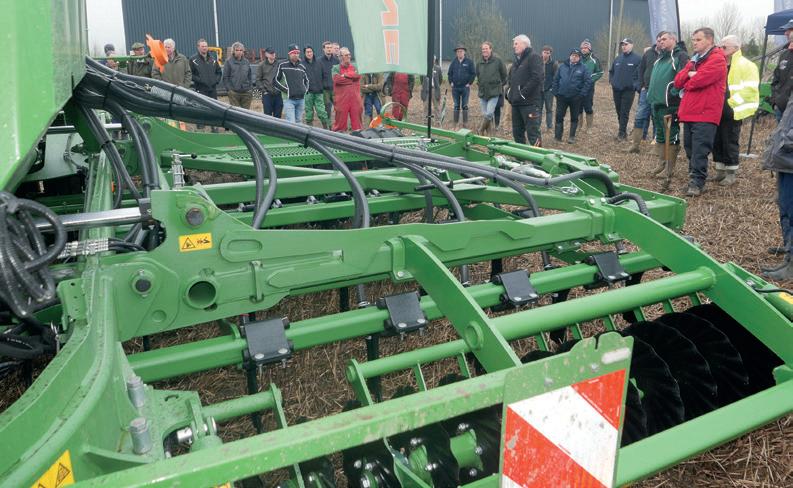
Mike highlighted the “simple, user-friendly characteristics" of the drill, together with its low maintenance costs and good ground clearance. The M4 on display was fitted with a front disc option for cutting through a cover crop ahead of seed placement.
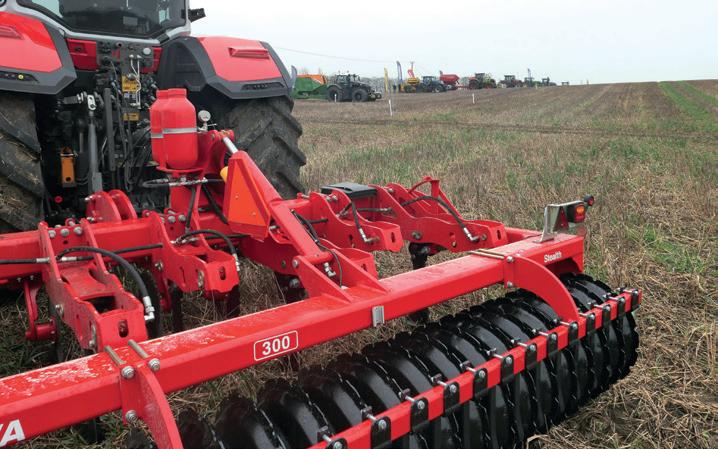
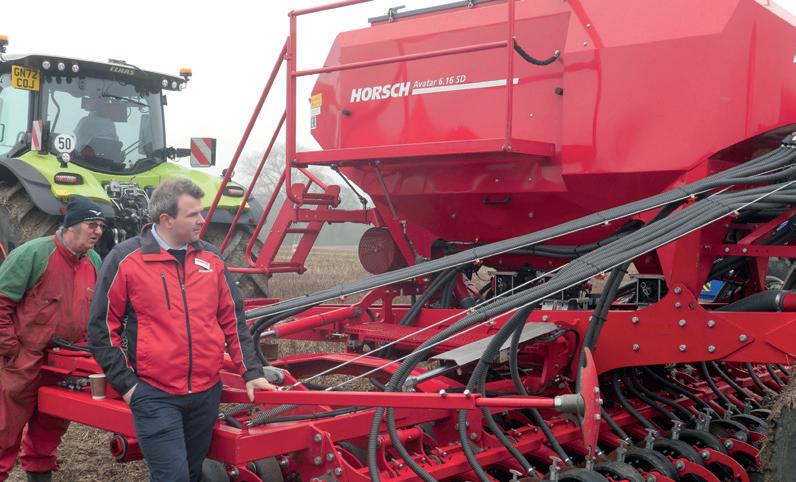
With hydraulic depth control, Z harrows at the rear and the ability to match the 4m drill to a 4m hoe, the Claydon mounted drill is ideally suited to direct strip seeding and builds on the manufacturer’s 20 years of experience with the technology.
Nine new models cover working widths of 3m, 4m, 4.5m, 4.8m, 5m and 6m, with hopper size boosted to 1,910 litres for seedonly units and a 2,500-litre tank that can be
split 50/50 between seed and fertiliser on the 3MF and MRF models.
The tried and tested front tine followed by 180mm A share is fitted as standard and there is a wide range of seeding share and boot options, while twin tine and disc kit options can be specified for low disturbance drilling.
Sam Downes, from Claydon partner and stockist Haynes, added that the modular nature of the M4 drill increased its flexibility and helped reduce establishment costs and the time taken for drilling. He said both Claydon and Haynes had been keen to demonstrate the popular model and added that he believed it could have coped with the conditions.
Another well-respected drill is Horsch’s Avatar range, and it was a 6.16SD model that was turning heads at the opening day.
Avatar claims its SD (single disc) coulter and seed firmer technology guarantees a safe opening of the furrow and removes harvest residues at the same time, giving optimum contact between seed and soil for quick and safe emergence.
WWW.SOUTHEASTFARMER.NET | MAY 2023 31 TO ADVERTISE CALL 01303 233883 DRILLING DAY
>>
<<








Gareth Burgess said the Avatar was a flexible drill that could be used for direct drilling or on light cultivations and pointed out that it could be fitted with three hoppers, allowing it to, for instance, drill spring barley with a starter fertiliser alongside an application of slug pellets.
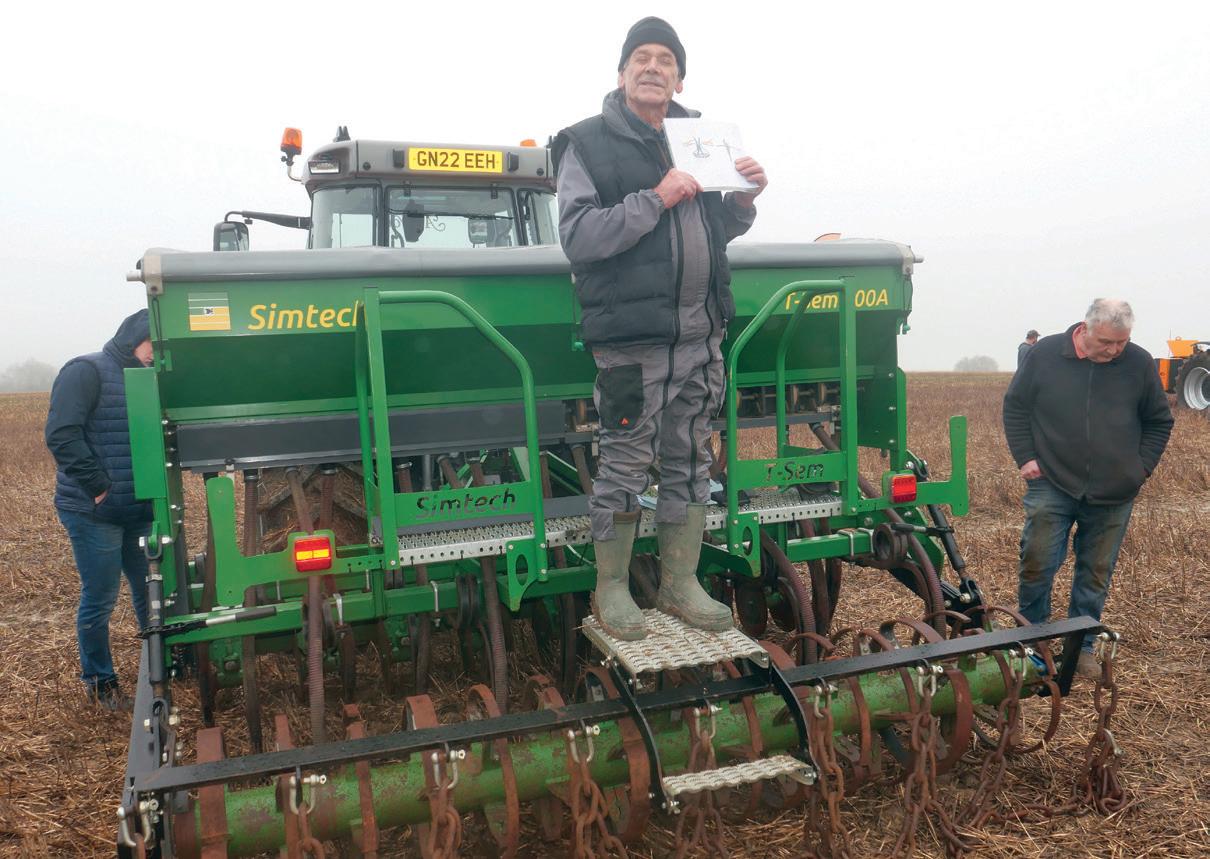
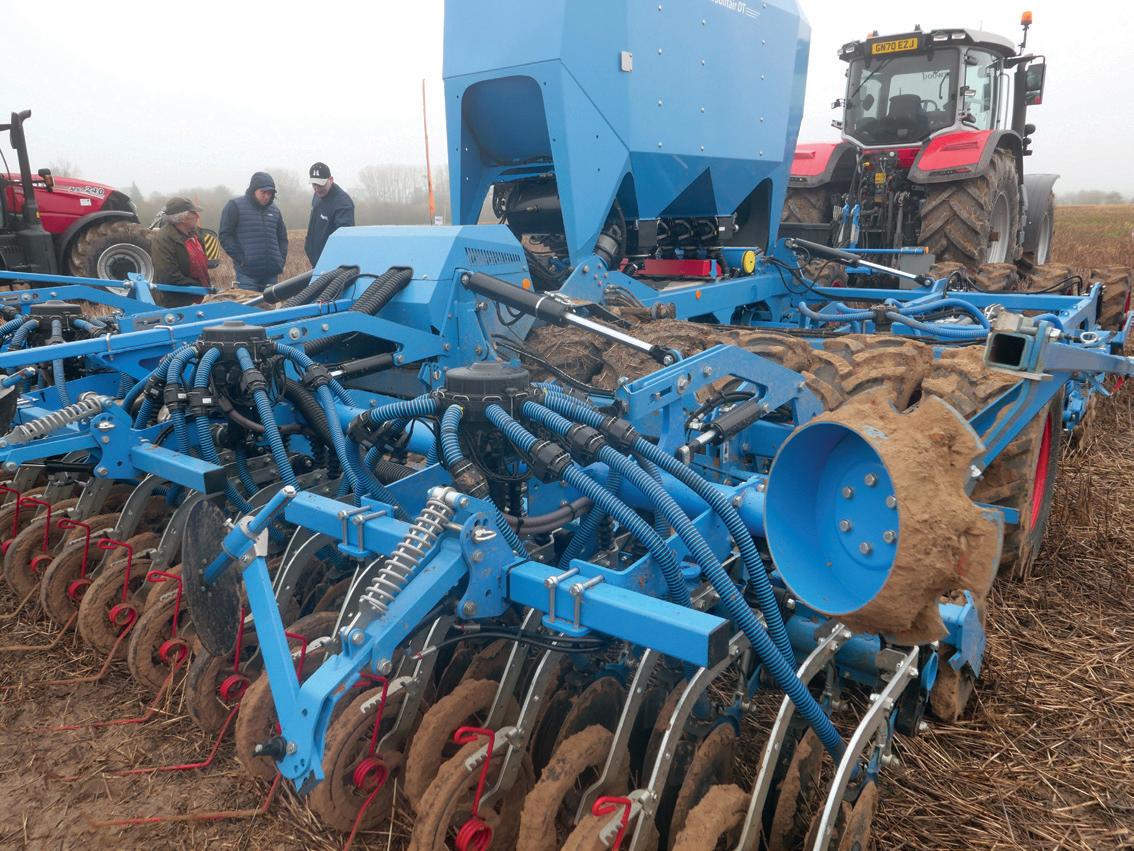
While the model on display was a six-metre option, models run from the 3.16SD to the range-topping 8.16SD, all offering high coulter pressure of up to 350kg per row and individually controllable coulter depth.
Gareth praised the “impressive turnout of machines” at the event and said it had provoked a lot of discussion around the different approaches
GROW To know your farm is to your farm
The best advice not only comes from the best knowledge, but also from the best understanding of your farm and your goals. Instead of relying on crop protection advice alone, partner with one of Agrii’s team of 200+ dedicated agronomists, who take the time and care to provide a bespoke integrated management plan based on your and your farm’s needs, evidenced through local and national trials.
Our unparalleled Agrii intelligence helps your farm be agile, meaning you can quickly adapt, growing a strong and sustainable business. See what you can achieve with agronomy that gets you.










FIND OUT MORE AT WWW.AGRII.CO.UK/AGRIIADVICE
to tilling, particularly on heavier soils in wet conditions.








The Horizon DSX 60-20m, next in the line-up, featured an interesting approach to the problem of ‘seed bounce’ with the final stage of the seed’s journey from the pressurised hopper left to the influence of gravity. Also on display was the John Deere 750A drill, featuring the manufacturer’s ProSeries Opener.
The Espro 6000R from Kuhn is a well-established drill with a heritage that stretches back to the mid-seventies but is well-suited to today’s environment.
The manufacturer highlights the low power requirements of the easy-to-pull, fuel saving Espro thanks to the design of the press wheels
MAY 2023 | WWW.SOUTHEASTFARMER.NET 32 DRILLING DAY
AGRONOMY INTELLIGENCE
preceding the coulter bar. It also offers precision seed placement at speeds of up to 17 kph and an innovative design that keeps soil build up on the packer wheels to a minimum.
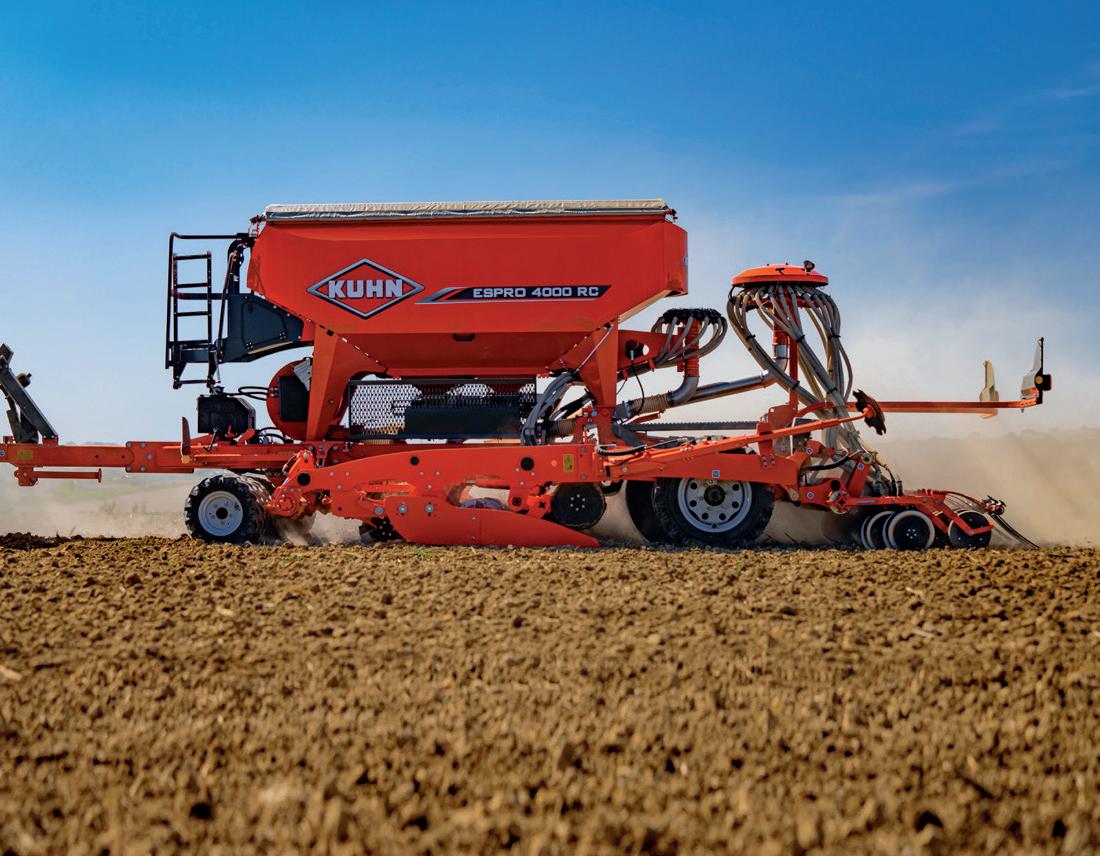
Julian Plank showed the drill day devotees around the 6000R, which he said was ideal for min-till situations and boasted low ground pressure, along with a middle set of wheels that could be lifted for negotiating headlands. It also offers full Isobus connectivity and good versatility. “It’s an ideal drill to take you from plough to min-till and, to a certain degree, direct drilling,” he added.
Julian, who hailed the event as a success, said Kuhn was trying to open up “the ploughing window” for farmers as well as helping the move towards direct drill cultivation.

Flexibility is the underlying principle behind Lemken’s Solitair DT, which currently offers working widths of 4m or 6m but with a 9m version on the cards, together with a tank size of 3,400 or 5,100 litres.
The manufacturer describes the Solitair DT as an “incredibly easy to tow, integrated compact disc harrow” which combines comfortable operation with “the greatest possible efficiency and maximum precision”.



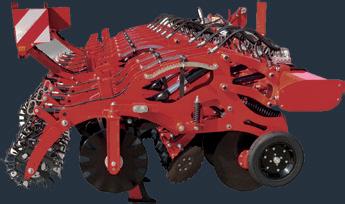
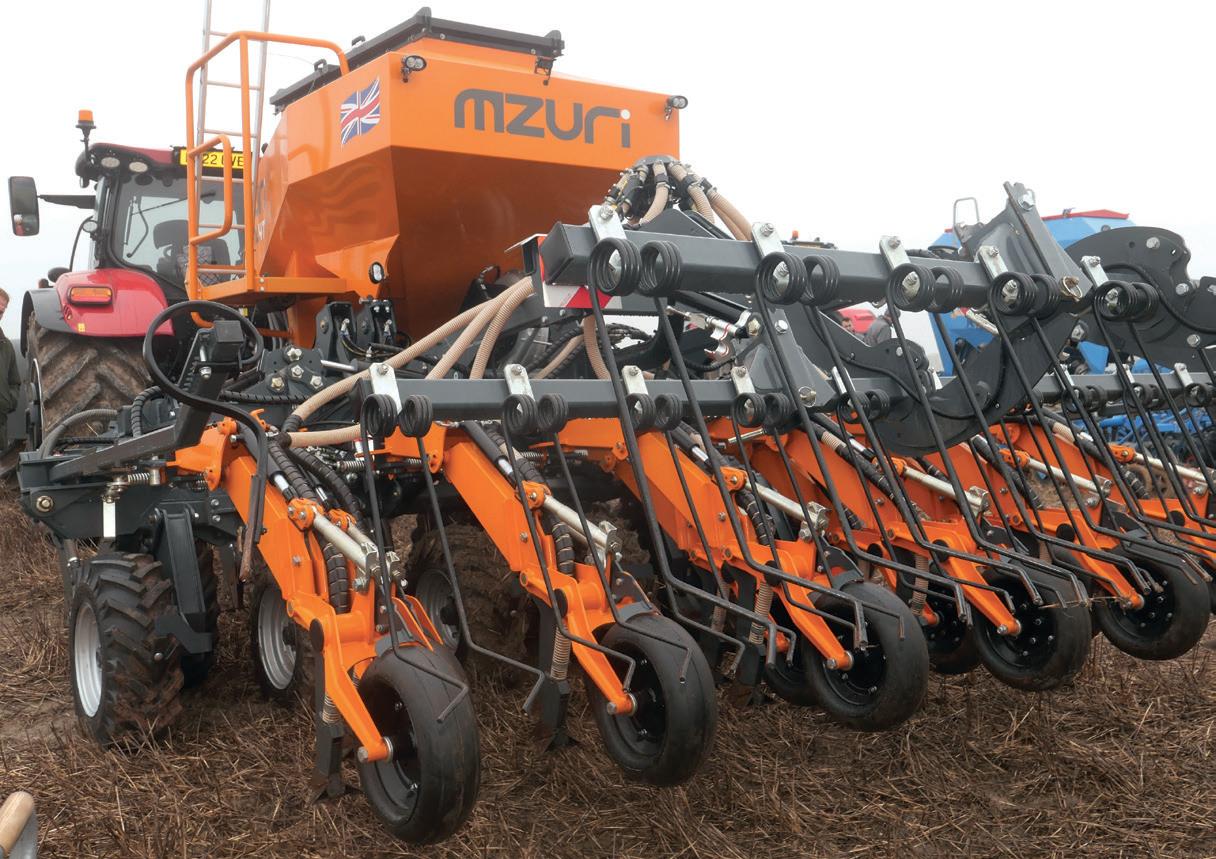
Lemken’s Paul Creasey said the flexibility of tool set up at the front of the drill, all adjustable from the cab, together with the split tank (with a third tank option expected at the end of this year) made the drill ideal for those who were moving into companion cropping.
“Every farm has its own system and its own soil type and Lemken has created a drill that is flexible enough to work with any set up, whether that’s intensive, regenerative or low disturbance,” he commented.


The striking bright orange of the Mzuri Pro-Til 4T, a machine bristling with technology, contrasted with the more traditional green of George Simon’s Aitchison Simtech UK T-Sem 300A, a reassuringly simple drill developed by George from a machine built in New Zealand to stitch grass and clover into an existing sward.
George soon realised that the drill would need adapting for UK conditions as the New Zealand sward, tended by millions of sheep, was “tidier” than in this country. The T-Sem 300A is the result, a drill that relies on a pre-slicing disc followed by a shoe that makes an inverted T into which the soil is placed.
“The seed is always going into bare soil, with no trash with it, which gives a good soil to seed contact,” said George, who delivered a comprehensive introduction to his refreshingly straightforward and easy to maintain machine from a platform on the back of it.
SOLUTIONS FOR ALL SOILS

WWW.SOUTHEASTFARMER.NET | MAY 2023 33 TO ADVERTISE CALL 01303 233883 >>
Proudly Represents Wrotham TN15 8LW 01732 880880 Horsham RH12 3PW 01403 790777 Uckfield TN22 5RB 01825 841100 Great Chart TN26 1JJ 01233 822205 STRIGER OPTIMER PERFORMER PROLANDER
KUHN offers a wide range of equipment that improves land preparation according to farmers’ environmental conditions.
RANGE
STRONG, BE KUHN
CROP
BE
DRILLING DAY

<< The flexibility of Sky’s 6020 EasyDrill HD, which is suitable for all forms of cultivation, extends to its hopper options, with additional attachments front and back giving farmers the possibility of fitting five in total. It also uses a three-point linkage to ensure it follows the contours of the ground efficiently.
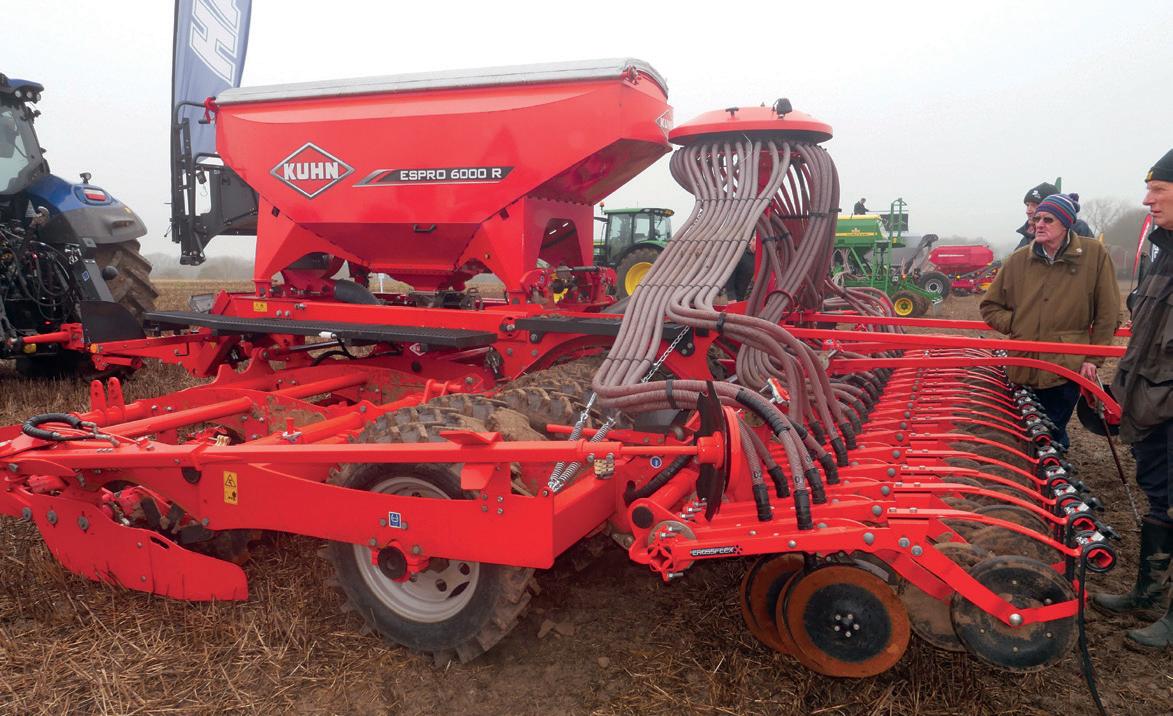
Glenn Bootman explained that the option of fitting up to five hoppers was useful when drilling cover crops. “If you drill a mix from a single hopper, by the time you’ve got half way across the field the vibration has sent all the heavier seeds to the bottom, so your mix is no longer a mix,” he said. “Using straights from individual hoppers prevents that happening.”
Glenn said the Sky EasyDrill, distributed in the South East by Agwood, had the versatility to help farmers transition from a conventional establishment method through to min-till or direct drilling, with simple adjustments making it easy to switch from one method to another.
On establishment costs, he said using a disc rather than tines reduced the power needed to pull the drill through the ground. The EasyDrill also benefited from a front press wheel that laid a cover crop in the direction of travel allowing the coulter to pass through easily. He added that the machine had been known to drill through a standing green cover crop “as high as your head”.
While Agwood and Crawfords are responsible for different drill franchises, they both market the He-Va Stealth, described by manufacturer Opico as “a totally new low disturbance subsoiler specifically for the UK market”.






The Stealth is a medium depth, low disturbance subsoiler with scalloped straight front discs designed to cut through trash, vegetation


and top soil, reducing soil burst and, in turn, grassweed germination. It has two rows of legs to allow residue to flow through the machine to reduce the required tractor lift capacity and horsepower.


The 15mm hardened cast steel low disturbance points are tungsten tipped and 120mm wide, creating the necessary lift and shatter while ensuring longevity, while surface compaction can be alleviated to a maximum working depth of 300mm (12”). The Stealth is aimed at supporting no-till and reduced input systems but can also be used on headlands, tramlines or other high traffic areas.



Vaderstad’s Rapid A 600S is a well-established drill that has continued to improve over time and is another machine that is capable of following the trend towards direct drilling and is designed to allow accurate placement of seeds at speed for even germination.
The seed fan is now housed inside the hopper to keep it out of

34
4 + 44 payments @ 0% Finance Offer available on all stock tractors. Closing date 31st May 2023. Finance for business users only. Terms and conditions apply.* Ready and waiting Your new CLAAS tractor *Finance for business purposes only. Subject to acceptance and affordability checks. Applicant must be 18 or over. Promotion valid until 31st May 2023. or while stocks last. Available on new equipment only. Based on funding 50% of RRP. The nance product available under this promotion is Hire Purchase. First payment, full VAT and a documentation fee of £100.00 are all due on signing. An option-to purchase fee of £85.00 (including VAT) will be collected with the nal payment. You will own the machine when all payments have been made. Alternative nance options are available, terms & conditions apply. Images are for illustrative purposes only. Finance provided by CLAAS Financial Services Limited, Northern Cross, Basing View, Basingstoke, RG21 4HL. Registered in England No: 5854271. MANNS MANNS Saxham Tel: 01284 777700 MANNS Halesworth Tel: 01986 834600 MANNS Essex Tel: 01376 345875 MANNS Kent Tel: 01622 892572 MANNS Market Harborough Tel: 01858 466660 MANNS Spaldwick Tel: 01480 890269 MANNS Norfolk Tel: 01328 878071 manns.claas-dealer.co.uk facebook.com/claas.manns
the dust, while reinforced tyres are now fitted to shrug off flints. Vaderstad’s SeedEye technology enables seed rates to be calculated on a seeds/sq m basis.
It was the second Vaderstad in the line-up that really caught the eye, though. Introduced by Ludovic Knab, the pre-production ProSeed is currently being trialled at a number of sites but is not due to be launched until the end of the year and should be available next year.
The ProSeed coulter brings precision metering to all seeds, with rates adjustable from 50 to 400 seeds/sq m while the new design closes the soil around the seed instead of pressing the seed into it. Ludovic explained that the ProSeed could handle every crop, from sugar beet and cereals to peas and even pumpkins, and would reduce costs by ensuring the same germination rate from fewer seeds.
Virkar’s Dynamic DC drill is a disc and coulter machine with twin

hoppers that are split longitudinally to spread the weight of the machine more evenly and help it track across sloping ground.
Nigel Long explained that the Virkar’s wavy turbo discs cleared trash from the path of the drill before placing the seed in a cultivated seed bed, giving good seed to soil connection. The Dynamic C drill is a coulter only version, with both Dynamic DC and Dynamic C formats available in 6m width with 19cm or 25cm row spacing.
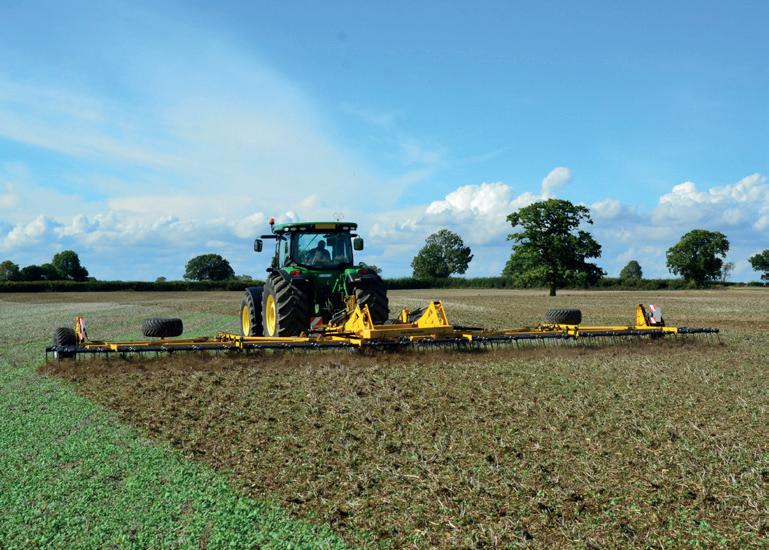
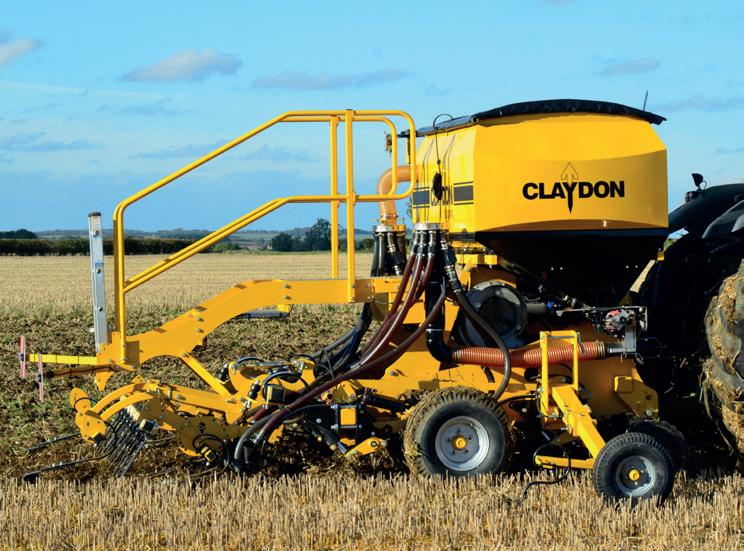
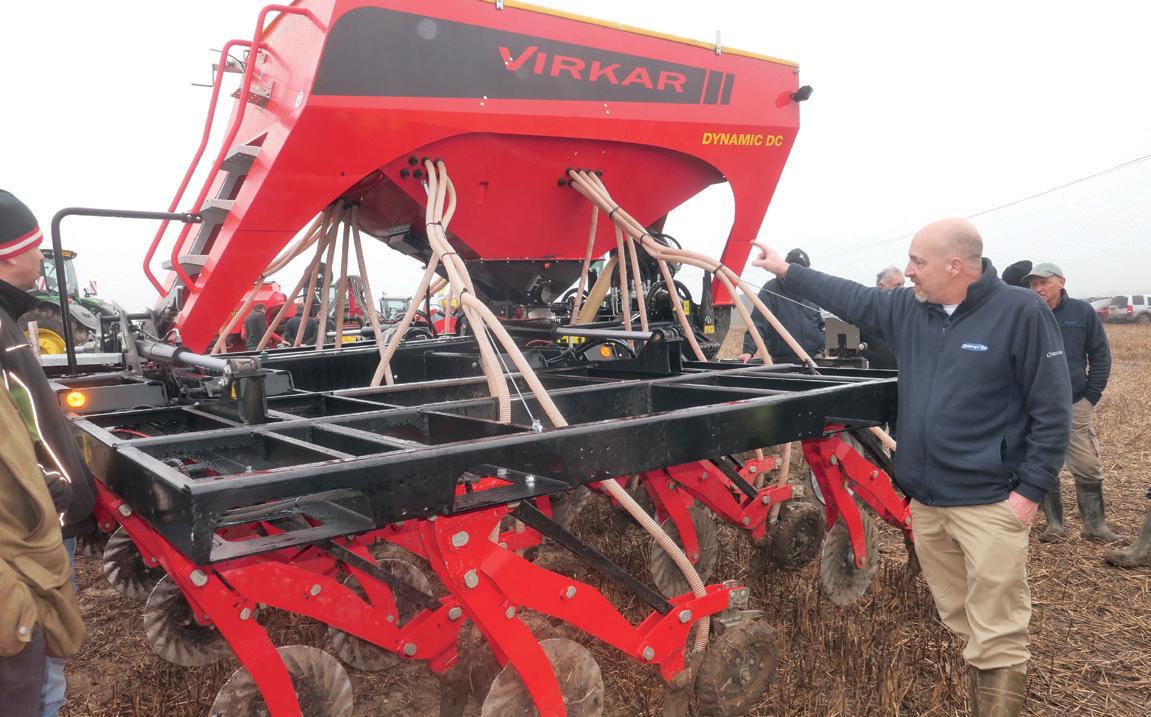
With high body clearance and a low horsepower requirement due to their light weight, the Virkars also benefit from a steering rear axle that makes them highly manoeuvrable and aids coulter spacing on corners.
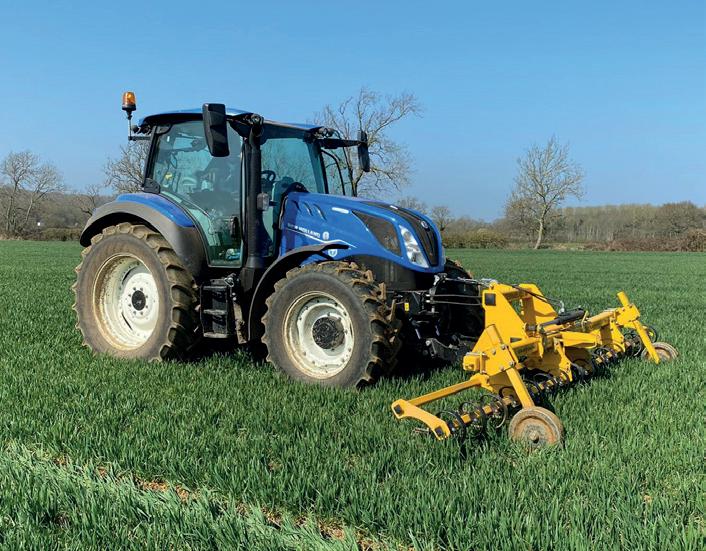

At the end of a fascinating line up of drills presented by knowledgeable and enthusiastic manufacturers was the Weaving GD, a disc drill designed for sowing directly into non-cultivated soils or cover crops and available as a mounted or trailed design.
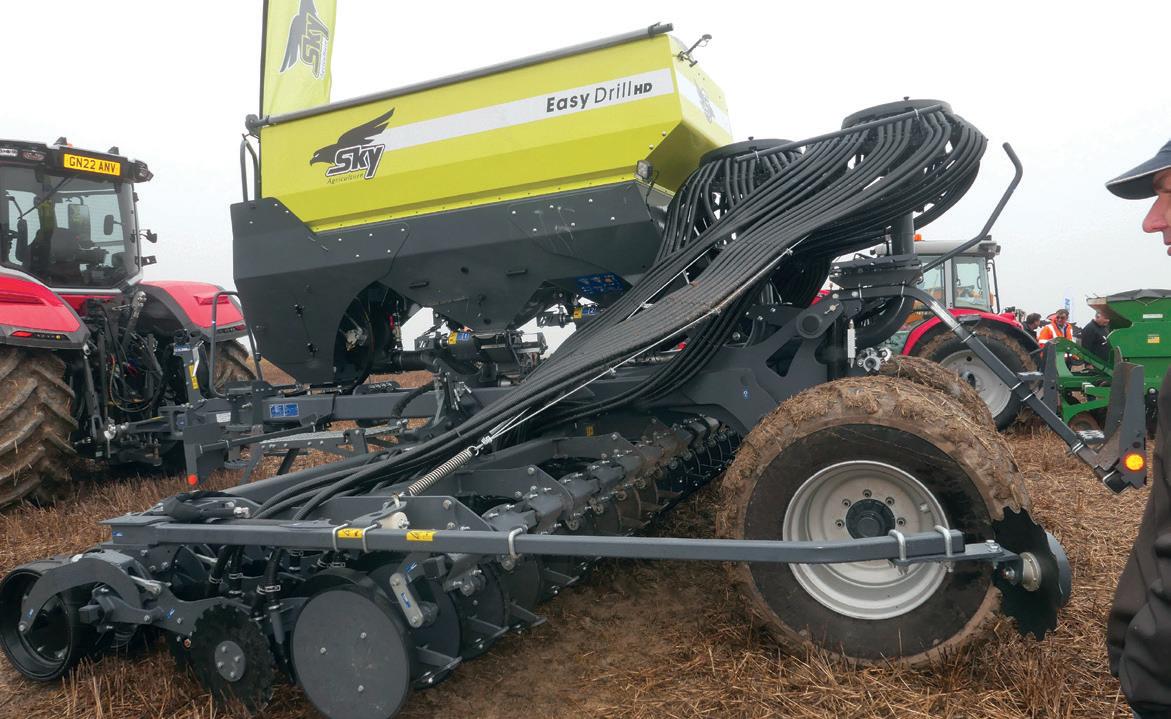
WWW.SOUTHEASTFARMER.NET | MAY 2023 35 TO ADVERTISE CALL 01303 233883
Visit the Haynes website for your nearest branch: haynes-agri.co.uk Try it for yourself – contact us for a demo now. LOVE YOURSOIL Claydon Opti-Till® reduces establishment costs, improves soil health and maintains healthy yields.
GEA milking equipment
Volac calf & lamb feeders
Permastore slurry storage
Slurry separators and handling equipment to include Houle, JOZ, Eisele, Landia, Fan, Bauer
Robot scrapers & feed pushers
Briggs dirty water irrigation

Ventilation fans & foot baths
Farm van sales
Colin Raines 07710 476647




Dairy chemicals | Milk Powder



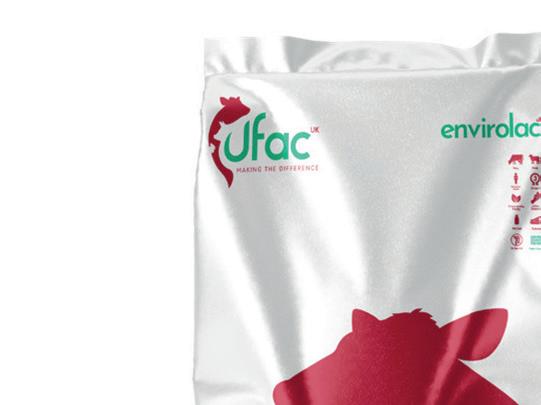



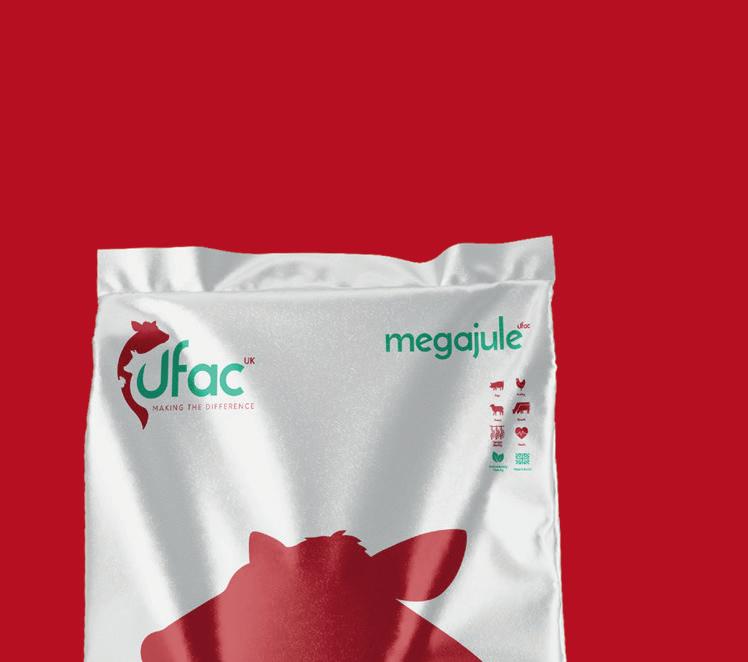

All sundry consumables



Chapmans Farm – TN12 0HH
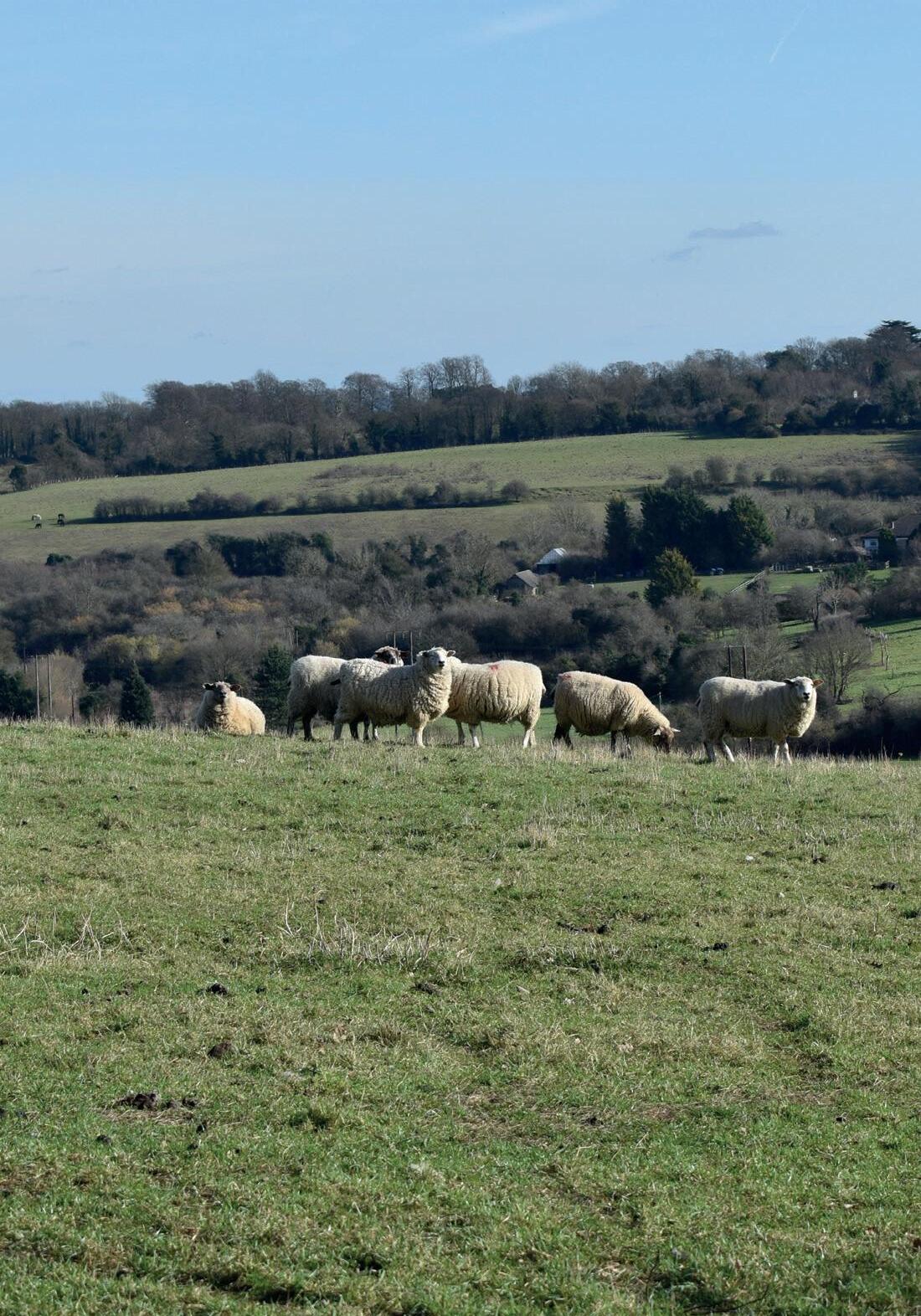
01580 891199







info@neguschaseltd.co.uk


36 NEGUS CHASE LTD
all your Dairy requirements
For
Proud suppliers to Southern Farmers Specialist growth and fertility feed supplements and protein concentrates for beef, dairy and sheep. Validated in an independently controlled scientific trial led by Professor Phil Garnsworthy at the University of Nottingham Increases milk yields, butterfat production and protein Reduce the carbon footprint of UK milk production Available now from Southern Farmers For further information call James on 07538 763832 www.ufacuk.com INDEPENDENT DEALER & COUNTRY STORE Supporting you in work and leisure 01634 388774 | 07473 951065 | 07896 432511 www.sjagriltd.co.uk | office@sjagriltd.co.uk ENGINEERING SALES PART SUPPLY – Tools – Spares – Workshop equipment – Consumables COUNTRY STORE – Livestock supplies – Farmyard & stable – Electric Fencing – Equestrian MEMBER
A RELIABLE ALLY
When prices are rising and the supply of many products is variable at best, farmers and landowners need a reliable ally as they try to buy what they need to keep their businesses running smoothly.
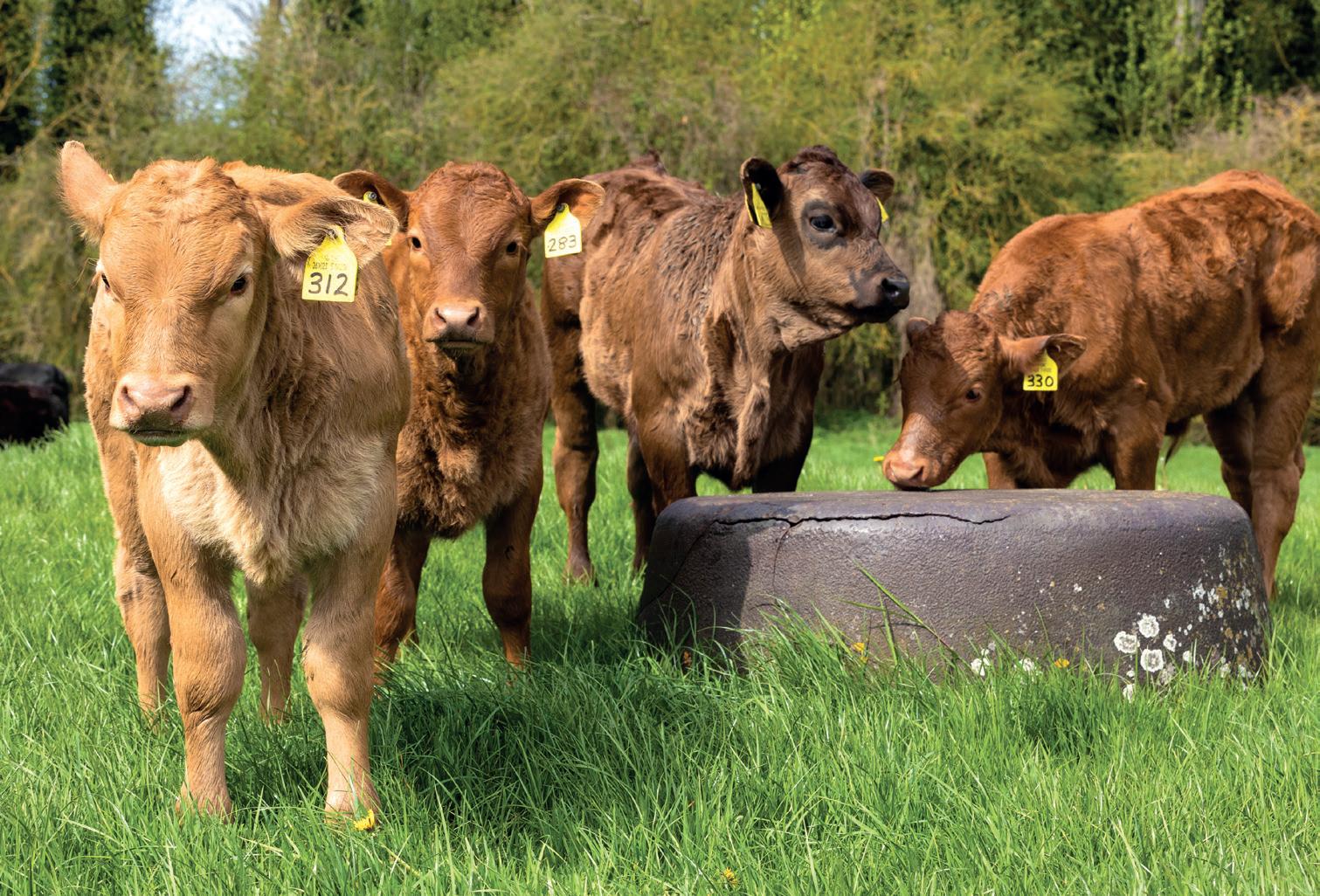
In these turbulent times, more than 1,200 agricultural businesses are using Southern Farmers, the Rolvenden, Kent-based not-forprofit buying group, to benefit from grouprate prices and easier paperwork.
The Southern Farmers team works on behalf of members to source the best price for a broad range of goods and services, from feed and fertilisers to broadband contracts and building materials.
This year has seen the team working hard to bed in new accounting systems aimed at streamlining the office procedures.
Introducing new secure software to uprate the service delivered to members has been a challenge after some 30 years of sending things out by post, but the team is well on the way to completing the switchover and reaping the rewards of a more efficient, more costeffective system.
Southern Farmers has also been focusing on streamlining the reconciliation process by moving everything online and emailing accounts to as many members as possible, although they can still opt for hard copies.
Keeping costs low benefits members as well as Southern Farmers, which charges an annual administrative fee of £125 and small percentage invoice charge. As the group is a ‘not for profit’, savings are ploughed back into providing a better service to members.
That better service includes an impressive website, with a dedicated members’ area that allows members to send in their electricity and water meter readings, place orders and advertise pre-owned goods for sale. Suppliers can also upload special offers to the site.
One of the newest suppliers signed up by Southern Farmers is Trinity AgTech, a leading consultancy with a mission to “help boost the profitability and sustainability of agriculture”.

Trinity AgTech was invited on board after director of business development Anna Woodley addressed the buying group’s annual meeting in March on carbon sequestration and
regenerative agriculture.
“The AGM was packed because so many of our members wanted to find out more about this whole new topic of carbon sequestration and trading and the way farming is changing to a more regenerative approach,” commented Southern Farmers’ managing director and company secretary Brigitte Fifield.
“As a result we invited Trinity AgTech to join as a supplier so that our members have the opportunity to benefit from the advice they can offer at a favourable rate.”


To bring what is a complex subject to life for the group’s farmers, Trinity AgTech will be taking one of Southern Farmers’ members through the transition to regenerative farming and including a monthly update in the newsletter sent to members.
“Agriculture is evolving, farmers need to keep up with the changes and our job is to give them the access they need to the people who can help them do that,” Brigitte added.
Purchasing team leader Rosie Wickham didn’t hesitate when asked what members had mostly been asking for in recent weeks. “Dry weather,” she quipped.
On a more serious note, she explained that the group had been helping members get hold of animal medicines, especially vaccines, with supplies generally affected by the pharmaceutical companies having switched to Covid-19 vaccine manufacture during the
pandemic and only now moving back to animal products.
Electricity prices have been on a rollercoaster ride since the Russian invasion of Ukraine, but by refusing to buy into a longterm contract a year ago and settling instead for a variable rate tariff, Southern Farmers is now able to negotiate a longer-term arrangement on keener rates since market prices have dropped significantly.
Propane is another area where farmers have had difficulties securing supplies and where Southern Farmers has used its influence and its good relationships with suppliers to try to keep gas flowing to members.
“We don’t have a magic wand, but our 1,200strong membership does give us significant buying power and that can help when supplies are scarce,” said Rosie. “That buying power also helps us secure the best prices for our members, which is very important at a time when prices are going up across the board.”
New members of the group are once again receiving an introductory visit from a director – something that had to stop during the pandemic – with member liaison contact Abi Simms able to provide a follow up visit to members who want to know about the opportunities on offer. Abi is also hoping to restart visits to all members, something that is beneficial even to those who have been with the group for many years.
WWW.SOUTHEASTFARMER.NET | MAY 2023 37 TO ADVERTISE CALL 01303 233883 BUYING GROUP FEATURED COMPANY: Southern Farmers Ltd.















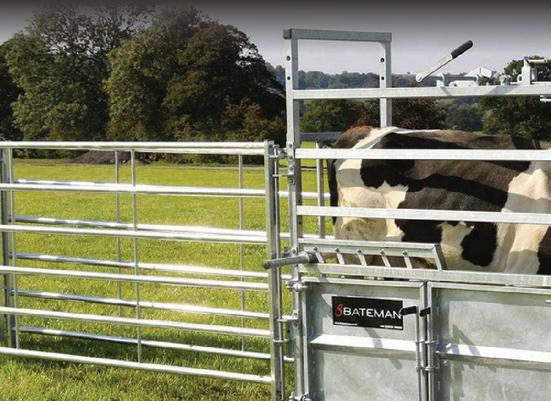
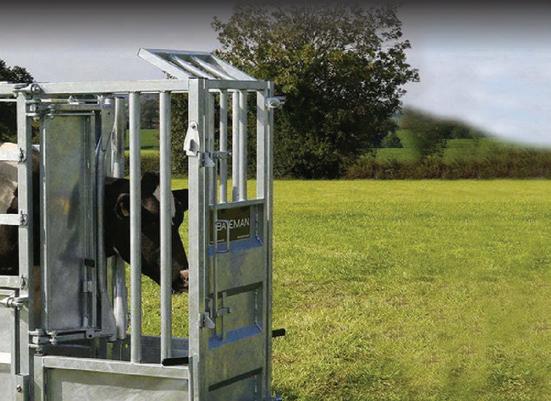






































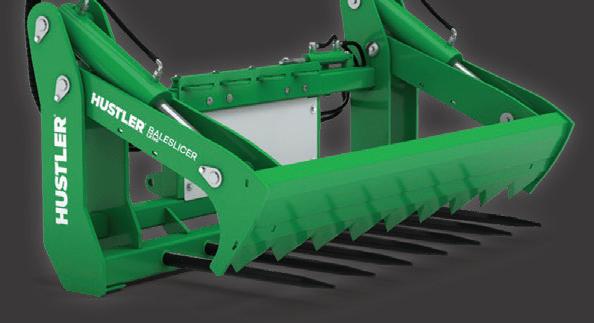




































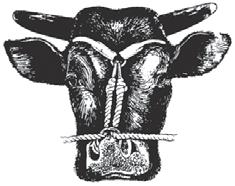
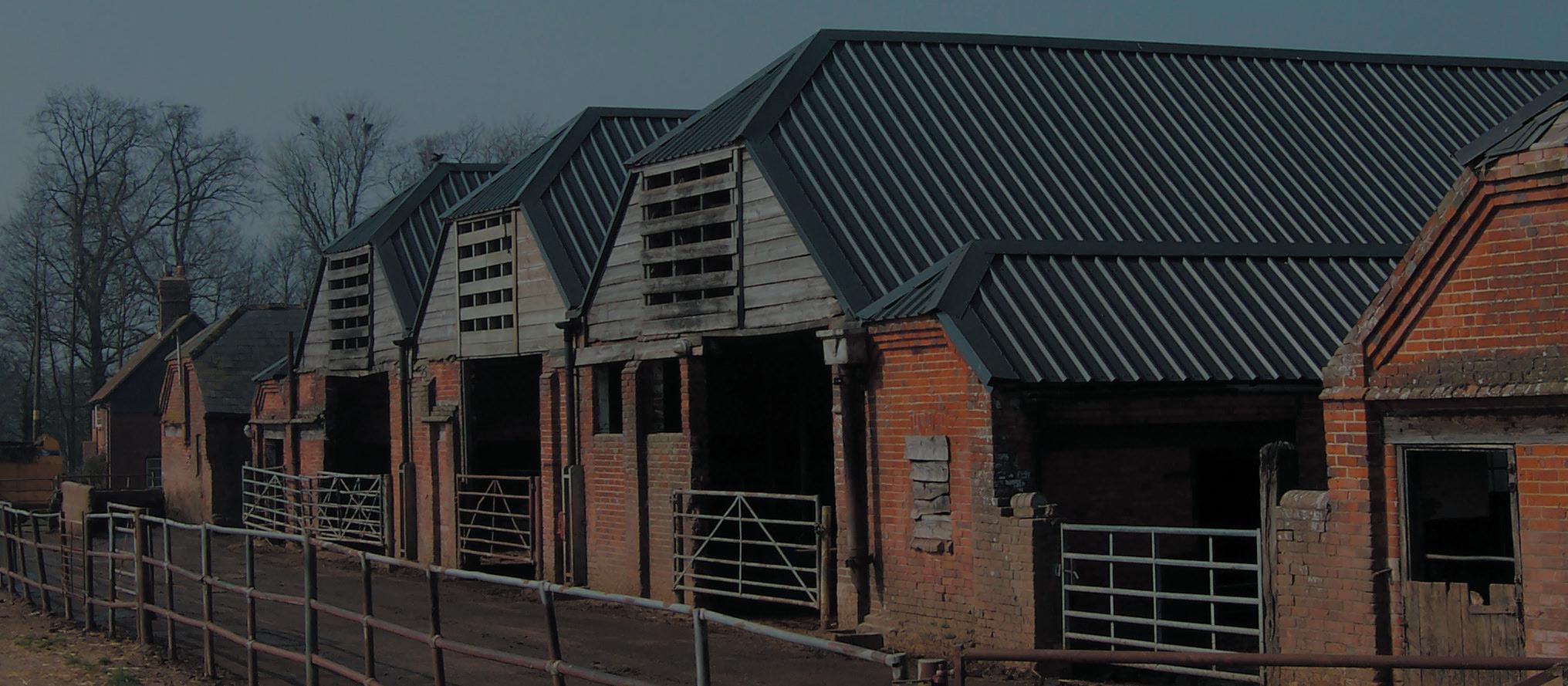


MAY 2023 | WWW.SOUTHEASTFARMER.NET 38 PLANTING&GROWING PLANTING&GROWING TUNNEL&SHELTER TUNNEL&SHELTER TUNNEL&SHELTER TUNNEL&SHELTER PRUNING&FRUITTOOLS HARVESTING TUNNEL&SHELTER PRUNING&FRUITTOOLS HARVESTING HARVESTING PLANTING&GROWING TUNNEL&SHELTER TUNNEL&SHELTER SUPPORTING ALL FARMERS & GROWERS www.agricareuk.com sales@agricareuk.com 01304 842280 Cooting Road, Aylesham Industrial Estate, Canterbury, Kent CT3 3EP PLANTING&GROWING PRUNING&FRUITTOOLS HARVESTING PLANTING&GROWING TUNNEL&SHELTER PRUNING&FRUITTOOLS HARVESTING HARVESTING PRUNING&FRUITTOOLS HARVESTING PRUNING&FRUITTOOLS HARVESTING PLANTING&GROWING TUNNEL&SHELTER TUNNEL&SHELTER HARVESTING TEL: 01435 863964 EMAIL: sales@agrifactors.co.uk AGRIFACTORS THE GRASS SEED SPECIALISTS IN YOUR LOCAL AREA WE ARE PROUD TO WORK WITH SOUTHERN FARMERS AND THEIR CLIENTS. WE WISH THEM CONTINUED SUCCESS FOR THE FUTURE!
& SWARDSMAN SEED MIXTURES Local provenance meadow seed available, harvested from flower rich meadows on the Weald. NATIONWIDE DELIVERY • EXTENSIVE RANGES IN STOCK southernsheeting.co.uk Supplying profiled roofing products to contractors, builders and farmers for over 40 years visit www.southernsheeting.co.uk for our full range or call 01342 590 357 to speak to our friendly sales team Our main products off the shelf include: • Metal sheeting • Insulated panels • Fibre cement • Rooflights • Onduline • Fixings and accessories • Flashings and fabrications LARGE DISCOUNTS available to Southern Farmer members CS3152 SS SE Farmers 190mm x 133mm advert 2023.indd 1 20/04/2023 16:35
SWARDMASTER
Three new directors have joined Southern Farmers as the buying group looks to the future by strengthening the team responsible for its growth and ongoing success.
The retirement of Charlie Munn, who joined the board of Sussex Farmers in 1993 and then became part of the new set up after the merger of Sussex Farmers with Rother Valley Farmers in 2000 to become Southern Farmers, was the catalyst to bring in not one, but three new faces.
“While welcoming our new directors we must pay tribute to Charlie, who played a major part in the success of Southern Farmers and its predecessor buying group over the best part of 30 years,” said managing director and company secretary Brigitte Fifield. "He contributed a great deal to the success of the organisation, including serving as chairman from 2010 to 2013, and his input will be missed."
Lee Maitland made the most of the support available from Southern Farmers –and her helpful neighbours – when she and husband Simon moved out of London and bought the 125-acre Strawberry Hill Farm at Robertsbridge in East Sussex, where they now keep 100 breeding ewes.
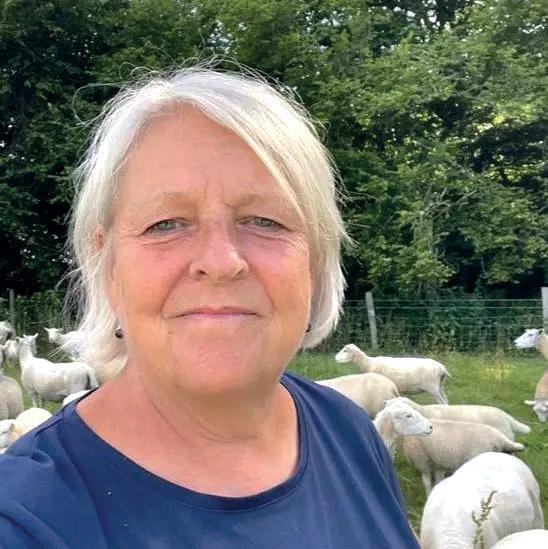
Director Steve Jemmett-Page went to meet Lee when she signed up as a member, and with her background as a solicitor she expressed an interest in supporting the group in the future. When that chance presented itself recently, Lee was quick to take up the opportunity and join the board.
Speaking to South East Farmer with just two ewes left to lamb at the end of an “amazing” spring, Lee said she was keen to support the team in the office and help them increase membership and continue to secure the best
STRENGTHENING THE TEAM
deals possible for members.
“Southern Farmers is clearly a wellrespected organisation, and it has a bright future. Farmers are under a lot of pressure from rising costs and the move away from Basic Payments, so anything that can help them in that transition must be welcome,” she said.
Alan Clifton-Holt wants to help Southern Farmers continue to deliver the service that the family farm at Romney Marsh has enjoyed for the past 20-odd years.

AA Clifton Ltd farms 3,500 acres of arable land that has been in the family since 1948, and having used the buying group for a wide range of goods and services over two decades he decided that the business should get on board and help ensure it enjoyed an equally successful future. “We’ve put a lot of money through the group over the years so we thought we should make sure they kept doing the great job they’ve done for us to date,” he said.
"I’m not looking to change the world overnight because it’s working well, but as farming changes Southern Farmers will need to be alert to those changes and able to adapt to them, and I want to help the organisation spot new opportunities,” said Alan, whose idea it was to invite Trinity
AgTech to speak at the recent annual meeting.
Third generation farmer Matt Cooke is also keen on exploring the benefits of new technology such as using satellite imagery to support variable rate fertiliser spreading and drilling, and again wants to support Southern Farmers as it moves forward in partnership with its members.
Grandfather Alan was the first member of the family to farm at Broomhill Farm, Camber, then an entirely sheep enterprise, and was followed by his son Frank, who began a slow but steady conversion to arable.
Matt returned to farm alongside his father in 2011, at the age of 28, after working as a grain buyer for Wessex Grain in the south west of the country, something which has given him an extra insight into the commercial side of farming.
“The weather and world markets play a huge part in determining the outcome for farmers,” he said. “On the other side of the coin, the buying power of Southern Farmers can help by reducing the cost of the inputs. Equally important, the team can save members the enormous amount of time it would take them to research the best price for whatever it is they need.”
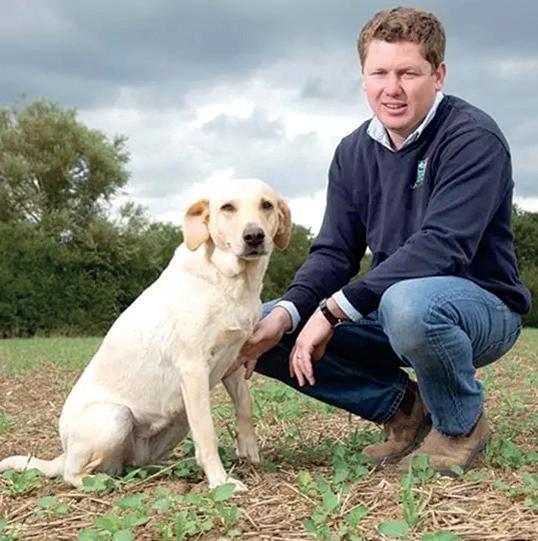
WWW.SOUTHEASTFARMER.NET | MAY 2023 39 TO ADVERTISE CALL 01303 233883 BUYING GROUP FEATURED COMPANY: Southern Farmers Ltd.
Alan Clifton-Holt Lee Maitland
Matt Cooke
TRUSTED PARTNER
When self-confessed “Jack of all Trades” Robert Spencer realised that his growing business needed external support, he enlisted Southern Farmers as a trusted partner.
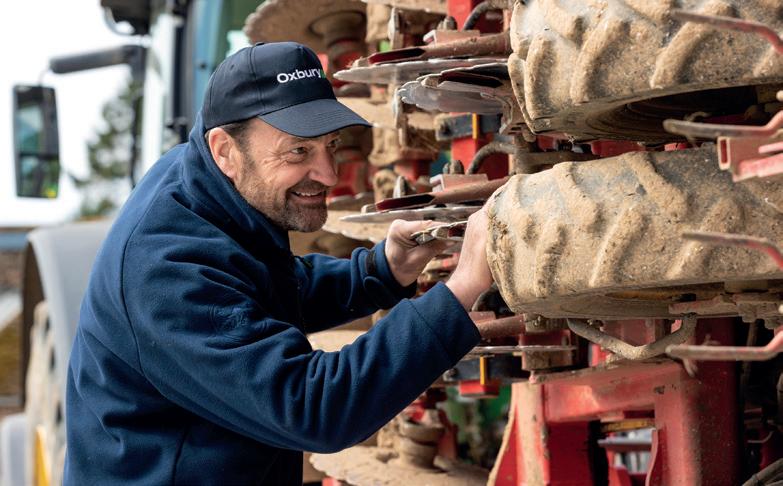
As Robert developed the family business at Lower Garrington Farm, Littlebourne, near Canterbury, he quickly found he didn’t have enough hours in the day to keep all the plates spinning.
“I was a real Jack of all Trades,” he recalled. “I am BASIS qualified, so I looked after my own agronomy, I bought all my own chemicals and fertilisers, marketed my own grain, bought my own fuel and was my own health and safety and cross-compliance officer.”
Robert asked a neighbour for suggestions for a group that could be trusted to buy goods and services on his behalf, and they recommended Southern Farmers. “He had been with a larger, national group but had moved to the team at
Rolvenden because he preferred the personal touch. I have to say that’s something that I really appreciate, too.”
After leaving Wye College with a degree in agriculture and spending three years as an assistant manager with Velcourt, Robert joined his parents, David and Anne, in a family farming partnership that trades as RDE Spencer in 1992.
The partnership looks after 830 hectares of owned, rented and contract farmed land along with 70 hectares of grass and 20 hectares of land in stewardship.
While the business is mainly arable, it also has a 40-strong suckler herd and followers and provides winter ‘bed and breakfast’ accommodation for 50 yearlings owned by a neighbour.
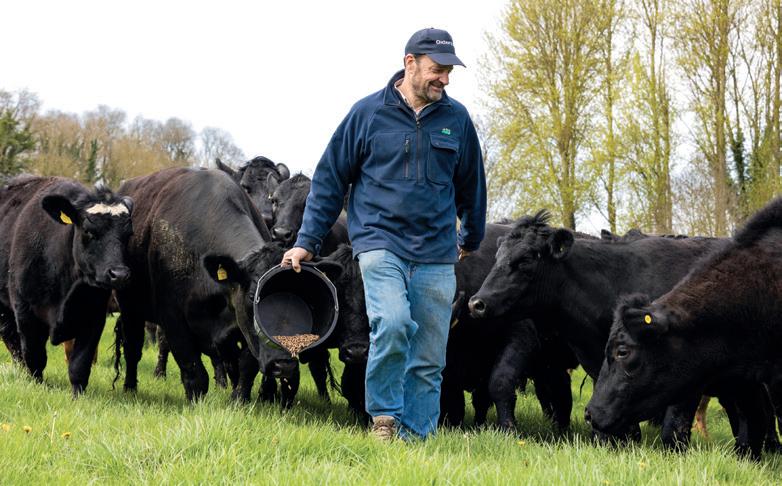
Robert is also the managing partner in a three-farm machinery sharing syndicate set up with his neighbours 15 years ago which adds a further 500 hectares to the workload.
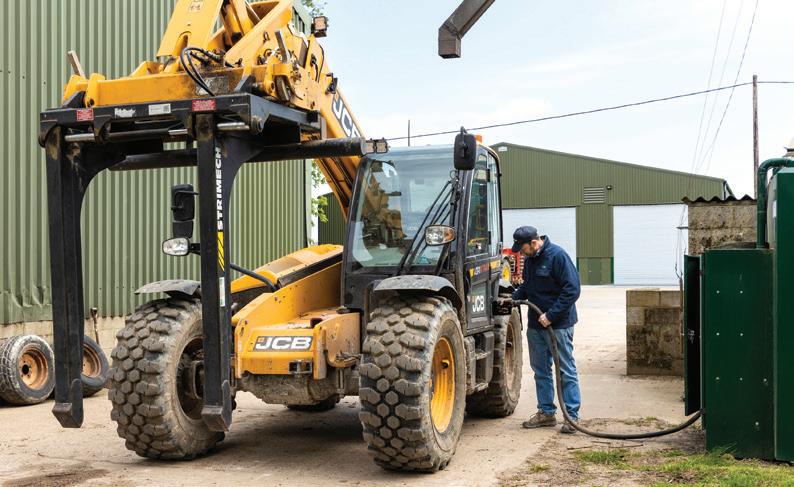
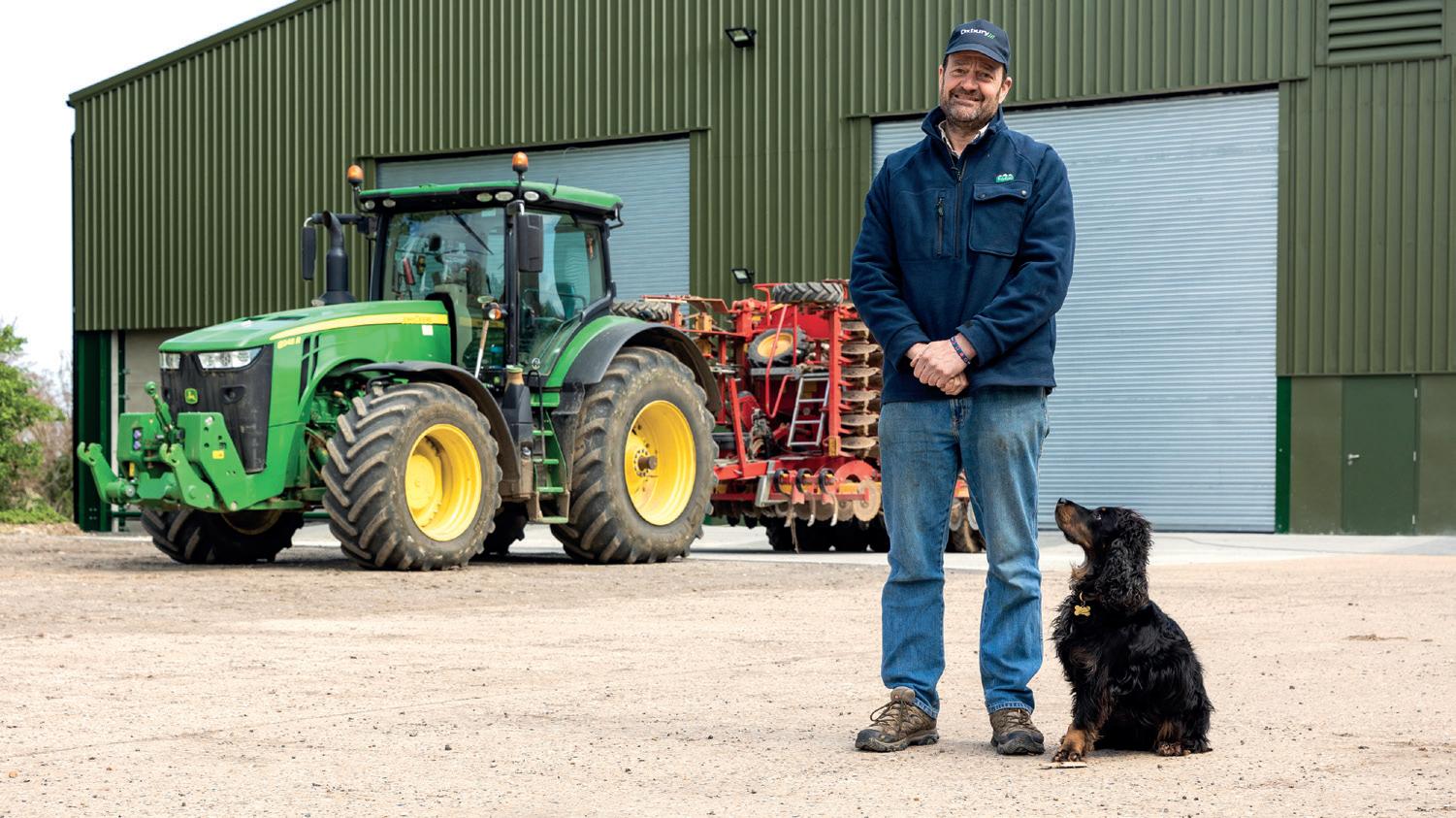
“You can understand that things quickly got busy, so following my neighbour’s recommendation I joined Southern Farmers as I needed a trusted organisation I could rely on to do some of the jobs I used to do myself," he said.
He now relies on Southern Farmers to source and buy the fuels and building materials he uses, along with gas and electricity.
“I’m particularly glad that with the electricity market the way it’s been over the past year or so I’ve had Southern Farmers batting for me. It’s reassuring to know that an organisation with its skills and buying power is looking after the interests of members so effectively.”
The business owns a number of let properties and relies on Southern Farmers for the building materials it needs for refurbishments and for other projects around the farm. “Everything from new concrete pads to steel for grain stores,” Robert commented. He also relies on the group for mineral licks for the cattle and numerous other ancillary products.
“It saves me a remarkable amount of time as I know I don’t have to shop around for the best price any more. I just ring one of the team at Southern Farmers and tell them what I need. Only having one single invoice to pay each month is also incredibly helpful.
“Besides the practical reasons for joining the group, there is the pleasure of chatting to the team, which is good for those of us who generally live a pretty solitary existence. The phone is always answered by a cheery voice and whoever you speak to knows who you are and what you do. It really brightens my day.”
MAY 2023 | WWW.SOUTHEASTFARMER.NET 40 BUYING GROUP
Southern Farmers Ltd. 1,200+ MEMBERS Call us today on 01580 241401
Robert Spencer
Photos: ©Martin Apps, Countrywide Photographic
A small family firm based at Hartlip, near Sittingbourne in Kent, SJ Agri supplies parts from all major aftermarket brands, including Bepco, Vapourmatic, Sparex and Granit, to customers across the South East.


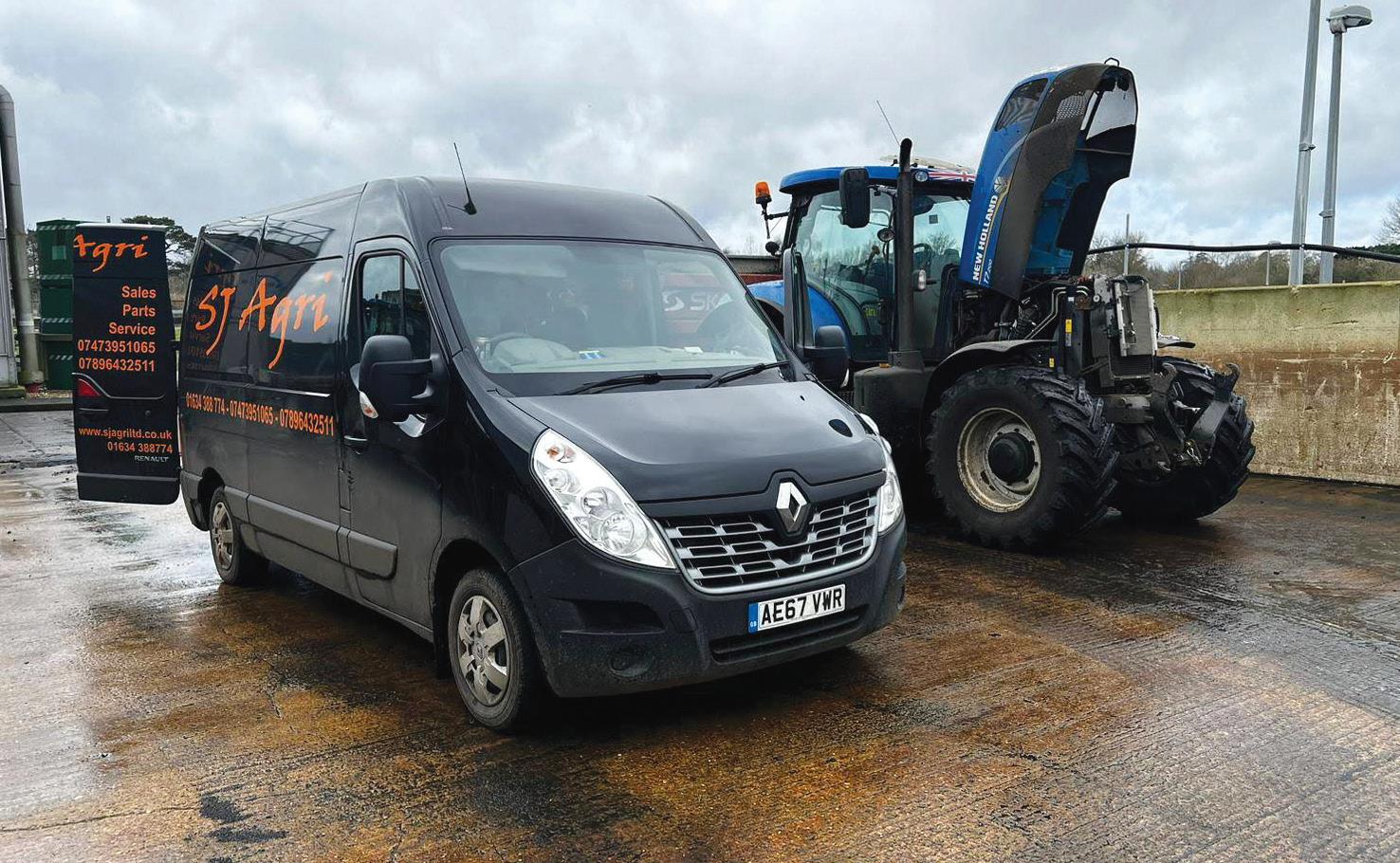
S J Agri supplies a range of brands including Ehrle industrial pressure washers, Wessex International’s CountryLine compact tractor attachments, Ego electric tools, Cobra garden equipment, Hansa chippers and Billy Goat commercial equipment.
The business can send goods out via post or arrange collection, while the workshop and mobile service van can undertake most work, looking after everything from a push mower to larger items of machinery, including implements and trailers. S J Agri is a member of Bagma and NTTA and believes in trailer safety.
A small but growing firm, the company is proud of its high levels of customer service and knowledge of the demands and requirements customers have and the team aims to ensure their business is running smoothly no matter the day, time or season.


The S J Agri country store is growing and stocks a wide range of products from
PARTS FROM ALL MAJOR AFTERMARKET BRANDS
its various suppliers including livestock essentials, fencing, equestrian products and more.
Southern Farmers members just need to quote their membership number to place an order with SJ Agri.
FEATURED COMPANY: WWW.SOUTHEASTFARMER.NET | MAY 2023 41 TO ADVERTISE CALL 01303 233883 Southern Farmers Ltd.


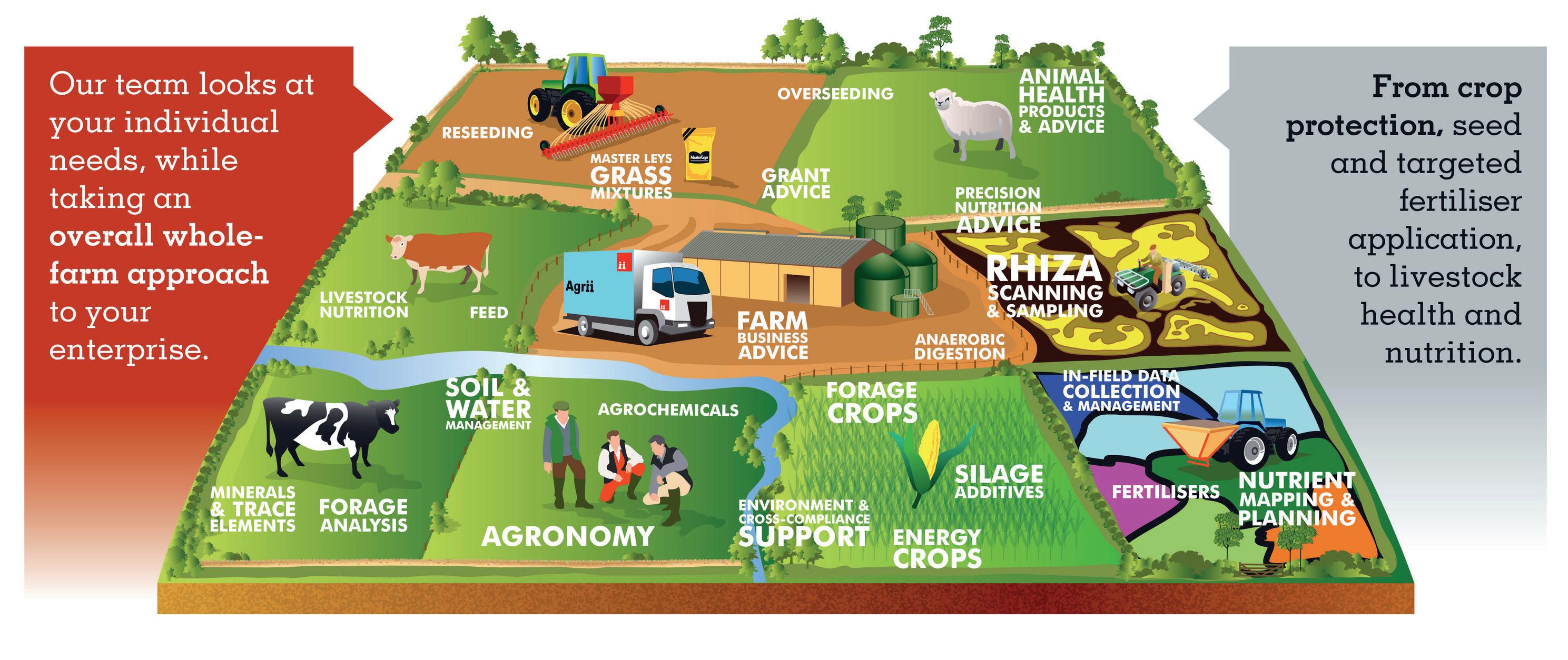
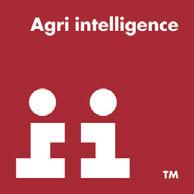



MAY 2023 | WWW.SOUTHEASTFARMER.NET 42 AGRII FORAGE & LIVESTOCK Visit www.agrii.co.uk/forage to download our Guide to Grass and Roots & our Livestock Directory, or use the code: For more information, please call our Customer Services team on 0845 607 3322 or email info@agrii.co.uk. The Agrii Forage and Livestock Team is made up of highly qualified and dedicated advisory staff located throughout the UK Agrii provides a professional, advice-based service and can supply a huge range of products for your livestock enterprise www.agrii.co.uk Ashford 2 Victoria Road, TN23 7HJ (01233) 620599/662297 Canterbury 85 Sturry Road, CT1 1DA (01227) 464328/453966 Hastings Keats Close, TN38 0PP (01424) 422224 Northfleet Unit 2, Grove Road, DA11 9AX (01474) 327855 Maidstone 1a Hope Street, ME11 2TF (01622) 764449/672952 Medway London Road, ME8 6YX (01634) 364255 Sittingbourne St Michaels Road, ME10 3DN (01795) 472354 On Site Tyre Repair or Replacement Great service Great choice Great value since 1962 YOUR NO.1 INDEPENDENT TYRE DEALER The South East’s Agricultural Tyre Specialist Tractor, Trailer and all Agricultural Tyres at the Best Prices www.watlingtyres.co.uk
A family-owned business, UFAC-UK manufactures specialist energy, protein and omega 3 supplements at its dedicated manufacturing plant in Woolfox, Rutland, with particular expertise in the use of oils, fats, amino acids and liquid sugars. The business has recently joined Southern Farmers, having supplied the beef, sheep and dairy sectors in this region for many years.
“We’re delighted to join Southern Farmers as a supplier, raising the profile of our expertise in livestock nutrition supplementation to members in the South East,” said James Hastings-Molyneux, UFAC business manager for the Midlands and South East.
“We are proud to develop our own products and work with livestock producers to improve
Nutritional supplement manufacture UFAC-UK becomes Southern Farmers supplier.

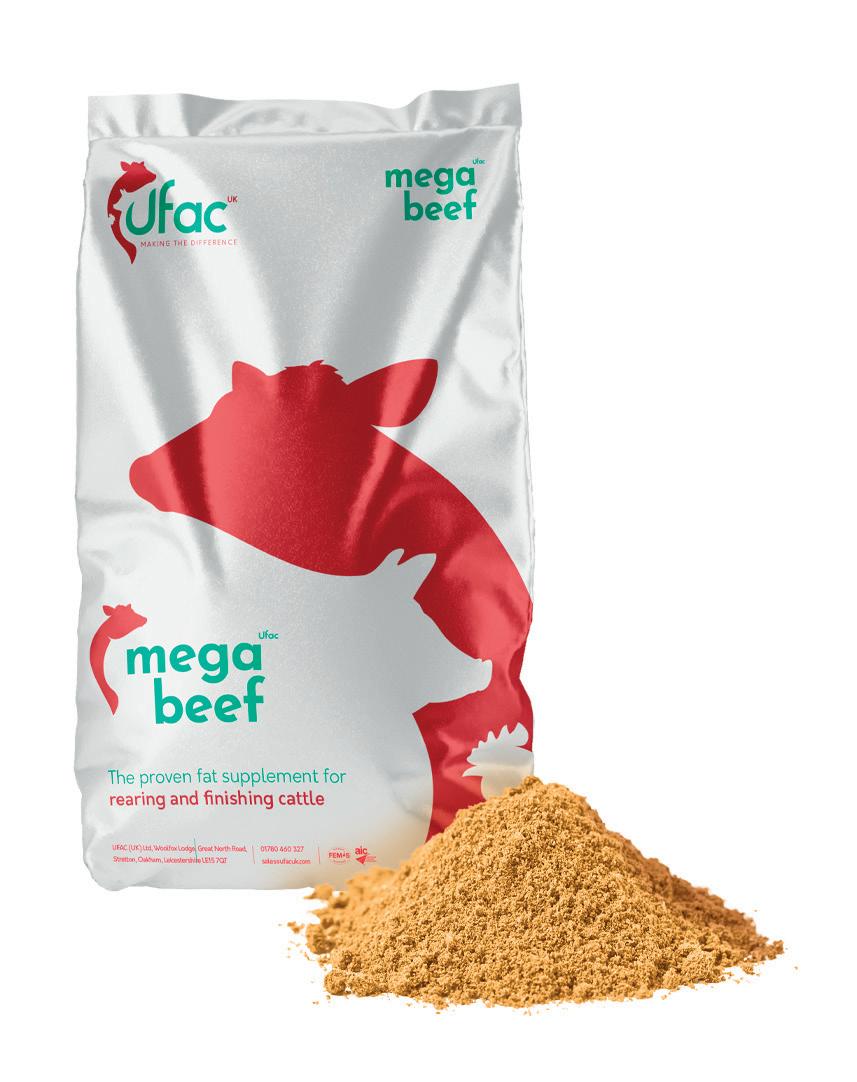
the profitability and performance of their herd or flock.”

To maintain a sustainable UK beef industry, it is critical that beef production maximises feed conversion efficiency (FCE) and carcass quality. UFAC’s mega beef, a specialist fat supplement for rearing and finishing beef cattle, is a unique blend of specially selected rumen-inert fatty acids that supplies a balanced fatty acid profile to maximise energy supply, delivering improved growth rates and carcass quality. Providing further support and innovation to the beef supply chain, as well as other ruminant species, blended fat supplement Megajule contains more than twice the energy content of carbohydrate-based feeds, helping livestock reach their potential and bringing significant nutritional and financial benefits.
Elsewhere, the Procon Concentrate range is designed to balance cereals and forages for livestock producers growing and finishing ruminant livestock on a home mixing feeding system. It supplies quality protein to give lean muscle deposition, and is formulated to optimise daily live weight gain, milk yield, carcass grading and profitability.
More recent UFAC innovations include the unique combination of fatty acids in palmfree fat supplement Envirolac, which can help improve efficiencies and performance of dairy herds while providing a more sustainable energy source than palm oil-derived alternatives.
UFAC products are now available from Southern Farmers. For more information speak to the purchasing team.
IMPROVING PROFITABILITY AND PERFORMANCE HYDRAULIC HOSE REPLACEMENT
Allstar Hydraulics Ltd was founded in late September 2019 by Pete Osborne, who “took the plunge” to start his own business after working in the hydraulic hose replacement business for many years, gaining experience that now benefits his growing customer base.

Despite the unfortunate timing, with the Covid-19 lockdown coming into effect some six months later, Pete made it through the pandemic and has continued to grow the mobile, on-site hydraulic hose replacement business.
Originally working on his own with one van, he doubled the team in mid 2020 and expanded further with a third van on the road a year later. The business now covers all of Kent and East Sussex and works with a sub-contractor network that offers nationwide coverage, 24 hours a day, seven days a week.
Last year saw the opening of a walk-in trade counter at Mascalls Pound Farm, Paddock Wood, with plenty of space for the business to 24 hour 365 service number: �� 07939 104737
store stock, make hoses and base the mobile units.
“Still a small, family-run business, we pride ourselves on being downto-earth normal people; no suits and ties, no sales reps, no ridiculous prices and no long waiting times for call outs,” said Pete. “Our service speaks for itself. We made it through Covid-19, we are regularly busy and we have an amazing customer base that keeps coming back.
“Southern Farmers Ltd took us on as a supplier at the start of this year, making it easy for members to use our services, on site or at our trade counter.”

WWW.SOUTHEASTFARMER.NET | MAY 2023 43 TO ADVERTISE CALL 01303 233883 BUYING GROUP FEATURED COMPANY: Southern Farmers Ltd.















MAY 2023 | WWW.SOUTHEASTFARMER.NET 44
PolyNPlus, BFS’s foliar nitrogen fertiliser range, dramatically increases the efficiency of nitrogen usage by plants and virtually eliminates nitrate losses. Optimise crop economic productivity AND take care of the environment by using PolyNPlus. Contact BFS or your local distributor for more information: BFS Fertiliser Services Ltd T 01245 325849 E info@bfsfertiliserservices.uk www.bfsfertiliserservices.uk “...this product ticks all the boxes on the environmental front” “...the yields and quality of the products we harvested were excellent” Fertiliser Services 75 YEARS OF SUPERIOR SERVICE For further information: T:+44(0)1795 411527 M:+44(0)7990042473 natallia.gulbis@plantworksuk.co.uk smart.plantworksuk.co.uk PLANTING COVER CROPS THIS SEASON? Treat with SR2 Mycorrhizal Fungi & Rhizobacteria • Increase nutrient use efficiency in soils • Improve growth and soil health • Enhance mycorrhizal levels for follow on crop & RHIZOBACTERIA Available for mixing with seeds on farm, or pre blended by your seed supplier SR2 applied with cover crops, herbal leys and forage grass at a nominal rate of 10Kg/hectare at time of planting.
Foliar nitrogen fertilisers from BFS
With the UK climate seeing the extremes of both rain and sun over the course of the year, sustainable water management has never been more important to farmers.
In recent years the UK has seen a sharp rise in the extremity of winter flooding and summer droughts, both of which can have a detrimental impact on the growth of, and ability to maintain crops, as well as making large areas of land unusable for housing livestock.
The reason water management has such a significant effect on crop growth is because the movement of water is directly linked to nutrient loading. Even during standard rainy spells, nutrients can run off from fields on the surface or seep through, sometimes even reaching the groundwater, which can impact soil health.
To maintain healthy soil for crop growth and prevent erosion, it’s crucial to take measures towards water management; it can make a huge difference in maintaining a sustainable agricultural system that maximises land usage throughout the year.
Professional Building Supplies is a privately owned business that has been supplying specialist building and drainage products across the UK since 2009 and is committed to providing high quality products at competitive prices, making it a leading choice for farming and agriculture businesses across the country. With the ever-increasing pressures for sustainability across the farming industry and the growing need for effective water management during these periods of adverse weather, it’s important to consider water management options that are designed with sustainability in mind.
From rainwater harvesting tanks to prepare for the drier months to underground drainage systems, land drain and soakaway products that solve waterlogged fields during the flooding season, Professional Building Supplies offers
SUPPORTING SUSTAINABILITY IN FARMING
a wide range of high-quality and sustainable products manufactured with the most up-todate water management technology, including:
• Underground drainage components including pipe, fittings, inspection chambers, catchpits, flow controls and silt traps
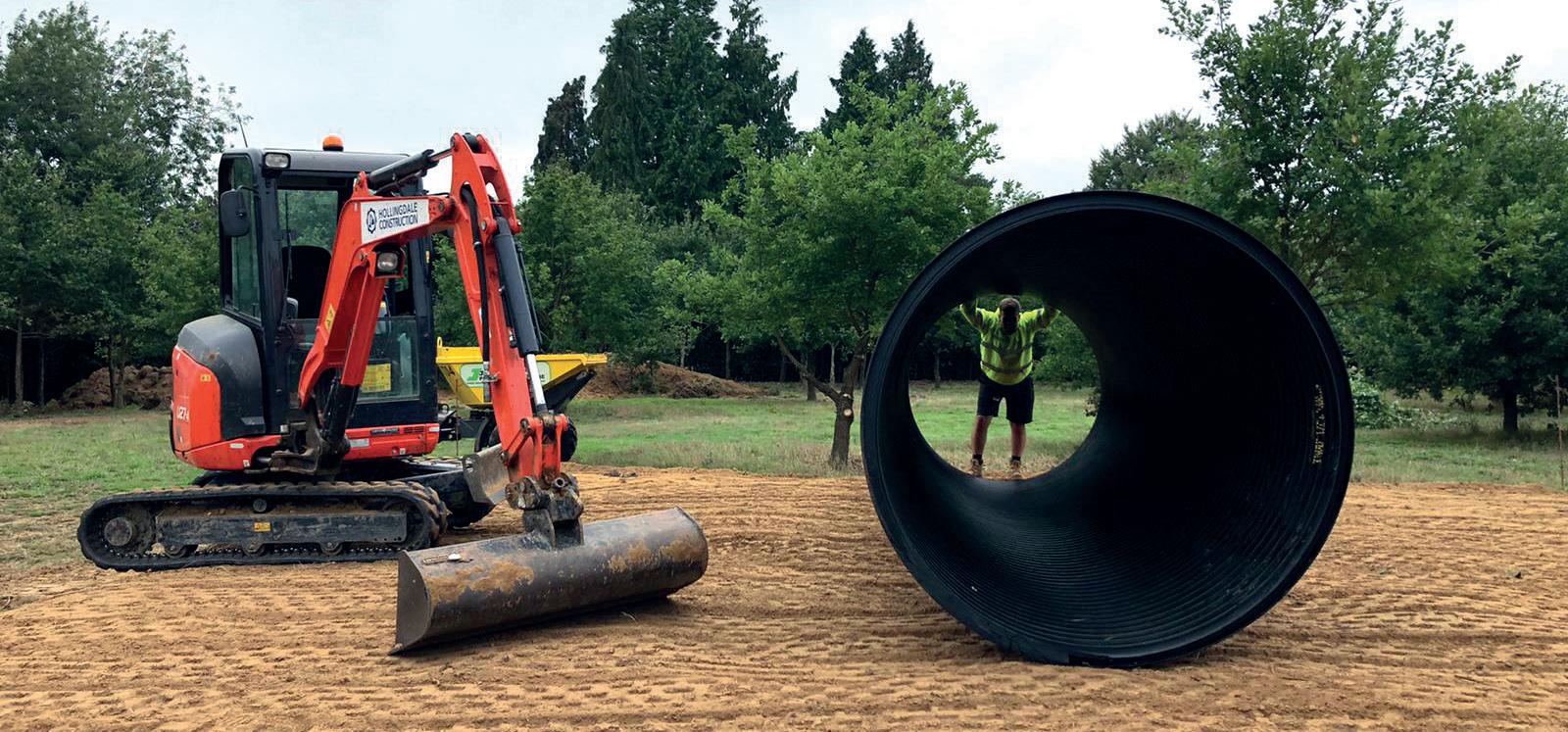
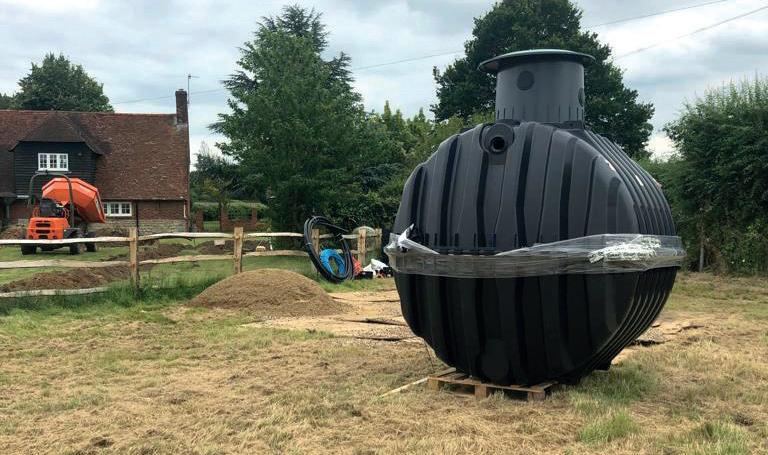
• Twinwall drainage, land drains and channel drains
• Soakaway crates with geotextiles/ attenuation tanks with liners
• Sewage treatment plants and rainwater harvesting systems
• Extensive specialist range of guttering
• Diesel storage tanks
• MDPE pipe and fittings as well as ducting
• Gate fittings amongst all other ironmongery and fixings/fasteners
• Corrugated sheets, hygiene sheets, internal decorative cladding and external cladding. On partnering with Southern Farmers, national sales manager Ben Harmar said: “We’ve been offering building and drainage solutions to the farming industry for almost 15 years, and our expertise in this area has made us the preferred choice for farmers on a
variety of different projects. We’re really excited to be teaming up with Southern Farmers to continue providing our wide product range and expert knowledge to farming and agricultural businesses across the South East.”
With a large southern-based stockholding across several depots, including Colchester, Tunbridge Wells and Peterborough, Professional Building Supplies offers next-day nationwide delivery for the majority of its quality product range, making it easy for customers to get the products they need quickly and efficiently.
All accounts with Professional Building Supplies also come with a dedicated account manager to aid customers with pricing and quotes, as well as offering expert advice. Services such as take-offs and site support are available upon request.
For farming and agriculture businesses looking for high-quality building and drainage products, Professional Building Supplies is the go-to choice. With an extensive range of products and commitment to both sustainability and outstanding customer service, it is the perfect partner for any agricultural project.
WWW.SOUTHEASTFARMER.NET | MAY 2023 45 TO ADVERTISE CALL 01303 233883 BUYING GROUP FEATURED COMPANY: Southern Farmers Ltd.
�� 07921 852486 ✉ ben@profbuild.co.uk LOCATION-ARROW www.professionalbuildingsupplies.co.uk
Customers can purchase Professional Building Supplies products through Southern Farmers. Head to the website to browse the full product range or get in touch with Ben Harmar to discuss specific requirements.
Larger than life twinwall drainage pipe that was due for installation into an agricultural field
Sewage treatment plants are of particular interest to farmers that aren’t connected to the water mains as they suitably treat sewage water so that it’s clean enough to discharge into a nearby watercourse
Kent’s Premier Aggregates, Concrete and Masonry Solution














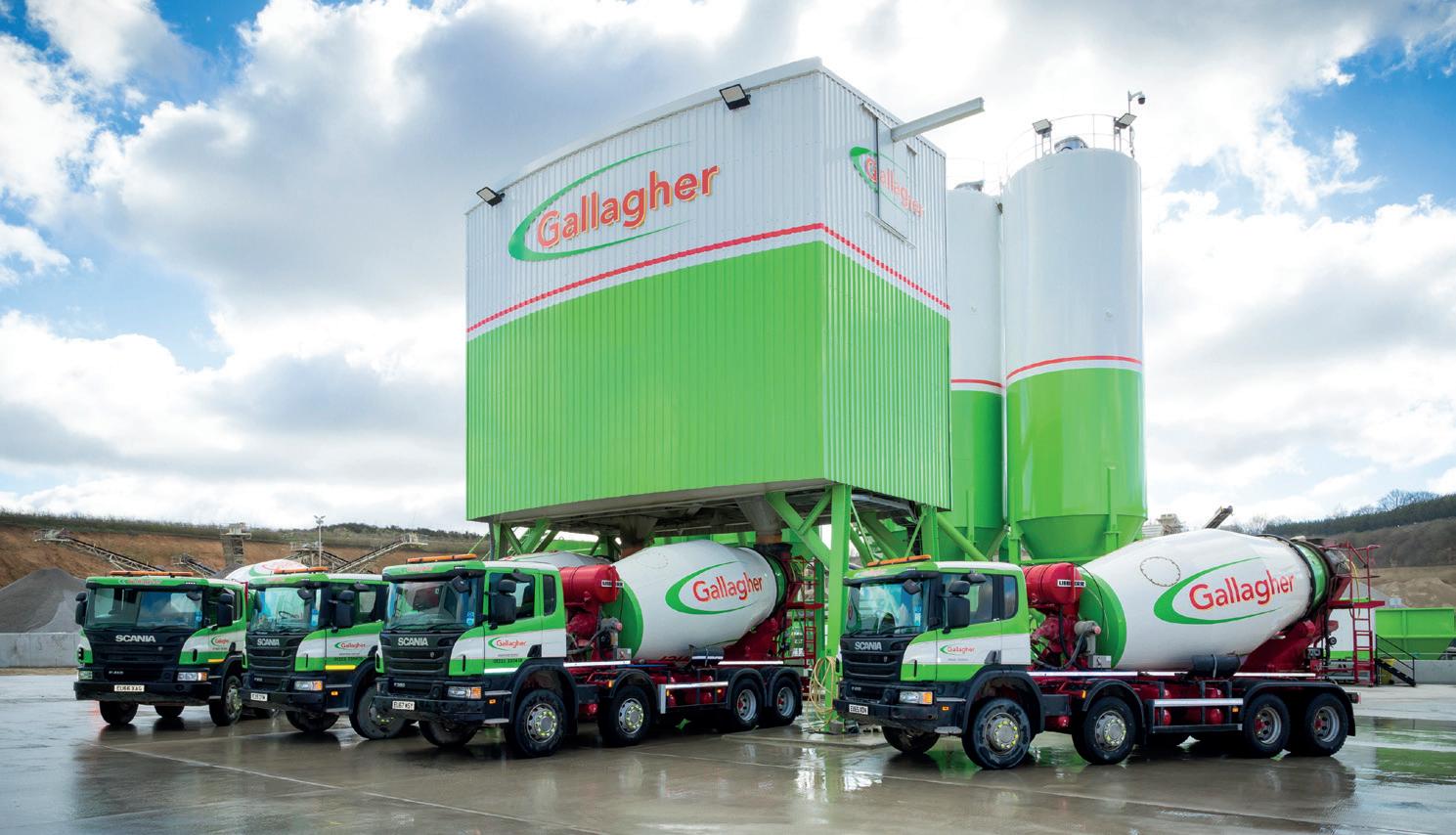
MAY 2023 | WWW.SOUTHEASTFARMER.NET 46 HYDRAULICS LTD ALLSTAR LETTER .indd 1 1/10/19 16:00 Commercial • Plant Marine • Agri Tel: 07939 104737 allstarhydraulics.co.uk 24hr on site hydraulic hose replacement service Covering Kent & Sussex Trade counter now open! Unit 4A Mascalls Pound Farm, Maidstone Road, Paddock Wood, Tonbridge, Kent TN12 6LT AGGREGATES | GROUNDWORKS AND CIVILS | PROPERTY EXCELLENCE. DELIVERED. Call: 01622 726262 Email: quarry@gallagher-group.co.uk www.gallagher-group.co.uk Gallagher Aggregates operate the only two hard rock quarries in the South East of England, as well as six concrete plants throughout Kent. We can deliver over 100 different products including: • Primary aggregates • Recycled aggregates • Ready-mix concrete and flowing screeds • Roller compacted concrete (RCC) • Hydraulically bound mixtures (HBM) • Kentish Ragstone building stone With our additional on-site landfill and recycling capabilities we can provide a complete materials solution for your next project.
GIVE YOUR PROJECT THE BEST FOUNDATION TO SUCCEED! CALL OUR SALES TEAM NOW 01622 726262 OVER 1,000,000 TONNES OF PRIMARY AND RECYCLED HARDCORE, GENERAL FILLS AND SUB-BASES AVAILABLE FOR YOUR SOUTH EAST PROJECTS. ISO 9001:2015 Gallagher Aggregates QUALITY ASSURED. HIGHWAY SPECIFICATION APPROVED. NEXT DAY DELIVERIES
FOLIAR POLYNPLUS REDUCES NITROGEN USE
With fluctuations in fertiliser prices adding to the many pressures facing farmers today, foliar nitrogen fertiliser treatments can help, explains Rosalind Platt, managing director of UK crop nutrition leaders BFS Fertiliser Services.
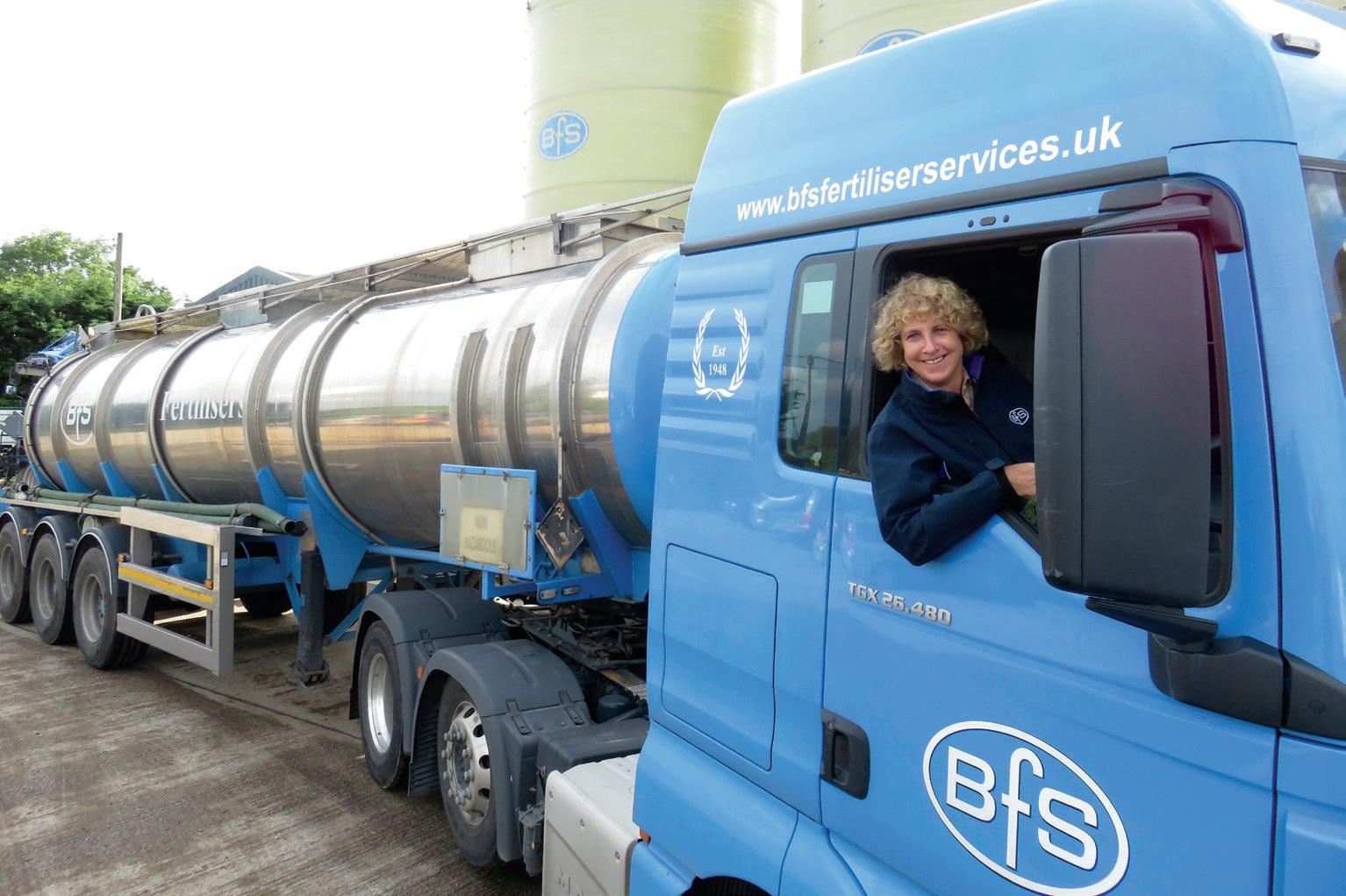
Foliar nitrogen fertiliser treatments are a cost-effective way to reduce the amount of nitrogen needed, maintain or increase crop yield, reduce pollution and cut a farm’s carbon footprint.
BFS’s foliar nitrogen product PolyNPlus is producing excellent results. It is the only foliar product to be extensively trialled through five years of independent research.
WHAT IS POLYNPLUS FOLIAR NITROGEN?
Nitrogen, vital to maximise yields in cereal production, is traditionally soil-applied as ammonium nitrate, urea or liquid UAN in two or three applications in the spring. Later in the season, though, their nitrogen use efficiency can decline to 25%, especially in dry conditions.
Unlike conventional liquid fertilisers, PolyNPlus is safe to apply to the leaves of growing crops. When the leaf canopy is
sufficient, it can replace a proportion of the soil-applied nitrogen. For example, and depending on soil and weather factors, 25 litres of PolyNPlus – supplying just 8kg of nitrogen between growth stages 37 and
39 – can replace 40 to 50kg of any type of soil-applied nitrogen.
PolyNPlus’s sticky nature prevents nitrate loss, avoiding groundwater contamination, while the loss of ammonia is minimal. In addition, replacing 40kg of soil-applied fertiliser with 25 litres of this product cuts the carbon footprint of the third application by 77%.
PolyNPlus is ideal for use on oilseed rape after flowering as a nitrogen boost. On cereals it is an effective nitrogen supplement when tank-mixed with crop protection products, thereby reducing the number of passes required.
Wiltshire-based contractor Paul Jannaway said: “PolyNPlus ticks all the boxes on an environmental front. I applied it along with crop protection products which saved a pass and had absolutely no scorch in all conditions, even when it was very hot. The yields and quality of the products we harvested were excellent.”
2019 trials at Velcourt: Nitrogen and yield comparison 106N 137N 146N 0 200N 97N 8.29 Untreated No PolyNPlus Soil-applied nitrogren + PolyNPlus (kg/ha) Yield (t/ha) 11.76 11.38 11.19 11.08 11.97 Total nitrogen applied (kg/ha) WWW.SOUTHEASTFARMER.NET | MAY 2023 47 TO ADVERTISE CALL 01303 233883 BUYING GROUP FEATURED COMPANY: Southern Farmers Ltd.
BFS Fertiliser Services Rosalind Platt













































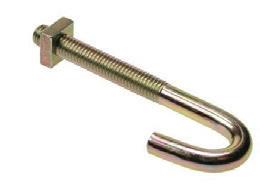


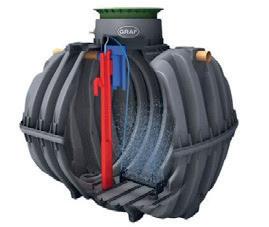






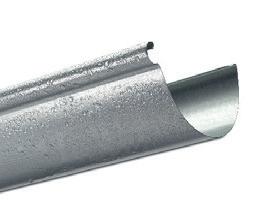


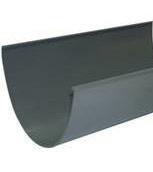












FARM FAVOURITES TALK TO OUR NATIONAL SALES MANAGER TODAY! Ben Harmar National Sales Manager 07921 852486 ben@profbuild.co.uk professionalbuildingsupplies.co.uk PART OF THE Largest Stockist of Specialist Building Materials in Your Area! Corrugated Sheets Hygiene Sheets Soil & Waste Fixings & Fasteners Ground Guard Geotextiles Treatment Plants Channel Drain Twinwall Drainage Diesel Stores Land Drain Soakaways Ironmongery Steel Gutters MDPE Pipe & Fittings Industrial Gutters Ducting Gate Fittings Drainage Covers & Gratings Stocked Locally Next Day Delivery Competitive Rates
In a world where input costs are rising and soil health is rightly being championed, building soil biology is a practical way to reduce fertigation and improve soil structure and carbon capacity.
WHY IS SOIL BIOLOGY SO IMPORTANT TO FARMERS?
Beneficial soil microbes play a critical role in the acquisition, ‘renaturing’ and transfer of soil nutrients into plants. Biofertilisers (microbial biostimulants) comprise living micro-organisms which, unlike traditional fertilisers, multiply as they enter the ground and increase the nutrient use efficiency (NUE) of plants.
Two key microbes are used for commercially available biofertilisers; mycorrhizal fungi (MF) and plant growth promoting rhizobacteria (PGPR).

Mycorrhizal fungi underpin much of the nutrient flow in farming soils. These remarkable fungi act as a secondary root system for plants and can increase the active root area over 700 times. MF are host specific; although many crops including cereals, legumes, grass and maize, are good partners, plants such as oilseed rape and sugar beet are not.
HOW CAN I INCREASE MF IN MY SOILS?

Reintroducing MF into farming soils by treating catch, cover or herbal leys is an ideal way of improving NUE. Used just once in a rotation this treatment will build the underlying biology in your soils.
Plant growth promoting rhizobacteria act to make phosphorus and potassium soluble in soils and plant-available. Many of these free-living bacteria also capture nitrogen from the air, adding to the
nitrogen pool. These microbes also produce plant growth hormones that naturally stimulate top and root development.
PGPR consortia need to be selected for specific crop types and are spray applied annually in the spring when soil temperatures rise above 10 degrees.


Smart Rotations is a range of biofertilisers, researched and trialled extensively across different soil types and crop varieties in the UK.






SR2 mycorrhizal granules can easily be mixed with a legume-based cover crop blend to 'vector' the biology into soils. Used once in a rotation, SR2 will not only support the establishment and growth of the cover crop but also build the soil's biology.
SR3 PGPR is a range of liquid suspension sprays applied in spring to significantly increase nutrient uptake by treated crops.
WWW.SOUTHEASTFARMER.NET | MAY 2023 49 TO ADVERTISE CALL 01303 233883 BUYING GROUP FEATURED COMPANY: Southern Farmers Ltd.
For further information contact Natallia Gulbis BSc (Hons), MSc, Technical Manager: �� 01795 411527 /07990 042473 ✉ natallia.gulbis@plantworksuk.co.uk LOCATION-ARROW www.smart.plantworksuk.co.uk MAKING SURE THAT YOUR APPLIED FERTILISERS BECOME PLANT AVAILABLE Southern Farmers Ltd. OVER 500 SUPPLIERS www.southernfarmers.co.uk/about-us/suppliers COMMERCIAL sales@setyrescommercial.com www.setyrescommercial.com Largest stock of Commercial and Agricultural tyres in the South East. Rapid response breakdown & fitting vehicles in your area. All major brand & economy tyres for agricultural machinery supplied and fitted. Discount for Southern Farmers Members. Contact us: T: 0344 880 8555 (Local rate call) KENT – SUSSEX – ESSEX
RECORD LEVELS
With spring now upon us, the trade in all sections of the livestock market is strong, with prime cattle at record levels and prime sheep at exceptionally good levels for the time of year.

In the prime cattle ring, best cattle are now regularly trading at 290p/kg to 310p/kg every week, with plenty of cattle trading over £2,000 per head, levels that have not been reached previously.
Cattle are generally well short of requirements both from retail and wholesale butchers, and many more could be sold in the live ring to advantage. It is worth remembering also that in the live ring there is no penalty on weight, and indeed with traditional butchers a 4H grading is not discounted.
The cull cow trade is also exceptionally high, with numbers decreasing as would be expected at this time of year with the catering and processing trade wanting quality stock. Again, many more could be sold
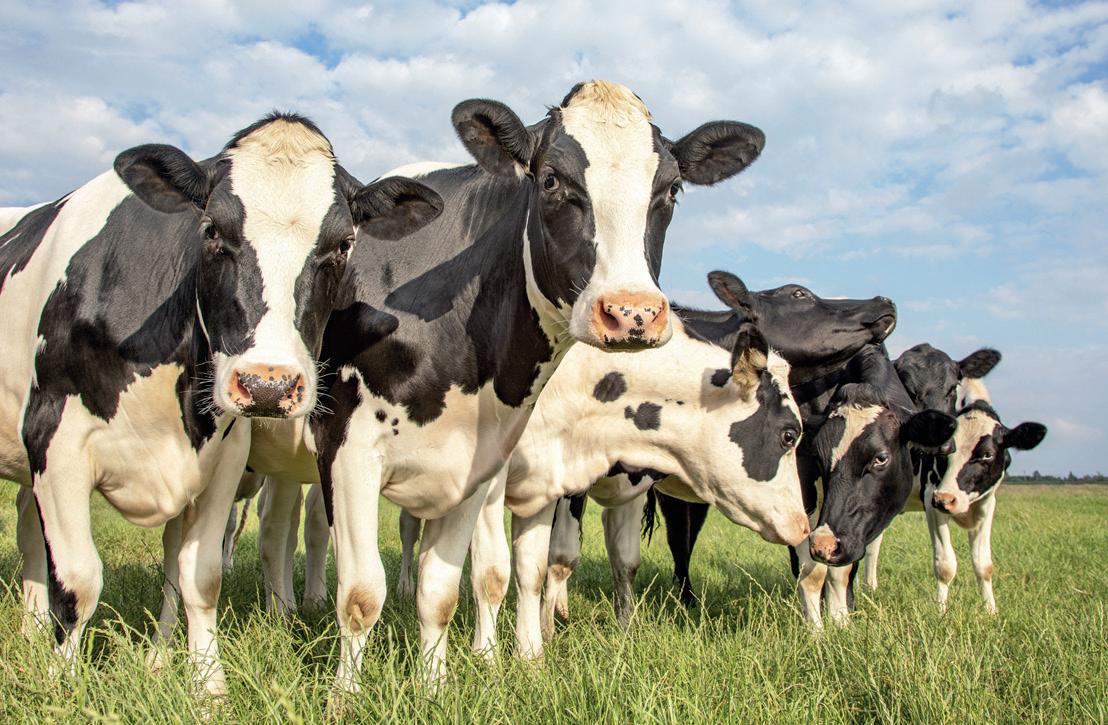
westpoint farm vets
100% Farm Vets
to advantage in all livestock rings.
The sheep trade continued to increase throughout early April, with prices increasing further after Easter, with heavy hoggets seen trading from £150 to £160 on a regular basis and averages around 290p/kg to 300p/kg live weight.
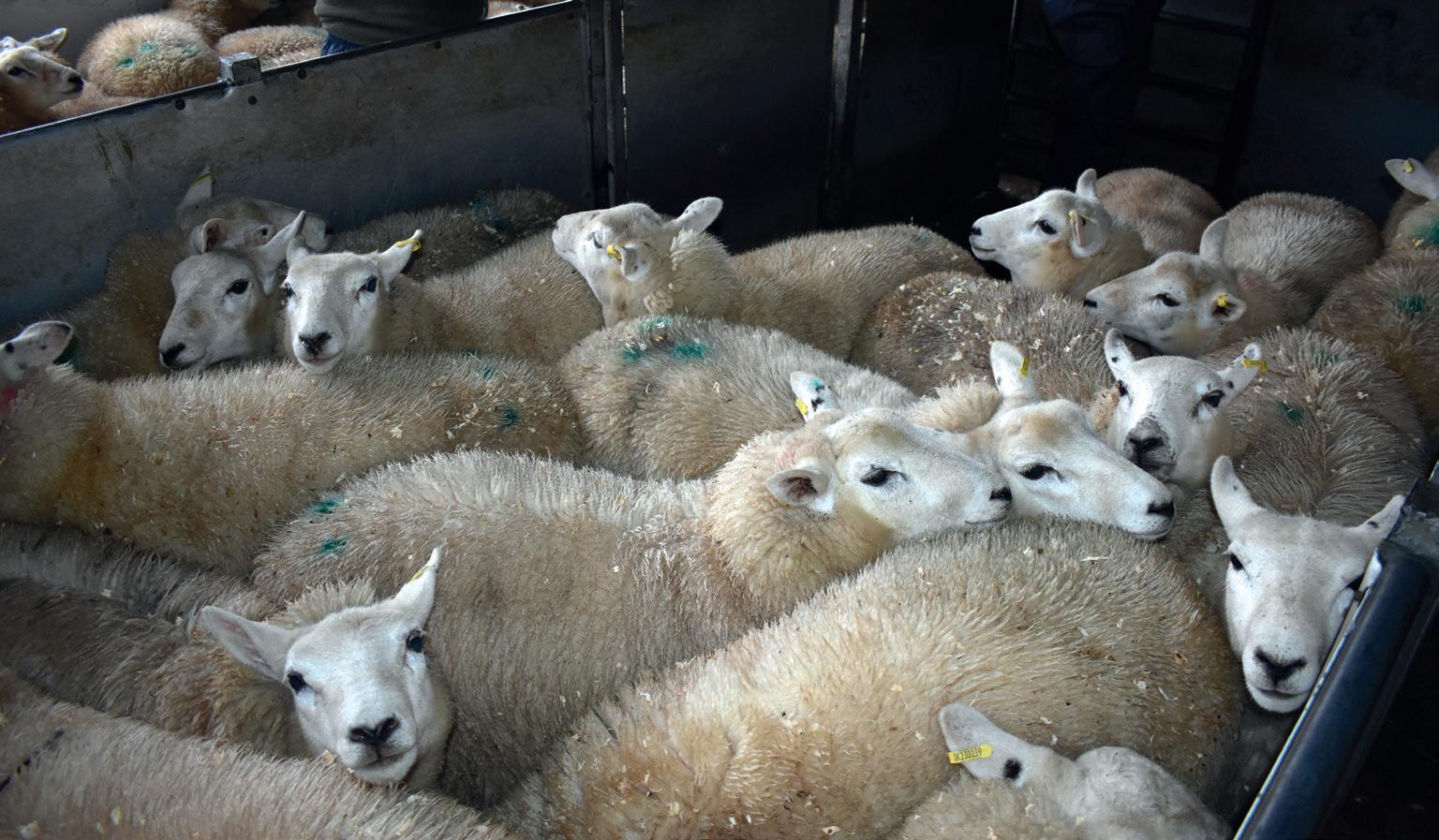
As usual the issues of erupting teeth are becoming an issue and vendors are recommended to clear sooner rather than later. There were still several sheep being entered through the live ring which were not fully finished, reflecting the general shortage of fodder.

It is good to see new season lambs coming forward in slightly larger numbers each week, a slow start but we have seen prices substantially increasing after Easter, with again size no issue. Due to the cost of disposing of fleeces, it is likely that the new season lamb trade will continue to increase since the negative effect of disposal is not so great.
It is quite extraordinary that a few years ago the fleece of a sheep almost paid for the killing and now it is a disposal cost. We live in changing times. The cull ewe trade is exceptionally strong as would be expected, with plenty of strong ewes selling at well over a £125 per head.
The pig trade is also at record levels. Wholesalers are desperately short of pigs and are competing at unheard of levels, bringing at last a glimmer of light at the end of a long tunnel for the pig producer. They do, though, have two to three years of substantial losses to make up.
The fall in feed prices for wheat and barley is again beneficial and is helping the brighter outlook. The cull sow trade also increased substantially through the previous period despite another major sow processor leaving the market. Numbers are short for the processing trade, which is boosting that trade. Remarkably, 10 sows last year came to almost the same as one sow this year, reflecting the increase in trade.
The wet period at the start and middle of April is causing issues with the spring drilling of arable crops in the area and spring barley in some places is under severe stress with waterlogged roots.
Winter wheat is looking generally strong as did established oil seed rape.
There are some concerns with regard to forward prices for corn crops but we are a long time from harvest and there are many uncertainties in the world.


MAY 2023 | WWW.SOUTHEASTFARMER.NET 50 AT COLCHESTER MARKET GRAHAM
T: 01206 842156 E: info@stanfords-colchester.co.uk www.stanfords-colchester.co.uk
ELLIS FRICS FAAV FLAA For and on behalf of Stanfords
Supporting British Livestock Agriculture Since 2000 New client visits are FREE - book yours today! Westpoint Farm Vets Dawes Farm, Bognor Road,
Sussex,
3SH info@westpointfarmvets
Our
Westpoint
covering Kent &
Sussex 01306 628208 Westpoint Winchester covering Hampshire 01962 779593 Westpoint Chelmsford covering Essex 01306 628489 Westpoint Horsham covering Surrey, Sussex and Kent 01306 628086
Warnham, West
RH12
co.uk | westpointfarmvets co.uk
teams of experienced, highly-qualified vets are focused on driving farm efficiency and animal health across the South East
Ashford
East
PRICES RISING STEADILY
The finished sheep section has been on a real roller coaster ride since Christmas, following on from a difficult autumn of poor growing conditions and rising input prices. Many forecasters feared that hogget finishers would really be in for a tough time this spring as it was hard to be positive about any potential lift in trade.
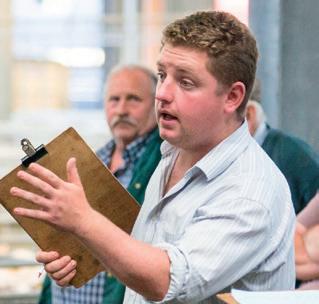
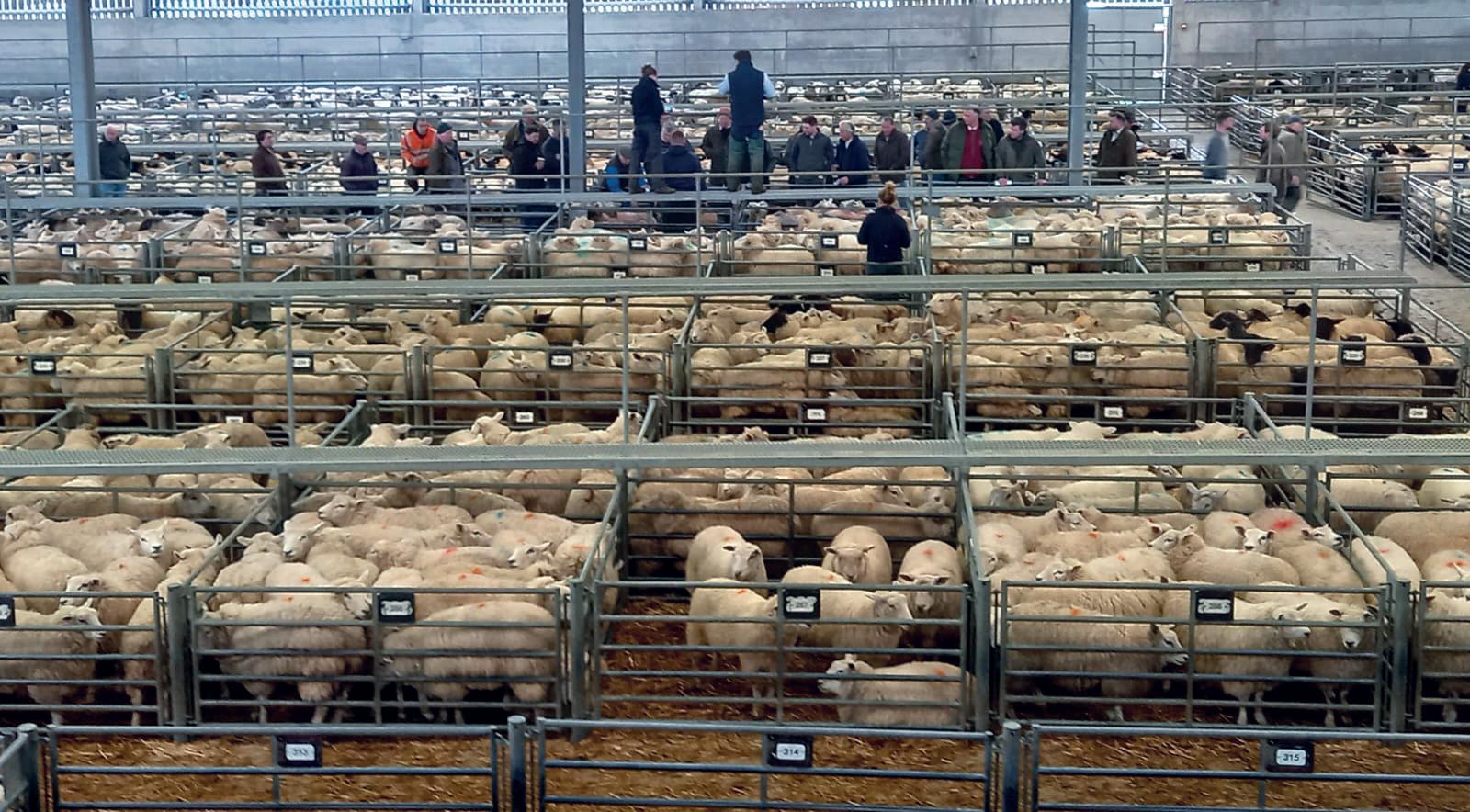
It is pleasing to note, though, that things have begun to look up. There has been a complete change in the trade, with prices rising steadily week-on-week since the end of February. Over the past three weeks, (to the time of writing in mid-April), we have seen a 20p/kg to 30p/kg rise every Tuesday. These big jumps have made prices hard to predict, with some sheep in the stores rising by £30 to £40/head over this period.
So now everyone wants to know three things: Why have they risen? How long will it last? And the difficult question - have they reached the top? I will do my best to pick this apart for you all.
Firstly, why have they risen so quickly? Well, we have had a number of events in the past three weeks to boost demand for lamb and lamb products, the first being the feast at the commencement of Ramadan. This requires
large quantities of smaller and often leaner lambs, which at this point were not readily available. We are into April and as hoggets tend to get bigger over time, there was a glut of big sheep and not enough smaller ones to fill demand.
Following this we had the Easter weekend. All reports suggest that the sale of lamb was huge, and I know this to be true as I tried to get a leg at two supermarkets on the Saturday and failed. As we have had barely any new season lambs on offer, all these jobs needed to be filled with hoggets.
On 21 April there was another feast day to mark the end of Ramadan, a big celebration in the Muslim community. Hopefully we will be able to maintain these prices, but when you read this you will know if my predictions were correct or not!
Back to the matter at hand, and the second query of how long will it last? Truthfully, I really don’t know, and I think the laws of supply and demand will certainly dictate this. With considerable trepidation I would suggest that we are not going to see any great number of new season lambs in the marketplace until mid-June at the earliest. My personal feeling is that we will
continue to see strong prices until then. Now my least favourite question of the three; have the prices reached the top? Naturally, all vendors like to sell at the best time to maximise returns, especially in difficult times like these. I hear many comments along the lines of: “I wish I had kept a few more back and not sold them a month ago”, but the fact of the matter is that if everyone had kept their numbers back and not sold in January and February, the prices would not be where they are now.
Second guessing the trade and potential price rises can be a risky game, especially if keep is running out. Being forced to sell is never a factor that boosts prices.
Our advice currently is to sell when your sheep are ready and it suits you to do so, rather than chasing the trade. This allows you the luxury of being able to take them home again if needs be. A number of vendors have benefitted from this in recent weeks, with a few occasions of sheep prices increasing by £30/head.
This choice is not available to deadweight sellers, as once they are gone, they are gone. If you don’t like the price that the buyer sets for you, it’s tough luck. Sell live and thrive.
WWW.SOUTHEASTFARMER.NET | MAY 2023 51 TO ADVERTISE CALL 01303 233883
AT ASHFORD MARKET
JOHN ROSSITER Reporting on the market at Ashford T: 01233 502222 www.hobbsparker.co.uk
ALAN WEST Sheep farmer
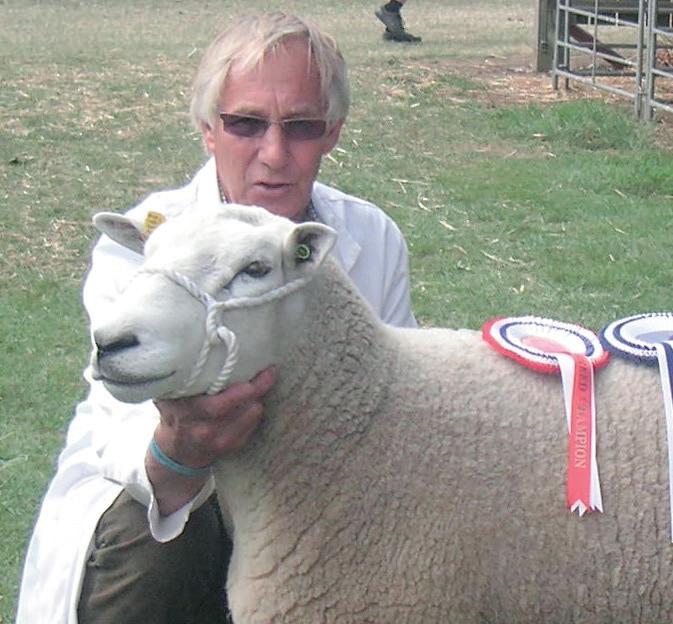
A GOOD LAMBING AND BAD PUBLICITY
The middle of April and, just as things look as if they will dry up a bit, we seem to be dogged by yet more wet, grey and rather dreary days. It’s certainly not ideal lambing weather, particularly for those lambing outside, although doubtless it is shepherds that are more perturbed by the weather than the sheep. Fortunately we haven’t had too many wet and windy nights, which present more of a risk to newborn lambs.
March was certainly an ‘interesting’ month, with the highest UK March rainfall for 40 years; locally the East Malling official weather station recorded a mere six days in the month with no precipitation. We even started lambing with snow on the ground, although that is not that unusual for March. In spite of the inclement weather it has, for us at least, been a relatively easy lambing; some of the first lambs delivered weighed considerably more than anticipated, providing a bit of a scare, but that apprehension soon disappeared as the ewes then settled down to produce some good, strong lambs at rather more sensible weights. In spite of the arrival of quite ‘strong’ lambs, we had very little need of any lambing assistance, and that which was required was limited to straightening out the odd hung elbow or applying a bit of traction for some of the bigger lambs. The latter, I suspect, may well have reached a successful conclusion unaided but with rather more stress on the ewe than desirable.
Genuinely, from the sheep point of view, this season came very close to being an ideal lambing, with most lambs arriving not only unassisted but also unseen, this in spite of frequent visits to the lambing paddock, I reckon that I actually saw considerably less than 20% of the lambs born.
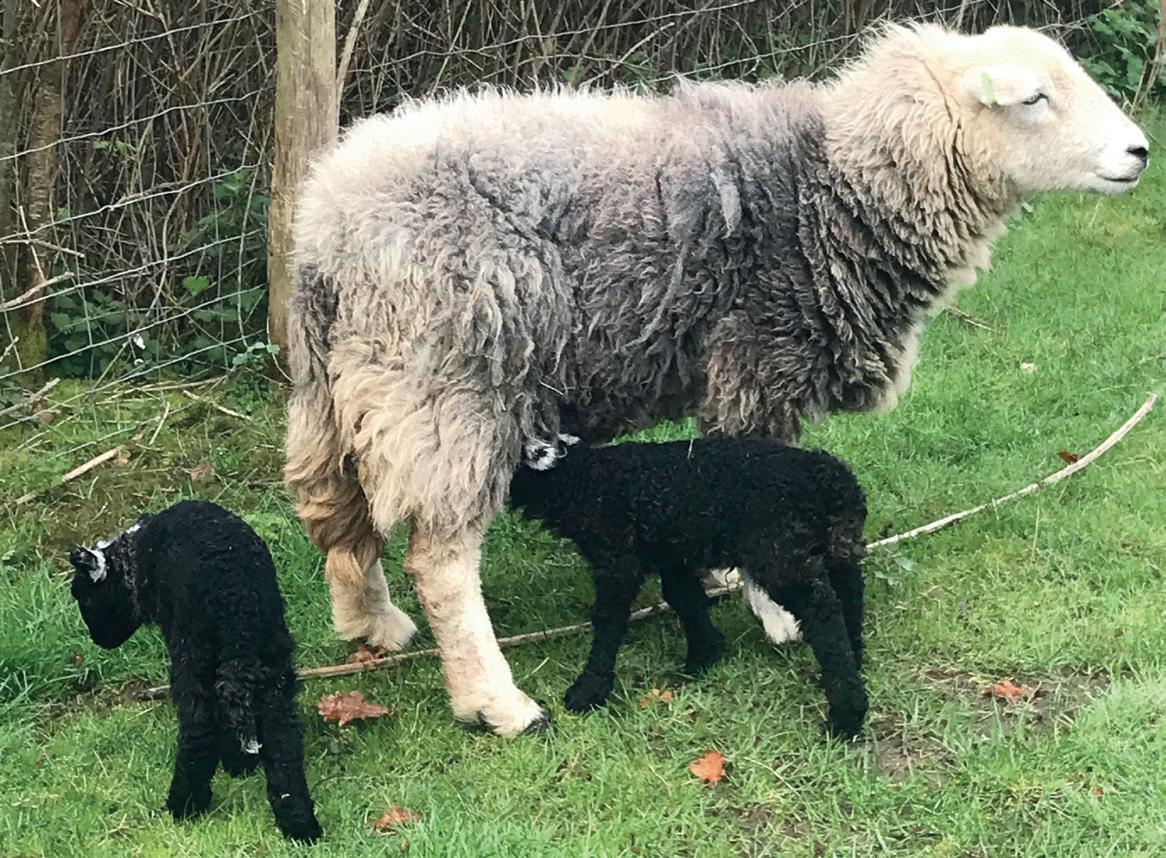
With the exception of four ewes that were stopped by a ram lamb who decided to jump the fence for one night of fun a week before the tups went in, the Lleyn provided us a further bonus with nice tight lambing. Our lambing proper began on 7 March (exactly 145 days from when the tups were joined) and the final ewe delivered on the 24th. This is one of the advantages of having a self-replacing flock, where precocious lambers have, for a number of years, been part of our criteria when selecting our replacements. Lambing can be tiring and stressful enough without it dragging on for two full cycles; our tups are now pulled out after 21 days, generally with zero empties. All things considered, with 200% born and 196% strong lambs tailed, tagged and turned out into the follow on paddock, I consider that we have had a reasonably good year, so far.
The weather, or to be more precise the consequences of the wet weather, did make things rather more difficult; stodging about with a couple of kilograms of mud adhering to your wellies can make life a little harder, although the sheep didn’t seem to mind too much, this in spite of the fact that some of the ewes were beginning to blend into the background as a result of muddy-hoofed lambs constantly jumping on and off their backs. Things did, once April arrived, dry out briefly, but we really need a few more warm, sunny days to get the grass really growing again; to date daily dry matter growth has barely
reached balance point where it equals, or hopefully exceeds, daily requirements. That said, with the grass currently available in front of them the ewes do seem to be milking well and lambs look to be shaping up nicely. Eight week weights should be quite interesting.
True to character the Herdwick have not been quite so cooperative and are taking their time, although, to be fair the older ewes have, once they started, got on with it and lambed well. True to form, though, just to make life a little more interesting the last of the tegs has decided to hang on; she has bagged up nicely and I’m sure will lamb when she is ready. I just hope she doesn’t hang on too much longer; it will be good to bring lambing to a conclusion. Needless to say the Herdy ram, who seems to live in his own little breeding world, does not come out at 21 days. He or the ewes are normally only just getting warmed up by then.
From various reports it would seem that, in general, producers have enjoyed reasonably good lambings; inevitably some have not been quite so fortunate, with tales of significant levels of lamb mortality suffered by some who have struggled, for various reasons, to keep mortality figures below what is a reasonable target of around 10%; which leads me quite nicely on to my next point.
Scrolling through Facebook (other social media platforms are available) a while ago I came across a post from what was obviously a novice sheep keeper, seeking advice on a “difficult lambing”. Quite simply, a ewe had delivered one lamb, a second was suspected but the ewe was taking her time; “what to do?”. Nothing notable, or is there? My first thought was to wonder what on earth (not quite so polite) this person was doing lambing sheep without any idea about how to deal with a relatively simple lambing problem. What was rather more alarming was the nature of many of the responses and advice offered. They were varied, but most were along the lines of “get in there and pull/rip/drag it out”. It wasn’t until some way down the list of responses that someone countenanced caution, advising that the ewe be given a
MAY 2023 | WWW.SOUTHEASTFARMER.NET 52 ALAN WEST SHEEP TOPICS
ANITA HEAD Farmer

A common phrase in farming is “once a farmer always a farmer”, and I have always found myself agreeing with this term, until recently.
On 31 March at 12.02hrs we received a text from our milk buyers informing us of a 5.3 pence per litre price drop with effect from 1 April. That is a little less than 12 hours’ notice of a life-changing price drop which has contributed to a 12.3 pence per litre price drop since Christmas.
As a farm we have worked for 10 mediocre years for nine months of good times only to have it snatched away from us with 12 hours’ notice. I know people are struggling with everyday life and with paying the bills, but so are farmers.
Angry, irritated, frustrated, livid, are all words that spring to mind. Why do we carry on? Is it just for the next generation? Would building bungalows be easier than slogging your heart out for 365 days a year? How can any farm function with that amount of volatility?
As a dairy farmer you automatically wake up to ensure the cows are already in the collecting
HOW WOULD LIFE BE WITHOUT COWS?
yard ready for milking; you automatically listen for the hum of the parlour in the early morning or late afternoon, or the pulsating of the clusters, feed rattling through the pipes into the parlour, the wash down hose, the tanker pulling down the drive and the ‘mooing’ of the cows. It’s second nature to ensure that everything is running smoothly.
The last thing you check before you go to bed and the first thing you check in the morning is the temperature of the bulk tank. Over the past few weeks, we have found ourselves imagining how life would be without cows, a thought that had never entered our heads before.
Friends describe it as an intense grieving period and loss in the first few weeks/months. Is this due to the relationship you have with the cows? Some of them will have been helped into the world by yourself and reared until they have reached the age that they can go into the parlour. Some will have been in the sick bay and been nurtured back to health, some will have undoubtedly had a life of luxury.
You know their quirks, their markings and even the last four digits of their tag number,
bit of time and, if the poster was particularly concerned, to simply, after washing hands and using plenty of lambing gel etc, carry out a basic check. Assess the situation and then make an informed decision based upon that assessment; a common sense approach.
It is a matter of considerable concern that both the question and most of the responses demonstrated an appalling level of ignorance and lack of any meaningful understanding, or concern, for the welfare of either the ewe or lambs, which does a great disservice to the sheep industry and to all those hard working and caring sheep keepers who strive daily to ensure that they do the correct thing for their sheep.
Of particular concern was the amazingly negative impression of both practices and attitudes within the sheep industry created by the comments posted on social media. The fact that these people felt it was appropriate to post such, in an open forum, available for all to see, undermines a lot of good work done by others at a time when the sheep sector needs all of the positive publicity it can get in order to promote the industry and encourage consumers to buy British lamb.
The very nature of the original question was such that it was immediately obvious that here was a person who thought it appropriate not only to acquire some sheep but to tup them and
knowing which cows love a head rub etc, etc.
Can we really sell up and move on? For a business to work it must be viable or even profitable. With the new regulations that are coming through, how can we make the required changes when the price per litre keeps going down and down. When will it end?
In my opinion, calving all year should be mandatory to stabilise the milk volume. Drying your cows off all at once is a blessing for the farmer but the financial hit the rest of the industry seems to suffer when the cows calve and reach maximum production must be taken into consideration.
The boys are now such an integral part of the team that any family time off has disintegrated at a rate of knots and with that comes the guilt of work, work, work and more work with very little time for them to play. We all lead an amazing life but it’s a way of life and when we are governed by the hierarchy it occasionally becomes hard to realise that you still own your own business.
“Once a farmer, always a farmer” The jury is still out at the moment.
Until next time stay safe and keep well.
attempt to lamb them without appearing to have any significant concern or understanding of what they were doing. They seemingly had so little regard for the sheep or their welfare that they didn’t consider it a good idea, as a novice sheep keeper, to undertake some basic training or gain some meaningful experience before they obtained any sheep, let alone attempted to lamb them.
In addition, the realisation that some of the comments posted in response were quite obviously from working shepherds and/ or sheep keepers raises significant questions about the shamefully poor levels of knowledge, understanding and consideration for basic sheep welfare of some working within the industry. I suspect (from Facebook profiles) that some are working within quite large flocks.
These are people who really do owe the majority of good sheep keepers out there a huge apology; many of these are, through lambing open days, chatting to the public etc, determined to present a positive image to help raise the profile of the sector for the benefit of all sheep producers. We really do have some amongst us who, whether out of ignorance or lack of consideration, appear to be well experienced in shooting the whole of the sheep sector in the foot; shame on them.
WWW.SOUTHEASTFARMER.NET | MAY 2023 53 TO ADVERTISE CALL 01303 233883
ORGANISED CHAOS ANITA HEAD
USING METABOLIC PROFILING TO OPTIMISE PERFORMANCE
With margins becoming tighter, farmers need to look to ways of improving efficiency wherever possible. Metabolic profiling can be an incredibly useful tool to assess the nutritional status of tue herd; it allows the fine-tuning of rations to optimise the health status of the animals. By metabolic profiling, we are basically asking the cows what they think of the diet they are being fed; a much better indicator than looking at any rationing software programme.
WHY TEST?
Metabolic profiling provides the earliest indication of the effects of a new diet. It has become more commonplace in the dairy industry, but remains underused in the beef industry. Nutrition plays such a vital role in both dairy and beef sectors, and the speed of detecting and correcting nutritional problems can have a considerable economic impact.
• Maximising calf output
– Reduced calving intervals through improved fertility

– Increased colostrum and milk production to improve calf growth.
• Managing the transition period
– Increased milk yield per cow per year
– Improved milk quality.
WHAT ARE WE LOOKING FOR?
To assess the energy balance of cows, we are looking at the levels of betahydroxybutyrate (BHB), non-esterified fatty acids (NEFAs) and glucose. For protein status, urea nitrogen, total protein and albumin are measured.
WHO DO WE TEST?
It involves blood testing animals at various stages of production:
• Dairy: pre-calving, post-calving and mid-lactation (60-100 days)
• Beef: pre- and post-calving.
Cows must have had at least two weeks to adapt to any ration changes before blood sampling for the results to reflect the new ration. For accurate interpretation of the results, extra information about the ration and individual animals is required. This includes the ration formulation and forage analysis and, from the individual cow, the calving date, body weight and body condition score.
INTERPRETING YOUR RESULTS
Energy levels in the diet are the most important factor influencing the
performance of your cattle. By blood sampling at the critical times (late pregnancy and early lactation), we can detect energy problems when cows are entering negative energy balance. It can also show the level of available energy from the forage and allows the farmer to make economic adjustments to include concentrates to meet the requirement demands.
Protein levels in the body can be used as indicators for disease around the transition period. Cows which are short of protein can have an increased susceptibility to disease. Low protein levels can lead to reduced quality of colostrum and milk, having a further knock-on effect for calves and into lactation.
It is worth remembering that the results can also highlight overfeeding, especially of protein, which is both inefficient and costly.
In recent years, metabolic profiling has become much more economically viable in assessing rations and improving the health status of dairy and beef cattle. It’s a quick and cost-effective tool where alterations and any additions to the feeding system can be based on actual information, rather than making assumptions and guesses.
MAY 2023 | WWW.SOUTHEASTFARMER.NET 54 ADVICE FROM THE VET
Westpoint Horsham T: 01306 628086 Westpoint Ashford T: 01306 628208 Westpoint Sevenoaks T: 01959 564383 Westpoint Winchester T: 01962 779593 Westpoint Chelmsford T: 01306 628489 If you would like to discuss anything covered in this article contact your local Westpoint practice E: info@westpointfarmvets.co.uk www.westpointfarmvets.co.uk
At last there is some warmth in the sun and spring drilling has restarted. It has been a grim start to lambing and calving this year, with the March lambers short on both shed space and grass in the fields. At Cliffe Farm Vets we have had a much busier March and April than usual, with an increase in obstetrical emergencies this year. Of note, too, has been the explosion in suckled calf scours that we have seen, with 13 herds experiencing outbreaks of calf scours of varying severity.
In neonatal calves there are a few common causes of scours, the most common of which are not bacterial in origin, meaning antibiotics are rarely indicated. Most, if not all, outbreaks we have dealt with this spring have been caused by viruses (rotavirus and coronavirus), or protozoa (cryptosporidiosis and coccidiosis). These bugs are commonly found on most farms, and it can be a delicate balancing act to ensure that the challenge does not outweigh the calves’ immunity. Anything you can do to prevent scours will save time, money and a lot of frustration.
Even mild cases of scour will have significant knock-on effect in terms of calf performance, growth rates and susceptibility to other diseases e.g. pneumonia. Direct costs of treatment – drenching with electrolytes, anti-inflammatories, nursing etc – can be high, particularly if treatment requires our involvement. We have saved several very sick calves this spring by implementing intravenous fluid therapy to address dehydration and acidosis, but it can be labour intensive getting these calves better.
As the adage goes, prevention is better than cure, and calf scours is no exception. So, what can we do to tip the balance in favour of the calf over the bugs?

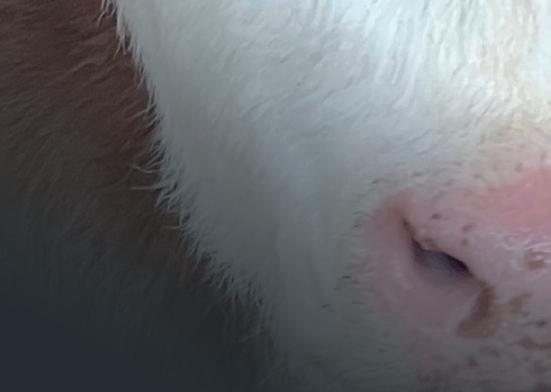
Broadly speaking prevention falls into two categories, optimising nutrition and immunity and reducing environmental challenge, but it is important to focus on the particular risk
areas on your farm. As well as the nutritional and environmental risks, there are some well-documented management risk factors, like introducing new animals into the herd at calving, managing/ feeding cows and heifers as one group and having an extended calving period.
Some areas to consider to optimise calf immunity are:

• Achieving and maintaining good herd health status with respect to BVD and Johnes

• Accurate pre-calving protein and energy nutrition for cows and heifers


• Minimising calving difficulties, looking at body condition of cows and bull selection
• Ensuring the first feed is within two hours of birth
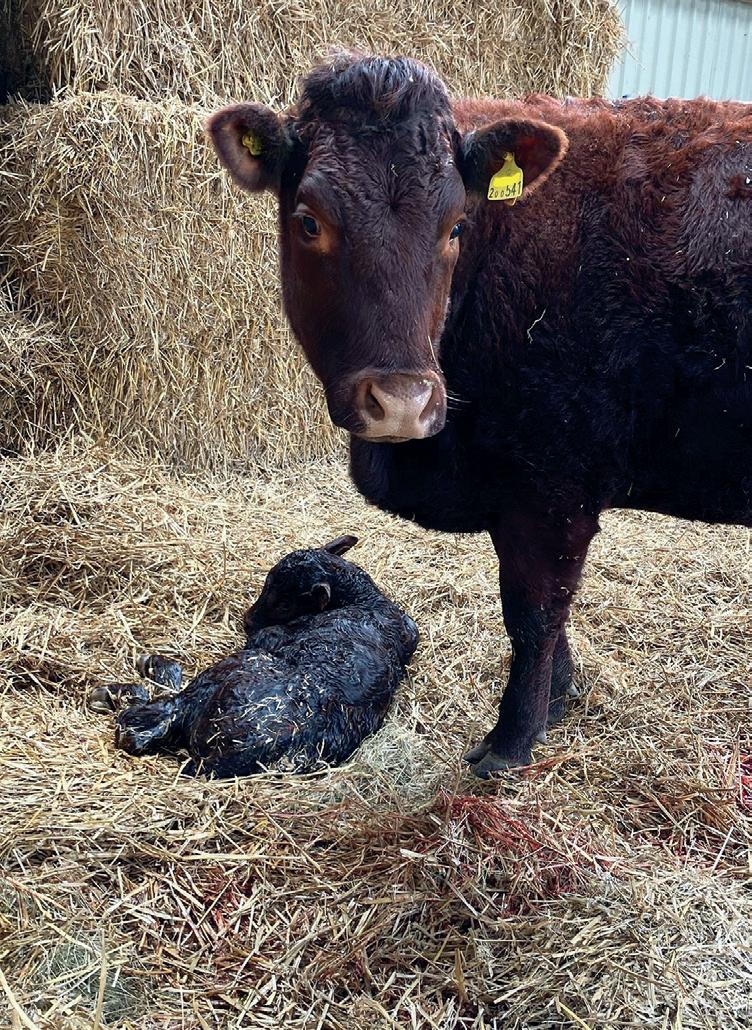
• Vaccinating the dams before calving to boost antibodies. Aim to reduce exposure to the pathogens by:
• Ensuring a clean calving environment, using a disinfectant that will kill oocysts



• Separating calved cows and calves from the pre-calving group
• Targeting a tight calving pattern so calves are of a similar age –focussing on cow and bull fertility

• Grouping calves according to age if in a prolonged calving pattern.
It is important to keep a good record of incidence of scours as well as other diseases, so that patterns can be spotted at your postcalving record review.

www.cliffefarm.co.uk


WWW.SOUTHEASTFARMER.NET | MAY 2023 55 TO ADVERTISE CALL 01303 233883 VET DIARY
NICK PILE Cliffe Veterinary Group T: 01273 473232 E: nick.pile@cliffevets.co.uk
INCREASE IN SUCKLER CALF DISEASE
KIWIKITROXAN.CO.UK LOOKING FOR A NEW TAG SUPPLIER? JOHN SYMONDS 07766 221 011 S/SW England & E Anglia Need some advice, or help ordering your tags? Give John a call! Prefer ordering online? Visit our online store, where you can order tags and much more! john.symonds @datamars.com
your
Meet John Symonds,
local
KiwiKit Roxan Representative.
PROMISES AND EXCUSES
After a spring that ‘promised’ early, the season took a long time coming, both on the farms and in the garden.
Cereal crops sown last autumn have generally looked good since emergence and presently promise well. This is more impressive given that many have used mainly organic rather than compound fertiliser, but one imagines there is a limit to the amount of organic digestate available. There are, certainly, increasing quantities of the stuff from the large AD plants, but the knock-on problem could be the cost of spreading equipment which, from what I have seen, will put pressure on farm budgets and, indeed, contractors, as well as on access to fields, given the size of many farm gates. As we had cows until six years ago, we still have several 10ft gates, mainly left for security.
I now return to a subject which, I am aware, splits views, perhaps depending on where and on what land farmers farm. I refer to the state of our rivers, ditches, and inevitably, the condition of the adjoining land.

We are holding a meeting with a group of neighbours to have a face-to-face meeting with the bodies mainly responsible for these problems, the Environment Agency and Southern Water. We are also including the local council, whose involvement is somewhat secondary, and will consist of farmers and landowners plus our local MP Nick Gibb. The main difference is that it will be chaired by William White, the regional director of the NFU South East who, we hope, will add a lot more clout than we have as a small group of farmers.
Our problem is the amount of once good arable land rendered useless for cropping due to various degrees of flooding, estimated to cover at least 400 acres in our adjoining parishes. The main cause is the lack of






waterway maintenance since the mid 1990s, which restricts flow to the sea for weeks on end, coupled with the discharge of raw untreated sewage from a local sewage works which is pushed back upstream in flood conditions and covers fields and leisure facilities, like a popular golf course, with a film of slime, which is, basically s***.
These two parties, particularly the EA, are to blame but are inclined to blame everyone else, while not accepting any responsibility themselves. They blame each other, they blame farmers, they blame landowners and householders for failing to maintain their own frontages. Or else it’s “the local conditions” or “inadequate government funding”. Never their own shortcomings.
What they ignore is that without clearance and maintenance of the rifes, the only outlet into the English Channel is one small, clogged up, tidal outfall to the Channel near Bognor. An outfall from some five major converged rifes/rivers which drain some 6,000 to 7,000 acres and far more new houses than this tiny single outfall was hand dug to cope with back in the 1400s and 1500s. Yet when any of these points are mentioned, it appears the only thing the EA seems able to imply is that “the water is best left to flood the (once top grade) farmland rather than the nearby town and houses”.
The meeting will be interesting. It would be exaggerating to say we expect it to reach a satisfactory conclusion, because we have run these meetings now for some four years and nothing has improved. Promises, excuses, but


still the area suffers serious flooding of this potentially very productive land, land that will grow four tons of wheat an acre. Our land is now rendered virtually worthless, through no fault of our own.
As for the golfers who struggle around the course (when it’s fit enough to play at all) the important thing for them to remember is written on the clubhouse noticeboards: “Please beware, don’t lick your (golf) ball on the green.” It is a disgusting situation to have to live with, and yet as a ‘wartime baby’ I remember in my earlier years when the rifes were cleaned out properly every year or so by the various competent authorities so they flowed well, with plenty of wildlife including little grebe, coots galore and even trout for a number of years, imported by local fishermen/farmers.
Now one hardly sees a heron there because there is nothing to catch in the water. Back then there was a full balance of creatures and farmland that would grow those excellent crops of wheat. Now there is nothing of any real value, except a golf course where even ‘licking your balls’ is a mighty risk.
This has rather occupied minds, but the farms still need much effort. The maize on the home farm has been growing well despite varied conditions. It is now dependent on liquid digestate, some ploughed in and some trickled in and slit seeded, so it’s going to be interesting to see how the two compare.
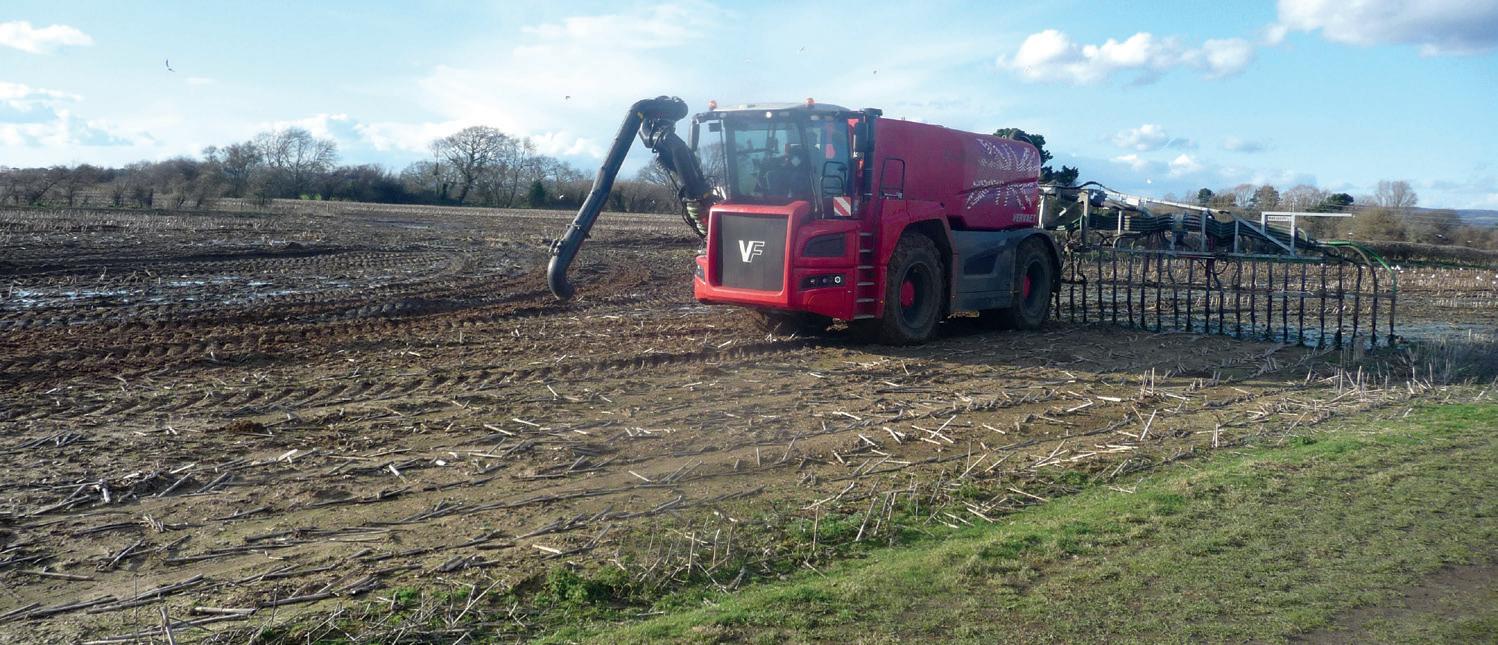
On the hill farm the vineyard appears to be establishing well, with the second harvest now due in some four months and looking promising. The tenant has installed a complete winery, press, bottling and storage plant in what, until five years ago was a store for some 1,000 bales of bedding straw for cows and young stock.
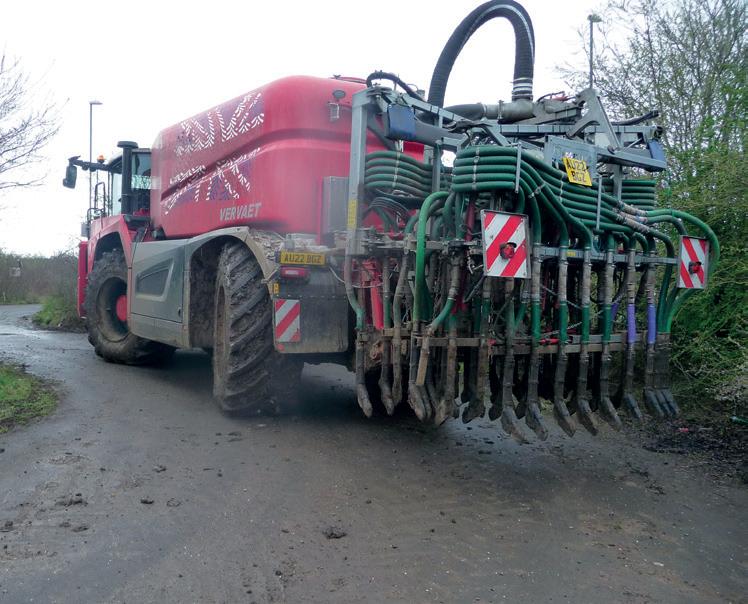
MAY 2023 | WWW.SOUTHEASTFARMER.NET 56 NICK ADAMES WEST SUSSEX DIARY
Leaving the farm through a twelve-foot gate
Dutch four-wheel steer Vervaet Quad with 24m boom working in April on last year’s maize stubble. Trickling it rather than injecting it and ploughed in straight behind
NICK ADAMES
Former dairy farmer
Aside from 2019, when Septoria hit some wheats late in the season, 2014 was the last time there was widespread high Septoria pressure. In recent seasons, yellow rust has often grabbed more headlines.
Who knows what the weather will do over the coming weeks, but if conditions favour high Septoria pressure, control could be far more challenging than in 2014. The pathogen is evolving and adapting to environmental conditions continuously, with new, more vigorous isolates able to spread and infect crops far quicker.

If disease is present on lower leaves, do not assume it will go away; cold often slows disease, but only prolonged periods of low temperatures will reduce inoculum significantly.
MANAGING RISKS
Septoria is the focus of T2 flag leaf fungicides, although yellow rust, and later-developing brown rust, should also be factored into programmes.
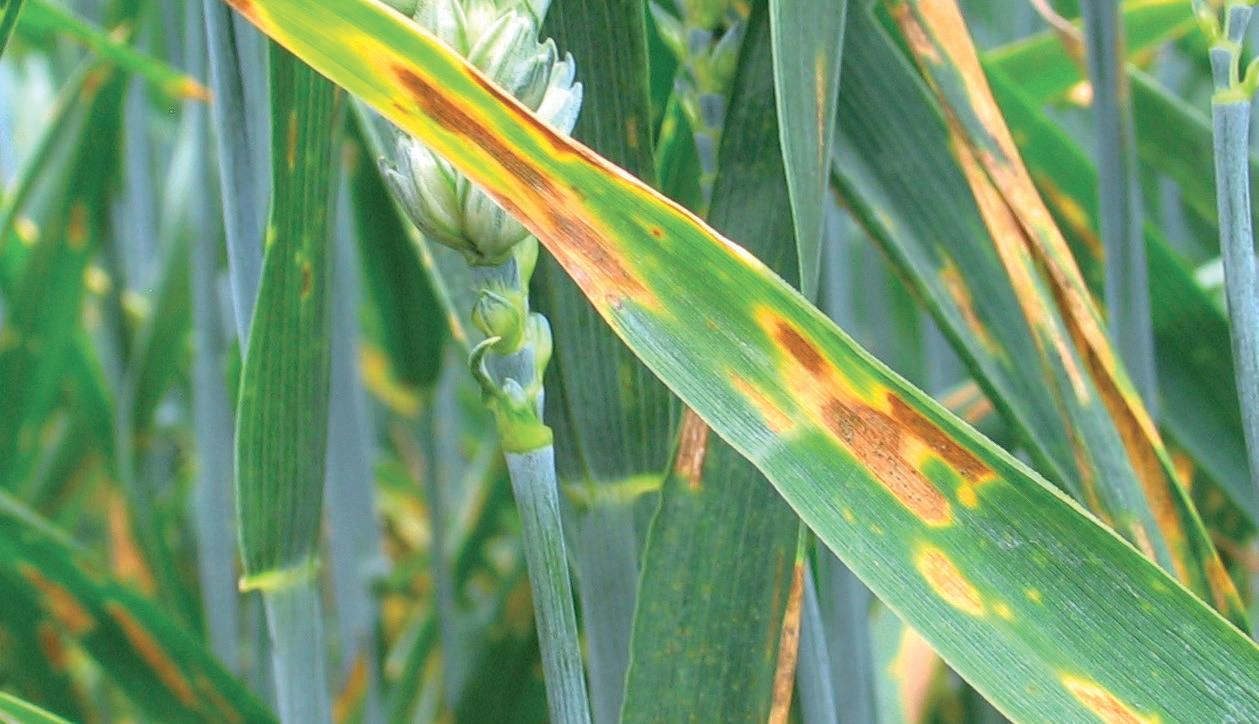
The T2 protects the main two lightcollecting leaves, responsible for 65% to 70% of total yield. A good product and robust dose is needed to protect crops through the back end of the season, when the bulk of yield building occurs.
Curative action is needed, too. Because the T1 is applied to leaf 3, it is unlikely to cover much of leaf 2 (unless applied very late), so leaf 2 could have been exposed to disease for some time. If disease pressure is high, with plenty of inoculum in crops, good curative action is essential – either from highly potent products or higher doses of less potent products.
Generally, the strongest curative options are fluxapyroxad + mefentrifluconazole or fenpicoxamid + prothioconazole so these will be the go-to choices in anything other than a low-risk situation. Both offer similar Septoria control, so deciding between the two may come down to other factors – e.g mefentrifluconazole is slightly better on brown rust while fenpicoxamid has an edge against yellow rust.
Including the multisite folpet can
be worthwhile for extending Septoria protection in high pressure situations and for resistance management.
Of the older chemistry, AHDB fungicide performance work shows a notable drop in the efficacy of some SDHIs that were once the mainstay of T2 programmes. Growers need to be aware of the changes when choosing products, especially if curativity is needed.
There is still a place for products based on actives such as bixafen, fluopyram + prothioconazole, or other bixafen, fluopyram mixtures, which have shown higher activity than other SDHIs in Hutchinsons trials. But if Septoria pressure becomes significant, higher rates will be required.
If rust is the focus, rather than curative Septoria control, many products, such as benzovindiflupyr + prothioconazole, offer good efficacy and may deliver some Septoria protection too.
TIME IT RIGHT
Ideally the T2 should be applied at GS 39, once flag leaves on main tillers are fully emerged. However, there can be big practical challenges to this, especially when treating large areas, and/or when disease pressure is high.
Varieties can also differ significantly in the time taken for flag leaves to emerge. BASF trials show the time between the first and last flag leaf emerging within a plot of an individual variety can vary from typically 10 to 14 days in some varieties, up to 25 days in others. For anyone growing the latter, waiting that long for 100% of flag leaves to emerge could present real problems in a high disease pressure situation, raising difficult questions about optimum spray timing.
Crop stress, drilling date, nutrition, crop evenness, and other factors also affect flag leaf emergence, so all you can do is go for the majority, at a time when you can get around everything.
WWW.SOUTHEASTFARMER.NET | MAY 2023 57 TO ADVERTISE CALL 01303 233883 T2’S MUST RECOGNISE SEPTORIA’S EVOLUTION AGRONOMY DAVID SHEPARD T: 07920 097369 E: David.shepard@hlhltd.co.uk Canterbury: 01227 830064 www.hlhltd.co.uk
It is almost a decade since the last really bad Septoria season, and much has changed in that time. David Shepard, Hutchinsons agronomist based at Canterbury, examines how this might influence the crucial T2 spray this spring.
Septoria tritici
ELVED PHILLIPS ARABLE NOTES

In the past month there’s been a lot of politics but very little new grain business transacted. The ‘safe corridor’ for Ukrainian grain exports was duly extended and now the next deadline of 19 May looms. This will cause more market volatility as it approaches, but it’s no longer the game changer it was in June and November last year. Ukraine does not have much left to export anyway. Russia will, however, use this for political brinkmanship. They will re-iterate their demands that trade and financial sanctions imposed by the west are lifted or they will close the corridor. Of course, neither of those things will happen.
A much bigger political upset was caused by Ukraine’s western neighbours Bulgaria, Hungary, Romania, Slovakia and Poland all wishing now to ban imports from Ukraine as they are causing their internal grain markets to fall further in value. Most of these countries have plenty of stocks and really don’t want any more. Well, so much for the united front of the EU in supporting Ukraine; this must be music to President Putin’s ears! The EU is finding some money to partially compensate farmers in these member states, but I doubt it will prevent farmers blockading Ukrainian imports at their borders.
The next bit of politics to have an adverse




SELL IN MAY THEN GO AWAY
effect is a long way from Ukraine, in Australia and China. It’s not certain, but it looks like China is going to lift the import tariff sanctions they placed on Australian barley back in 2020. France has been the main beneficiary of this, with a lot of big Panamax boats of French feed and malting barley being shipped to China. Just the strong rumour of this rapprochement caused French barley to fall 20 euros per tonne, especially around the big ports like Rouen. While the UK could not directly take part in the Chinese trade, as we don’t have the protocols, the knock-on effect of a strong French barley export trade has helped the UK, especially with malting barley export markets.
The next huge, non-fundamental factor has been the hedge funds. There are not many of them, but they certainly trade a lot of futures on paper. At the last count there were countless millions of wheat contracts sold short, mostly on the America Chicago futures. In some cases they have traded more than the actual tonnage that the wheat crop produced! But you must give them credit because whether or not their constant selling down of the futures created a self-fulfilling prophecy, they have got the market right. Of course, we won’t know what other commodities they had been buying as a hedge, but on paper their short selling has made them a lot of money.
Coming closer to home, all this speculation has really blown the age-old relationship between futures and cash or physical prices. Take our old crop May futures position. It was hammered again in mid-April down to £190 as long holders got out of expensive purchases before physical tenders arrive. But that was anything from £14 to £19 below
the November 2023 futures price. Well one of them is wrong! Either the old crop is too cheap or the new crop too dear. They usually reach parity before harvest, so will old crop go up, or new crop come down? Some futures store operators may well be selling the November rather than taking the low May value and rolling their wheat forward. That’s not as straightforward as it sounds, but a farmer who is a long holder of old crop may well consider it’s worth the risk of leaving it in store. Normally if you do that the new crop price should be sold now, in case when the prices do come together the new crop has fallen to the old value.
It is confusing that most exporting countries seem to be discovering more stocks of old crop than they thought they had. This is often coupled with others reducing export demand as well, so it’s little wonder prices have fallen. Our own crops look good. Yes, there have been growing issues around the world, but the only real residual one which will affect us is Spain, where by mid-April there had been little rain since January.
So, as I said, lots of politics and very little trade. I asked many editions ago: “What is the real price of UK wheat?” I said then it could be £200. Well, if it is then the forward new crop price reflects that value. Being weaned off the heady values of the past 18 months is difficult, but maybe you need to make that first line in the sand. My view remains that the current old crop futuresrelated value is not the real price of wheat, so I would not sell until the May futures are off the board. But, in case I am wrong, the stock exchange adage of “sell in May then go away” may apply to new crop.
ELVED PHILLIPS Openfield MAY 2023 | WWW.SOUTHEASTFARMER.NET 58
GRAIN STORAGE FERTILISER SEED T: 01264 321 595 www.openfield.co.uk
WOULD I ALSO MAKE BEANS CHEAP?
My great-grandfather predicted that he was “going to make beans cheap” and he succeeded. In those days, the crop had a reputation for being highly volatile in price, depending on the season. If there were a shortage of beans one year, the price would skyrocket, encouraging lots of farmers to grow beans the following season. This, then, created a glut that collapsed the price, meaning that few farmers bothered to plant the crop the following year and so the price volatility would continue.
Thus it was with great trepidation that I planted beans in the spring of 2022. Would I also make beans cheap? The answer, at first, appeared to be “no”. Although I harvested a bumper crop in September 2022, the price remained high.
Indeed, by Christmas, my grain merchant was casually throwing figures of £300/tonne around for my beans if only buyers could find transport to get my beans to where they would be consumed by the vast numbers of pigs and chicken nowadays farmed in the Eastern Counties.
Of course, what caused the price of beans, and most other combinable crops, to rise consistently throughout 2022 was Vladimir Putin’s brutal invasion of Ukraine. His closure of that country’s Black Sea ports denied the world access to Ukraine’s huge annual exports of grain, oilseeds and pulses.


What I did not anticipate, however, was that the EU would (in a laudable spirit of generosity) open its doors to Ukraine’s combinable crops surpluses and thus crash arable commodity prices across the continent, including in the UK.
As soon as I realised what was happening, I phoned my grain merchant in a panic and tried to sell my beans, only to be told that the price had collapsed to £215/tonne. Furious with myself for not having been more pro-active in selling them earlier, I nonetheless agreed to sell them before prices fell any further.
Perhaps this disaster was always going to happen, given my greatgrandfather’s experience with the crop. The causes of the collapse in bean prices in 2023 have been very different to the causes of price volatility in the crop in 1890 but perhaps I am genetically programmed to sell beans at a miserably low price.
My fears on this front have only been heightened in recent days by the news that Poland and Hungary have ignored the EU and unilaterally banned Ukrainian food imports, such has been the catastrophic impact on their farmers. I guess it’s now likely that their actions will reverse the recent drop in arable commodity prices, including beans.
But my beans are now sold, so all I can do now is take comfort in feeling a deep affinity with my beloved great-grandfather. Nearly 150 years apart we both made beans cheap.
• Ultimate Soil Scanning – High definition in-field scanning of major field properties including pH, Organic Matter, Electrical Conductivity and Topography
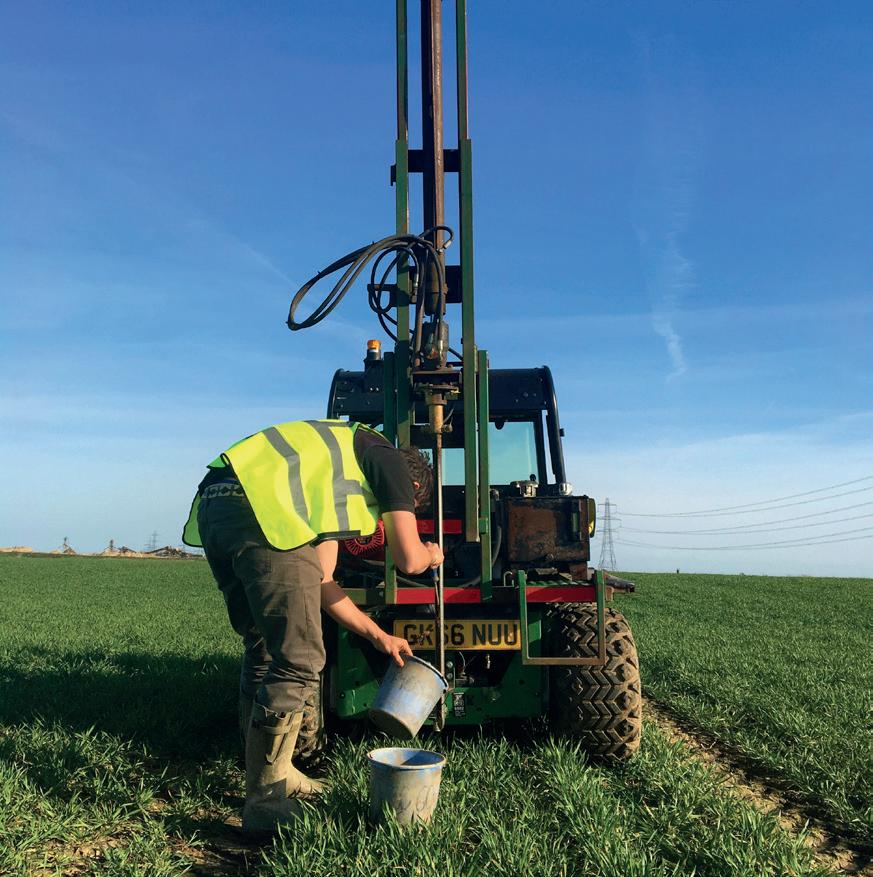
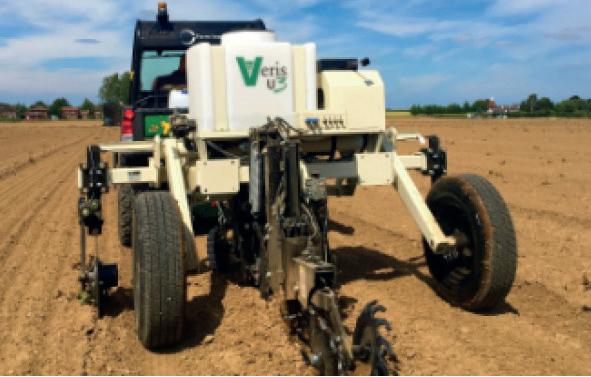
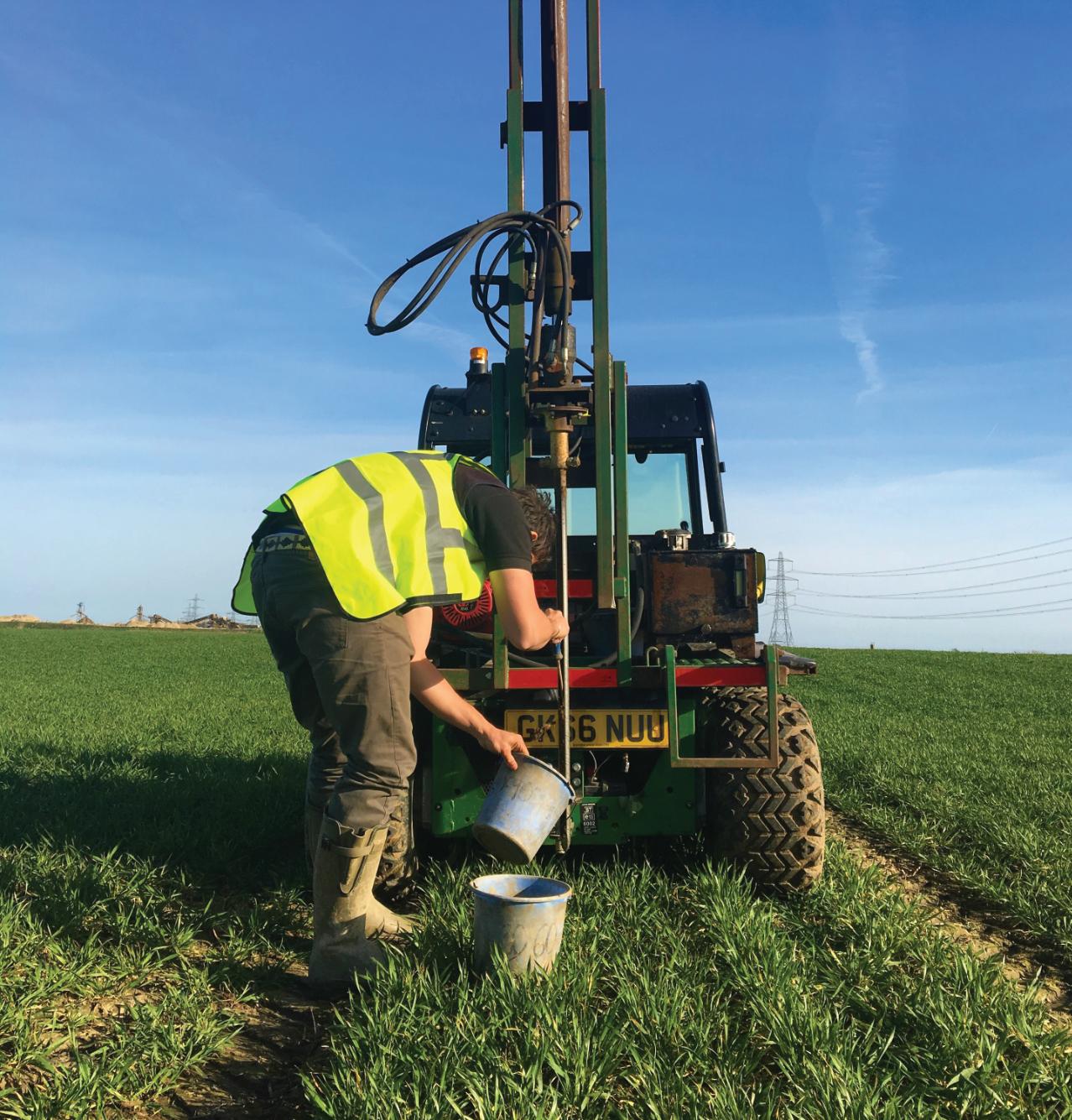


• Precision Soil Sampling and Mapping
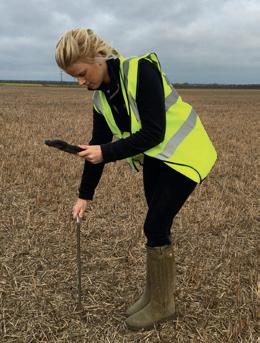
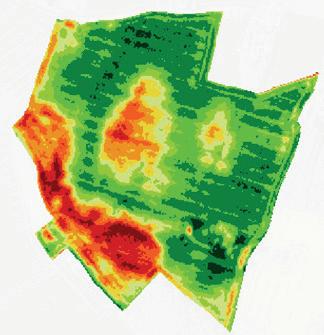
• Biomass Imagery

• Standard Soil Sampling – P, K, Mg and pH
• Potato/Pea Cyst Nematode Analysis (PCN)
• Deep Core Nitrogen Sampling
• Manure, Slurry and Product Analysis




• Lime supply and variable rate application
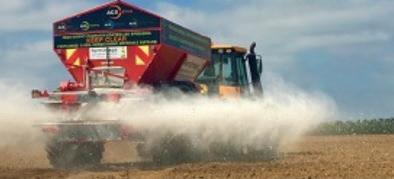 STEPHEN CARR
STEPHEN CARR
WWW.SOUTHEASTFARMER.NET | MAY 2023 59 TO ADVERTISE CALL 01303 233883 STEPHEN CARR
Arable farmer
productssupplied, andspreadtoyourfarm. Offering20years’experience insoil servicestailoredforyouand yourbusiness Soilsmartsampling,GPSprecision, Verissoilscanning,NCore,Ph,PCN 01233 740247 enquiries@farmimage.co.uk www.farmimage.co.uk
VIN E YAR D
A FINE EDUCATION

Courtesy of our sister publication Vineyard Magazine we are pleased to bring you a behind-thescenes look at the life of a student studying viticulture and wine making at Plumpton College.

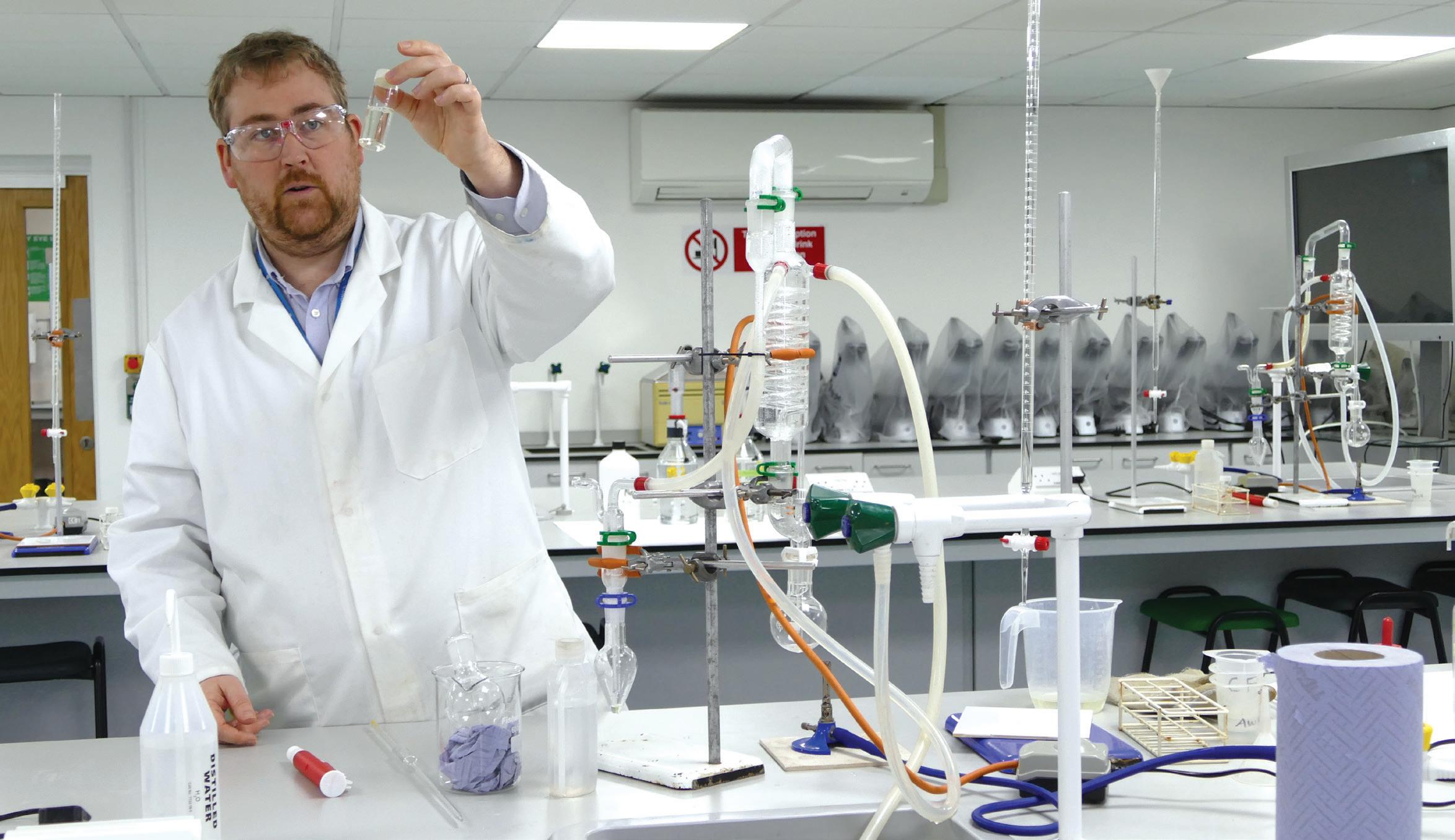
It is a fact that many reading this article will be well acquainted with courses at Plumpton College, but like all things relating to wines and vines the wine division at Plumpton is determined to develop and grow. In vineyards the world over, each year there is a concerted effort to implement new procedures, techniques and technology in an attempt to improve quality, and in wineries the same can be said of the winemakers who each year seek to produce outstanding wines. It is an industry driven by self improvement and it is fitting that Plumpton College, the leading UK educational facility for wine, is following this same model.

It is usually good to start a report at the beginning, but in this instance, it was during a summary at the end of the visit that Dr Gregg Dunn, head of the wine division at Plumpton College, put into words the way in which the wine division at Plumpton is developing. “This country produces about 12 million bottles of wine a year and will max out at about 40 million bottles,” explained Dr Dunn. To contextualise this figure Australia (not the largest producer of wine in the world) makes 1.5 billion. The Australian wine industry only “supports 2.5 wine schools,” so it is important to train people from overseas and also train people not just for the UK industry but the international industry. “Plumpton is an internationally recognised
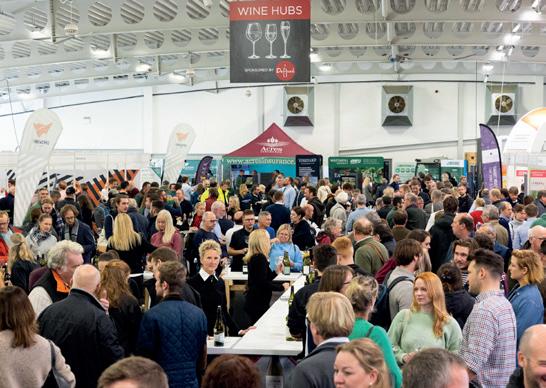
MAY 2023 | WWW.SOUTHEASTFARMER.NET 60 NEWS FROM THE VINEYARD
™ For Growers & Winemakers in Great Britain
In association with Thinking of ge ing into viticulture? Register to attend this year's show on 22 November 2023: www.vineyardshow.com 2023 Sponsored by Vitifruit Equipment Sales and Hire
James Clapham
provider of education and training in viticulture, oenology and wine business,” explained by Dr Dunn.
Plumpton offers students a unique opportunity. Not only do students have the ability to accumulate knowledge of both the vineyard and the science of winemaking, mixing theory and practical skills, but Plumpton is the only teaching college in the world that also has a commercial winery on site. A unique aspect to the education offered at Plumpton was mentioned by Dr Dunn. “The courses are offered in English in an English speaking country,” which gives international students the ability to learn or improve their English language skills at the same time as developing their knowledge of their chosen subject. Proximity to old world wine areas is also a positive for the college and details of student visits to Europe are often covered in Vineyard magazine. A trip to Vinitech in Bordeaux was featured in the January 2023 edition. It was a recurring theme throughout the visit to Plumpton that there are major benefits for the students through the proximity to London that the college enjoys. Not only does this provide students with the ability to attend the many trade tastings that happen throughout the year but there are other benefits too. The historical significance of London as an international centre of the wine trade dates back many centuries, with The Vintners’ Company's first Royal Charter dating to 1363. Dr Dunn also pointed to London as the origin of the Institute of Masters of Wine. From the perspective of wine production, England and Wales are considered new areas and according to recently published figures by WineGB the number of hectares under vine increased 70% in the years 2017-2021, but this relative youth in terms of production has happened in tandem with a long connection to the trade itself.

This complex relationship and the diversity surrounding wine is reflected in the varied courses offered by the Wine Division at Plumpton, which cater to many aspects of the industry, ensuring a fresh influx of skills with each new year. Currently there are 130 Higher Education students across three main courses at Plumpton. Students applying for the MSc in Viticulture and Oenology are required to have a background in science but are not necessarily required to have taken the BSc course that is offered at Plumpton.
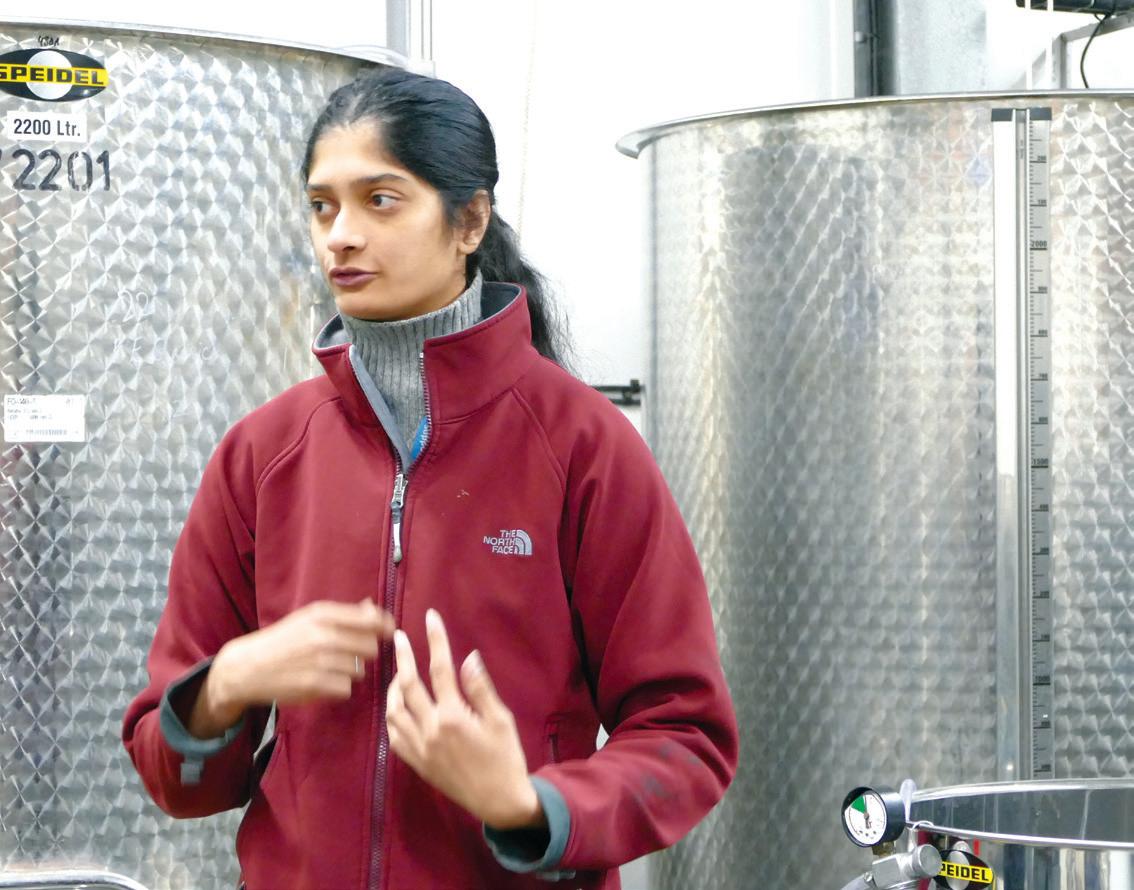

In the laboratory, James Clapham, laboratory manager, had set up a basic experiment to highlight how the amount of SO2 in a wine is measured. Since SO2 is fundamental to protect wine from spoilage it is a highly valuable tool for the winemaker, but James explained that “SO2 sits differently for each wine,” so understanding the chemistry is a fundamental element of the final wine. “The BSc degree offers deep understanding of how wine making actually works,” said James. This knowledge allows students “the possibility of trying something new or having the ability to fix problems should they arise,” he continued. It is clear from the simple lesson James had prepared for the journalists present that he enjoys his teaching job. “Most people who teach to degree level have their own area of interest,” James explained, and he is currently working towards his PhD, thus continuing to prove that this is an industry striving for improvement at all levels.
Outside the laboratory, teaching also takes place in a classroom with custom-designed individual booths with taps and sinks. Each of these booths is sponsored by various industry players including retailers such as Waitrose and the Co-operative along with wine associations from around the globe. Joining a lecture by Dr Akshay Baboo afforded a brief look into the principles that will enhance the students’ lifelong knowledge. <<

WWW.SOUTHEASTFARMER.NET | MAY 2023 61 TO ADVERTISE CALL 01303 233883 AS FEATURED IN MAGAZINE VIN E YAR D For Growers & Winemakers in Great Britain
Paul Harley
Deepika Koushik
Dr Akshay Baboo
<< “Think about your grapes year on year,” said Dr Baboo.
Although he is the programme manager and lecturer for the BSc, Dr Akshay Baboo also spent six years as a winemaker. “First and foremost I am a winemaker and I don’t want to add things I don’t need to,” he told his students; yet another reminder of the rounded education that is available to students at Plumpton Wine Division.
During the first year of the BSc in Viticulture and Oenology, students spend one day a week in the vineyard. There are two parcels of vines at Plumpton. Students experience the whole cycle of the vineyard and are provided with hands on experience working with different clones and also different training methods such as cordon training on Pinot Noir.
Spraying, pruning and tying down are all part of the students' work in the vineyard and working in pairs they are allocated a certain number of rows to oversee. The 1.6 hectares of vines are still run as a commercial vineyard and so when it comes to harvest students are paid to come in and help gather the grapes.
Tom Newham is the vineyard instructor and he spoke alongside some of the vineyard students about the benefits of studying the BSc at Plumpton. It is necessary for students wishing to work internationally to be trained to degree level but alongside the obvious gaining of knowledge and a qualification it became clear that students at Plumpton learn from each other, with some of those on the course already having significant experience including being part of multiple vintages. Alongside this peer transfer of knowledge, studying at Plumpton is an excellent way to connect with others in the industry.
The BSc is not the only route for people to train for a career in viticulture. Charles Negus, the viticulture apprenticeships programme manager, explained that the apprenticeship offers the opportunity for career progression.

There is the opportunity to achieve “hands on training that is not necessarily available in a commercial setting,” said Charles. This could be because there is not enough time in a commercial setting and the apprenticeship scheme allows people to upskill. At 26 years of age, Charles has often found himself to be the youngest person in the classroom as the age demographic for the apprenticeship is generally between 17 and 50. He is quick to declare that he has found “British agricultural workers to be motivated and quick,” and the retention rate for the apprenticeship is a remarkable 95%.
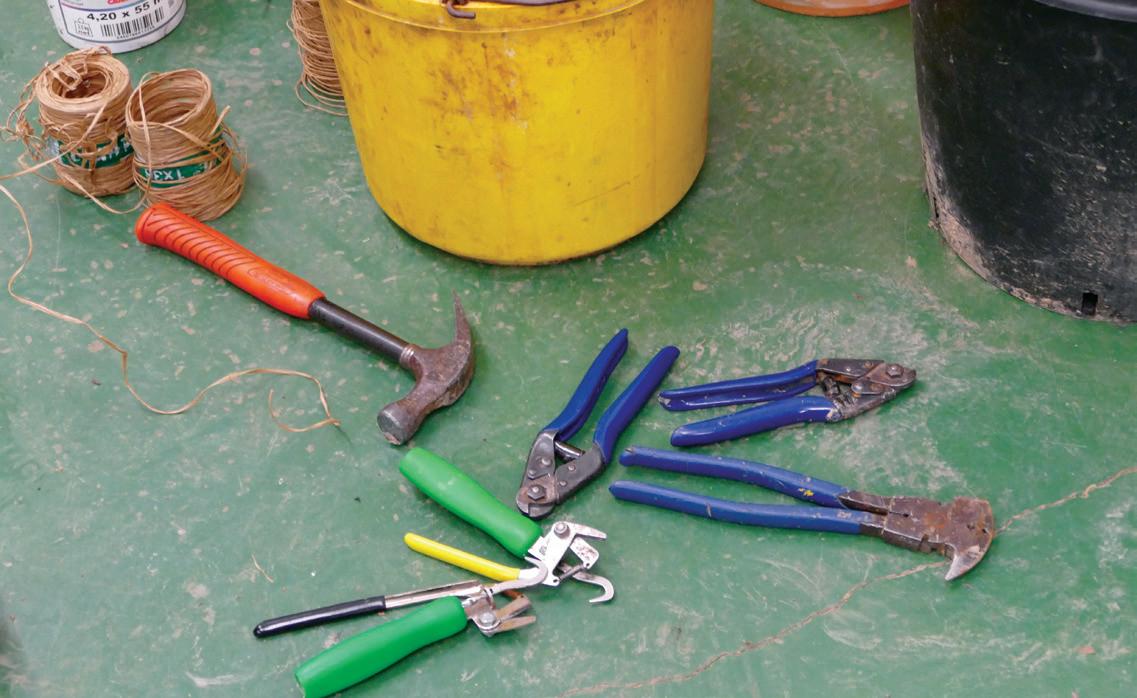
During the day we met students with different objectives, some were studying in order to improve their own vineyard while others were expanding their options having already achieved a high level of knowledge through working many vintages in big commercial operations. Students from a range of different countries including Sweden, Latvia and Denmark work together in these cool climate vineyards and will disperse all over the world, taking different ideas with them, but it seems that the connections that are made between students at Plumpton last, in some cases, for a lifetime. Plumpton alumni in the wine industry automatically have a point of reference even if they now work in different countries or even on different continents.
Tom Newham spoke about the varieties that are planted at Plumpton, including the slightly unusual Acalon, a Red Vitis Vinifera grape, but it was interesting to note that there is a student-led idea of planting more PIWI varieties.
What really shone through at Plumpton was the students' influence over their own learning experience. This continues in the winery, where Deepika Koushik is the winemaker. As an example, a sweet Ortega wine was suggested by the students and presented as an idea. That wine is now part of the library of
wines that Plumpton has produced. There is also a sparkling red that is part of this library. “The second-year students are required to spend a minimum of three hours a week in the winery,” explained Deepika. Bottling is an example of how the students are prepared for various situations they may face. “Sometimes we bottle in house and sometimes we use a bottling truck,” Deepika said. Students get to experience the thousands of bottles per hour but also the “600 bottles a day” from very small-scale in-house bottling from cork and screw cap through to labelling and boxing. Plumpton students get to experience the whole production process.
Around 15,000 bottles a year are made at Plumpton. Some of that is done for other smallscale producers but “over 60% of what we produce is sparkling wine” Deepika added. “We do hand riddling and also use a gyropalette which is faster than the hand riddling but something that always happens is that when we get a bottle out and show it to the students, we say, don’t turn it up the other way, and yet the first thing they do is turn it up the other way, it always happens!” According to Dr Dunn: “Staff speak eight or nine languages” and dosage trials are done with both the students and the staff which is a good example of the inclusive nature of Plumpton.
Alongside the BSc, Plumpton also offers a foundation degree and a BA international wine business degree. These students are able to present ideas for the development of the labels for the still wines. This again shows how the wine division, while having many elements, is not divided but is instead a cohesive whole. Paul Harley is the programme manager for BA international wine business. The course trains students who then travel around the world in diverse jobs from brand ambassadors to journalists and everything in between. The course covers an array of topics including wine
MAY 2023 | WWW.SOUTHEASTFARMER.NET 62 NEWS FROM THE VINEYARD
tourism, gender empowerment and industry innovations along with social responsibility including prohibition, Alcoholics Anonymous and schemes such as Drink Aware. From a visit to the classroom and eavesdropping on a lesson in wine tourism there is a clear level of engagement, with the students demonstrating a high amount of course preparation and pre-reading.





Plumpton Wine Division is both remarkable and unique. So many working in the UK wine industry have studied at Plumpton but with all that the wine division has already achieved Dr Dunn explained that there are more plans for





































































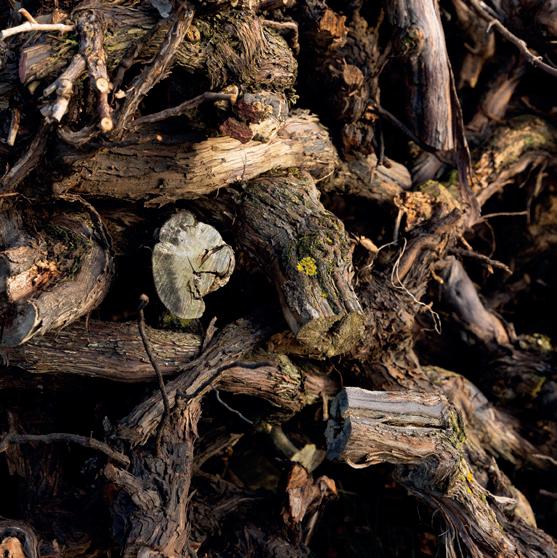































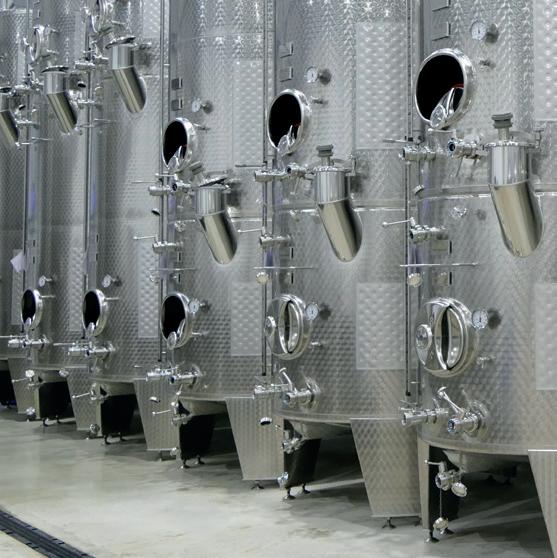






































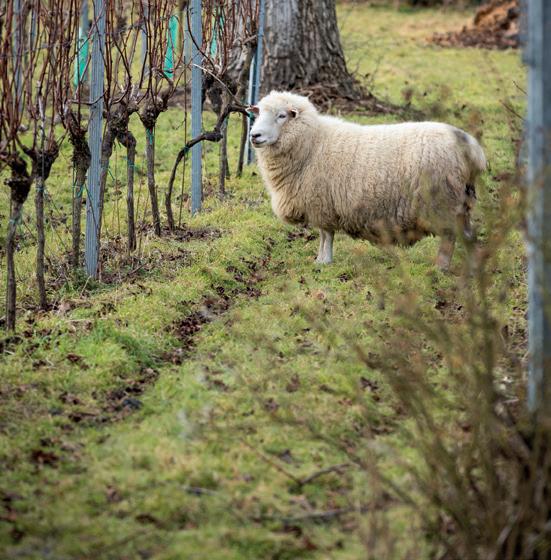













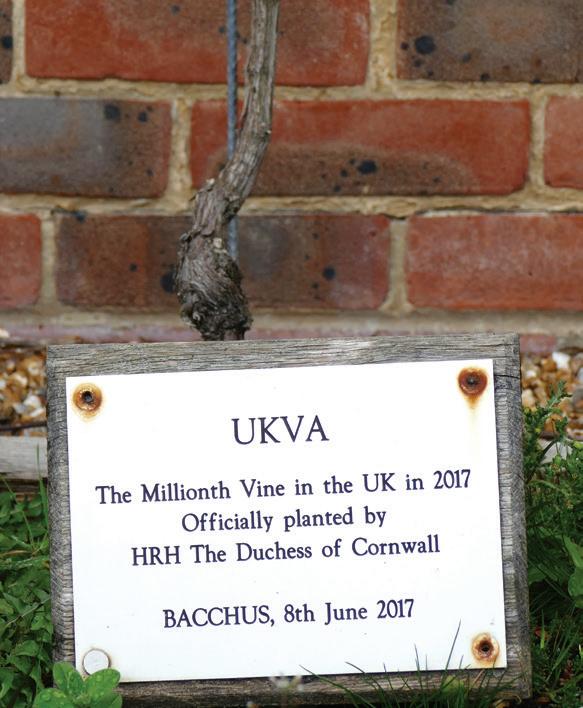
the future. One new development is the National Schools Development Programme. There will be development workshops in every region in the country and this year the focus will be on “spray application such as calibration, alternative chemistry and good canopy penetration,” explained Dr Dunn. “We think this will have a major impact because one of the things that lets the industry down is the variable management of diseases across vineyards,” he added. In the laboratory there is now the ability to use high performance liquid chromatography, which measures phenolic compounds, and James Clapham is working towards techniques for

measuring volatile compounds as well. There is the polymerase chain reaction device that amplifies DNA, allowing many possibilities including projects on indigenous yeast. In the vineyard there will be a state of the art under vine cultivator coming soon and plans for the winery will mean it will look a little different in the future. “There will be a rebuild which will include standardised tanks on two levels,” he continued. In conclusion Dr Dunn used the phrase: “Plumpton students are united by wine obsession.” A sentiment that seems to travel across many continents and will endure for vintage after vintage.












WWW.SOUTHEASTFARMER.NET | MAY 2023 63 TO ADVERTISE CALL 01303 233883 AS FEATURED IN MAGAZINE VIN E YAR D For Growers & Winemakers in Great Britain
Winemaking, its history and future are part of the fabric of the college creating an absorbing atmosphere. Hidden gems relating to all things wine are dotted around campus.
THINKING OF GETTING INTO VITICULTURE? Why not subscribe to Vineyard magazine? Visit shop.kelsey.co.uk/subscription/VIN LAND & PROPERTY CONSULTANTS Expert advice for viticulture: Site-finding Sales & acquisitions Planning applications Environmental schemes & grants on 01892 Matthew Berryman 07710 matthew@c-l-m.co.uk The Mount Vineyard sits in a quaint and beautiful landscape that is a painters idyll. MARCH 2023 The art of wine INSIDE Fast track to the best equipment When fungus attacks Matthew Jukes selects three wines that use carefully chosen words VINEYARD MARCH 2023 Vineyard03Mar23.indd 1 LAND & PROPERTY CONSULTANTS Expert advice for viticulture: Site-finding Sales & acquisitions Planning applications Environmental schemes & grants Call us on Matthew Berryman matthew@c-l-m.co.uk INSIDE Event buzzing with enthusiasm Keeping ahead of the game Sampling English wine The Grange Winery in Hampshire is a place where past, present and future are inextricably linked. JANUARY 2023 Past, present and future Vineyard01Jan23.indd LAND & PROPERTY CONSULTANTS Expert advice for viticulture: Site-finding Sales & acquisitions Planning applications Environmental schemes & grants Matthew Berryman 07710 765323 matthew@c-l-m.co.uk INSIDE Frost protection Introducing our new columnists Matthew Jukes looks at some incredible wines that catch the imagination Visiting a vineyard on the site of a medieval abbey FEBRUARY 2023 Agreeable symmetry VINEYARD CONSULTANTS Vineyard sales & acquisition Planning applications Business plans Environmental schemes Grants Matthew Berryman 07710 765323 matthew@c-l-m.co.uk 38 showpagepreview CLAIM YOUR FREE TICKETS INSIDE Machine harvesters are shaking it up Matthew Jukes thinks “There’s gold in them thar hills” Deep connection At charming Mountfield Winery grapes go from vine to bo le without travelling o site. NOVEMBER 2022 Vineyard11Nov22.indd 20/10/2022 VIN E YAR D For Growers & Winemakers in Great Britain
POINTING OUT THREATS AND DANGERS TO TENANTED FARMS

Our newest contributor to this column is John Marland, who has taken over from Nick Ottewell, whose contributions were much valued by the editorial team here at South East Farmer. John, who is a Sussex farmer and chair of the NFU’s Tenants’ Forum, introduces himself below…
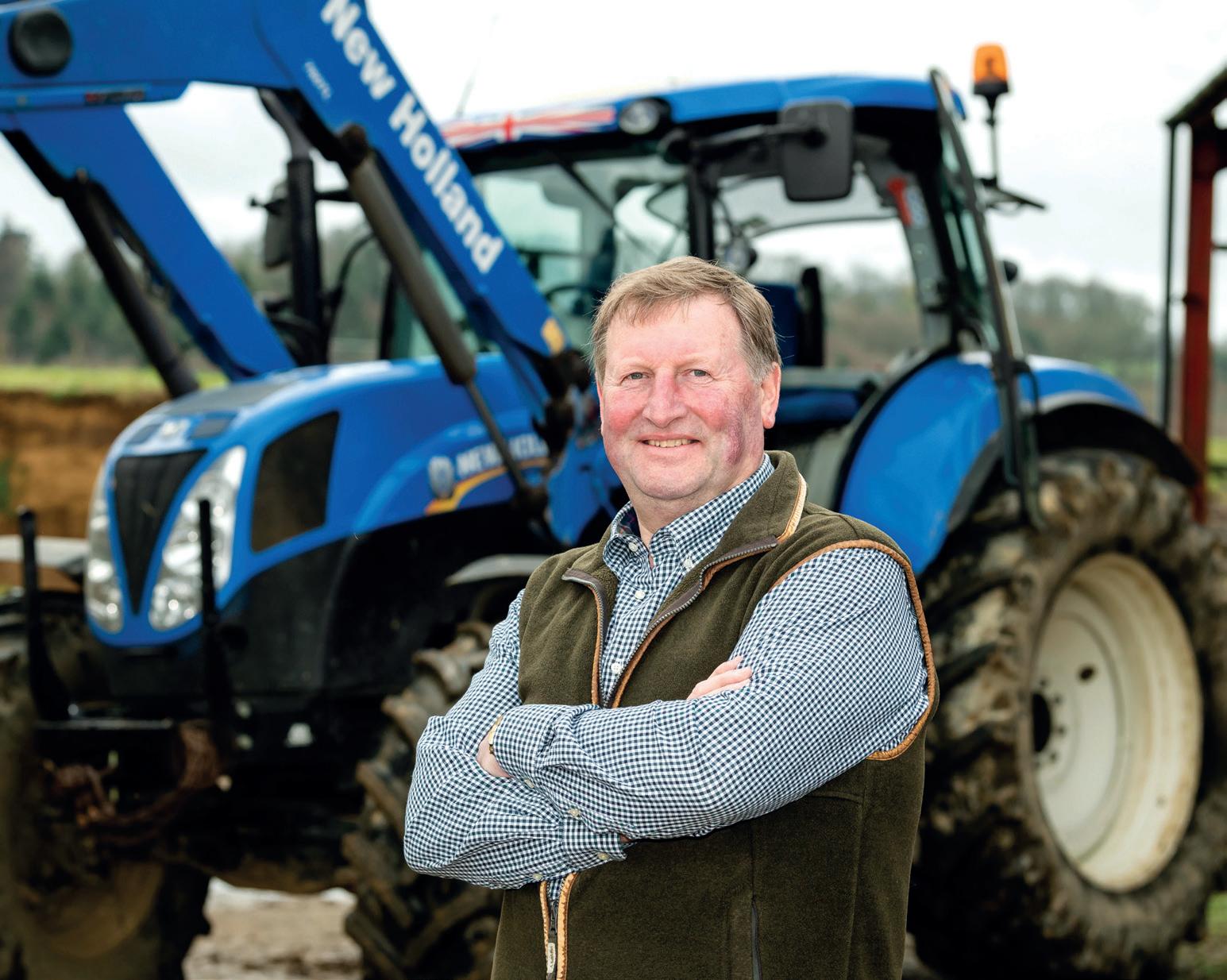
I was born and raised on my family’s dairy farm in Lancashire and now farm in Sussex with my wife Sue, with whom I have three grown up daughters.
I studied agriculture in Lancashire and estate management at Merrist Wood in Surrey. During the late 1980s I was fortunate to secure an agricultural tenancy, which is still an important part of my farming business, and today I have my own farm business. One holding is south of Chichester and the other is just north of Battle.
Both farms are primarily arable, growing wheat, barley, oats and oilseed rape, and we have temporary grass in Countryside Stewardship (CS). I have soil types ranging from brickearth over gravel to traditional Weald clay, and we are always trying to establish crops using as near to min-till as possible, good soil structure being the key.
My interests and experience span many sectors; dairy, beef, sheep and arable, always farming with conservation and nature in mind. Having signed a number of CS agreements over the years, I am currently in a mid-tier agreement for ancient meadow restoration, with the aim of improving and protecting a sensitive water catchment area. We have lost 97% of our ancient meadows in this particular area and water quality is becoming an everincreasing problem. I hope in some small way that I can help to reverse this.
I am also chairman of FiPL (Farming in Protected Landscapes) for the High Weald Area of Outstanding Natural Beauty. As we transition away from the Basic Payment Scheme, FiPL will become a mode of support for farmers and land managers, helping them obtain grants to assist with business improvements while protecting the landscape and the environment.
I have always been a keen member of the NFU, sitting on the Livestock and Wool Board
Committee more than 35 years ago.
This month I was fortunate to be elected chairman of the NFU’s National Tenants’ Forum, having represented the South East for the past seven years.
This position has helped me contact numerous MPs, including Baroness Kate Rock, who led ‘the Rock review’ of tenanted farms in the UK. I was able to point out the threats and dangers to tenanted farms of new legislation and point out the major opportunities of engaging with tenants and creating tenancies; tenancies not just being economically viable but good for the countryside, and the environment and able to help government achieve its own aims and objectives. In my experience, tenant farmers are often dynamic in their approach towards new farming opportunities, being able and willing to adapt their farming systems.
I believe the tenanted sector, which accounts

for 30% of the farmed land in the UK, has a positive future in this new and turbulent world of environmentalists, carbon capture and Biodiversity Net Gain. Remember that tenanted farms are also the traditional means of entry for young farmers, particularly if they don’t have a family farm to inherit.
We are blessed in South East England with traditional landed country estates which have a history of providing tenanted farms and building a long-term, mutually beneficial relationship with their tenants and their families, often over many generations. I hope this will continue and will try to encourage such relationship in to the future.
With a combination of a good landlord and a good tenant, and maybe a little help from the NFU, I believe we can look forward to a bright farming future, able to feed the people, care for the environment and protect the countryside we have all come to love and cherish.
MAY 2023 | WWW.SOUTHEASTFARMER.NET 64 FROM THE FRONT LINE IN CONJUNCTION WITH
JUST ANOTHER DAY AT THE OFFICE.
JUST ANOTHER DAY AT THE OFFICE.
We're looking to hire experienced agricultural lecturers and trainee lecturers for our growing agriculture division based on our 800ha estate which boasts one of the largest college farms in the UK.
Have an informal chat with us: recruitment@plumpton.ac.uk
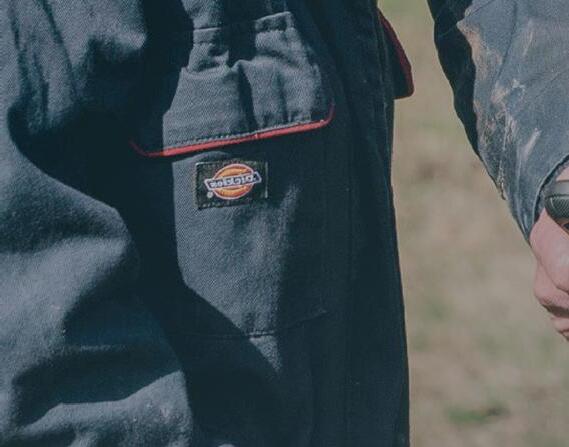







01273 892036





We're looking for industry experts with the experience or the desire to learn how to inspire our students, the next generation of farmers and landowners. If you're already a lecturer/teacher we'd love to hear from you.





We're also really keen to hear from industry experts who would be interested to learn more about developing a career in teaching. We have a trainee teacher programme to allow you to do just that, to become a qualified teacher, working alongside our highly experienced team.
We have recently completed an £11m investment in our new AgriFood Centre to ensure that the college stays at the forefront of the industry as it faces the challenges of new technology, diversification and regenerative practices.
DON’T MISS THE 2023 MAY OPEN EVENT
Choosing which college to attend is one of the most exciting and important decisions you will make. The course you choose now will help shape your future career, and Hadlow College is committed to helping you make the right choice.
Hadlow College is part of North Kent College’s portfolio, which consists of five campuses in Dartford, Gravesend, Tonbridge and Hadlow and includes Greenwich Equestrian centre. It is Kent’s only rural and land-based college.
All the campuses serve their local communities and each individual campus has its own unique identity, but together they offer a broad range of programmes, enrichment and progression opportunities. Committed to providing students with the best learning experience possible, Hadlow College welcomes all students, whether joining from school or college or returning from a break in their studies.
www.hadlow.ac.uk/events
The college’s work with employers and the local community leads to many wide ranging and diverse progression opportunities, something which is reflected in testimonies from current and past students who share their journeys and chosen career paths on our website.

Want to live and study on campus? Hadlow offers some excellent accommodation for further education and higher education students in single rooms, several of which are set at the heart of our charming Hadlow campus.
FIND OUT WHAT YOU NEED TO KNOW
HADLOW COLLEGE AND GREENWICH EQUESTRIAN CENTRE
OPEN EVENT: WEDNESDAY, 24 MAY – 3PM TO 7PM
MAY 2023 | WWW.SOUTHEASTFARMER.NET 66
CHALLENGE THE LANDSCAPE AND CREATE ITS OWN FUTURE
The Marden Fruit Show Society (MFSS) held its Annual General Meeting on Wednesday 19 April, when Catherine Paice was welcomed as the new President.

Catherine takes over from her good friend Teresa Wickham, who has stepped down after serving a three-year term.
Catherine gave me a little quote for this column (we are as delighted as she is that she has joined the team): “I am delighted to accept the invitation to be the president of the Marden Fruit Show Society and I hope my experience and contacts will be invaluable, helping it to continue its work, especially in its 90th year.
“There is some fantastic innovation taking place in the sector as well as interesting technological developments and we look forward to showcasing more about these later in the year at the National Fruit Show.”

The fruit show team has been working hard to ensure that our 90th year is a special one. With Sally Flannagan now at the helm, her experience at Hadlow and the East Malling Trust is paying dividends as our offering of technology, innovation and educational opportunities grows. Rachel Heather, event and team coordinator, is ensuring that the exhibition halls will be vibrant and full, and that our celebrations will befit such a milestone year.
Back to the AGM; when we established the James Nichols lecture, we wanted to create a forum where James’ spirit would live on through intelligent, forthright speakers who would champion our sector and encourage everyone to affect change as he did.
There was only one choice this year as I saw it, and we were not disappointed. In an inspiring and informative lecture, Emily Norton, head of Savills Rural Research and the immediate past chair of the Oxford Farming Conference, encouraged fruit growers to have their “own vision for the future”, saying that otherwise “supply chains and banks will dictate it to you”.
Commercial negotiation skills aren’t often finely honed in our sector and there have been many critical conversations around deal taking (rather than making) in our industry, Emily’s impassioned appeal was for growers to ensure they had control of prices, margins and their market place.


She also encouraged growers to consider whether they were giving away valuable carbon credits in supply contracts and urged them to review them and to make sure they were sold to customers.

She concluded by saying the sector should “challenge the landscape and create its own future”. The lecture can be heard again at www.nationalfruitshow.org.uk/agm-agenda (it starts at 13.00). While the audience on the day was primarily fruit growers and researchers, there was a strong message for all those in primary food production.
Sadly Sally was unwell and unable to take the credit on the day for a great programme. Our other presentations included one which detailed the range of support services available to growers on a sustainability journey and a talk by the amazing Samantha Smith.
Samantha, the society’s education programme leader, delivered an impassioned resume of the work of her team. Sponsorship is desperately needed; the programme is currently taking bookings an academic year ahead, with the only limit on delivery being funding for the team’s time.

It was great to hear from the hosting team from Growing Kent & Medway, who showcased the support they are giving to three top fruit growers. Clive Baxter led the way with a typically ‘Clive’ take on the marketing of his Asian pear juice (laxative or hangover preventative, take your pick; it tasted, delicious).
The 90th National Fruit Show will take place on Wednesday 1 November and Thursday 2 November – please come and join us.
timber & groundwork services
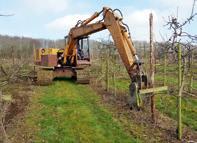
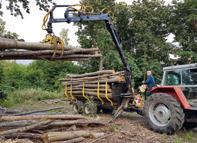
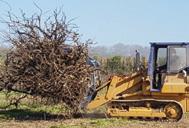
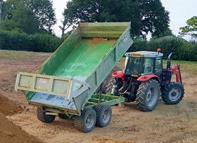
WWW.SOUTHEASTFARMER.NET | MAY 2023 67 TO ADVERTISE CALL 01303 233883 FOCUS ON FRUIT SARAH CALCUTT
SARAH CALCUTT Chair, National Fruit Show
• orchard grubbing • windbreak removal • timber extraction • fallen tree removal • ground contouring • land clearance • excavations • cultivations • pond dredging • reservoir construction 01622 744640 - 07711 264775 www.whskinnerandsons.co.uk
Teresa Wickham is stepping down
Grubbing,
Legal services for farmers & rural businesses
COURT QUEUES LEAVE BEREAVED FARMING FAMILIES IN ‘LIMBO’
From land sales collapsing to investments plunging in value, civil service delays are causing huge disruption and emotional anguish to bereaved farming families trying to unlock estates, according to a private client solicitor at Sussex law firm Mayo Wynne Baxter.
After someone dies, a grant of probate is a vital step to gaining control over the deceased’s estate. Without it, families can be left unable to sell their loved one’s home, access their bank account to pay beneficiaries their inheritance or settle any outstanding debts.
HM Courts and Tribunal Service (HMCTS) has been working with huge backlogs in processing probate applications since the start of the Covid-19 pandemic. While delays are improving, executors can still expect a 10-week wait before they are issued their grant of probate, according to the latest data.
Fiona Dodd, private client partner at Mayo Wynne Baxter, has warned that the queues at the courts have left buyers walking out on house and land sales and investments losing value in an already volatile market, which is having a negative impact on grieving families.

She said: “These delays are, rightly, causing huge frustration and anxiety for bereaved families who are having to pay the price as a result of faults within the system.
“In the past few months, we’ve seen clients losing out on property sales as buyers have been unwilling to put up with the long wait times for a grant of probate to be issued, which is needed before a transaction can proceed. In a couple of cases, I have had to ask for an emergency application to save the sale of a large number of plots of land for farming families.
“Due to stock market volatility arising from the war in Ukraine, we’ve also seen a deceased’s investment portfolio significantly lose value as executors have had to wait for the
grant to be issued before being able to sell the shares.
“While the delays are affecting everyone, there is an added layer of uncertainty for farming families. Even when probate has been issued, there is an additional wait in the time it takes to finalise tax affairs with HMRC and confirm the family farm is exempt from inheritance tax as it qualifies for Agricultural Property Relief, so even once they have probate, they cannot plan as they do not have certainty of what they need to pay.”
According to the latest data from HMCTS, for the 22,072 grants of probate issued in February 2023, the average timeline from submission to grant was 10.6 weeks – a slight reduction from the 11 weeks recorded in January.
Fiona said: “It is basically a waiting game –there is no shortcut or way to avoid the delays when applying for grant of probate. Despite
these types of applications being bread and butter for probate practitioners, legal teams up and down the country are experiencing the same problem.

“Pre-Covid, if probate had not been granted, we would follow up with HMCTS after just 10 days. Now there is a 16-week purdah in place where we are unable to chase the registry to find out what is happening.
“The onus is on the Government to come up with a way to get through the backlog and speed up the current process. In the meantime, we recommend seeking legal assistance with the estate administration to ensure the application is carefully prepared and completed and submitted correctly.
“Longer term, if clients are wanting to avoid problems in the future, we recommend they seek legal advice, have joint accounts and make sure their pensions and insurance nominations are up to date.”
MAY 2023 | WWW.SOUTHEASTFARMER.NET 68
Fiona Dodd
Call us today or visit our website: 01227 763939 furleypage.co.uk
Your Will is the legal document which effectively transfers all your wealth to the recipients of your choice on death. You are unlikely to sign any other document transferring quite as much value, so it is important to get it right and limit the possibility of challenge; otherwise the recipients of your worldly wealth may end up being people you didn’t choose.
A Will can be invalid for any one or more of the following reasons:

FAILURE TO COMPLY WITH FORMALITIES
As a ‘testator’ (a person making a Will), you need to follow specific rules to ensure your Will is valid. The Wills Act 1837 sets out the requirements, including that a Will must be in writing and signed in the presence of two or more witnesses who attest and also sign, or acknowledge in the testator’s presence.
THE TESTATOR DID NOT HAVE THE NECESSARY MENTAL CAPACITY
The legal test has not changed since the 17th century case of Banks v Goodfellow Dementia might impact capacity, but then again it may not - the disease could be in its infancy, or the testator may be lucid at the relevant time. Other factors may impact capacity such as bereavement, alcoholism or the effect of drugs (prescribed or otherwise).
Cases are fact specific, and evidence is crucial, although this need not be medical
YOUR WILL
Getting it right and the importance of evidence.
evidence. In Burgess v Hawes, the court preferred the evidence of the solicitor over the medical expert saying: “The court should not readily upset…a Will that has been drafted by an experienced independent lawyer if, as here, an experienced lawyer has formed the opinion [about capacity] from a meeting or meetings.” Therefore the opinion of a legal advisor can be important.
LACK OF ‘KNOWLEDGE AND APPROVAL’
Does the Will truly represent the testator’s intentions? Where the testator has capacity, there is a presumption it does, but that can be displaced by evidence about the surrounding circumstances, such as the testator’s poor eyesight, the involvement of a beneficiary in the process or the testator not taking
DEBORAH CAIN
Partner, Brachers LLP
T: 01622 655297
E: deborahcain@brachers.co.uk
www.brachers.co.uk
advice. Each case is fact specific, but once the presumption is displaced, the burden of proof passes to those claiming the Will is valid. Evidence such as a solicitor’s file note addressing relevant facts can be crucial.
UNDUE INFLUENCE
It is a common misconception that a testator who has been influenced by someone has been unduly influenced. To be ‘undue’ there must usually be an element of coercion. The testator may be ‘led but not driven’.
FRAUD/FORGERY
Such cases are rare, and the evidence must be strong (or the claim undefended). An infamous example can be found in R v Spillman, where the mother of the ‘beneficiary’ dressed up as the testator.
If you are worried your Will might be challenged, good professional advice and supportive documentary evidence can help you get things right.
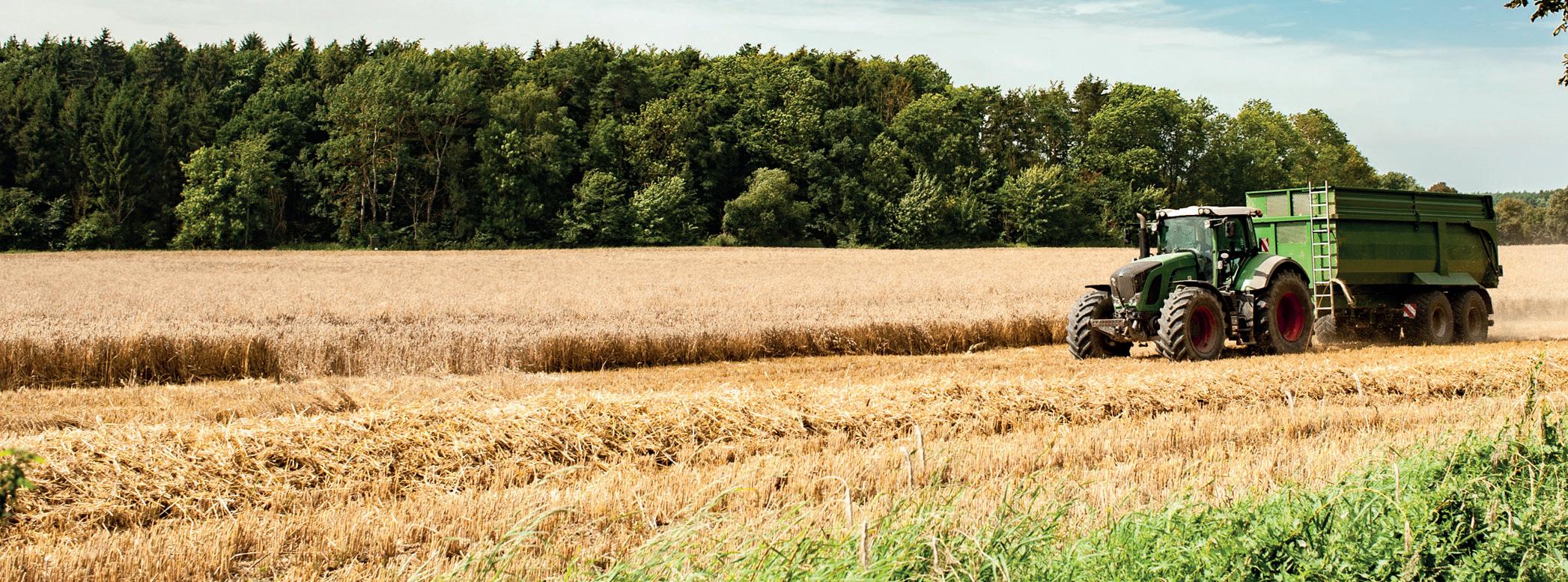
Deborah Cain is a Partner at Brachers law firm and specialises in disputed Wills.

WWW.SOUTHEASTFARMER.NET | MAY 2023 69 TO ADVERTISE CALL 01303 233883 LEGAL
Maidstone
| Canterbury www.brachers.co.uk
Proud to be recognised for our agricultural expertise in leading directories, Chambers and Partners and The Legal 500
A “knowledgeable and responsive” team of “excellent solicitors who know their specialisms inside out”
BARNS IN DEMAND
Barn conversions area great way for people to explore the possibilities of architecture and contemporary design whilst remaining sympathetic to the barns character and history For ease and reassurance, most barn sales come with preapproved planning permission anda full design of the conversion, allowing the buyer to begin the build straight away (subject to clarity on conditions).
Those hoping to sell on the completed product fora profit, there isa strong market for those looking fora fresh, ‘new ’ home that also has character and the desirable elements ofa rural location and lifestyle.
Barn conversions have seena surge in popularity over the last few years, benefiting a range of people who can appreciate the opportunities and perks of restoring what exists already
Not only are theya superb way of pushing the boundaries of architecture and design to reflect the lives of those who call them ‘home’, but they are also great assets to landowners who are in fortunate positions to have unused barns on their property.

Owing to updated planning policy, it is now easier to obtain the necessary permissions in order to convert unused agricultural buildings, helping both landowners release capital and home-buyers to obtain their dream home in rural locations A welcome modernisation duringa 'housing crisis'.
For landowners, the popularity of barn conversions has offered another income stream, whether it be from sellinga parcel of their land with the building outright, or converting it themselves and renting it out asa frequent income stream Landowners are continuously looking for ways in which they can diversify their assets and this route is becoming increasingly popular.
There area number of requirements prior to obtaining planning permission to convert including; the barns use prior to submission, location, structure and accessibility BTF's dedicated team work with landowners to ensure the best possible outcome from applications and how to market the limitless potential.

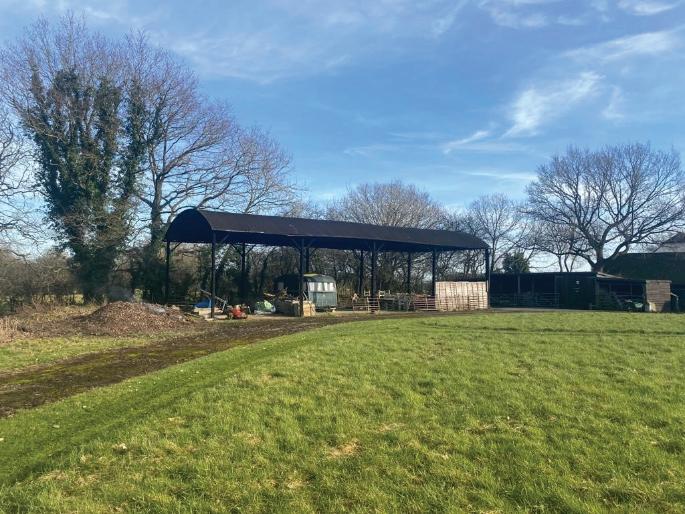
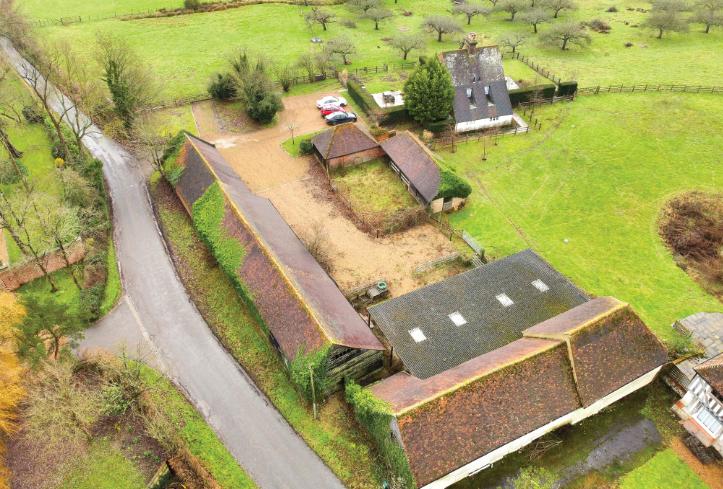
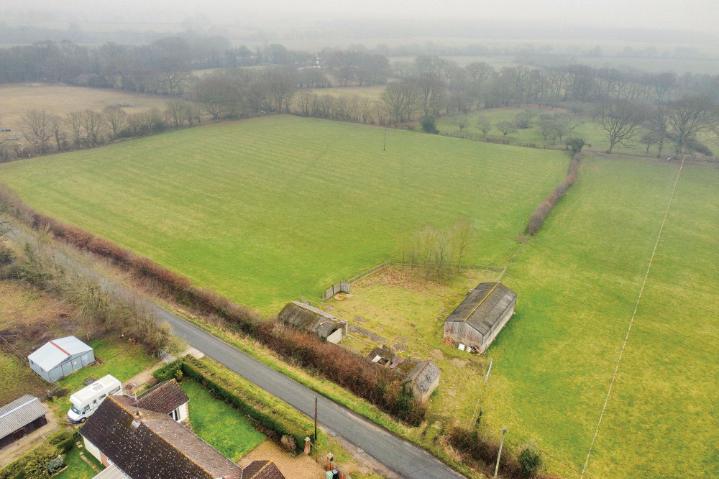
ww w.b tf p art n ers hip. c o.u k
FOR SALE FOR SALE Guide Price- £425,000 Guide Price- £495,000 Guide Price- £495,000 Alex Cornwallis alex.cornwallis@btfpartnership.co.uk Challock 01233 740077 7.31 Acres In Total 0.63 Acres in Total 0.64 Acres in Total
Impression-High
E challock@btfpartnership.co.uk T 01233 740077
Land & Property Experts
Artists
Halden, Ashford
High
Ulcombe, Kent East Sutton, Kent
Halden, Kent
WITH A RISE IN DEMAND FOR CHARACTER AND STATEMENT, THERE HAS NEVER BEEN A BETTER TIME TO CREATE THE ‘GRAND DESIGNS’ DREAM.
FOR SALE
The South East Farmland Market Experts
LAND AND FARMS SPONSORED BY BATCHELLER MONKHOUSE

A COMMERCIAL ARABLE FARM
BRIGHTON | EAST SUSSEX
OFFERS IN EXCESS OF £8,000,000 APPROXIMATELY 498.5 ACRES (201.73 HECTARES)

A commercial arable farm in the South Downs National Park and only four miles from the centre of Brighton is on the market with Batcheller Monkhouse. It comprises a newly refurbished farmhouse, two bedroom cabin, farmyard including an extensive range of buildings, and views towards Brighton and the coast.
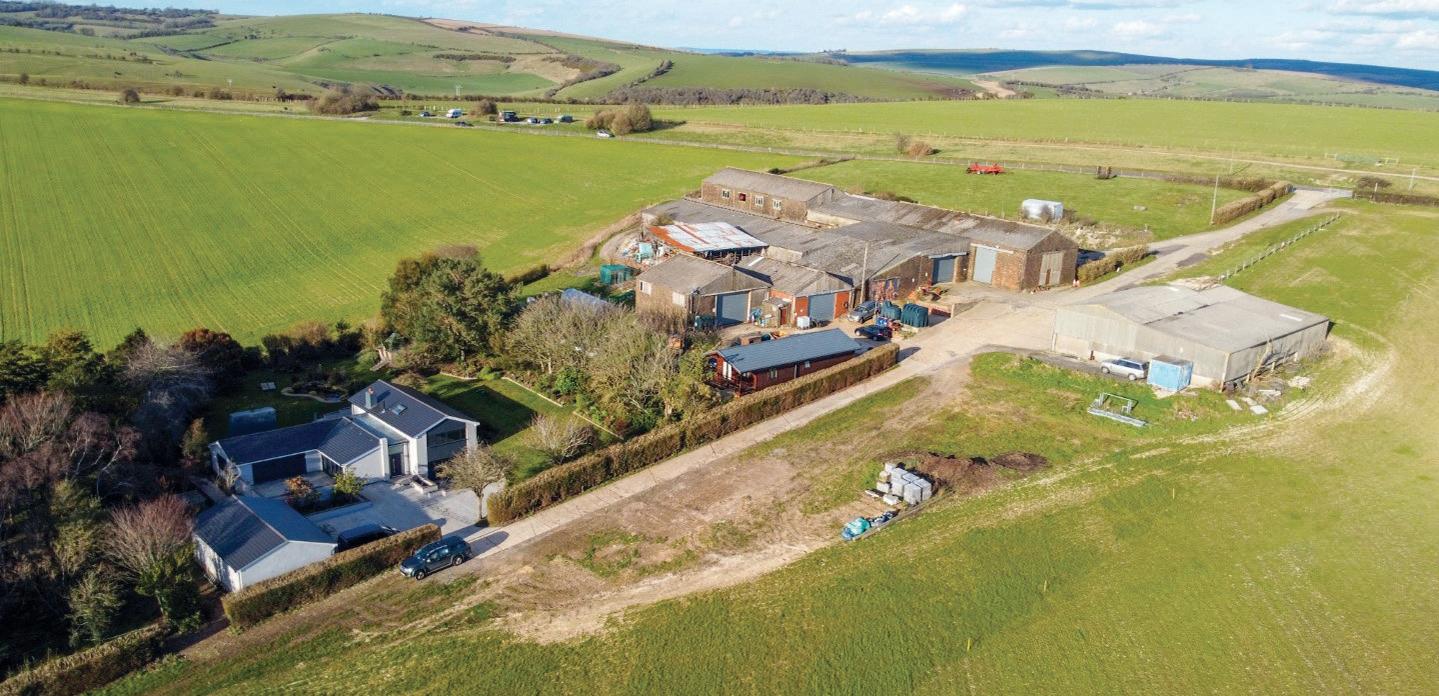
This highly productive downland farm has been worked by the present owner for almost 40 years and comes to the market due to retirement.
Approached from Devil’s Dyke Road, a concrete drive leads to the farmhouse, which sits in a secluded position beyond the farm buildings. It was originally built in the early 1960s and has recently undergone a complete renovation, from the ground up, including a new entrance hall, dining room extension and garage conversion. The house has been rewired, new hot water and heating system installed, and each room has its own thermostatically controlled heating.
The farmhouse is approached via a block paved driveway leading to a heated triple garage with remote controlled roller shutter doors, secure pedestrian door and water supply.
The attractive mature gardens are stocked with a variety of trees and shrubs and provide considerable seclusion and privacy. The lawns contain a large koi pond and house an Arctic Cabin BBQ hut. There is also a vegetable garden with poly tunnel, fruit cage, raised beds, assorted fruit trees, outside water tap and composter bins.
Farm buildings include:





• Two workshops – steel frame twin span building of mixed construction divided into two.
• Lower corn store, upper corn store and grain silos plus pit – buildings of mixed construction with three roller shutter doors, lean to chemical store and drier.
• Open barn – twin bay open fronted machinery store with concrete floor and
walls, with adjoining open barn – single bay machinery store.
• Cattle pens – a steel frame single span former livestock building.
• Tractor barn and back barn – single span general purpose buildings of mixed construction, one with lean to.
• Sprayer store – linking grain store to general purpose building.
• Straw barn – steel frame single span open fronted off lying building with open fronted lean to, access via separate concrete track.
The soil is free draining, medium to light loam overlying various subsoils from upper to lower chalk. The land is currently divided into good size working arable enclosures and much is considered to have potential for vineyard use. It is well fenced and gated. It includes a permanent pasture/wooded escarpment. The land is well served by tracks and roads providing good access from the farm buildings.
iFor an appointment to view please contact the Pulborough Office: 01798 872081

71 TO ADVERTISE CALL 01303 233883
TOPPICK
WWW.SOUTHEASTFARMER.NET | MAY 2023
70 ACRE GRASSLAND FARM



| EAST SUSSEX



Watsons of Heathfield are pleased to be marketing Thordean Farm at Cowbeech in East Sussex.


This ring-fenced residential grassland farm has been in the same family ownership since the late 1930s and in more recent years has been the home of the prize-winning Thorndean herd of pedigree Limousin cattle.

The farm is situated in a rural yet convenient location close to the hamlet of Cowbeech and just south of the picturesque and archetypal English country village of Rushlake Green, with houses, a pub and village shop arranged around and overlooking a central green. The market town of Hailsham, with its extensive range of shops, is about 3½ miles to the southwest and its livestock market is an excellent and convenient place to source or sell stock.
The farmhouse was built on the holding in the late 1940s and has been extended to provide the extremely spacious family accommodation now available. It is positioned to take advantage of the far-reaching views over the surrounding Sussex countryside and is constructed of brick with hanging tile upper elevations under a tiled roof.
The accommodation includes a large sitting room, dining room with views, kitchen/ breakfast room, farm office/utility room, study, library and four double bedrooms, three of which are large suites.
Attached at the southern end of the house is an enclosed swimming pool with anti-slip floor surround, sliding glass doors opening to a paved terrace area and double-glazed
panelling that forms part of the walling to give a sweeping outlook over the garden, as well as panoramic views of the fields and woodland beyond. There are three garages offering storage space for numerous cars and one has the potential for conversion to an annexe, subject to obtaining planning permission.
To the north of the farmhouse, with convenient foot access via a concreted pathway across the adjoining paddock, is the farmyard with its own gated entrance onto Cowbeech Road and excellent range of farm buildings of nearly 11,500 sq ft, particularly well laid out for the housing, managing and handling of cattle.
These buildings comprise a number of covered livestock yards with features such as concrete passageways, feed barriers, storage areas and at the southern end of the yard a former cowshed with dairy room, workshop and toilets. To the rear of this building is a small area of fitted sheep handling pens and
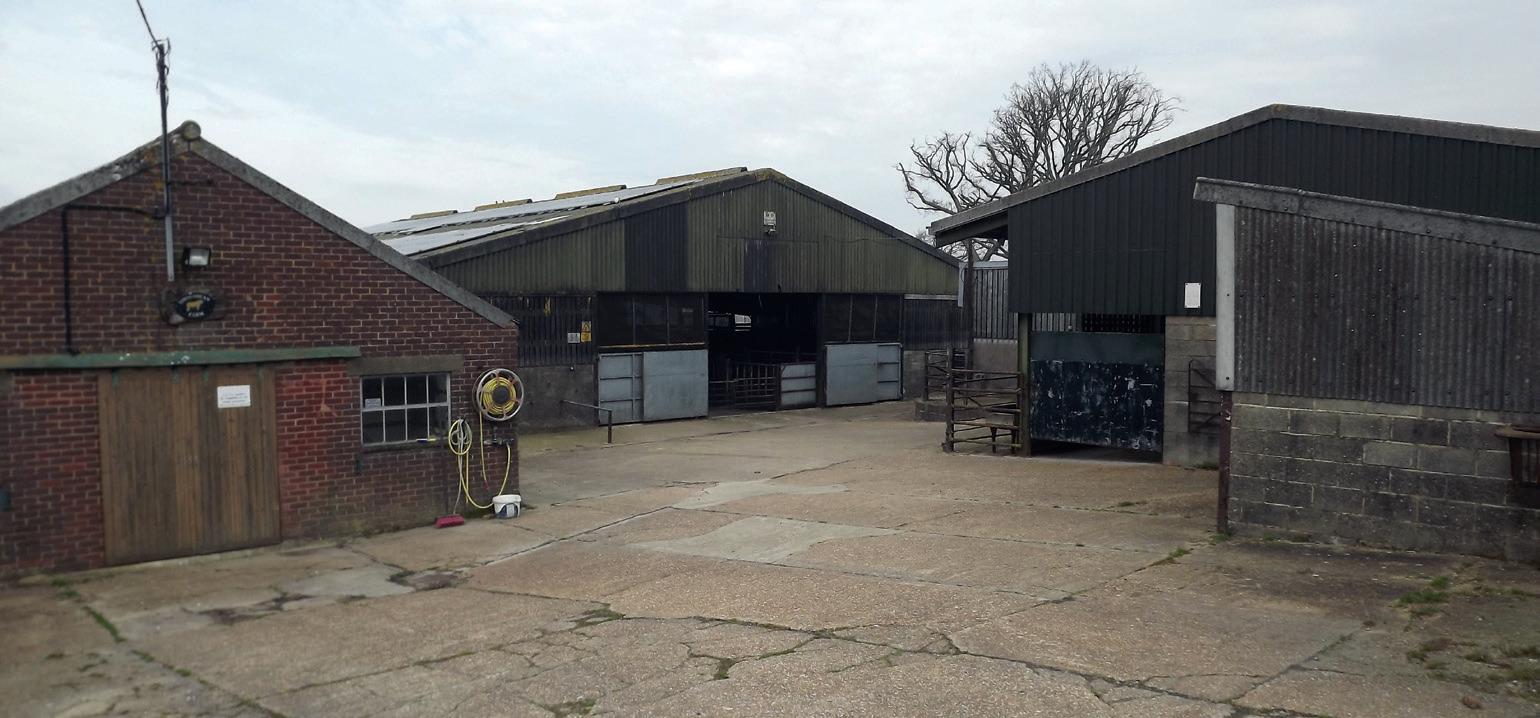
dip. The yard has good vehicular access and is surrounded by fencing and gates that form a fully enclosed working area.

The land lies to the west of the farm buildings and is divided into a number of grassland fields by established and well-kept hedgerows. Along the northern boundary, with field-gate access at either end, is an attractive mixed species broadleaf woodland with clear ground under the canopy, numerous specimen oak trees and a small stream running from east to west.
The farm is available as a whole or in two lots; the farmhouse set in about nine acres of gardens and pasture as lot one and the farm buildings, pasture and woodland, totalling about 60 acres, as lot two.
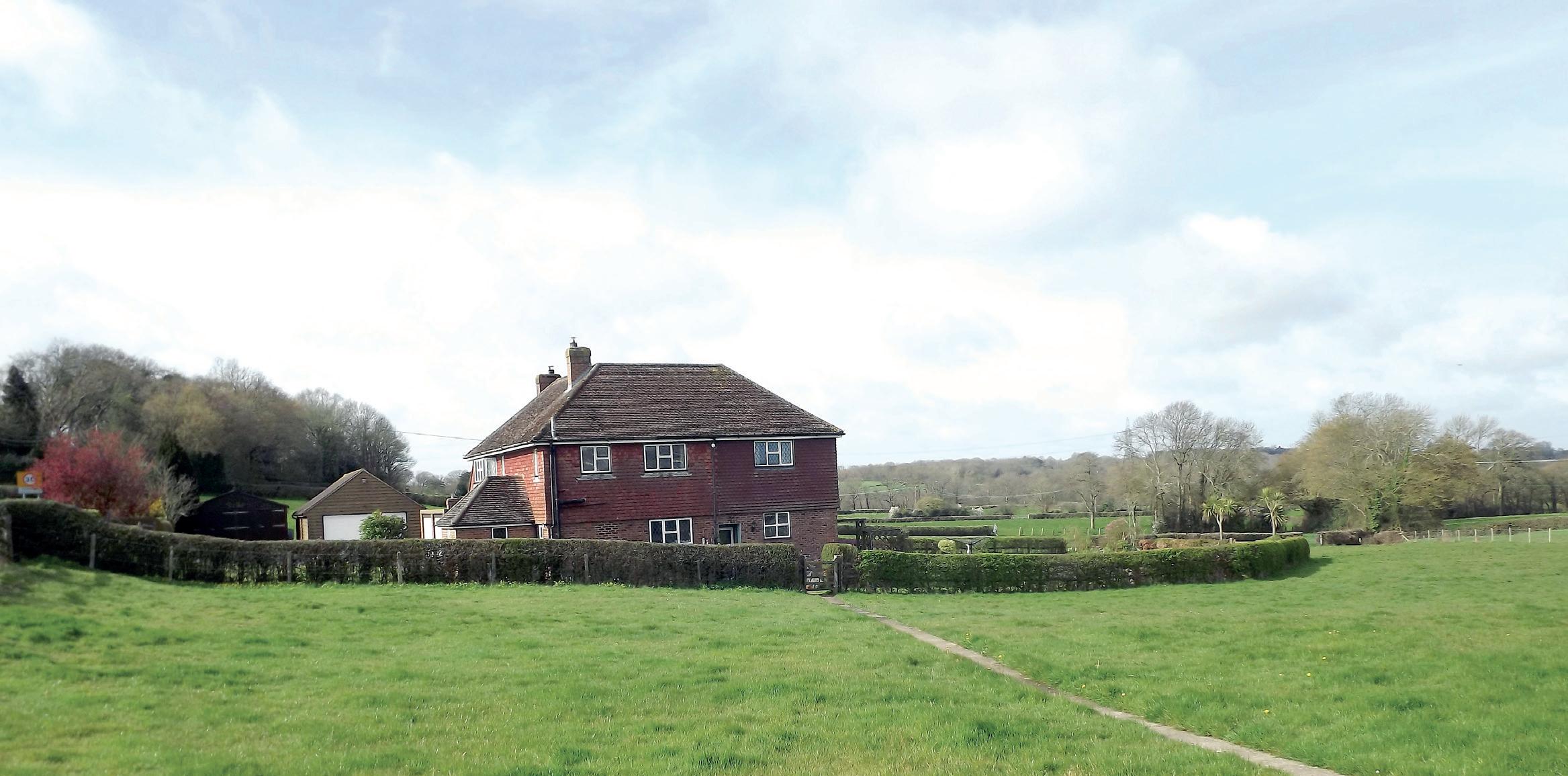
MAY 2023 | WWW.SOUTHEASTFARMER.NET 72 LAND AND FARMS
GUIDE PRICE £2,000,000 70 ACRES COWBEECH
TOPPICK Further details: Tel: 01435 865077 www.watsonsestates.co.uk i
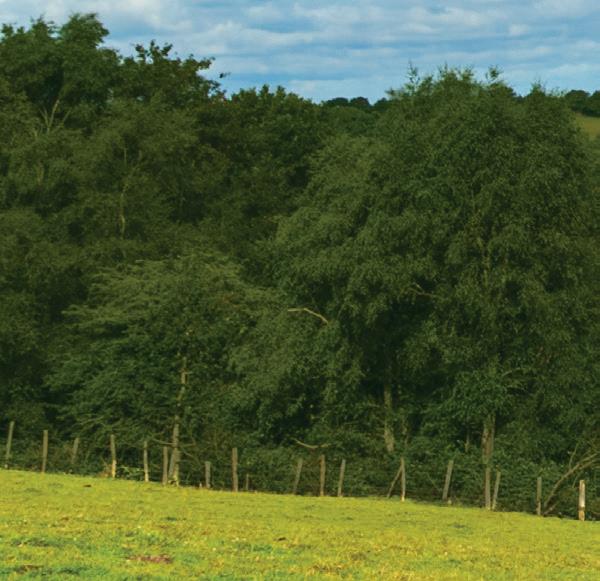

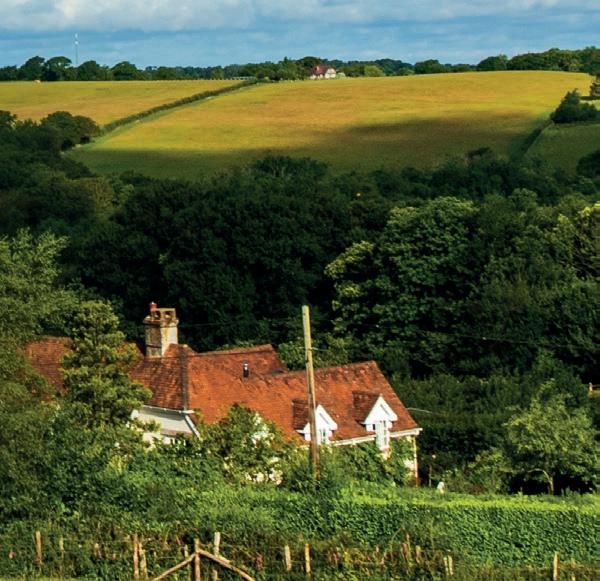
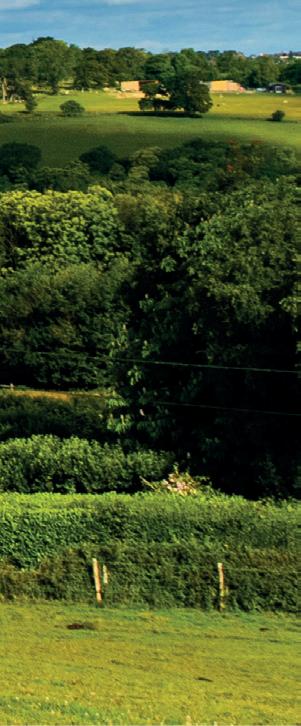








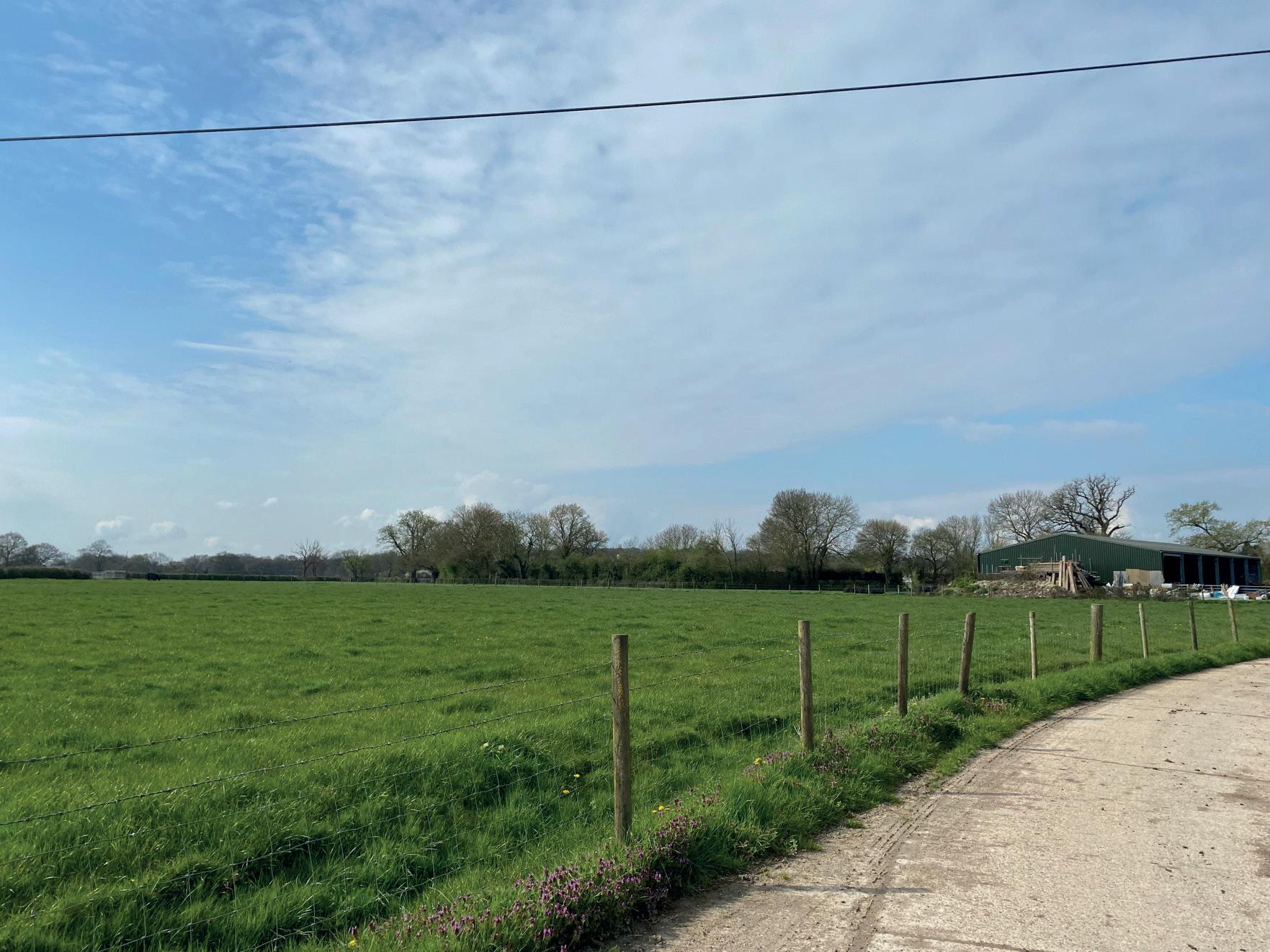

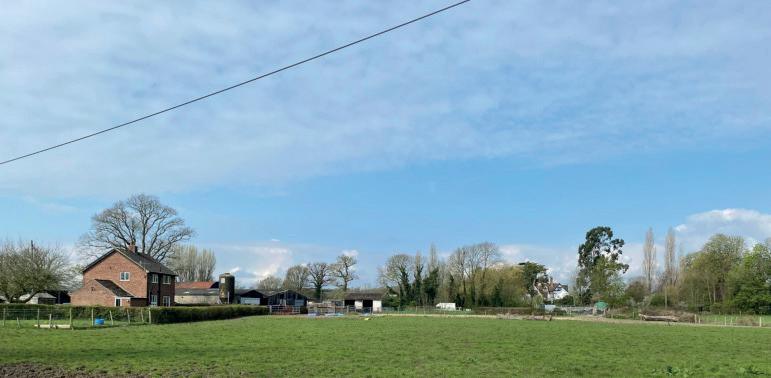
WWW.SOUTHEASTFARMER.NET | MAY 2023 73 TO ADVERTISE CALL 01303 233883 batc he lle r mon k house c o m a t h 01444 453181 c.bliss@batchellermonkhouse.com Edward Sargeant 01798 872081 e.sargeant@batchellermonkhouse.com Your experts in the field Ba t tl e Matthew Braxton 01424 775577 m.braxton@batchellermonkhouse.com Tu n b ri d g e We lls Jeremy St Clair-George 01892 512020 j.stclair.george@batchellermonkhouse.com Our team of local experts lead the field in the sale of farms and estates, equestrian property, woodland and paddocks. To Let - Reigate, Surrey with a detached three-bedroom house. The farm is situated between the towns of Reigate and Horley. A regenerative farming approach is required from applicants. Please contact the agents for further information. Knight Frank Horsham Isabel.swift@knightfrank.com 07811 588 578 knightfrank.co.uk Your partners in property All potential tenants should be advised that, as well as rent a holding deposit will be payable which is equal to one week's rent (if an AST) and two weeks' rent (if not an AST), a tenancy deposit will also be payable which is equal to 6 weeks rent (if not an AST and/or the annual rent is over £50,000), or 5 weeks' rent (if an AST and/or the annual rent is below £50,000). If the landlord agrees to you having a pet you may be required to pay a higher deposit (if not an AST) or higher weekly rent (if an AST). An administration fee of £288 and referencing fees of £60 per person will also apply when renting a property (if not an AST). (All fees shown are inclusive of VAT.) For other fees that might apply, please ask us or visit www.knightfrank.co.uk/tenantfees.
iFor an appointment to view please contact the Pulborough Office: 01798 872081
A COMPLETE FARM
GUIDE PRICE £3,850,000 APPROXIMATELY 62.67 ACRES PETWORTH, | WEST SUSSEX
Coming to the market with Batcheller Monkhouse after many years in the same family, this former dairy/livestock/arable farm is found in a fabulous rural setting in a much sought after location north of Petworth and is a complete farm in a beautiful location.
It comprises a period farmhouse with considerable character in mature gardens, a farm bungalow, a pair of adjoining holiday cottages,


and an exceptional range of adaptable general purpose farm buildings. It extends in all to approximately 62.67 acres (25.36 hectares).
The farmhouse is an attractive Grade II listed farmhouse offering enormous scope to modernise and improve. While a single farmhouse, the accommodation is currently divided into three units. The south part comprises a kitchen/breakfast/living room, with double doors to garden with hallway to drawing room. Stairs lead to the first floor comprising bedroom two with an en-suite bathroom, bedroom five and a further bathroom. The middle part is accessed via an enclosed entrance porch. There is a kitchen and separate dining room with impressive inglenook fireplace and archway to conservatory overlooking the rear garden. Stairs from the hallway lead to three bedrooms, one with an en-suite bathroom, two further bathrooms and a store. The north part, used as a ground floor annexe, has a living room, kitchen, bedroom six and wet room.
Immediately adjacent to the farmhouse is a pair of brick built kennels. There is a greenhouse on a concrete base, a pair of timber clad storage sheds and a lean-to greenhouse, brick and stone built garage, storeroom with clay tile roof and stairs to further storage space. The garden lies on three sides of the farmhouse with significant areas of lawn and a large pond. There is a patio and part walled garden, vegetable patches, various maturing trees, shrubs and hedging.
The bungalow has an entrance porch to a hallway, three bedrooms, office, sitting/dining room, kitchen, bathroom and conservatory. Please note occupation is subject to an agricultural tie.
A useful pair of timber clad single storey holiday cottages can be found northeast of the main farmhouse. They both include entrance porch, bathroom, two double bedrooms, kitchen/breakfast/living room, and rear external door to parking.
There is a range of general purpose steel-framed agricultural buildings, including a twin-span barn with central lean to. This includes a former silage clamp and a function barn with kitchen and cloakrooms. In all about 20,292 sq ft (1,885 sq m).
The land comprises pasture which is divided into several fields including one with an access directly from the road, woodland and a potential rewilding area which includes a motocross track.
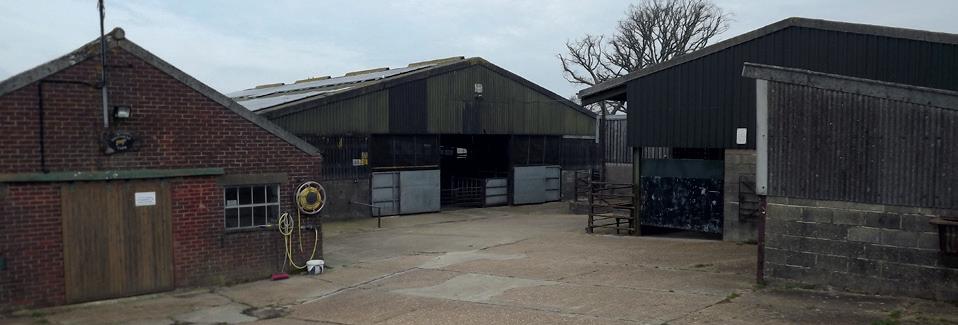
MAY 2023 | WWW.SOUTHEASTFARMER.NET 74 LAND AND FARMS
WATSONS EST. 1873 COUNTRY PROPERTY AGENTS AUCTIONEERS CHARTERED SURVEYORS VALUERS Tel: 01435 865077
www.watsonsestates.co.uk
The Estate Office - Burwash Road, Heathfield, East Sussex TN21
8RA
COWBEECH – EAST SUSSEX
70 ACRE RESIDENTIAL GRASSLAND FARM • LARGE FARMHOUSE WITH INDOOR POOL (EPC: D) • EXCELLENT RANGE OF FARM BUILDINGS • PASTURE AND WOODLAND – NO FOOTPATHS
GUIDE:
£2,000,000
Available as a whole or in two lots
AGRICULTURAL LAND OFTEN REGARDED AS A SAFE HAVEN
While residential property markets, in London and the countryside started to show some signs of stress in the first three months of 2023, agricultural land, often regarded as a safe haven during uncertain economic times and a good hedge against inflation, remained resilient. Gold, an asset with the same attractions also performed strongly.
According to the Knight Frank Farmland Index, the average value of bare land in England and Wales rose 2% on the quarter and 11% on the year to hit another record high of £8,728/acre. Prices continue to vary significantly, even at a local level, and farms and blocks of land are regularly selling for over £12,000/acre.
Although supply is up on the year, the volume of land for sale is still at historically low levels while demand remains very firm. Much of the interest is coming from environmentally focussed buyers, including natural capital investors and funds. However, despite much attention from the media, they are far from dominating the market and, more often than not, are being outbid by more ‘traditional’ tax-driven, farmer or amenity buyers.

So far, the imbalance between supply and demand has meant that the increase in the cost of borrowing, falling agricultural support payments and
sliding grain prices appear to have had little impact on the market. However, we do expect the volume of land for sale to continue rising as more farmers approaching retirement take advantage of current market conditions to exit the industry before the next general election and a potential change of government.
There are few signs, though, that the supply/demand equation will reverse drastically as the nascent environmental markets discussed previously continue to build momentum and the tax treatment of land put into ‘green’ schemes is clarified.
Will Matthews, Head of Farms & Estates at Knight Frank, said: “Lack of supply and increasing demand from a wide variety of buyers is supporting strong farmland prices.
“With government policy being geared to support sustainable farming and regenerative practices, a number of farmers are taking the retirement options on offer. This, combined with the recent volatility in agricultural input costs and rising interest rates, is putting pressure on farm cash flows and may trigger an increase in supply.
“Many feel the impact of the reduction in BPS payments is still to be felt and with a consultation launched to review Agricultural Property Relief and an impending General Election, the next 18 months may bring significant change.”
WWW.SOUTHEASTFARMER.NET | MAY 2023 75 TO ADVERTISE CALL 01303 233883 LAND AND FARMS
Historical farmland performance
Source: Knight Frank Research 10,000 8,000 6,000 4,000 2,000 0 Mar-73 Mar-83 Mar-93 Mar-03 Mar-13 Mar-23 office@therpp.co.uk
Price (£/acre) CIRENCESTER 01285 323200
CRANBROOK 01580 201888 www.therpp.co.uk Chartered Town Planners Image courtesy Olson Design Group
In a planning pickle... ...or just looking at development options? Don’t panic.
The professional, creative thinkers at The RPP can help.

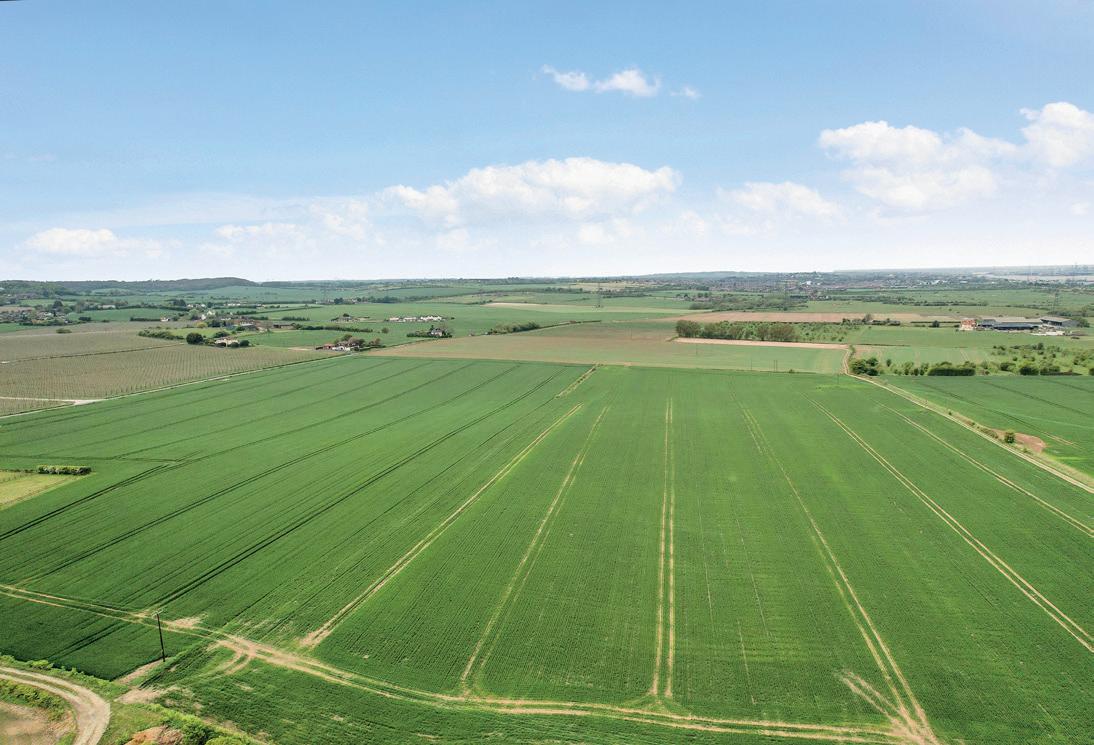
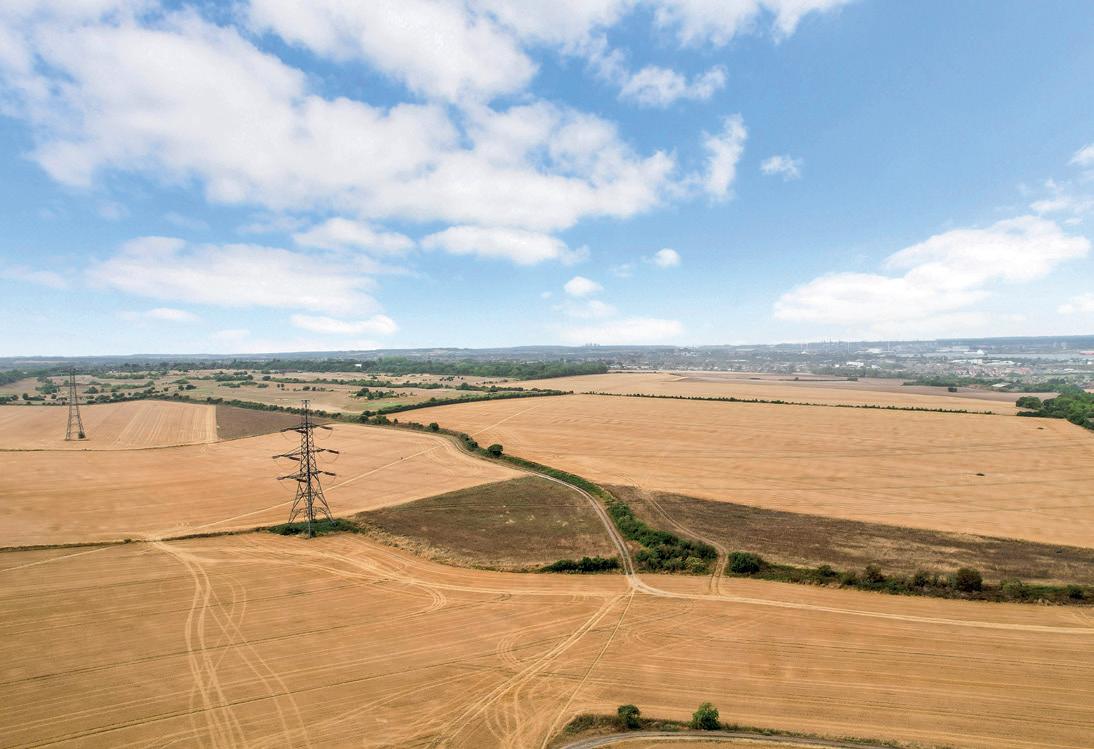

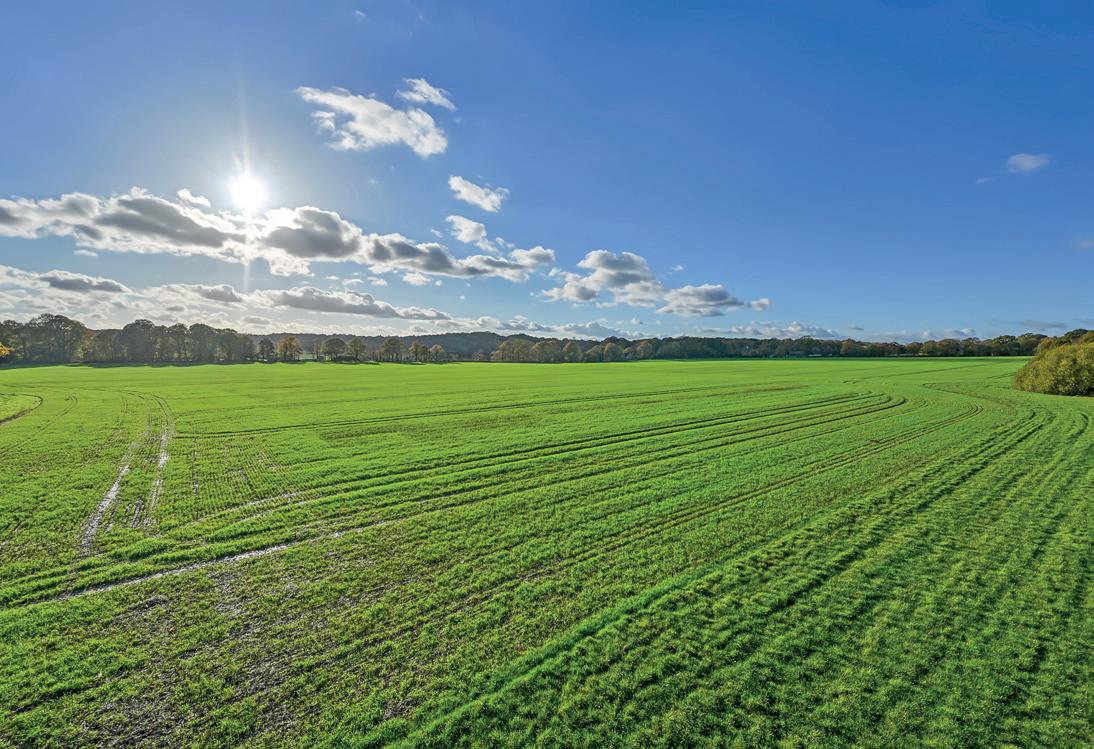






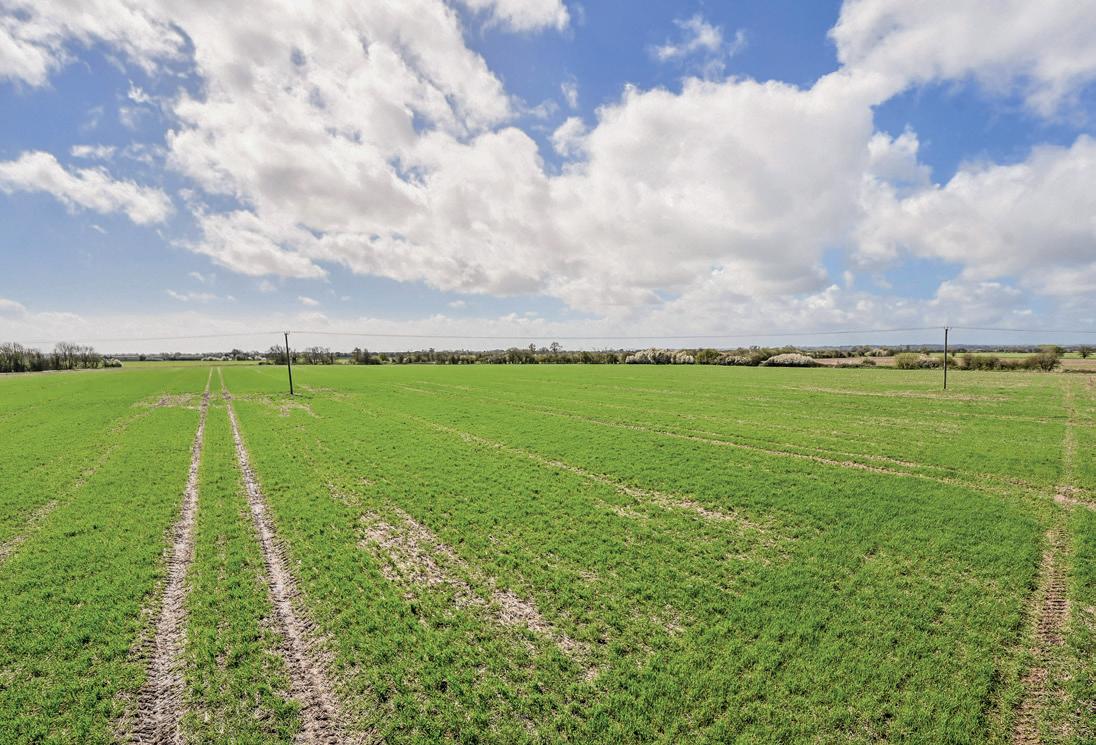
Contact one of the agency team for information: Estate Agents Hobbs Parker Romney House | Monument Way | Orbital Park | Ashford | Kent TN24 0HB 01233 506201
farmland. In all about 230.62 acres
Sam Snart Director Matthew Sawdon Director Vicky Hutton-Squire Director Jon Rimmer Chairman James Hickman Director
Land at Ifield Place • Gravesend • Kent Grade I & II arable
Queens
•
• Gravesend
I and II productive land and buildings. In all about 512 acres
285.75 acres SALE AGREED SALE AGREED North Farm • East Guldeford • Rye A pasture farm situated in a rural marsh location near Rye. About 37.83 acres
Land
at Ham Mill Lane • Romney Marsh 3 Parcels of Grade 2 arable land with lane frontage. About 68.35 acres
Farm & Kings Farm
Shorne
Grade
Land at Barn End Farm • Wilmington • Dartford Grade II and Grade III arable land ‘inside’ the M25. In all about
43.32
FORSALE SOLD
Land adjoining Swain Road • St Michaels • Tenterden A parcel of Grade III arable land. About
acres FORSALE
FORSALE
OFF TO A FLYING START
Spring is finally here after what feels like a long winter! A tumultuous final quarter of 2022 saw buyers grapple with continuous interest rate rises, a revolving door of prime ministers and a cost-of-living crisis.

As a result, deals started to slow and stall in the land and development sector, and more realistic expectations of guide prices were required, particularly in the housing sector, to adapt to changing market conditions.
Fast forward to Spring 2023 and while a further interest rate rise (May) is expected and inflation remains above forecasted levels, a sense of calm appears to have returned to the markets.
Buyers and investors have factored in the current rates and development transactions continue largely unaffected by short term volatility, while those benefiting from rollover money and holding cash continue to invest in one of the safest and most resilient of asset classes.
The Hobbs Parker agency team has been exceptionally busy in the first quarter of

this year reporting sales or sales agreed on farmland assets with a value in excess of £20 million across a range of farms and farmland blocks, with a mixture of openly marketed and off-market sales.
This includes the superb Queens Farm and Kings Farm in Shorne, comprising 512.31 acres of mostly Grade I and II arable land, a five-million gallon reservoir and set of farm buildings, under offer at well in excess of its £5.2m guide price.
A further 230.62 acres of excellent quality Grade I and II arable completed at nearby Ifield Place in excess of the £2m guide. Staying in North Kent, tucked inside the M25 near Dartford, a block of 285.75 acres of Grade II and Grade III arable guided as from £3,175,000 is sale agreed.
Off-market transactions have been equally active and are suited for those who do not wish to test the open market and prefer a more private approach.
Looking forward, and moving to the other end of the county, the recently launched
North Farm at East Guldeford near Rye, comprising a pasture smallholding with three-bed detached house for modernisation set in about 37.83 acres, is for sale, guided at £800,000.

Further opportunities are found on the Romney Marsh, with approximately 68.35 acres of grade II arable land available as a whole or in three lots at Ham Mill Lane.

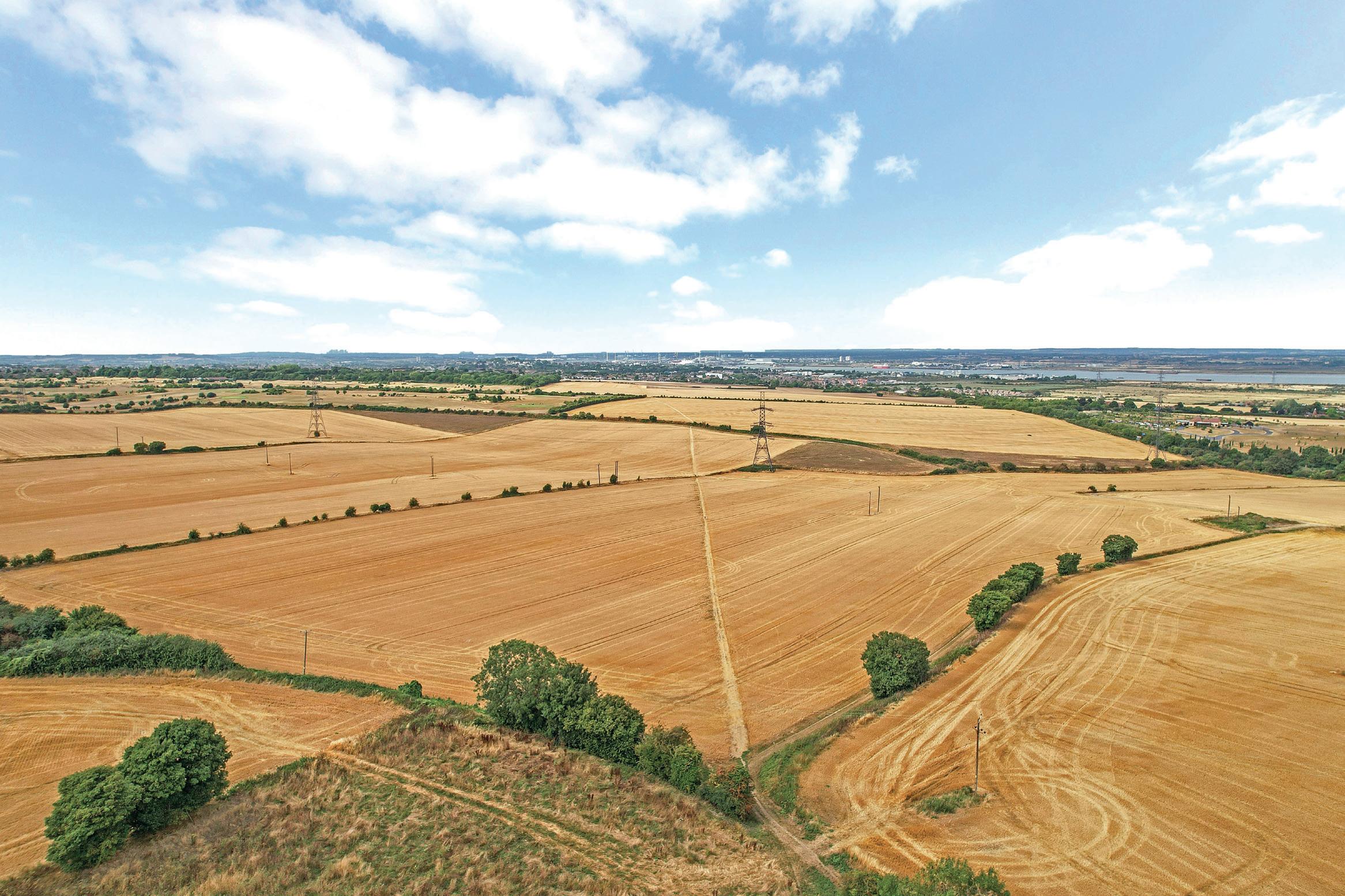
Away from the Romney Marsh, land adjoining Swain Road provides a rare chance to buy a good-sized parcel of arable land close to Tenterden and St Michaels. Comprising about 40 acres in a single-field parcel of Grade III arable land with good road frontage, this provides an excellent opportunity for a local farmer seeking to expand his or her holding and is guided at £350,000 to £375,000 (£8,750 to £9,375 per acre).
Further holdings are in the pipeline for the late spring and summer market. Following this positive start, demand continues apace from farmers, investors and amenity or environmental buyers.
iFor a confidential, no obligation chat to discuss how












WWW.SOUTHEASTFARMER.NET | MAY 2023 77 TO ADVERTISE CALL 01303 233883 LAND AND FARMS
Hobbs Parker might assist you, please give them a call
Ifield Place
Barn End Farm
North Farm



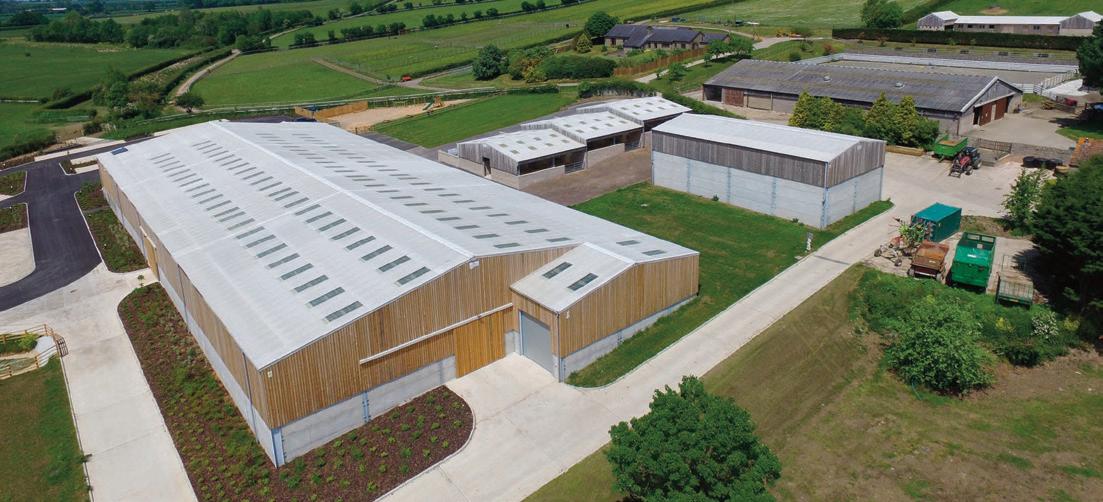
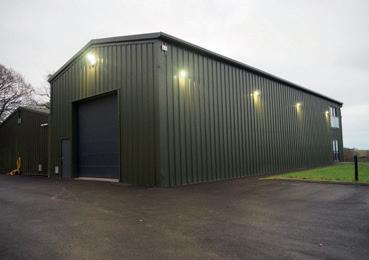
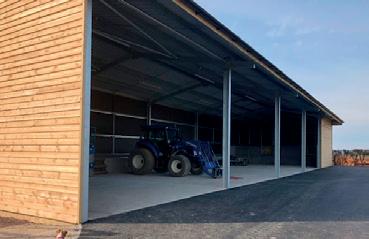
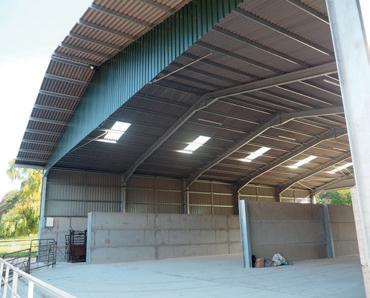
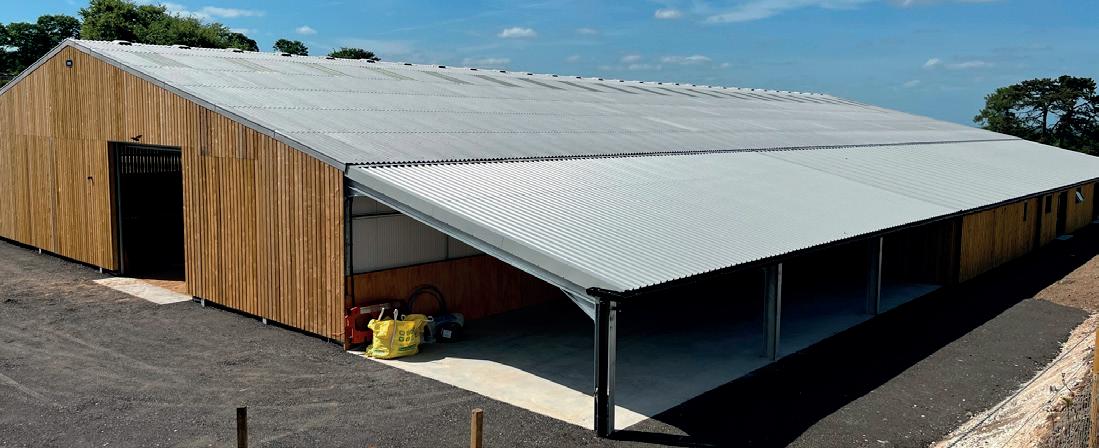

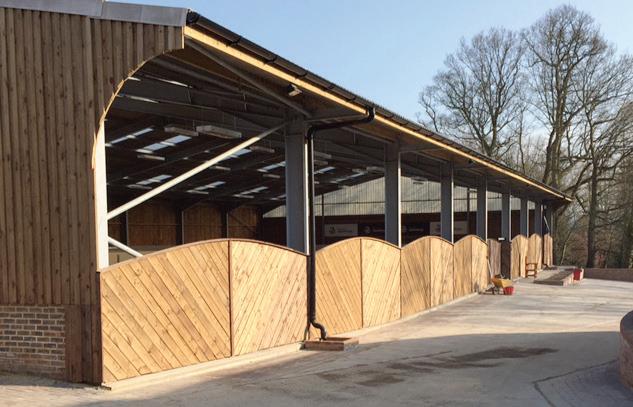









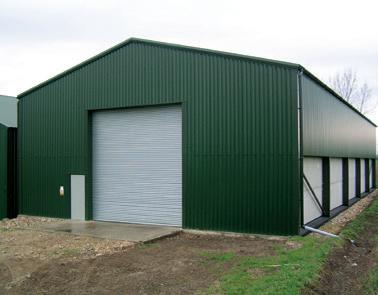
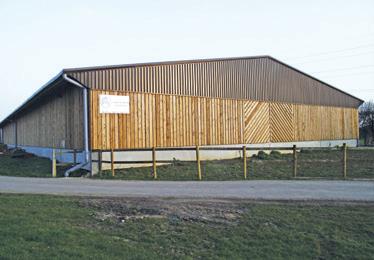



MAY 2023 | WWW.SOUTHEASTFARMER.NET 78 CLASSIFIEDS CONSTRUCTION CONSTRUCTION Industrial & Commercial | Structural Steelwork | Agricultural & Equestrian Contact us for a free quotation 01269 831831 enquiry@shufflebottom.co.uk www.shufflebottom.co.uk Shufflebottom Ltd Cross Hands Business Park, Cross Hands, Llanelli, Carmarthenshire SA14 6RE Shufflebottom Agricultural Buildings Steel-frame buildings for your farm + Supply only or supply & erect + Construction all over the UK + Award winning company Strength, Security, Style Office 01825 371500 � info@formabuild.co.uk www.formabuild.co.uk We specialise in the supply and construction of steel framed buildings together with the repair and refurbishment of existing farm buildings. Based in the heart of Sussex, covering the South East. Sussex builders since at least 1605. Forma offer all aspects of steel framed construction and cladding together with groundworks and electrical fit out if required. formabuild.co.uk 100% British designed & built Over 35 Years experience Site visits Call to arrange a site survey All our panels are marked Gary White 07812 599679 Jason White 07941 274751 Based in Lewes, East Sussex G.E.WHITE & SONS Ltd All refurbishments & repairs undertaken. Call for a free quote today. AGRICULTURAL, EQUESTRIAN & INDUSTRIAL STEEL FRAMED BUILDINGS We supply CONCRETE PANELS – Any size to suit your needs All aspects of steel work, cladding & groundwork. Family run business with 45 years experience. “You tried the others, now try the brothers” All our buildings are marked www.gjelgarconstruction.co.uk For more information contact us: t: 01233 623739 m: 07860 414227 e: office@gjelgarconstruction.co.uk • Steel frame buildings • Sheeting and cladding • Guttering and repairs • Groundworks and drainage • Demolition and asbestos removal • Refurbishment and change of use • Concrete frame and steel frame repairs • Insurance and general repairs • Concrete floor and block paving G. J. ELGAR CONSTRUCTION Ltd












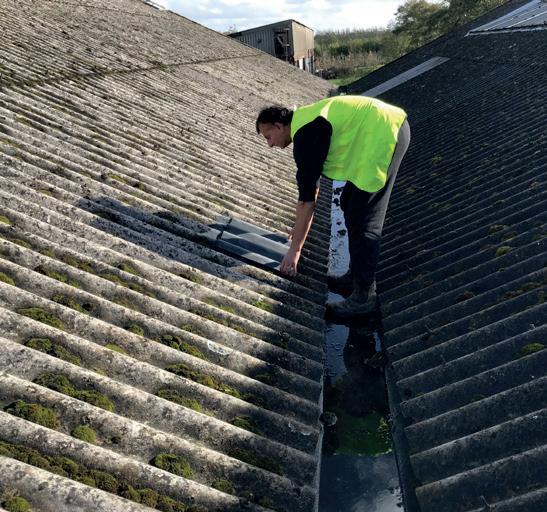
WWW.SOUTHEASTFARMER.NET | MAY 2023 79 TO ADVERTISE CALL 01303 233883 CLASSIFIEDS CONSTRUCTION CONSTRUCTION CONSTRUCTION Agriculture ~ Cold Storage ~ Equestrian ~ Industrial ~ Waste Recycling • Agricultural Buildings • Cold Store Buildings • Equestrian Buildings • Industrial Buildings • Waste Recycling Buildings • Structural Steel • Drawing Services • Design Services • Mezzanine Floors • Custom Steelwork 01323 890403 www.danddconstruction.co.uk info@danddconstruction.co.uk To advertise in South East Farmer telephone 01303 233883 Steel frame buildings for all your farming and agricultural needs. Visit our website or find us on social media to learn more... Supplying profiled roofing products to contractors, builders and farmers visit www.southernsheeting.co.uk for our full range or call 01342 590 357 to speak to our friendly sales team Our main products off the shelf include: • Metal sheeting • Insulated panels • Fibre cement • Rooflights • Onduline • Fixings and accessories southernsheeting.co.uk NATIONWIDE DELIVERY • EXTENSIVE RANGES IN STOCK CS3152 SS SE Farmers 190mm x 133mm advert v2.indd 2 23/11/2022 15:47 Arrange a site visit with one of our contracts managers to discuss your project in more detail by emailing enquiries@kenwardgroundworks.co.uk or call 01403 210218 www.kenwardgroundworks.co.uk Kenward Construction based in Horsham, West Sussex offer a full design and build service for your next steel framed building including composite cladding, concrete panels, roller shutter doors and bespoke designs to meet individual planning conditions. Kenward Construction also offer a wide range of services offering a truly one stop shop for your next farm building project. Demolition, plant hire, access roads, drainage, sewage treatment plants, rainwater harvesting, biobed wash downs, paving, concrete foundations / slabs, walling and site landscaping. ENWARD FREEPHONE: 01233 659129 from BT land-line charlie.woodger@btinternet.com REFURBS, BIG 6 ROOF SHEETS, ROOF LIGHTS, RIDGES, VERGES, VALLEY GUTTERS, BOX GUTTERS, BOUNDARY GUTTERS, ASBESTOS, SHEETING Single Sheet To Whole Roof Roller Shutters Accidental or Storm Damage Works Demolition Refurbishments Waste Clearances CALL TO DISCUSS YOUR PROJECT! ALL WORKS KENT & SUSSEX Professional Services to the Agricultural, Industrial & Equestrian Sectors FARM BUILDING REPAIRS


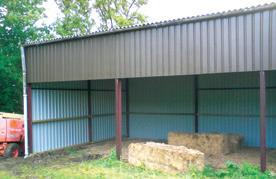
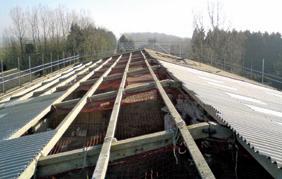
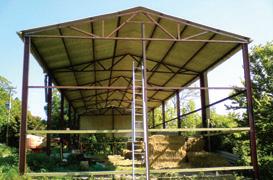


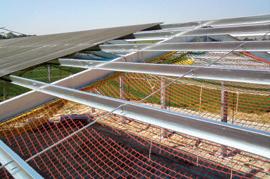
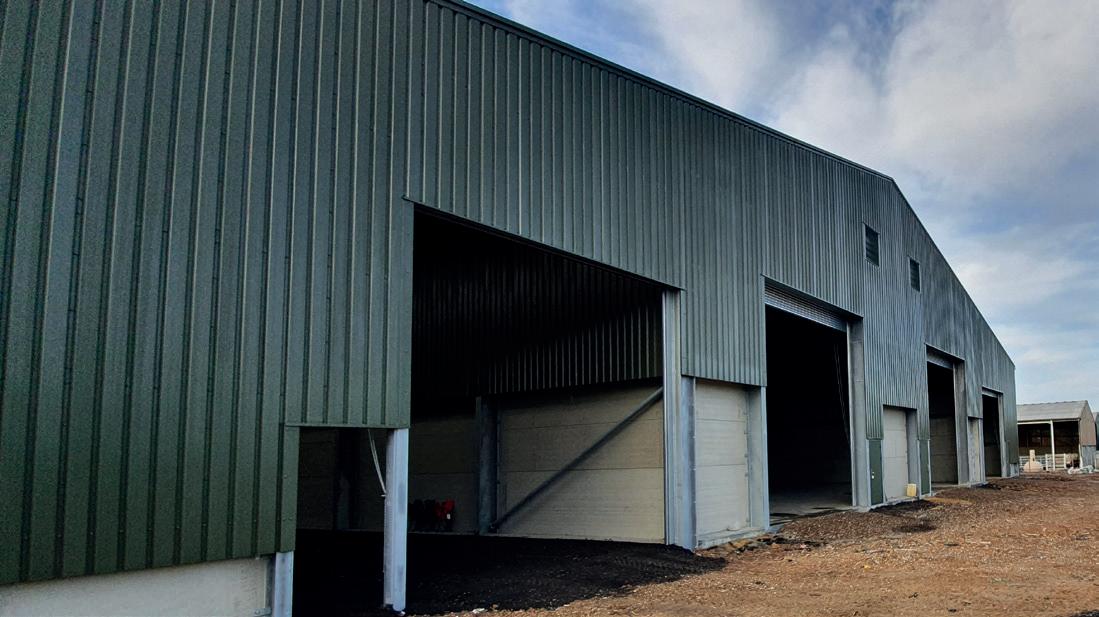
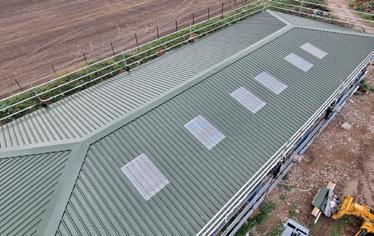



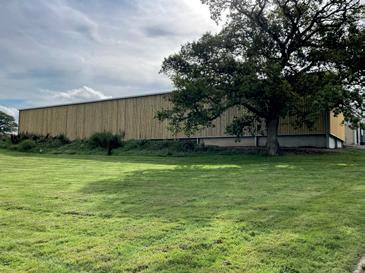
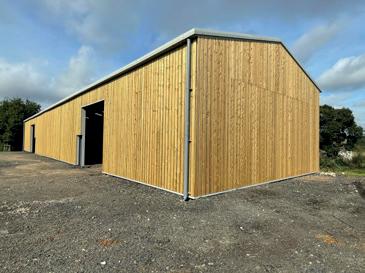


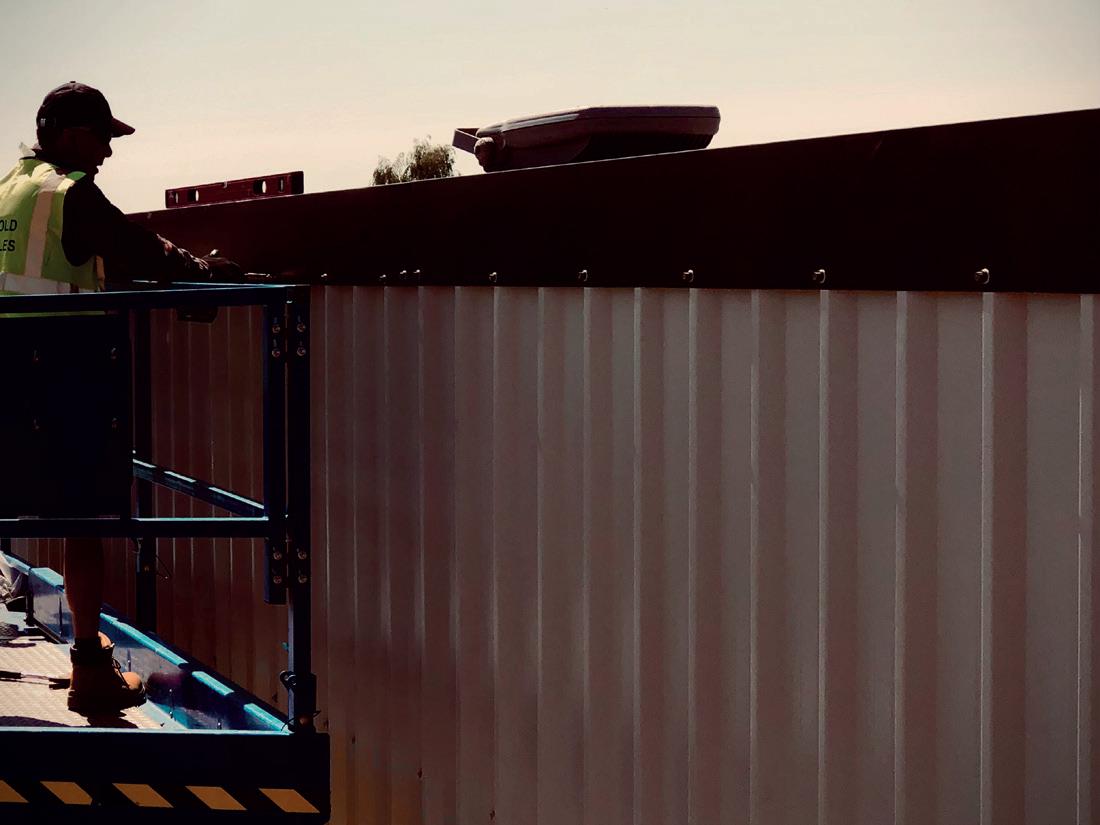






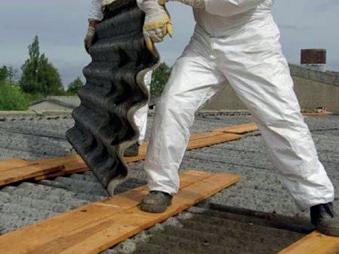

MAY 2023 | WWW.SOUTHEASTFARMER.NET 80 CLASSIFIEDS JPR ROOFING & CLADDING… Professional Services to the Agricultural, Industrial & Equestrian Sectors ROOFING & CLADDING Including: • Sheeting & Cladding to New & Existing Buildings • Roof repairs, Replacements and over sheeting • Insulated or single skin plastic coated sheeting in a wide range of colours • Concrete fibre sheeting, Big 6 profile etc • Asbestos sheeting removal & disposal, using registered waste carrier • Valley gutters, concrete or metal, repaired or re-lined • Roof lights replaced or covered • Maintenance Programmes to avoid the problems that occur with neglect • Conversions & extensions to existing buildings • Groundworks, Access Roads, Drives, concrete bases, Drainage etc FIRE,FLOOD & STORM DAMAGE Including: • 24 Hour Call out service • Making site/building/premises safe • Structural safety assessment • Emergency clear-up operations • Emergency procedures to reduce impact on your business or premises • Demolition/site clearance • Asbestos removal/clearance & disposal, using registered waste carrier • Re-instatement works • Insurance Claims ALL WORKS GUARANTEED Specialists in: FREEPHONE: 0800 756 9886 Covering Kent, East/West Sussex and the South East from BT land-line MOBILE: 07813 142 145 CONSTRUCTION Specialists in the Agricultural, Industrial and Equestrian sectors Steel frame supply and erect or just supply. Sheeting, cladding and oversheeting. Gutter replacement, repairs and lining. Steel frame, concrete frame alterations and repairs. Asbestos removal. Roof light and sheet changes. Refurbishments and usage changes. Demolition, groundworks and site clearance. 24 hour call out in the event of fire or break in. Roller shutters, sliding and personnel doors. Condition reports and dilapidation work before solar panel installation Mezzanine floors Insurance and repair work On site welding and steel fabrication ALL WORKS GUARANTEED 01227 918723 Quality of work Reliability and honesty Unbeatable on price 07784 619603 jez@JRJconstruction.co.uk www.JRJconstruction.co.uk We are a Hampshire-based family run company specialising in the refurbishment, renovation, alteration and upgrade to the external envelope of buildings within the industrial, commercial and agricultural sectors. Our services Structural Steel Cladding Systems Roof Repairs Doors Gutter Maintenance Asbestos Removal Tel: 02380 617383 Email: info@symesindustrial.co.uk Web: www.symesindustrial.co.uk Units 6 & 7, Upper Norton Farm, Sutton Scotney, Hampshire SO21 3QF Industrial Commercial Agricultural Penfold’s commercial, agricultural and residential building specialists with over 40 years experience – Standing seam – Snaplock systems – Aluminium – Zinc – Copper METAL ROOFING – Composite cladding – Metal cladding – Fibre cement cladding – Timber cladding CLADDING – Removal – Disposal – Surveys ASBESTOS REMOVAL 07864 823 476 07889 481618 Nextgen Cladding Ltd www.nextgencladding.co.uk
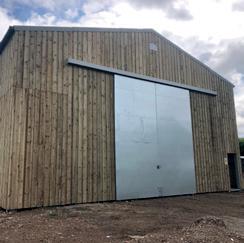







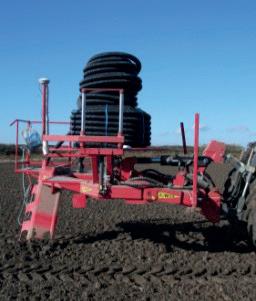

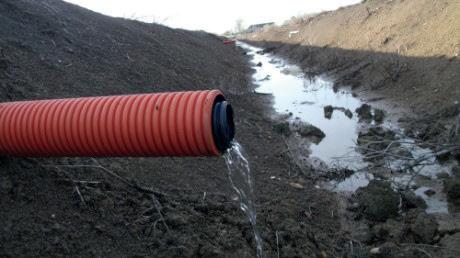
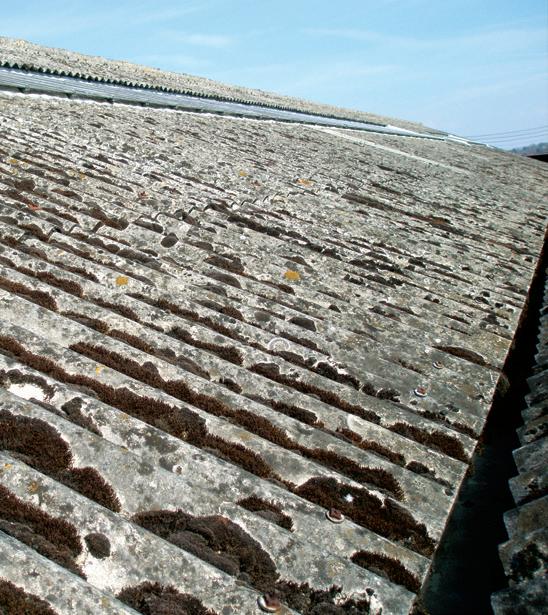


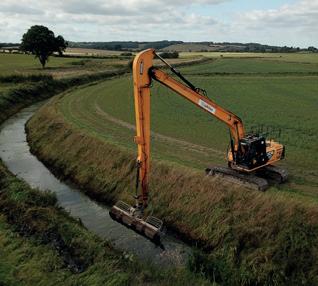
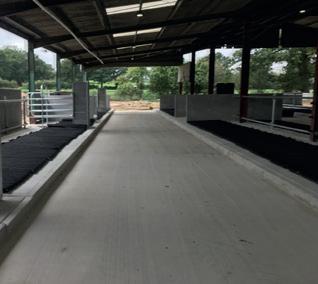
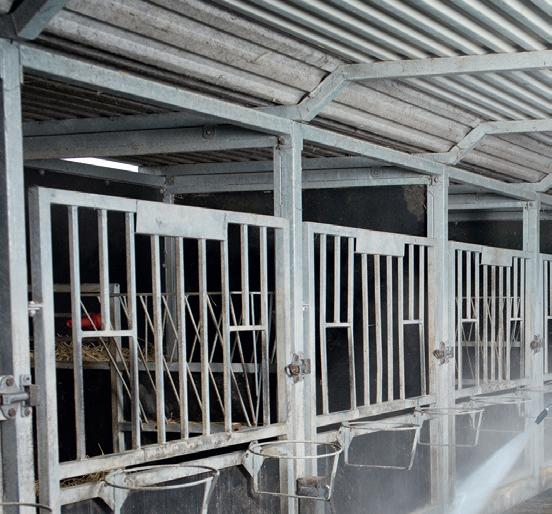
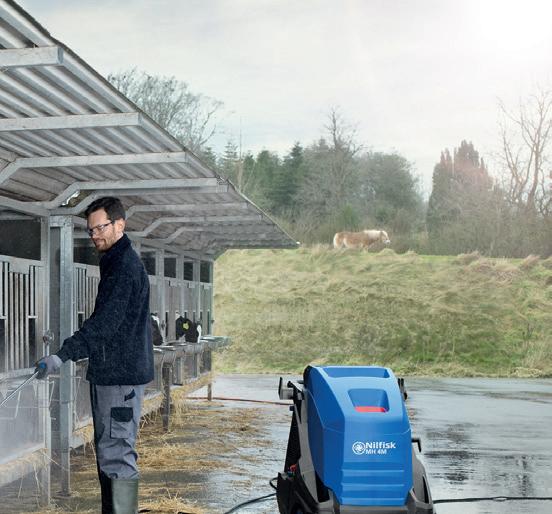





WWW.SOUTHEASTFARMER.NET | MAY 2023 TO ADVERTISE CALL 01303 233883 CLASSIFIEDS To advertise in South East Farmer telephone 01303 233883 CONTRACTORS Mobile: 07976 287836 Email: sales@shortlandstructures.com www.shortlandstructures.com • STEEL FRAMED BUILDINGS • CLADDING • ERECTING • • EXTENSIONS • ALTERATIONS • CONCRETE PANELS • ROLLER/SLIDING/PERSONNEL DOORS • SHORTLAND STRUCTURES LTD ● LAND DRAINAGE ● DITCHING ● POND WORK ● WATER SUPPLIES ● SEWAGE TREATMENT PLANTS ● GROUNDWORKS ● PLANT HIRE 360° EXCAVATORS FOR ESTIMATES & ENQUIRIES (01622) 890884 G & S BROWN Drainage Contractors Working with farmers since 1947 Email: info@brownsdrainage.co.uk www.brownsdrainage.co.uk SWA SW ATTWOOD & PARTNERS • FIELD MAPPING • DRAINAGE SURVEYING • DESIGN • DRAINAGE FOR FURTHER INFORMATION OR VISIT OUR WEBSITE TOM: 01795 880441 or 07943 192383 EMAIL: james@swattwood.com S W ATTWOOD & PARTNERS LAND DRAINAGE james@swattwood.com PLEASE CONTACT US OR VISIT OUR www.attwoodfarms.com GRAIN STORAGE & LAND DRAINAGE PLANT HIRE INERT TIPPING CLAY SALES FROM £220 PER ACRE FIELD MAPPING DRAINAGE SURVEYING DESIGN DRAINAGE LAND DRAINAGE www.swjfattwood.com S W ATTWOOD & PARTNERS LAND DRAINAGE 01795 880441 james@swattwood.com FOR FURTHER INFORMATION PLEASE CONTACT US OR VISIT OUR www.attwoodfarms.com GRAIN STORAGE & TESTING LAND DRAINAGE PLANT HIRE INERT TIPPING CLAY SALES FROM £220 PER ACRE DRAINAGE SURVEYING S W ATTWOOD & PARTNERS LAND DRAINAGE PHONE: 01795 880441 EMAIL: james@swattwood.com FOR FURTHER INFORMATION PLEASE CONTACT US OR VISIT OUR WEBSITE: www.attwoodfarms.com GRAIN STORAGE & TESTING LAND DRAINAGE PLANT HIRE INERT TIPPING FROM £220 PER ACRE DRAINAGE SURVEYING DRAINAGE CONSTRUCTION PRESSURE WASHERS FREEPHONE: 01233 659129 from BT land-line charlie.woodger@btinternet.com Asbestos roof sheeting removals Asbestos encapsulation Asbestos fire damage, clearance & re-instatement works Asbestos clearance & de-contamination Asbestos disposals by licenced registered company New metal roofs installed over old asbestos roofs Roof light & sheet repairs Gutter repairs Gutter replacements & re-lining Strip & refurbishment works Change of use projects Demolition & Groundworks CALL TO DISCUSS YOUR PROJECT! Professional Services to the Agricultural, Industrial & Equestrian Sectors ALL RISKS LTD ASBESTOS ROOF REMOVALS LAND DRAINAGE, EARTHWORKS, GROUNDWORKS & CONSTRUCTION FULL LAND DRAINAGE SERVICE Sportsfields, amenity and irrigation systems using Mastenbroek trenchers PONDS, LAKES & RESERVOIRS Construction and maintenance GROUNDWORKS & CONSTRUCTION Primary excavations, aggregate sub-base, agricultural construction and concreting ENVIRONMENTAL HABITATS Water course maintenance and improvement works For all enquiries call 01233 860404 or 07770 867625 (Harvey) We are a leading supplier and an approved repair centre With 50 years trading in the cleaning industry. With our strong ties and long term relationship with the leading manufacturers 01825 705777 Unit 4, 72 Bell Lane Uckfield, East Sussex TN22 1QL enquiries@pressureclean.co.uk SALES SERVICE HIRE
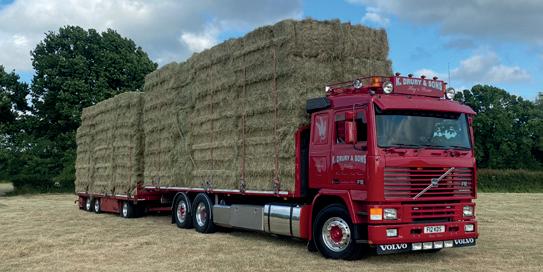


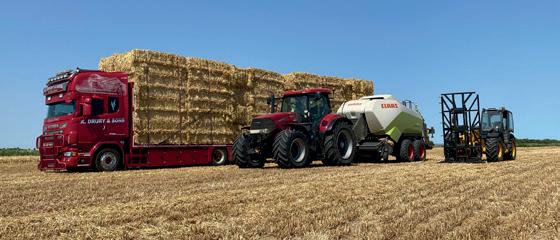


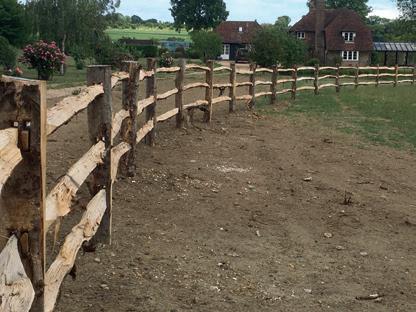

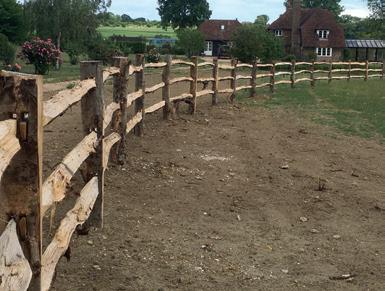


























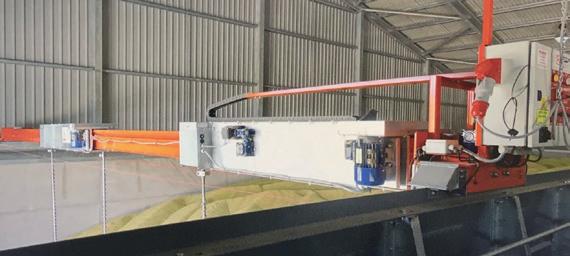
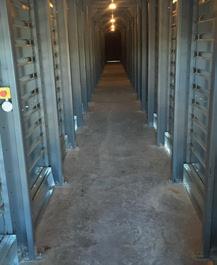











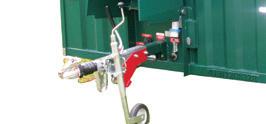



MAY 2023 | WWW.SOUTHEASTFARMER.NET 82 CLASSIFIEDS HAULIERS CONTAINERS FENCING HAY & STRAW IN STOCK | ROUND & BIG SQUARE BALES 07860 728204 Hay & Straw Merchant | Machinery Haulage Find us on Facebook FOR HIRE CROP DRYING FOR SALE CWP fencing Tel: 07985 298221 colin@cwpfencing.co.uk Standing Sweet Chestnut Wanted Cleft post and rail Cleft field gates Fencing stakes Straining posts Chestnut fencing Tel: 07985298221 colin@cwpfencing.co.uk Standing Sweet Chestnut Wanted Cleft post and rail Cleft field gates Fencing stakes Straining posts Chestnut fencing Tel: 07985298221 colin@cwpfencing.co.uk Standing Sweet Chestnut Wanted Cleft post and rail Cleft field gates Fencing stakes Straining posts Chestnut fencing Redhill Farm Services: Fencing Division ALL TYPES OF FENCING & GATES Supplied and erected & Repairs Tel: 01737 821220 Mob: 07768 931891 Email: redhillfarmservices@gmail.com STORAGE TANKS Visit www.smdd.co.uk or call 01594 833308 Buy from stock. Visit us to collect or same day dispatch with nationwide delivery. New and recycled IBC tanks. Plastic and steel drums. Water tanks & plenty of fittings. Smiths of the Forest of Dean The Tank and Drum Experts Visit www.smdd.co.uk or call 01594 833308 Buy from stock. Visit us to collect or same day dispatch with nationwide delivery. New and recycled IBC tanks. Plastic and steel drums. Water tanks & plenty of fittings. Smiths of the Forest of Dean The Tank and Drum Experts Container Sales & Rental New & Used Guaranteed Wind/Watertight equipment 10ft, 20ft & 40ft Equipment available Crawley – viewing by appointment only Freight Container Services (FCS) 01403 268723 • 01636 616335 • 07831 142 401 sales@fcs-uk.co.uk www.freightcontainerservices.com ENT Machines E: enquiries@kentmachines.co.uk T: 01732 884 551 • Mini Diggers • Telehandlers • Forklifts • Trailers @kentmachines.co.uk for SALE @KentMachines Kent Machines Ltd www.kentmachines.co.uk www.pellcroft.com | sales@pellcroft.com | 01526 342466 PELLCROFT Manufacturers of centrifugal, low volume and portable fans, air tunnels, drive over oors, grain stirrers and gas burners Specialists in agricultural, deer and equestrian fencing and gates T: 01622 831 781 | M: 07710 179 600 enquiries@woodchurchfencing.co.uk | www.woodchurchfencing.co.uk • Toilets & Showers for hire • Large range of Temporary canteens, stores & welfare units • E uent Tank Emptying • Events also catered for with chillers & toilets FOUR JAYS GROUP Tel: 01622 843135 Fax: 01622 844410 enquiries@fourjays.co.uk www.fourjays.co.uk HIRE SPECIALISTS ACROSS
SOUTH EAST units
THE
COMPLETE OUR CROSSWORD TO WIN
A mixed box of 500ml sparkling ciders including four bottles of Biddies 5, Red Love cider and Biddies 8
ACROSS
1 Kept apart (9)
5 Fleshy part of leg (4)
8 Messy, overly crowded with things (9)
9 Item of clothing (5)
11 Allium (4)
12 Llama, alpaca etc (7)
13 Cloud formation (13)
15 Rare (6)
17 Used in horse riding (6)
20 Boat designed for clearing the bed of a harbour (7)
23 Compass point (4)
24 Metal item that does not degrade in elements (9)
25 Part of a machine used to make yarn (7)
26 Long eared mammal (4) DOWN
1 Farming tool with semi-circular blade (6)
2 Cut back (5)
3 A price paid by the hour (4)
4 Weather event (7)
6 Garden pest (5)
7 Shipping forecast area (7)
10 Marine bivalve mollusc (4)
13 Implements used for [2 down] (9)
14 Untie (4)
16 Snooker ball with one point value (3)
17 A place to put books (5)
18 Strong alkaline washing solution (3)
19 Hit (6)
21 Process by which fruit becomes ready to eat (3)
22 Saliva dripping from mouth (5)
23 Time piece (5)
PRIZE ANAGRAM: Disease of wheat (8)
To
Email your replies with your name, address and phone number to sef.ed@kelsey.co.uk
Correct entries will be entered into a draw which will take place on 22 May. The winner will be announced in the June edition.
We are offering readers the chance to win a mixed box of our 500ml sparkling ciders including four bottles of Biddies 5, Red Love cider and Biddies 8. For more information about the vineyards, please visit www.biddendenvineyards.com or call 01580 291726.

*Subject to availability
LAST MONTH’S ANSWERS:
Correct answer: Lavender
LAST MONTH’S WINNER: Jenny Homewood from Rolvenden , Kent
WWW.SOUTHEASTFARMER.NET | MAY 2023 83 TO ADVERTISE CALL 01303 233883 ®
VI NE YA R DS
VI NE YA R DS
CROSSWORD
enter, simply unscramble the anagram (8) using the green squares.
1 2 3 4 5 6 7 8 9 10 11 12 13 14 15 16 17 18 19 20 21 22 23 24 25 26 1 2 3 4 5 6 7 8 9 10 11 12 13 14 15 16 17 18 19 20 21 22 23 24 25 26 I L L E G A L L Y B A T H E S L U O S A S H A L L O W S U R E U M L C H E R E L A N C O R R E C T I S R E H O W G A T E W O N D E R O E C R E S T E D D R E S S S E O M E S E T H I S T L E S W A N S E H L W A C H A I N S A W S I I O V F L H E A R T L E S S T E S S
Crossword by Rebecca Farmer, Broadstairs, Kent


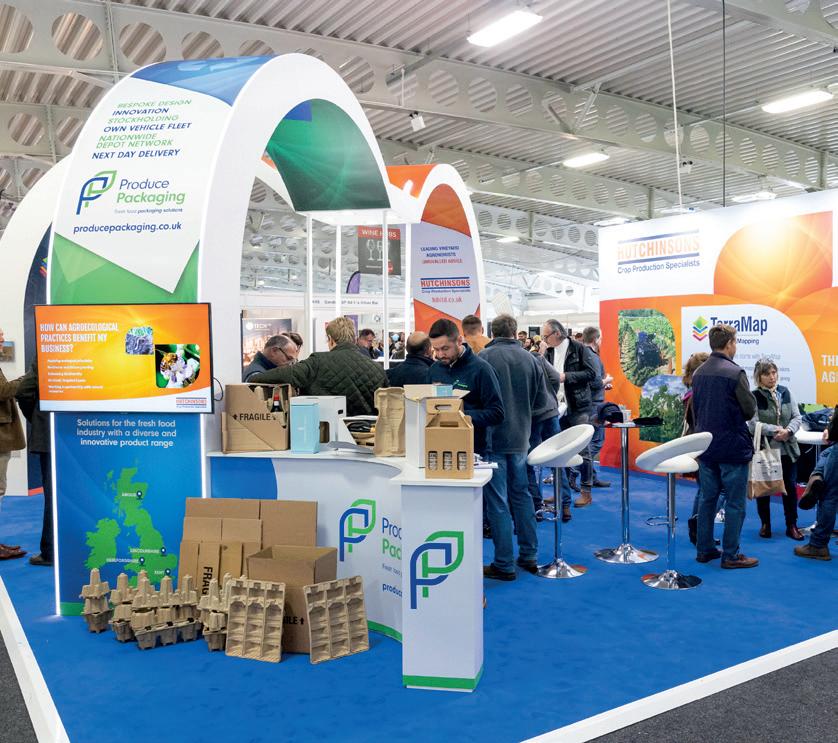









For Growers and Winemakers in Great Britain For general enquiries please contact: Jamie McGrorty 01303 233883 In association with 22nd November 2023 Kent Event Centre, Detling, Maidstone, Kent ME14 3JF 2023 Sponsored by Vitifruit Equipment Sales and Hire RESERVE YOUR TICKET NOW www.vineyardshow.com


































































































































































































































































































































































































































































































































































































































































































































































































































































 Malcolm Triggs
Malcolm Triggs























































































































































































































































































































































































































































































 STEPHEN CARR
STEPHEN CARR


































































































































































































































































































































































